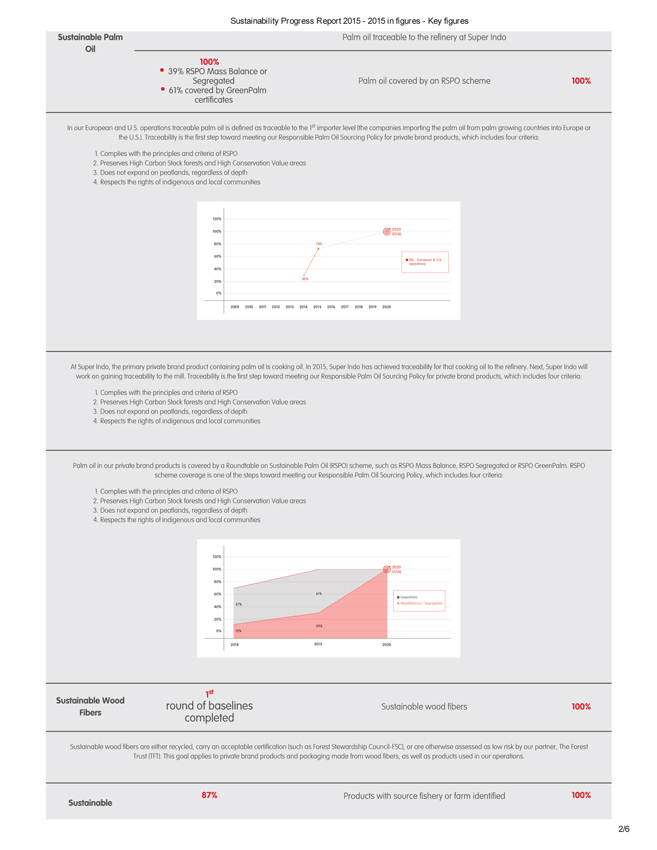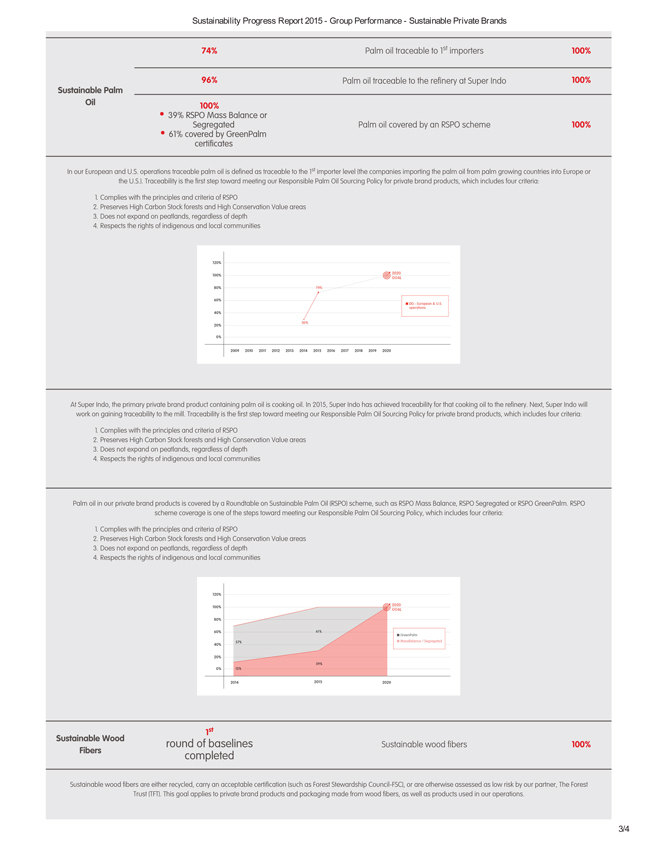Exhibit 99.2
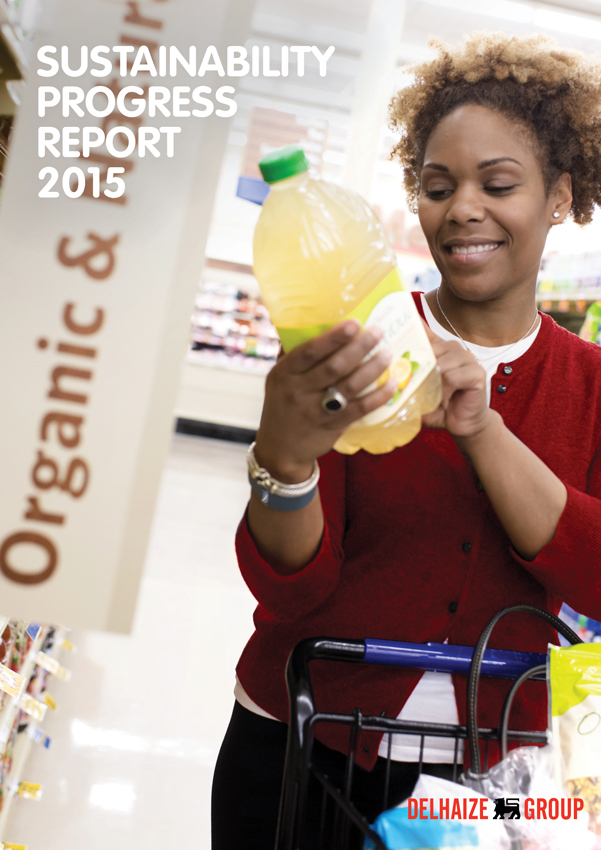
SUSTAINABILITY PROGRESS REPORT 2015
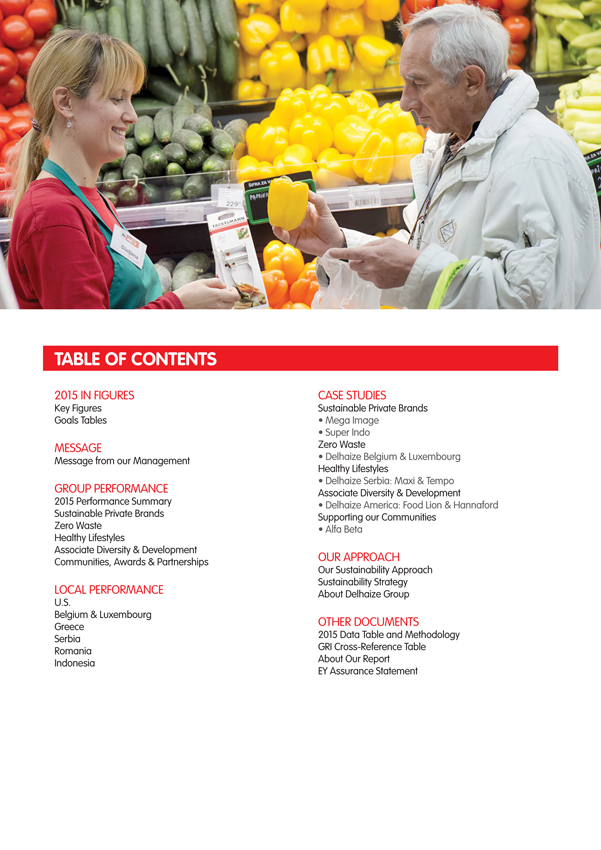
TABLE OF CONTENTS
2015 IN FIGURES CASE STUDIES
Key Figures Sustainable Private Brands
Goals Tables Mega Image
Super Indo
MESSAGE Zero Waste
Message from our Management Delhaize Belgium & Luxembourg
Healthy Lifestyles
Delhaize Serbia: Maxi & Tempo
GROUP PERFORMANCE Associate Diversity & Development
2015 Performance Summary Delhaize America: Food Lion & Hannaford
Sustainable Private Brands Supporting our Communities
Zero Waste Alfa Beta
Healthy Lifestyles
Associate Diversity & Development
Communities, Awards & Partnerships OUR APPROACH
Our Sustainability Approach
Sustainability Strategy
LOCAL PERFORMANCE About Delhaize Group
U.S.
Belgium & Luxembourg
Greece OTHER DOCUMENTS
Serbia 2015 Data Table and Methodology
Romania GRI Cross-Reference Table
Indonesia About Our Report
EY Assurance Statement
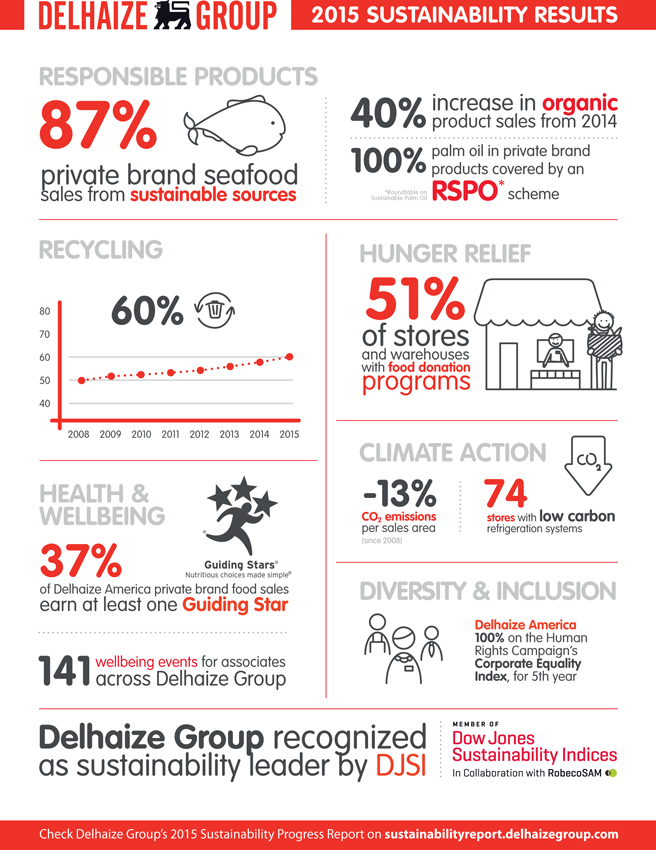
2015 SUSTAINABILITY RESULTS
RESPONSIBLE PRODUCTS
increase in organic
87% 40% product sales from 2014
100% palm oil in private brand
private brand seafood products covered by an
*Roundtable on
sales from sustainable sources Sustainable Palm Oil RSPO* scheme
RECYCLING
80 60%
70
60
50
40
2008 2009 2010 2011 2012 2013 2014 2015
HEALTH &
WELLBEING
37%
of Delhaize America private brand food sales
earn at least one Guiding Star
141 wellbeing across Delhaize Group events for associates
HUNGER RELIEF
51%
of stores
and warehouses
programs with food donation
CLIMATE ACTION
-13% 74
CO2 emissions stores with low carbon
per sales area refrigeration systems
(since 2008)
DIVERSITY & INCLUSION
Delhaize America
100% on the Human
Rights Campaign’s
Corporate Equality
Index, for 5th year
Delhaize Group recognized
as sustainability leader by DJSI
Check Delhaize Group’s 2015 Sustainability Progress Report on sustainabilityreport.delhaizegroup.com
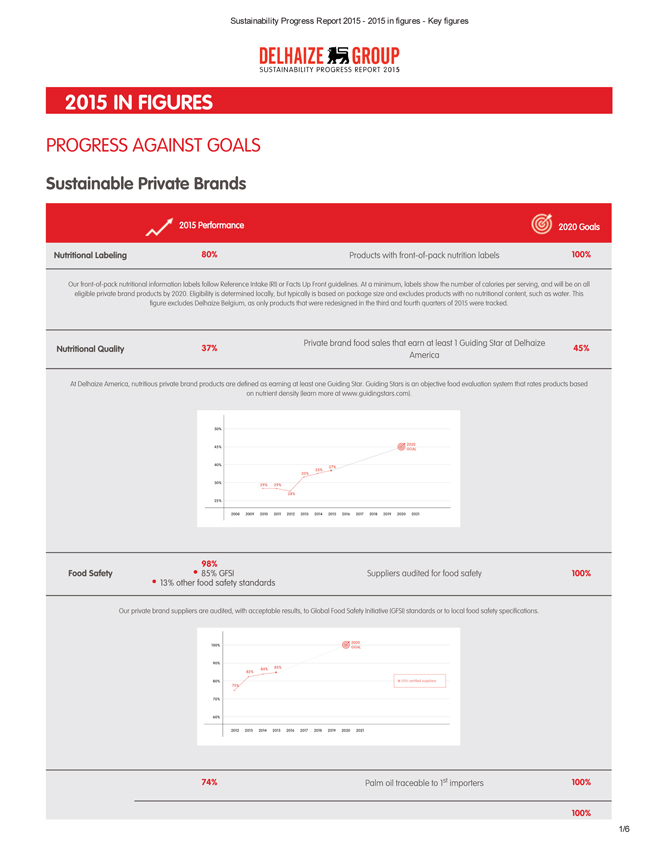
Progress Report 2015 - 2015 in figures - Key figures
2015 IN FIGURES
PROGRESS AGAINST GOALS
Sustainable Private Brands
2015 Performance 2020 Goals
Nutritional Labeling 80% Products with front-of-pack nutrition labels 100%
Our front-of-pack nutritional information labels follow Reference Intake (RI) or Facts Up Front guidelines. At a minimum, labels show the number of calories per serving, and will be on all eligible private brand products by 2020. Eligibility is determined locally, but typically is based on package size and excludes products with no nutritional content, such as water. This figure excludes Delhaize Belgium, as only products that were redesigned in the third and fourth quarters of 2015 were tracked.
Private brand food sales that earn at least 1 Guiding Star at Delhaize
Nutritional Quality 37% 45%
America
At Delhaize America, nutritious private brand products are defined as earning at least one Guiding Star. Guiding Stars is an objective food evaluation system that rates products based on nutrient density (learn more at www.guidingstars.com).
98%
Food Safety 85% GFSI Suppliers audited for food safety 100%
13% other food safety standards
Our private brand suppliers are audited, with acceptable results, to Global Food Safety Initiative (GFSI) standards or to local food safety specifications.
74% Palm oil traceable to 1st importers 100%
100%
1/6
|
Sustainability Progress Report 2015 - 2015 in figures - Key figures
Sustainable Palm Palm oil traceable to the refinery at Super Indo
Oil
100%
39% RSPO Mass Balance or
Segregated Palm oil covered by an RSPO scheme 100%
61% covered by GreenPalm
certificates
In our European and U.S. operations traceable palm oil is defined as traceable to the 1 importer level (the companies importing the palm oil from palm st growing countries into Europe or the U.S.). Traceability is the first step toward meeting our Responsible Palm Oil Sourcing Policy for private brand products, which includes four criteria:
Complies with the principles and criteria of RSPO
Preserves High Carbon Stock forests and High Conservation Value areas
Does not expand on peatlands, regardless of depth
Respects the rights of indigenous and local communities
At Super Indo, the primary private brand product containing palm oil is cooking oil. In 2015, Super Indo has achieved traceability for that cooking oil to the refinery. Next, Super Indo will work on gaining traceability to the mill. Traceability is the first step toward meeting our Responsible Palm Oil Sourcing Policy for private brand products, which includes four criteria:
Complies with the principles and criteria of RSPO
Preserves High Carbon Stock forests and High Conservation Value areas
Does not expand on peatlands, regardless of depth
Respects the rights of indigenous and local communities
Palm oil in our private brand products is covered by a Roundtable on Sustainable Palm Oil (RSPO) scheme, such as RSPO Mass Balance, RSPO Segregated or RSPO GreenPalm. RSPO scheme coverage is one of the steps toward meeting our Responsible Palm Oil Sourcing Policy, which includes four criteria:
Complies with the principles and criteria of RSPO
Preserves High Carbon Stock forests and High Conservation Value areas
Does not expand on peatlands, regardless of depth
Respects the rights of indigenous and local communities
1st
Sustainable Wood round of baselines Sustainable wood fibers 100%
Fibers completed
Sustainable wood fibers are either recycled, carry an acceptable certification (such as Forest Stewardship Council-FSC), or are otherwise assessed as low risk by our partner, The Forest Trust (TFT). This goal applies to private brand products and packaging made from wood fibers, as well as products used in our operations.
Sustainable 87% Products with source fishery or farm identified 100%
2/6
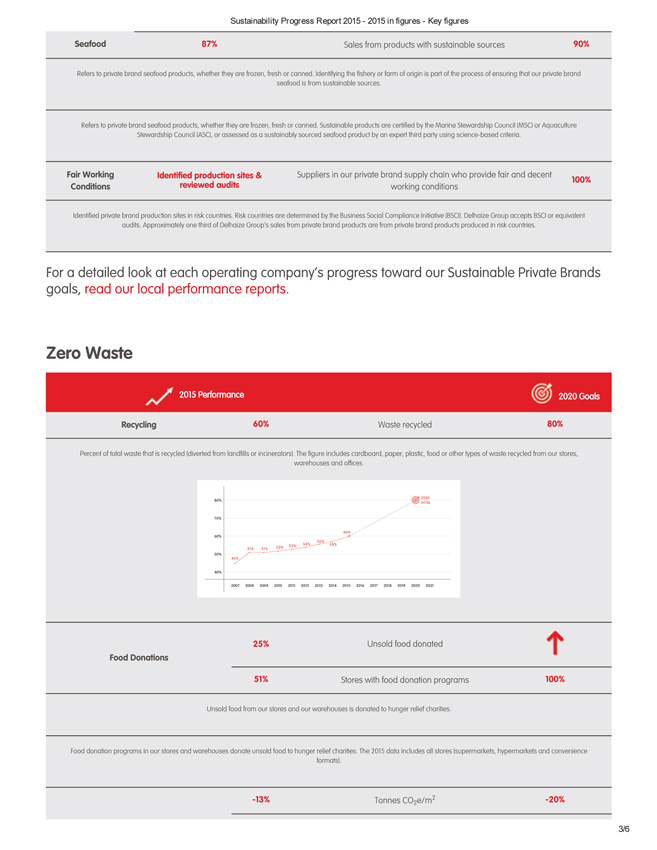
Sustainability Progress Report 2015 - 2015 in figures - Key figures
Seafood 87% Sales from products with sustainable sources 90%
Refers to private brand seafood products, whether they are frozen, fresh or canned. Identifying the fishery or farm of origin is part of the process of ensuring that our private brand seafood is from sustainable sources.
Refers to private brand seafood products, whether they are frozen, fresh or canned. Sustainable products are certified by the Marine Stewardship Council (MSC) or Aquaculture Stewardship Council (ASC), or assessed as a sustainably sourced seafood product by an expert third party using science-based criteria.
Fair Working Identified production sites & Suppliers in our private brand supply chain who provide fair and decent 100%
Conditions reviewed audits working conditions
Identified private brand production sites in risk countries. Risk countries are determined by the Business Social Compliance Initiative (BSCI). Delhaize Group accepts BSCI or equivalent audits. Approximately one third of Delhaize Group’s sales from private brand products are from private brand products produced in risk countries.
For a detailed look at each operating company’s progress toward our Sustainable Private Brands goals, read our local performance reports.
Zero Waste
2015 Performance 2020 Goals
Recycling 60% Waste recycled 80%
Percent of total waste that is recycled (diverted from landfills or incinerators). The figure includes cardboard, paper, plastic, food or other types of waste recycled from our stores, warehouses and offices.
25% Unsold food donated
Food Donations
51% Stores with food donation programs 100%
Unsold food from our stores and our warehouses is donated to hunger relief charities.
Food donation programs in our stores and warehouses donate unsold food to hunger relief charities. The 2015 data includes all stores (supermarkets, hypermarkets and convenience formats).
-13%
Tonnes CO2e/m2
-20%
3/6
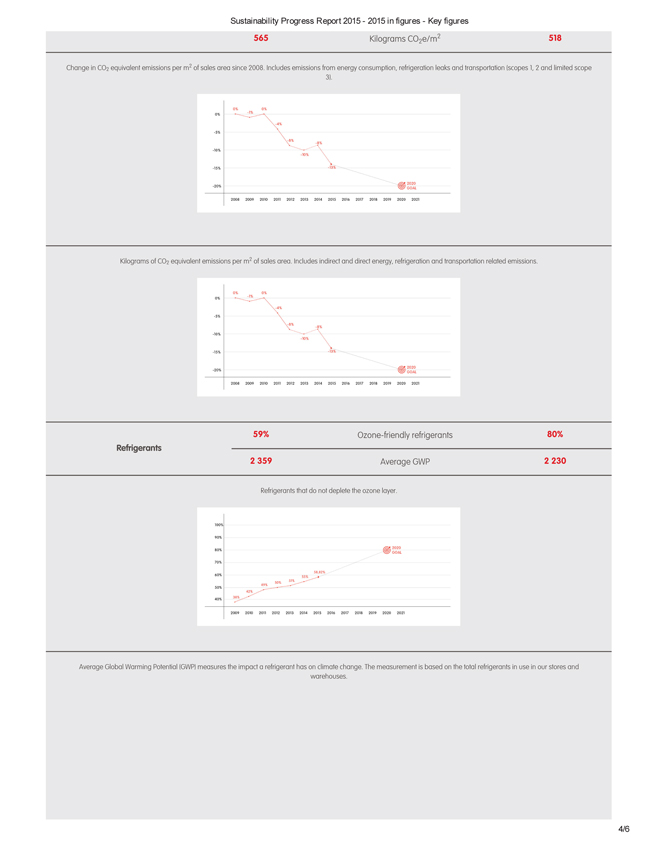
Sustainability Progress Report 2015 - 2015 in figures - Key figures
565 Kilograms CO2 e/m2 518
Change in CO equivalent emissions per m of sales area since 2008. Includes emissions from energy consumption, refrigeration leaks and transportation (scopes 1, 2 and limited scope 2 2
3).
Kilograms of CO2 equivalent emissions per m2 of sales area. Includes indirect and direct energy, refrigeration and transportation related emissions.
59% Ozone-friendly refrigerants 80%
Refrigerants
2 |
| 359 Average GWP 2 230 |
Refrigerants that do not deplete the ozone layer.
Average Global Warming Potential (GWP) measures the impact a refrigerant has on climate change. The measurement is based on the total refrigerants in use in our stores and warehouses.
4/6
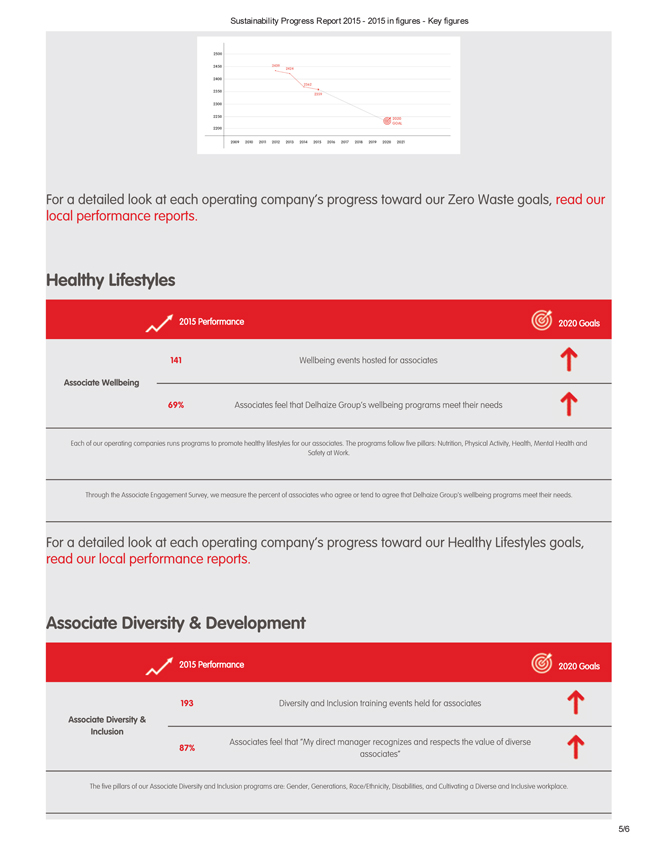
Progress Report 2015 - 2015 in figures - Key figures
For a detailed look at each operating company’s progress toward our Zero Waste goals, read our
local performance reports.
Healthy Lifestyles
2015 Performance 2020 Goals
141 Wellbeing events hosted for associates
Associate Wellbeing
69% Associates feel that Delhaize Group’s wellbeing programs meet their needs
Each of our operating companies runs programs to promote healthy lifestyles for our associates. The programs follow five pillars: Nutrition, Physical Activity, Health, Mental Health and
Safety at Work.
Through the Associate Engagement Survey, we measure the percent of associates who agree or tend to agree that Delhaize Group’s wellbeing programs meet their needs.
For a detailed look at each operating company’s progress toward our Healthy Lifestyles goals,
read our local performance reports.
Associate Diversity & Development
2015 Performance 2020 Goals
193 Diversity and Inclusion training events held for associates
Associate Diversity &
Inclusion
87% Associates feel that –My direct manager recognizes and respects the value of diverse
associates–
The five pillars of our Associate Diversity and Inclusion programs are: Gender, Generations, Race/Ethnicity, Disabilities, and Cultivating a Diverse and Inclusive workplace.
5/6
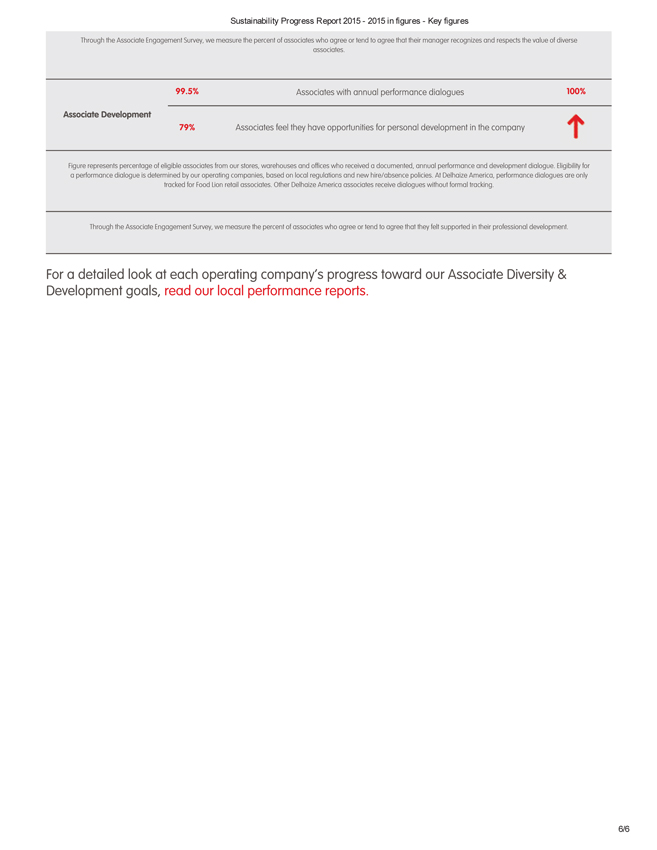
Progress Report 2015 - 2015 in figures - Key figures
Through the Associate Engagement Survey, we measure the percent of associates who agree or tend to agree that their manager recognizes and respects the value of diverse associates.
99.5% Associates with annual performance dialogues 100%
Associate Development
79% Associates feel they have opportunities for personal development in the company
Figure represents percentage of eligible associates from our stores, warehouses and offices who received a documented, annual performance and development dialogue. Eligibility for a performance dialogue is determined by our operating companies, based on local regulations and new hire/absence policies. At Delhaize America, performance dialogues are only tracked for Food Lion retail associates. Other Delhaize America associates receive dialogues without formal tracking.
Through the Associate Engagement Survey, we measure the percent of associates who agree or tend to agree that they felt supported in their professional development.
For a detailed look at each operating company’s progress toward our Associate Diversity & Development goals, read our local performance reports.
6/6
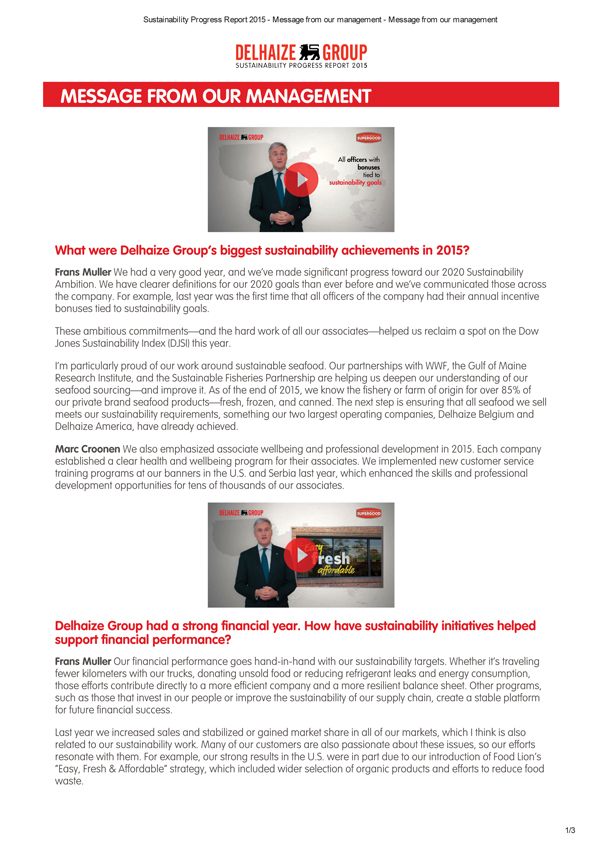
Sustainability Progress Report 2015 - Message from our management - Message from our management
MESSAGE FROM OUR MANAGEMENT
What were Delhaize Group’s biggest sustainability achievements in 2015?
Frans Muller We had a very good year, and we’ve made significant progress toward our 2020 Sustainability Ambition. We have clearer definitions for our 2020 goals than ever before and we’ve communicated those across the company. For example, last year was the first time that all officers of the company had their annual incentive bonuses tied to sustainability goals.
These ambitious commitments—and the hard work of all our associates—helped us reclaim a spot on the Dow Jones Sustainability Index (DJSI) this year.
I–m particularly proud of our work around sustainable seafood. Our partnerships with WWF, the Gulf of Maine Research Institute, and the Sustainable Fisheries Partnership are helping us deepen our understanding of our seafood sourcing—and improve it. As of the end of 2015, we know the fishery or farm of origin for over 85% of our private brand seafood products—fresh, frozen, and canned. The next step is ensuring that all seafood we sell meets our sustainability requirements, something our two largest operating companies, Delhaize Belgium and Delhaize America, have already achieved.
Marc Croonen We also emphasized associate wellbeing and professional development in 2015. Each company established a clear health and wellbeing program for their associates. We implemented new customer service training programs at our banners in the U.S. and Serbia last year, which enhanced the skills and professional development opportunities for tens of thousands of our associates.
Delhaize Group had a strong financial year. How have sustainability initiatives helped support financial performance?
Frans Muller Our financial performance goes hand-in-hand with our sustainability targets. Whether it’s traveling fewer kilometers with our trucks, donating unsold food or reducing refrigerant leaks and energy consumption, those efforts contribute directly to a more efficient company and a more resilient balance sheet. Other programs, such as those that invest in our people or improve the sustainability of our supply chain, create a stable platform for future financial success.
Last year we increased sales and stabilized or gained market share in all of our markets, which I think is also related to our sustainability work. Many of our customers are also passionate about these issues, so our efforts resonate with them. For example, our strong results in the U.S. were in part due to our introduction of Food Lion’s –Easy, Fresh & Affordable– strategy, which included wider selection of organic products and efforts to reduce food waste.
1/3
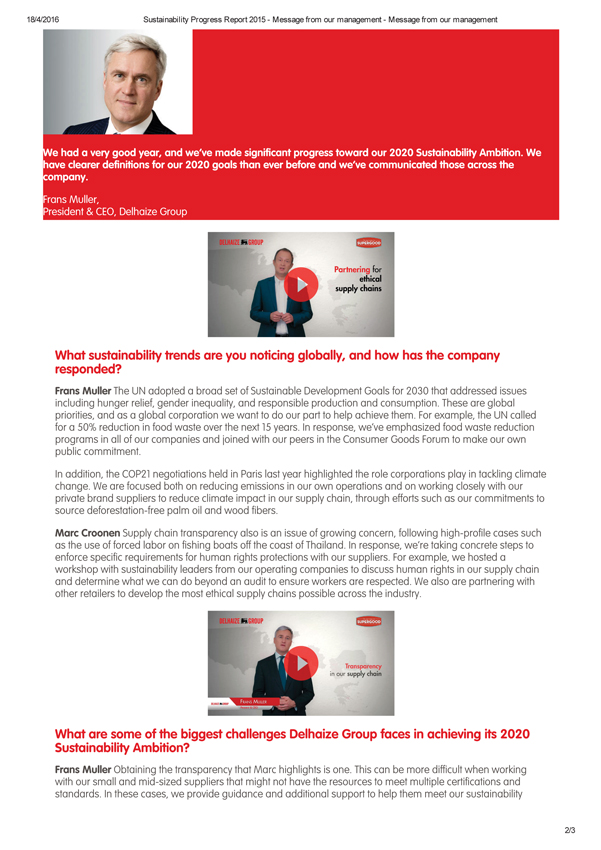
18/4/2016Sustainability Progress Report 2015 - Message from our management - Message from our management
We had a very good year, and we’ve made significant progress toward our 2020 Sustainability Ambition. We have clearer definitions for our 2020 goals than ever before and we’ve communicated those across the company.
Frans Muller,
President & CEO, Delhaize Group
What sustainability trends are you noticing globally, and how has the company responded?
Frans Muller The UN adopted a broad set of Sustainable Development Goals for 2030 that addressed issues including hunger relief, gender inequality, and responsible production and consumption. These are global priorities, and as a global corporation we want to do our part to help achieve them. For example, the UN called for a 50% reduction in food waste over the next 15 years. In response, we’ve emphasized food waste reduction programs in all of our companies and joined with our peers in the Consumer Goods Forum to make our own public commitment.
In addition, the COP21 negotiations held in Paris last year highlighted the role corporations play in tackling climate change. We are focused both on reducing emissions in our own operations and on working closely with our private brand suppliers to reduce climate impact in our supply chain, through efforts such as our commitments to source deforestation-free palm oil and wood fibers.
Marc Croonen Supply chain transparency also is an issue of growing concern, following high-profile cases such as the use of forced labor on fishing boats off the coast of Thailand. In response, we’re taking concrete steps to enforce specific requirements for human rights protections with our suppliers. For example, we hosted a workshop with sustainability leaders from our operating companies to discuss human rights in our supply chain and determine what we can do beyond an audit to ensure workers are respected. We also are partnering with other retailers to develop the most ethical supply chains possible across the industry.
What are some of the biggest challenges Delhaize Group faces in achieving its 2020 Sustainability Ambition?
Frans Muller Obtaining the transparency that Marc highlights is one. This can be more difficult when working with our small and mid-sized suppliers that might not have the resources to meet multiple certifications and standards. In these cases, we provide guidance and additional support to help them meet our sustainability
2/3
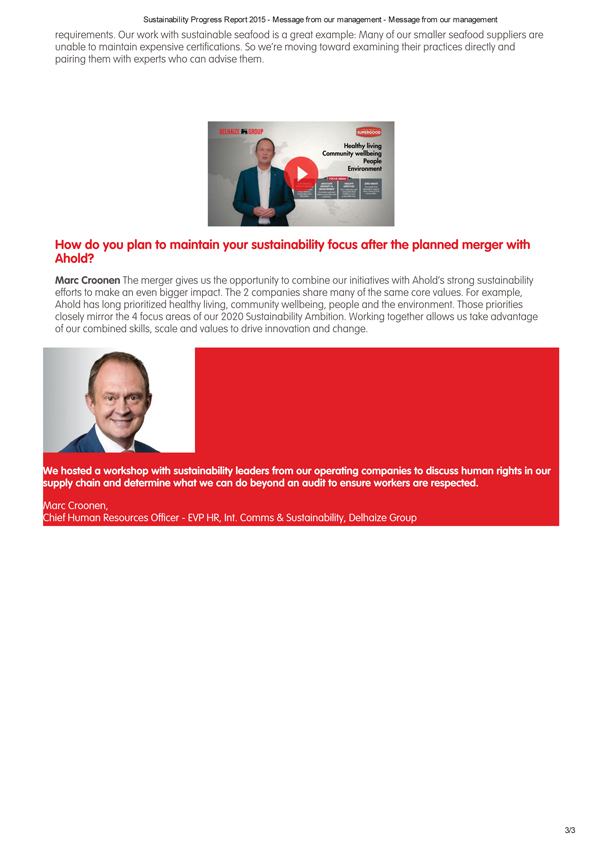
Sustainability Progress Report 2015 - from our - Message from our management
requirements. Our work with sustainable seafood is a great example: Many of our smaller seafood suppliers are unable to maintain expensive certifications. So we’re moving toward examining their practices directly and pairing them with experts who can advise them.
How do you plan to maintain your sustainability focus after the planned merger with Ahold?
Marc Croonen The merger gives us the opportunity to combine our initiatives with Ahold’s strong sustainability efforts to make an even bigger impact. The 2 companies share many of the same core values. For example, Ahold has long prioritized healthy living, community wellbeing, people and the environment. Those priorities closely mirror the 4 focus areas of our 2020 Sustainability Ambition. Working together allows us take advantage of our combined skills, scale and values to drive innovation and change.
We hosted a workshop with sustainability leaders from our operating companies to discuss human rights in our
supply chain and determine what we can do beyond an audit to ensure workers are respected.
Marc Croonen,
Chief Human Resources Officer—EVP HR, Int. Comms & Sustainability, Delhaize Group
3/3
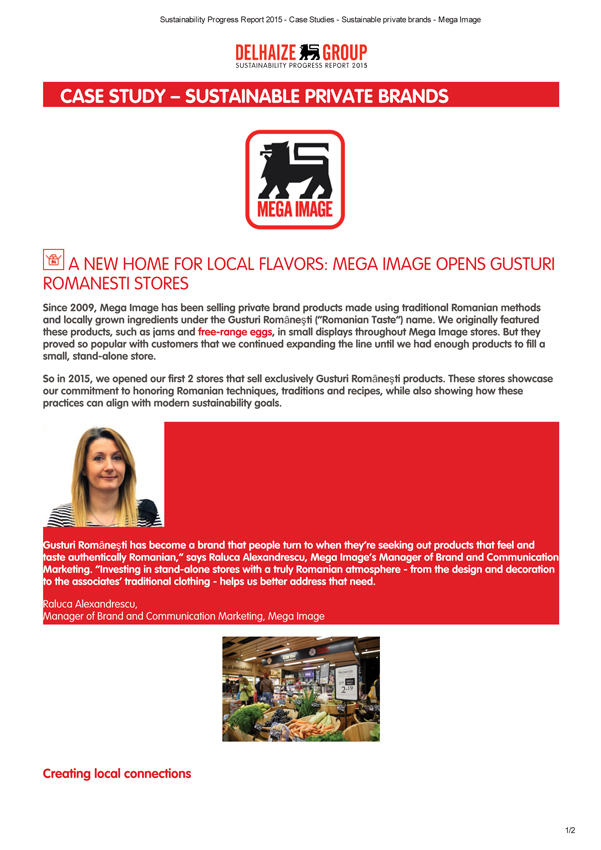
Sustainability Progress Report 2015 - Case Studies - Sustainable private brands - Mega Image
CASE STUDY – SUSTAINABLE PRIVATE BRANDS
A NEW HOME FOR LOCAL FLAVORS: MEGA IMAGE OPENS GUSTURI ROMANESTI STORES
Since 2009, Mega Image has been selling private brand products made using traditional Romanian methods and locally grown ingredients under the Gusturi Româneşti (“Romanian Taste”) name. We originally featured these products, such as jams and free-range eggs, in small displays throughout Mega Image stores. But they proved so popular with customers that we continued expanding the line until we had enough products to fill a small, stand-alone store.
So in 2015, we opened our first 2 stores that sell exclusively Gusturi Româneşti products. These stores showcase our commitment to honoring Romanian techniques, traditions and recipes, while also showing how these practices can align with modern sustainability goals.
Gusturi Româneşti has become a brand that people turn to when they’re seeking out products that feel and taste authentically Romanian,” says Raluca Alexandrescu, Mega Image’s Manager of Brand and Communication Marketing. “Investing in stand-alone stores with a truly Romanian atmosphere—from the design and decoration to the associates’ traditional clothing—helps us better address that need.
Raluca Alexandrescu,
Manager of Brand and Communication Marketing, Mega Image
Creating local connections
1/2

Progress Report 2015 - Case Studies - private brands - Mega Image
We opened our first Gusturi Româneşti store in a popular shopping area of downtown Bucharest just before Easter – a holiday when many Romanians seek out traditionally-made products. Inside, customers found a variety of private-brand products made in a traditional manner or representing regional traditions, including meat specialties, baked goods and Romanian wine.
During the growing season, the store also sold fresh fruits and vegetables from local farmers, alongside year-round products made by local producers. Mega Image has forged partnerships with these growers as a way to promote sustainable practices and help support the local economy. “Long-term contracts with local growers help ensure the continuity of their businesses,” says Alexandrescu.
To strengthen connections between customers and suppliers, we invited a jam maker, a dairy farmer and a cold pressed oil producer to speak to customers at the store’s opening event. These Gusturi Româneşti producers described their production techniques and explained why using traditional or original methods is important to them.
A model for future stores
Our goal of blending tradition with modern elements also extended to store design. The interior featured hand-carved wooden beams that harken back to traditional Romanian building techniques; at the same time, we installed energy efficient LED lighting systems to reduce energy consumption.
Customers enthusiastically embraced the first Gusturi Româneşti store, and by September we had opened our second location in a popular open market in Bucharest. Thanks to this positive response, we plan to add two more Gusturi Româneşti stores in Bucharest in 2016.
“The popularity of these stores shows us that there is a strong appetite for the Gusturi Româneşti line,” says Alexandrescu. “Knowing that, we can build on our success and continue offering more products with the tastes and flavors that many Romanians remember from their childhoods.”
2/2
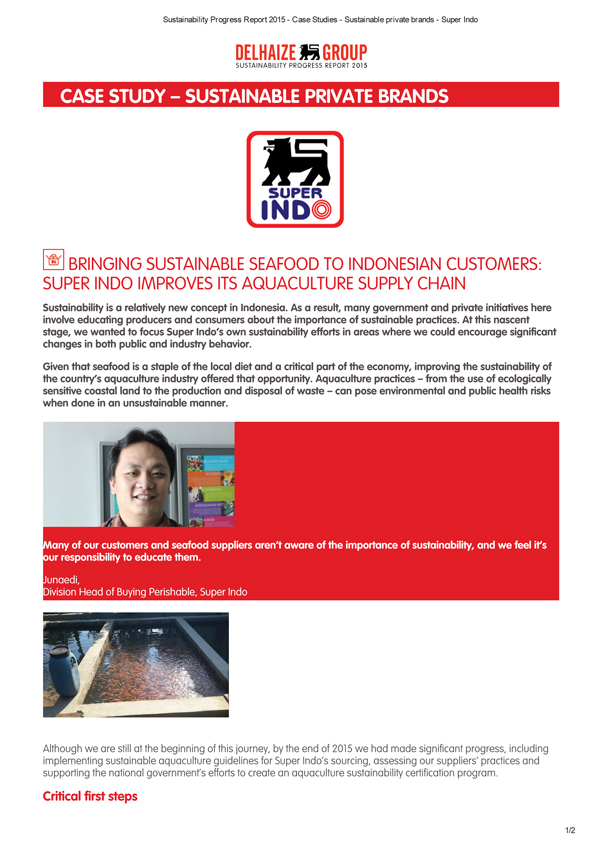
Sustainability Progress Report 2015 - Case Studies - Sustainable private brands - Super Indo
CASE STUDY – SUSTAINABLE PRIVATE BRANDS
BRINGING SUSTAINABLE SEAFOOD TO INDONESIAN CUSTOMERS: SUPER INDO IMPROVES ITS AQUACULTURE SUPPLY CHAIN
Sustainability is a relatively new concept in Indonesia. As a result, many government and private initiatives here involve educating producers and consumers about the importance of sustainable practices. At this nascent stage, we wanted to focus Super Indo’s own sustainability efforts in areas where we could encourage significant changes in both public and industry behavior.
Given that seafood is a staple of the local diet and a critical part of the economy, improving the sustainability of the country’s aquaculture industry offered that opportunity. Aquaculture practices – from the use of ecologically sensitive coastal land to the production and disposal of waste – can pose environmental and public health risks when done in an unsustainable manner.
Many of our customers and seafood suppliers aren’t aware of the importance of sustainability, and we feel it’s our responsibility to educate them.
Junaedi,
Division Head of Buying Perishable, Super Indo
Although we are still at the beginning of this journey, by the end of 2015 we had made significant progress, including implementing sustainable aquaculture guidelines for Super Indo’s sourcing, assessing our suppliers– practices and supporting the national government’s efforts to create an aquaculture sustainability certification program.
Critical first steps
1/2
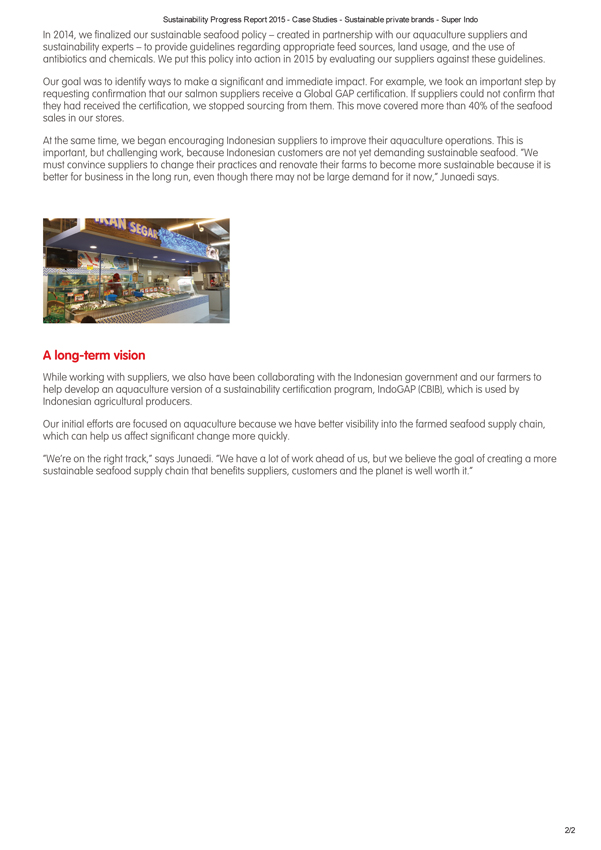
Progress Report 2015 - Case Studies -
private brands - Super Indo
In 2014, we finalized our sustainable seafood policy – created in partnership with our aquaculture suppliers and sustainability experts –to provide guidelines regarding appropriate feed sources, land usage, and the use of antibiotics and chemicals. We put this policy into action in 2015 by evaluating our suppliers against these guidelines.
Our goal was to identify ways to make a significant and immediate impact. For example, we took an important step by requesting confirmation that our salmon suppliers receive a Global GAP certification. If suppliers could not confirm that they had received the certification, we stopped sourcing from them. This move covered more than 40% of the seafood sales in our stores.
At the same time, we began encouraging Indonesian suppliers to improve their aquaculture operations. This is important, but challenging work, because Indonesian customers are not yet demanding sustainable seafood. “We must convince suppliers to change their practices and renovate their farms to become more sustainable because it is better for business in the long run, even though there may not be large demand for it now,” Junaedi says.
A long-term vision
While working with suppliers, we also have been collaborating with the Indonesian government and our farmers to help develop an aquaculture version of a sustainability certification program, IndoGAP (CBIB), which is used by Indonesian agricultural producers.
Our initial efforts are focused on aquaculture because we have better visibility into the farmed seafood supply chain, which can help us affect significant change more quickly.
“We’re on the right track,” says Junaedi. “We have a lot of work ahead of us, but we believe the goal of creating a more sustainable seafood supply chain that benefits suppliers, customers and the planet is well worth it.”
2/2
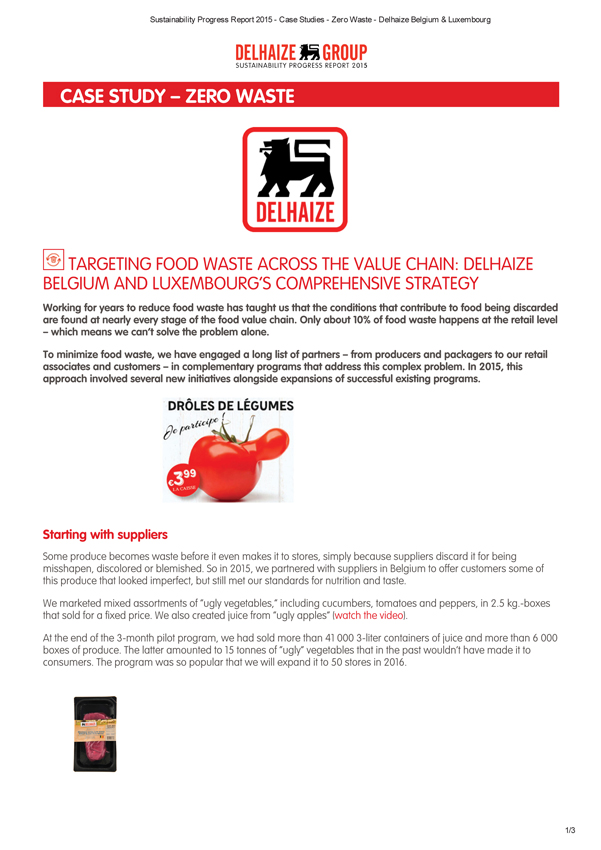
Progress Report 2015 - Case Studies - Zero Waste -
Belgium & Luxembourg
CASE STUDY – ZERO WASTE
TARGETING FOOD WASTE ACROSS THE VALUE CHAIN: DELHAIZE BELGIUM AND LUXEMBOURG’s COMPREHENSIVE STRATEGY
Working for years to reduce food waste has taught us that the conditions that contribute to food being discarded are found at nearly every stage of the food value chain. Only about 10% of food waste happens at the retail level –which means we can’t solve the problem alone.
To minimize food waste, we have engaged a long list of partners – from producers and packagers to our retail associates and customers – in complementary programs that address this complex problem. In 2015, this approach involved several new initiatives alongside expansions of successful existing programs.
Starting with suppliers
Some produce becomes waste before it even makes it to stores, simply because suppliers discard it for being misshapen, discolored or blemished. So in 2015, we partnered with suppliers in Belgium to offer customers some of this produce that looked imperfect, but still met our standards for nutrition and taste.
We marketed mixed assortments of “ugly vegetables,” including cucumbers, tomatoes and peppers, in 2.5 kg.-boxes that sold for a fixed price. We also created juice from “ugly apples” (watch the video).
At the end of the 3-month pilot program, we had sold more than 41 000 3-liter containers of juice and more than 6 000 boxes of produce. The latter amounted to 15 tonnes of “ugly” vegetables that in the past wouldn’t have made it to consumers. The program was so popular that we will expand it to 50 stores in 2016.
1/3
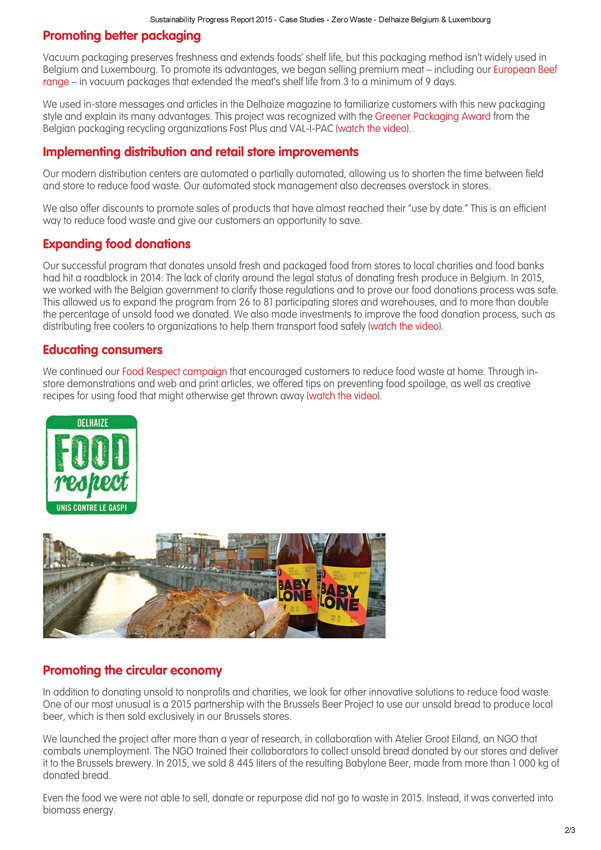
Progress Report 2015 - Case Studies - Zero Waste -
Belgium & Luxembourg
Promoting better packaging
Vacuum packaging preserves freshness and extends foods’ shelf life, but this packaging method isn’t widely used in Belgium and Luxembourg. To promote its advantages, we began selling premium meat – including our European Beef range – in vacuum packages that extended the meat’s shelf life from 3 to a minimum of 9 days.
We used in-store messages and articles in the Delhaize magazine to familiarize customers with this new packaging style and explain its many advantages. This project was recognized with the Greener Packaging Award from the Belgian packaging recycling organizations Fost Plus and VAL-I-PAC (watch the video).
Implementing distribution and retail store improvements
Our modern distribution centers are automated o partially automated, allowing us to shorten the time between field and store to reduce food waste. Our automated stock management also decreases overstock in stores.
We also offer discounts to promote sales of products that have almost reached their “use by date.” This is an efficient way to reduce food waste and give our customers an opportunity to save.
Expanding food donations
Our successful program that donates unsold fresh and packaged food from stores to local charities and food banks had hit a roadblock in 2014: The lack of clarity around the legal status of donating fresh produce in Belgium. In 2015, we worked with the Belgian government to clarify those regulations and to prove our food donations process was safe. This allowed us to expand the program from 26 to 81 participating stores and warehouses, and to more than double the percentage of unsold food we donated. We also made investments to improve the food donation process, such as distributing free coolers to organizations to help them transport food safely (watch the video).
Educating consumers
We continued our Food Respect campaign that encouraged customers to reduce food waste at home. Through in-store demonstrations and web and print articles, we offered tips on preventing food spoilage, as well as creative recipes for using food that might otherwise get thrown away (watch the video).
Promoting the circular economy
In addition to donating unsold to nonprofits and charities, we look for other innovative solutions to reduce food waste. One of our most unusual is a 2015 partnership with the Brussels Beer Project to use our unsold bread to produce local beer, which is then sold exclusively in our Brussels stores.
We launched the project after more than a year of research, in collaboration with Atelier Groot Eiland, an NGO that combats unemployment. The NGO trained their collaborators to collect unsold bread donated by our stores and deliver it to the Brussels brewery. In 2015, we sold 8 445 liters of the resulting Babylone Beer, made from more than 1 000 kg of donated bread.
Even the food we were not able to sell, donate or repurpose did not go to waste in 2015. Instead, it was converted into biomass energy.
2/3
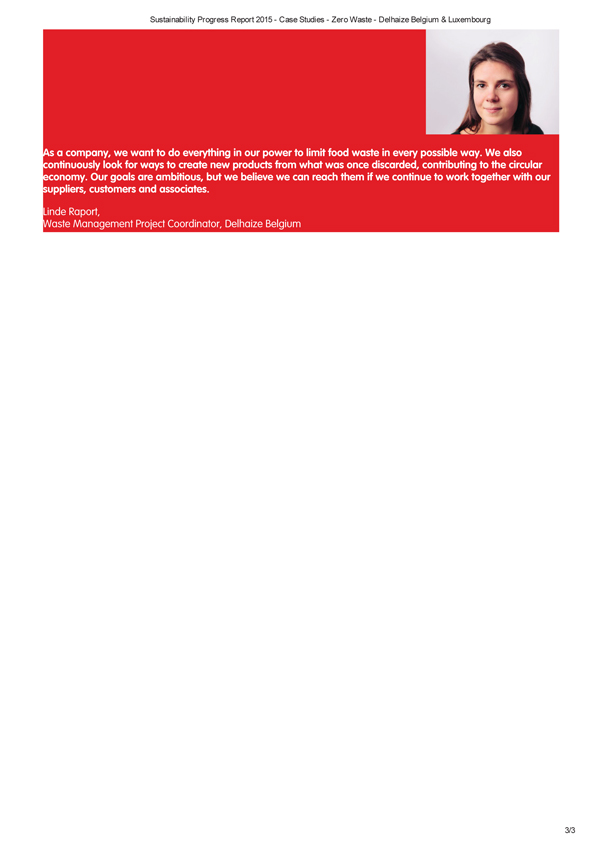
Progress Report 2015 - Case Studies - Zero Waste -
Belgium & Luxembourg
As a company, we want to do everything in our power to limit food waste in every possible way. We also continuously look for ways to create new products from what was once discarded, contributing to the circular economy. Our goals are ambitious, but we believe we can reach them if we continue to work together with our suppliers, customers and associates.
Linde Raport,
Waste Management Project Coordinator, Delhaize Belgium
3/3
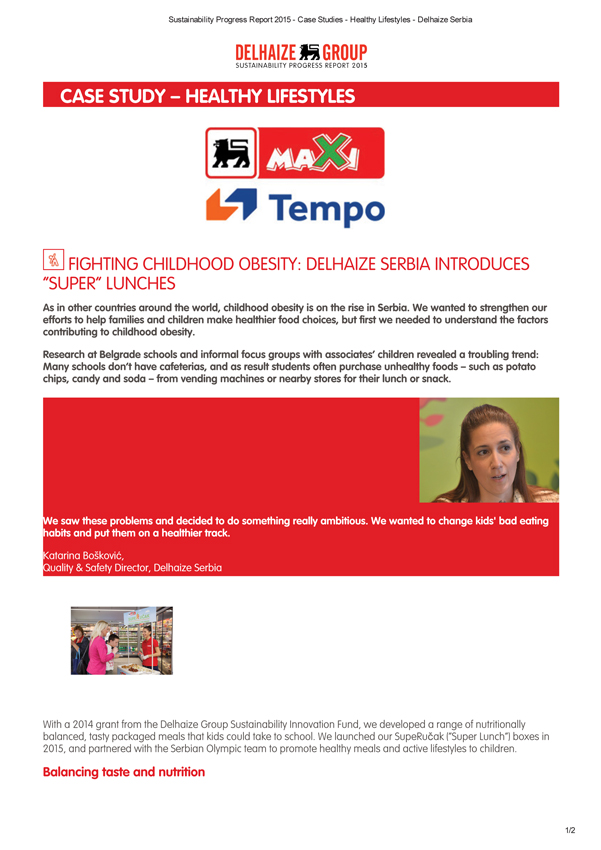
Sustainability Progress Report 2015 - Case Studies - Healthy Lifestyles - Delhaize Serbia
CASE STUDY – HEALTHY LIFESTYLES
FIGHTING CHILDHOOD OBESITY: DELHAIZE SERBIA INTRODUCES “SUPER” LUNCHES
As in other countries around the world, childhood obesity is on the rise in Serbia. We wanted to strengthen our efforts to help families and children make healthier food choices, but first we needed to understand the factors contributing to childhood obesity.
Research at Belgrade schools and informal focus groups with associates– children revealed a troubling trend: Many schools don’t have cafeterias, and as result students often purchase unhealthy foods – such as potato chips, candy and soda – from vending machines or nearby stores for their lunch or snack.
We saw these problems and decided to do something really ambitious. We wanted to change kids’ bad eating habits and put them on a healthier track.
Katarina Boškoviæ,
Quality & Safety Director, Delhaize Serbia
With a 2014 grant from the Delhaize Group Sustainability Innovation Fund, we developed a range of nutritionally balanced, tasty packaged meals that kids could take to school. We launched our SupeRuèakèak (“Super Lunch”) boxes in 2015, and partnered with the Serbian Olympic team to promote healthy meals and active lifestyles to children.
Balancing taste and nutrition
1/2
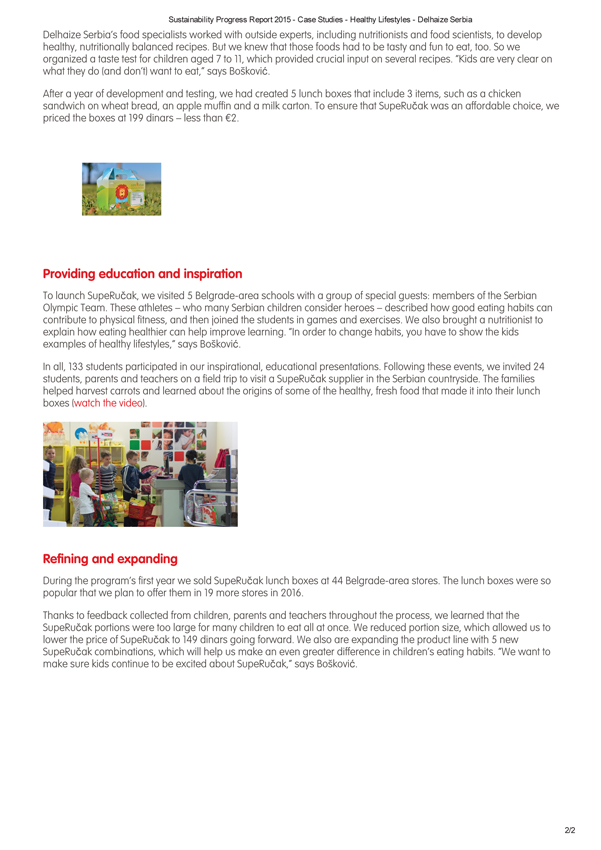
Progress Report 2015 - Case Studies - Healthy
-
Serbia
Delhaize Serbia’s food specialists worked with outside experts, including nutritionists and food scientists, to develop healthy, nutritionally balanced recipes. But we knew that those foods had to be tasty and fun to eat, too. So we organized a taste test for children aged 7 to 11, which provided crucial input on several recipes. “Kids are very clear on what they do (and don’t) want to eat,” says Bošković.
After a year of development and testing, we had created 5 lunch boxes that include 3 items, such as a chicken sandwich on wheat bread, an apple muffin and a milk carton. To ensure that SupeRuèakèak
was an affordable choice, we priced the boxes at 199 dinars – less than €2.
Providing education and inspiration
To launch SupeRuèakèak, we visited 5 Belgrade-area schools with a group of special guests: members of the Serbian Olympic Team. These athletes – who many Serbian children consider heroes – described how good eating habits can contribute to physical fitness, and then joined the students in games and exercises. We also brought a nutritionist to explain how eating healthier can help improve learning. “In order to change habits, you have to show the kids examples of healthy lifestyles,” says Boškoviæ.
In all, 133 students participated in our inspirational, educational presentations. Following these events, we invited 24 students, parents and teachers on a field trip to visit a SupeRuèak
supplier in the Serbian countryside. The families helped harvest carrots and learned about the origins of some of the healthy, fresh food that made it into their lunch boxes (watch the video).
Refining and expanding
During the program’s first year we sold SupeRuèak
lunch boxes at 44 Belgrade-area stores. The lunch boxes were so popular that we plan to offer them in 19 more stores in 2016.
Thanks to feedback collected from children, parents and teachers throughout the process, we learned that the SupeRuèak
portions were too large for many children to eat all at once. We reduced portion size, which allowed us to lower the price of SupeRuèak
to 149 dinars going forward. We also are expanding the product line with 5 new SupeRuèak
combinations, which will help us make an even greater difference in children’s eating habits. –We want to make sure kids continue to be excited about SupeRuèak,” says Boškoviæ.
2/2
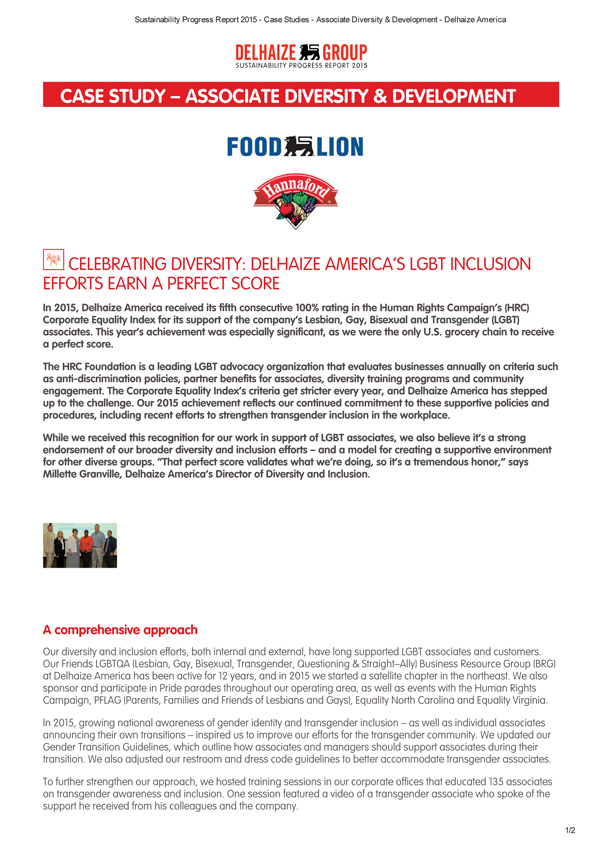
Sustainability Progress Report 2015 - Case Studies - Associate Diversity & Development - Delhaize America
CASE STUDY – ASSOCIATE DIVERSITY & DEVELOPMENT
CELEBRATING DIVERSITY: DELHAIZE AMERICA’s LGBT INCLUSION EFFORTS EARN A PERFECT SCORE
In 2015, Delhaize America received its fifth consecutive 100% rating in the Human Rights Campaign’s (HRC) Corporate Equality Index for its support of the company’s Lesbian, Gay, Bisexual and Transgender (LGBT) associates. This year’s achievement was especially significant, as we were the only U.S. grocery chain to receive a perfect score.
The HRC Foundation is a leading LGBT advocacy organization that evaluates businesses annually on criteria such as anti-discrimination policies, partner benefits for associates, diversity training programs and community engagement. The Corporate Equality Index’s criteria get stricter every year, and Delhaize America has stepped up to the challenge. Our 2015 achievement reflects our continued commitment to these supportive policies and procedures, including recent efforts to strengthen transgender inclusion in the workplace.
While we received this recognition for our work in support of LGBT associates, we also believe it’s a strong endorsement of our broader diversity and inclusion efforts – and a model for creating a supportive environment for other diverse groups. “That perfect score validates what we’re doing, so it’s a tremendous honor,” says Millette Granville, Delhaize America’s Director of Diversity and Inclusion.
A comprehensive approach
Our diversity and inclusion efforts, both internal and external, have long supported LGBT associates and customers. Our Friends LGBTQA (Lesbian, Gay, Bisexual, Transgender, Questioning & Straight–Ally) Business Resource Group (BRG) at Delhaize America has been active for 12 years, and in 2015 we started a satellite chapter in the northeast. We also sponsor and participate in Pride parades throughout our operating area, as well as events with the Human Rights Campaign, PFLAG (Parents, Families and Friends of Lesbians and Gays), Equality North Carolina and Equality Virginia.
In 2015, growing national awareness of gender identity and transgender inclusion – as well as individual associates announcing their own transitions – inspired us to improve our efforts for the transgender community. We updated our Gender Transition Guidelines, which outline how associates and managers should support associates during their transition. We also adjusted our restroom and dress code guidelines to better accommodate transgender associates.
To further strengthen our approach, we hosted training sessions in our corporate offices that educated 135 associates on transgender awareness and inclusion. One session featured a video of a transgender associate who spoke of the support he received from his colleagues and the company.
1/2
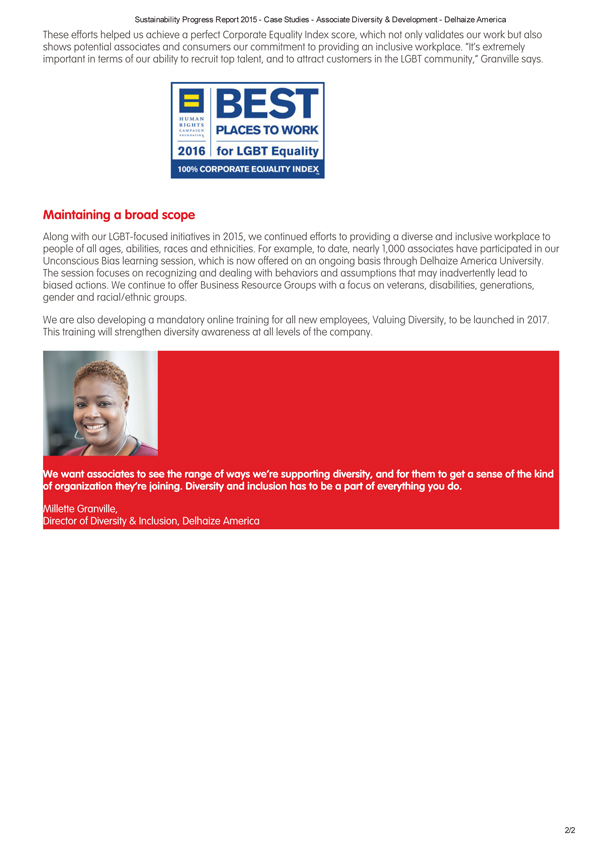
Report 2015 - Case Studies -
&
-
America
These efforts helped us achieve a perfect Corporate Equality Index score, which not only validates our work but also shows potential associates and consumers our commitment to providing an inclusive workplace. “It’s extremely important in terms of our ability to recruit top talent, and to attract customers in the LGBT community,” Granville says.
Maintaining a broad scope
Along with our LGBT-focused initiatives in 2015, we continued efforts to providing a diverse and inclusive workplace to people of all ages, abilities, races and ethnicities. For example, to date, nearly 1,000 associates have participated in our Unconscious Bias learning session, which is now offered on an ongoing basis through Delhaize America University. The session focuses on recognizing and dealing with behaviors and assumptions that may inadvertently lead to biased actions. We continue to offer Business Resource Groups with a focus on veterans, disabilities, generations, gender and racial/ethnic groups.
We are also developing a mandatory online training for all new employees, Valuing Diversity, to be launched in 2017. This training will strengthen diversity awareness at all levels of the company.
We want associates to see the range of ways we’re supporting diversity, and for them to get a sense of the kind of organization they’re joining. Diversity and inclusion has to be a part of everything you do.
Millette Granville,
Director of Diversity & Inclusion, Delhaize America
2/2
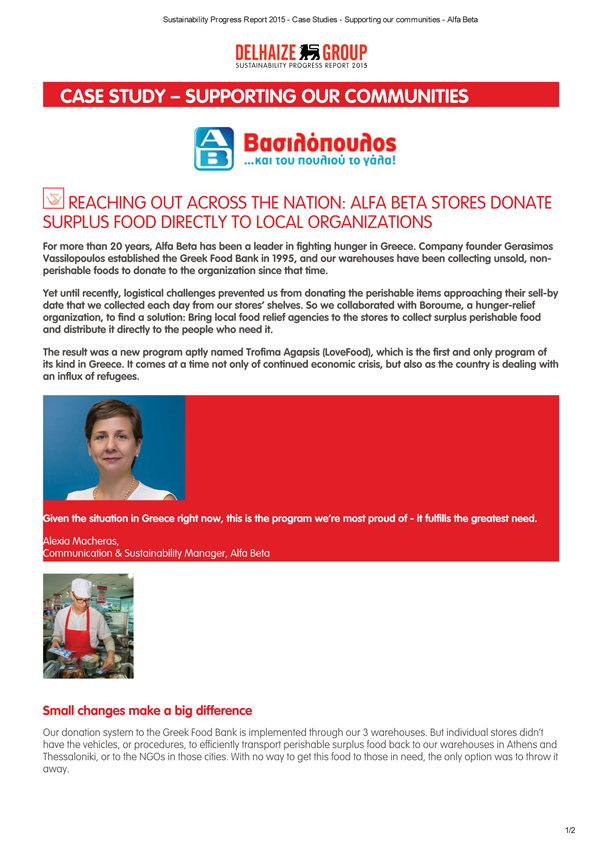
Sustainability Progress Report 2015 - Case Studies - Supporting our communities - Alfa Beta
CASE STUDY – SUPPORTING OUR COMMUNITIES
REACHING OUT ACROSS THE NATION: ALFA BETA STORES DONATE SURPLUS FOOD DIRECTLY TO LOCAL ORGANIZATIONS
For more than 20 years, Alfa Beta has been a leader in fighting hunger in Greece. Company founder Gerasimos Vassilopoulos established the Greek Food Bank in 1995, and our warehouses have been collecting unsold, nonperishable foods to donate to the organization since that time.
Yet until recently, logistical challenges prevented us from donating the perishable items approaching their sell-by date that we collected each day from our stores– shelves. So we collaborated with Boroume, a hunger-relief organization, to find a solution: Bring local food relief agencies to the stores to collect surplus perishable food and distribute it directly to the people who need it.
The result was a new program aptly named Trofima Agapsis (LoveFood), which is the first and only program of its kind in Greece. It comes at a time not only of continued economic crisis, but also as the country is dealing with an influx of refugees.
Given the situation in Greece right now, this is the program we’re most proud of—it fulfills the greatest need.
Alexia Macheras,
Communication & Sustainability Manager, Alfa Beta
Small changes make a big difference
Our donation system to the Greek Food Bank is implemented through our 3 warehouses. But individual stores didn’t have the vehicles, or procedures, to efficiently transport perishable surplus food back to our warehouses in Athens and Thessaloniki, or to the NGOs in those cities. With no way to get this food to those in need, the only option was to throw it away.
1/2
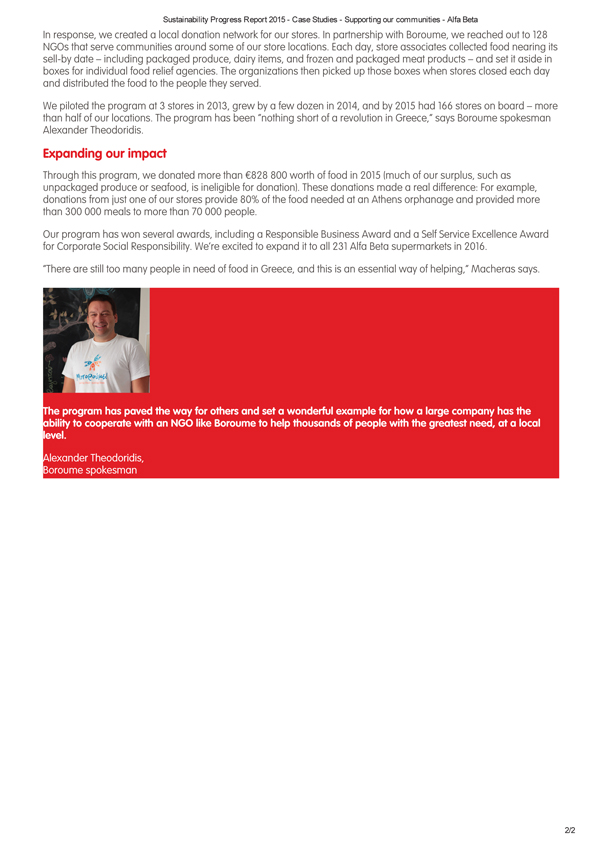
Sustainability Progress Report 2015 - Case Studies - Supporting our communities - Alfa Beta
In response, we created a local donation network for our stores. In partnership with Boroume, we reached out to 128 NGOs that serve communities around some of our store locations. Each day, store associates collected food nearing its sell-by date – including packaged produce, dairy items, and frozen and packaged meat products – and set it aside in boxes for individual food relief agencies. The organizations then picked up those boxes when stores closed each day and distributed the food to the people they served.
We piloted the program at 3 stores in 2013, grew by a few dozen in 2014, and by 2015 had 166 stores on board – more than half of our locations. The program has been “nothing short of a revolution in Greece,” says Boroume spokesman Alexander Theodoridis.
Expanding our impact
Through this program, we donated more than €828 800 worth of food in 2015 (much of our surplus, such as unpackaged produce or seafood, is ineligible for donation). These donations made a real difference: For example, donations from just one of our stores provide 80% of the food needed at an Athens orphanage and provided more than 300 000 meals to more than 70 000 people.
Our program has won several awards, including a Responsible Business Award and a Self Service Excellence Award for Corporate Social Responsibility. We’re excited to expand it to all 231 Alfa Beta supermarkets in 2016.
“There are still too many people in need of food in Greece, and this is an essential way of helping,” Macheras says.
The program has paved the way for others and set a wonderful example for how a large company has the ability to cooperate with an NGO like Boroume to help thousands of people with the greatest need, at a local level.
Alexander Theodoridis,
Boroume spokesman
2/2
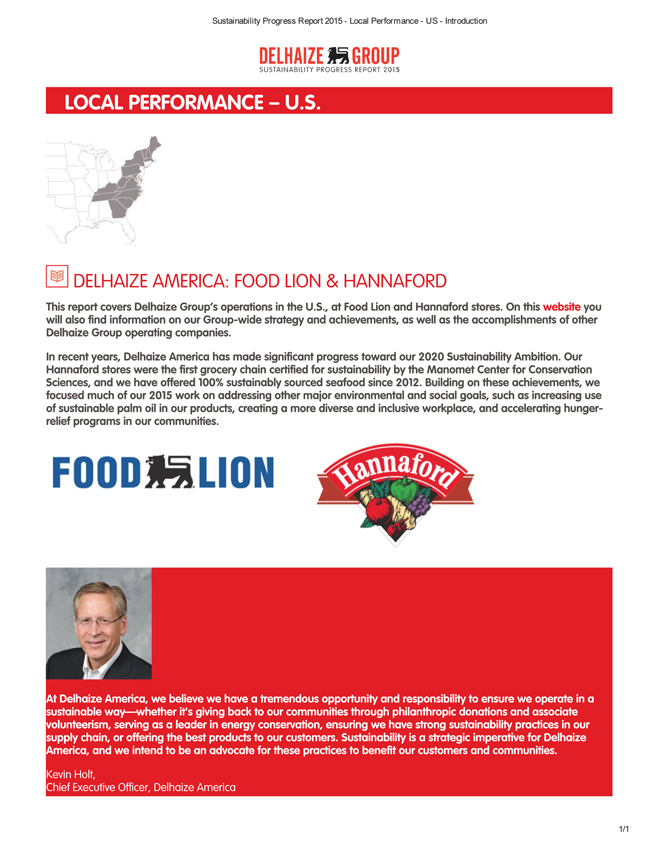
Sustainability Progress Report 2015 - Local Performance - US - Introduction
LOCAL PERFORMANCE – U.S.
DELHAIZE AMERICA: FOOD LION & HANNAFORD
This report covers Delhaize Group’s operations in the U.S., at Food Lion and Hannaford stores. On this website you will also find information on our Group-wide strategy and achievements, as well as the accomplishments of other Delhaize Group operating companies.
In recent years, Delhaize America has made significant progress toward our 2020 Sustainability Ambition. Our Hannaford stores were the first grocery chain certified for sustainability by the Manomet Center for Conservation Sciences, and we have offered 100% sustainably sourced seafood since 2012. Building on these achievements, we focused much of our 2015 work on addressing other major environmental and social goals, such as increasing use of sustainable palm oil in our products, creating a more diverse and inclusive workplace, and accelerating hunger-relief programs in our communities.
At Delhaize America, we believe we have a tremendous opportunity and responsibility to ensure we operate in a sustainable way–whether it’s giving back to our communities through philanthropic donations and associate volunteerism, serving as a leader in energy conservation, ensuring we have strong sustainability practices in our supply chain, or offering the best products to our customers. Sustainability is a strategic imperative for Delhaize America, and we intend to be an advocate for these practices to benefit our customers and communities.
Kevin Holt,
Chief Executive Officer, Delhaize America
1/1
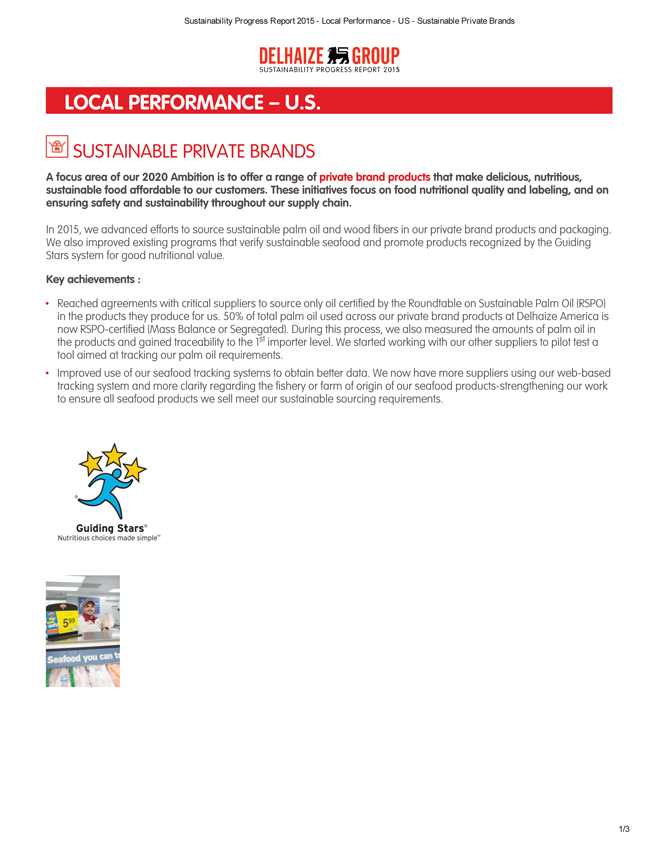
Sustainability Progress Report 2015 - Local Performance - US - Sustainable Private Brands
LOCAL PERFORMANCE – U.S.
[Graphic Appears Here]
SUSTAINABLE PRIVATE BRANDS
A focus area of our 2020 Ambition is to offer a range of private brand products that make delicious, nutritious, sustainable food affordable to our customers. These initiatives focus on food nutritional quality and labeling, and on ensuring safety and sustainability throughout our supply chain.
In 2015, we advanced efforts to source sustainable palm oil and wood fibers in our private brand products and packaging. We also improved existing programs that verify sustainable seafood and promote products recognized by the Guiding Stars system for good nutritional value.
Key achievements :
Reached agreements with critical suppliers to source only oil certified by the Roundtable on Sustainable Palm Oil (RSPO) in the products they produce for us. 50% of total palm oil used across our private brand products at Delhaize America is now RSPO-certified (Mass Balance or Segregated). During this process, we also measured the amounts of palm oil in the products and gained traceability to the 1 importer level. We started working with our other suppliers to pilot test a st tool aimed at tracking our palm oil requirements.
Improved use of our seafood tracking systems to obtain better data. We now have more suppliers using our web-based tracking system and more clarity regarding the fishery or farm of origin of our seafood products-strengthening our work to ensure all seafood products we sell meet our sustainable sourcing requirements.
1/3
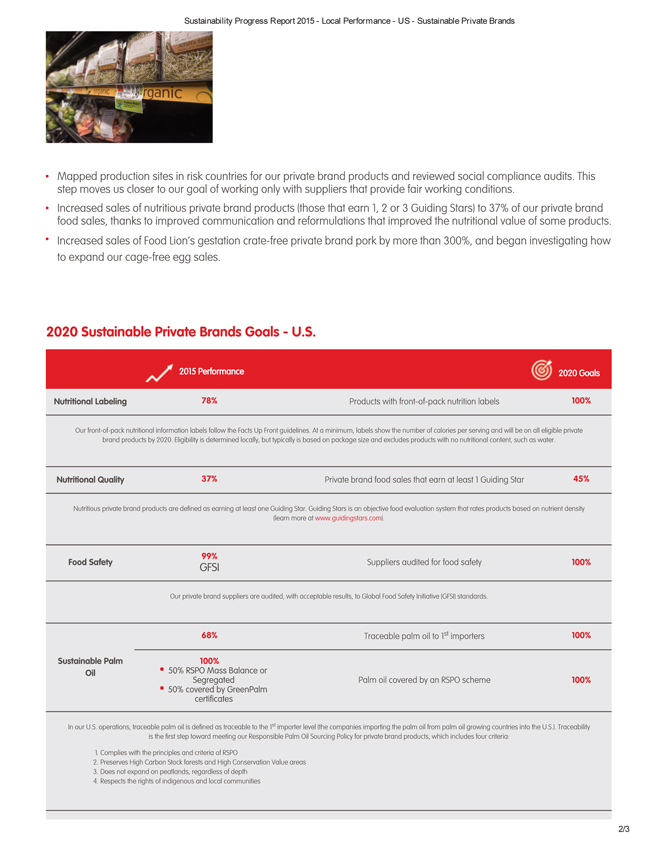
Sustainability Progress Report 2015 - Local Performance - US - Sustainable Private Brands
Mapped production sites in risk countries for our private brand products and reviewed social compliance audits. This step moves us closer to our goal of working only with suppliers that provide fair working conditions.
Increased sales of nutritious private brand products (those that earn 1, 2 or 3 Guiding Stars) to 37% of our private brand food sales, thanks to improved communication and reformulations that improved the nutritional value of some products. Increased sales of Food Lion’s gestation crate-free private brand pork by more than 300%, and began investigating how
to expand our cage-free egg sales.
2020 Sustainable Private Brands Goals—U.S.
2015 Performance
2020 Goals
Nutritional Labeling
78%
Products with front-of-pack nutrition labels
100%
Our front-of-pack nutritional information labels follow the Facts Up Front guidelines. At a minimum, labels show the number of calories per serving and will be on all eligible private
brand products by 2020. Eligibility is determined locally, but typically is based on package size and excludes products with no nutritional content, such as water.
Nutritional Quality
37%
Private brand food sales that earn at least 1 Guiding Star
45%
Nutritious private brand products are defined as earning at least one Guiding Star. Guiding Stars is an objective food evaluation system that rates products based on nutrient density
(learn more at www.guidingstars.com).
99%
Food Safety
GFSI
Suppliers audited for food safety
100%
Our private brand suppliers are audited, with acceptable results, to Global Food Safety Initiative (GFSI) standards.
68%
Traceable palm oil to 1st importers
100%
Sustainable Palm
100%
Oil
50% RSPO Mass Balance or
Segregated
Palm oil covered by an RSPO scheme
100%
50% covered by GreenPalm
certificates
In our U.S. operations, traceable palm oil is defined as traceable to the 1st importer level (the companies importing the palm oil from palm oil growing countries into the U.S.). Traceability
is the first step toward meeting our Responsible Palm Oil Sourcing Policy for private brand products, which includes four criteria:
1.
Complies with the principles and criteria of RSPO
2.
Preserves High Carbon Stock forests and High Conservation Value areas
3.
Does not expand on peatlands, regardless of depth
4.
Respects the rights of indigenous and local communities
2/3
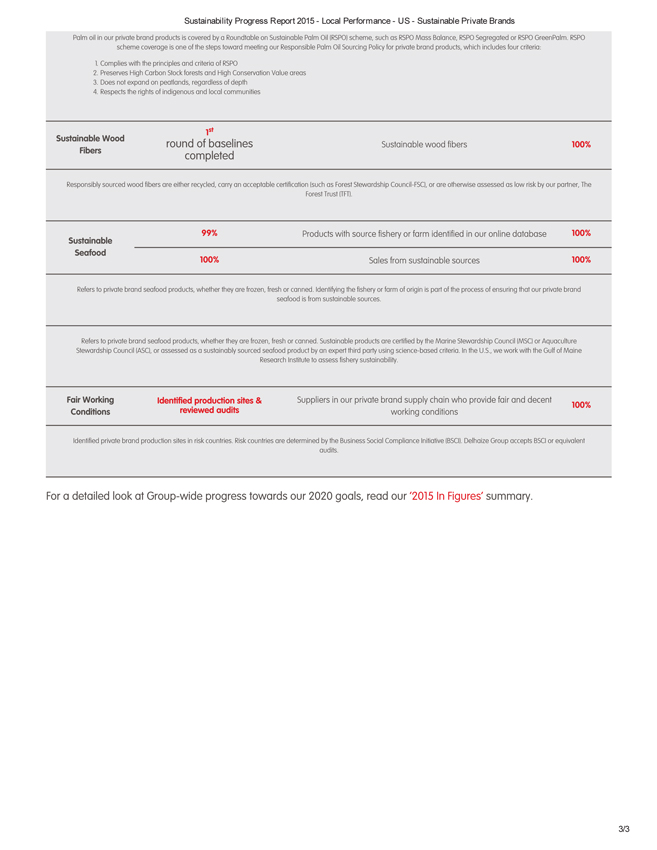
Sustainability Progress Report 2015 - Local Performance - US - Sustainable Private Brands
Palm oil in our private brand products is covered by a Roundtable on Sustainable Palm Oil (RSPO) scheme, such as RSPO Mass Balance, RSPO Segregated or RSPO GreenPalm. RSPO scheme coverage is one of the steps toward meeting our Responsible Palm Oil Sourcing Policy for private brand products, which includes four criteria:
Complies with the principles and criteria of RSPO
Preserves High Carbon Stock forests and High Conservation Value areas
Does not expand on peatlands, regardless of depth
Respects the rights of indigenous and local communities
1st
Sustainable Wood
round of baselines
Sustainable wood fibers
100%
Fibers
completed
Responsibly sourced wood fibers are either recycled, carry an acceptable certification (such as Forest Stewardship Council-FSC), or are otherwise assessed as low risk by our partner, The Forest Trust (TFT).
99%
Products with source fishery or farm identified in our online database
100%
Sustainable
Seafood
100%
Sales from sustainable sources
100%
Refers to private brand seafood products, whether they are frozen, fresh or canned. Identifying the fishery or farm of origin is part of the process of ensuring that our private brand seafood is from sustainable sources.
Refers to private brand seafood products, whether they are frozen, fresh or canned. Sustainable products are certified by the Marine Stewardship Council (MSC) or Aquaculture Stewardship Council (ASC), or assessed as a sustainably sourced seafood product by an expert third party using science-based criteria. In the U.S., we work with the Gulf of Maine Research Institute to assess fishery sustainability.
Fair Working
Identified production sites &
Suppliers in our private brand supply chain who provide fair and decent
100%
Conditions
reviewed audits
working conditions
Identified private brand production sites in risk countries. Risk countries are determined by the Business Social Compliance Initiative (BSCI). Delhaize Group accepts BSCI or equivalent audits.
For a detailed look at Group-wide progress towards our 2020 goals, read our –2015 In Figures– summary.
3/3
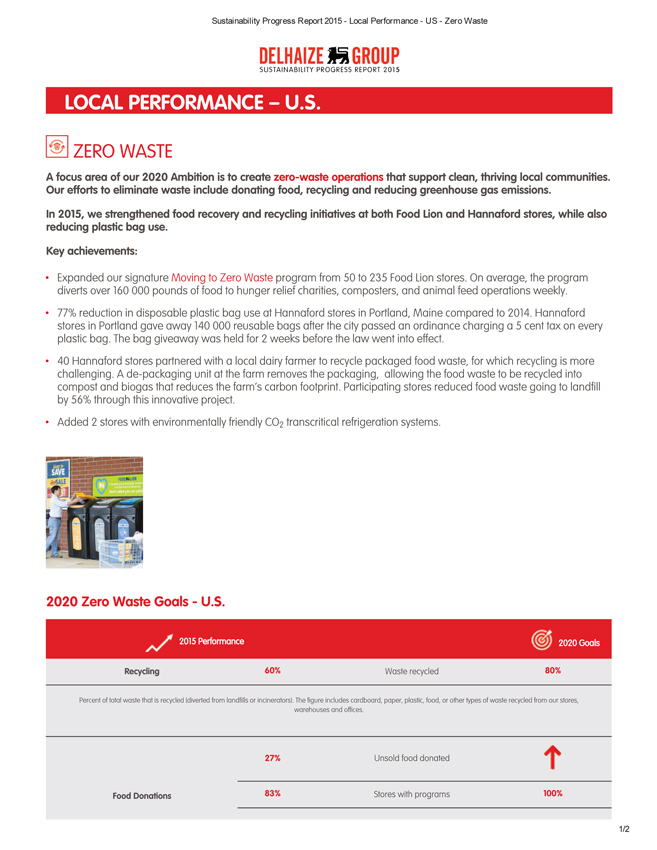
Sustainability Progress Report 2015 - Local Performance - US - Zero Waste
LOCAL PERFORMANCE – U.S.
ZERO WASTE
A focus area of our 2020 Ambition is to create zero-waste operations that support clean, thriving local communities. Our efforts to eliminate waste include donating food, recycling and reducing greenhouse gas emissions.
In 2015, we strengthened food recovery and recycling initiatives at both Food Lion and Hannaford stores, while also reducing plastic bag use.
Key achievements:
Expanded our signature Moving to Zero Waste program from 50 to 235 Food Lion stores. On average, the program diverts over 160 000 pounds of food to hunger relief charities, composters, and animal feed operations weekly. 77% reduction in disposable plastic bag use at Hannaford stores in Portland, Maine compared to 2014. Hannaford stores in Portland gave away 140 000 reusable bags after the city passed an ordinance charging a 5 cent tax on every plastic bag. The bag giveaway was held for 2 weeks before the law went into effect.
40 Hannaford stores partnered with a local dairy farmer to recycle packaged food waste, for which recycling is more challenging. A de-packaging unit at the farm removes the packaging, allowing the food waste to be recycled into compost and biogas that reduces the farm’s carbon footprint. Participating stores reduced food waste going to landfill by 56% through this innovative project.
Added 2 stores with environmentally friendly CO transcritical refrigeration systems. 2
2020 Zero Waste Goals—U.S.
2015 Performance
2020 Goals
Recycling
60%
Waste recycled
80%
Percent of total waste that is recycled (diverted from landfills or incinerators). The figure includes cardboard, paper, plastic, food, or other types of waste recycled from our stores, warehouses and offices.
27%
Unsold food donated
Food Donations
83%
Stores with programs
100%
1/2
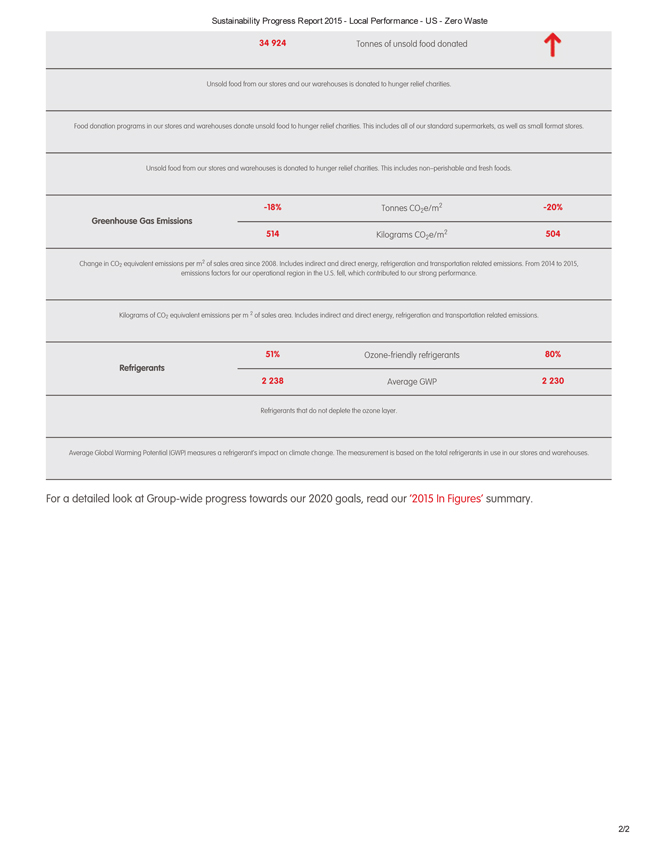
Sustainability Progress Report 2015 - Local Performance - US - Zero Waste
34 924 Tonnes of unsold food donated
[Graphic Appears Here]
Unsold food from our stores and our warehouses is donated to hunger relief charities.
Food donation programs in our stores and warehouses donate unsold food to hunger relief charities. This includes all of our standard supermarkets, as well as small format stores.
Unsold food from our stores and warehouses is donated to hunger relief charities. This includes non–perishable and fresh foods.
-18%
Tonnes CO2 e/m2
-20%
Greenhouse Gas Emissions
514
Kilograms CO2 e/m2
504
Change in CO equivalent emissions per m of sales area since 2008. Includes indirect and direct energy, refrigeration and transportation related emissions. From 2014 to 2015, 2 2 emissions factors for our operational region in the U.S. fell, which contributed to our strong performance.
Kilograms of CO equivalent emissions per m of sales area. Includes indirect and direct energy, refrigeration and transportation related emissions. 2 2
51%
Ozone-friendly refrigerants
80%
Refrigerants
2 |
| 238 |
Average GWP
2 |
| 230 |
Refrigerants that do not deplete the ozone layer.
Average Global Warming Potential (GWP) measures a refrigerant’s impact on climate change. The measurement is based on the total refrigerants in use in our stores and warehouses.
For a detailed look at Group-wide progress towards our 2020 goals, read our –2015 In Figures– summary.
2/2
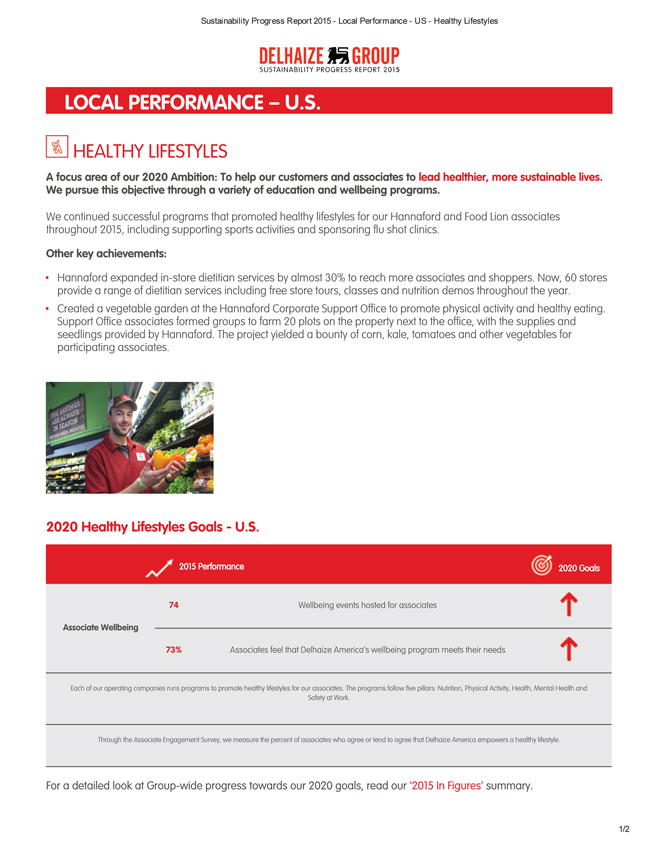
Sustainability Progress Report 2015 - Local Performance - US - Healthy Lifestyles
[Graphic Appears Here]
LOCAL PERFORMANCE – U.S.
HEALTHY LIFESTYLES
A focus area of our 2020 Ambition: To help our customers and associates to lead healthier, more sustainable lives. We pursue this objective through a variety of education and wellbeing programs.
We continued successful programs that promoted healthy lifestyles for our Hannaford and Food Lion associates throughout 2015, including supporting sports activities and sponsoring flu shot clinics.
Other key achievements:
Hannaford expanded in-store dietitian services by almost 30% to reach more associates and shoppers. Now, 60 stores provide a range of dietitian services including free store tours, classes and nutrition demos throughout the year. Created a vegetable garden at the Hannaford Corporate Support Office to promote physical activity and healthy eating. Support Office associates formed groups to farm 20 plots on the property next to the office, with the supplies and seedlings provided by Hannaford. The project yielded a bounty of corn, kale, tomatoes and other vegetables for participating associates.
2020 Healthy Lifestyles Goals—U.S.
2015 Performance
2020 Goals
74
Wellbeing events hosted for associates
Associate Wellbeing
73%
Associates feel that Delhaize America’s wellbeing program meets their needs
Each of our operating companies runs programs to promote healthy lifestyles for our associates. The programs follow five pillars: Nutrition, Physical Activity, Health, Mental Health and Safety at Work.
Through the Associate Engagement Survey, we measure the percent of associates who agree or tend to agree that Delhaize America empowers a healthy lifestyle.
For a detailed look at Group-wide progress towards our 2020 goals, read our –2015 In Figures– summary.
1/2
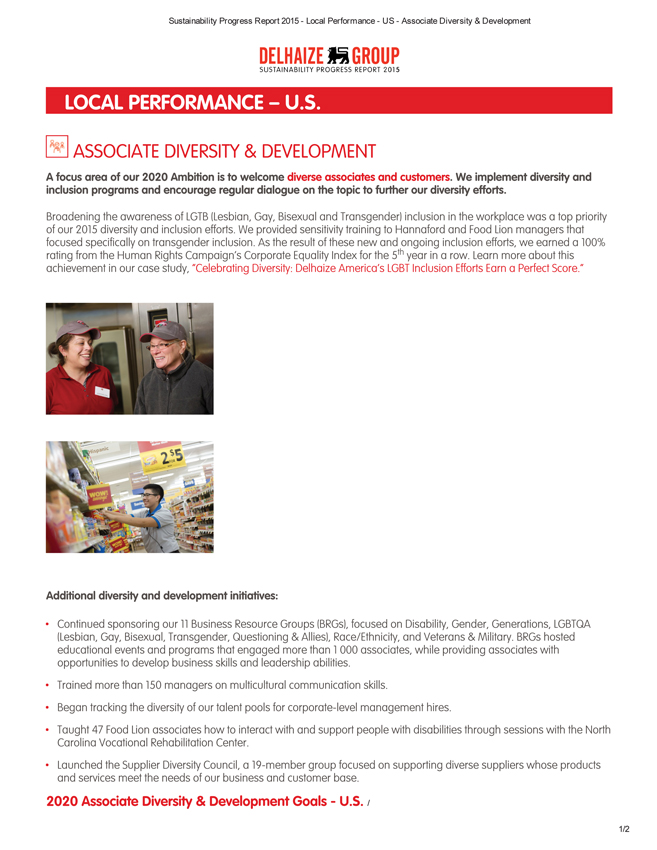
Sustainability Progress Report 2015 - Local Performance - US - Associate Diversity & Development
LOCAL PERFORMANCE – U.S.
[Graphic Appears Here]
ASSOCIATE DIVERSITY & DEVELOPMENT
A focus area of our 2020 Ambition is to welcome diverse associates and customers. We implement diversity and inclusion programs and encourage regular dialogue on the topic to further our diversity efforts.
Broadening the awareness of LGTB (Lesbian, Gay, Bisexual and Transgender) inclusion in the workplace was a top priority of our 2015 diversity and inclusion efforts. We provided sensitivity training to Hannaford and Food Lion managers that focused specifically on transgender inclusion. As the result of these new and ongoing inclusion efforts, we earned a 100% rating from the Human Rights Campaign’s Corporate Equality Index for the 5 year in a row. Learn more about this th achievement in our case study, –Celebrating Diversity: Delhaize America’s LGBT Inclusion Efforts Earn a Perfect Score.–
Additional diversity and development initiatives:
Continued sponsoring our 11 Business Resource Groups (BRGs), focused on Disability, Gender, Generations, LGBTQA (Lesbian, Gay, Bisexual, Transgender, Questioning & Allies), Race/Ethnicity, and Veterans & Military. BRGs hosted educational events and programs that engaged more than 1 000 associates, while providing associates with opportunities to develop business skills and leadership abilities.
Trained more than 150 managers on multicultural communication skills. Began tracking the diversity of our talent pools for corporate-level management hires.
Taught 47 Food Lion associates how to interact with and support people with disabilities through sessions with the North Carolina Vocational Rehabilitation Center.
Launched the Supplier Diversity Council, a 19-member group focused on supporting diverse suppliers whose products and services meet the needs of our business and customer base.
2020 Associate Diversity & Development Goals—U.S. /
1/2
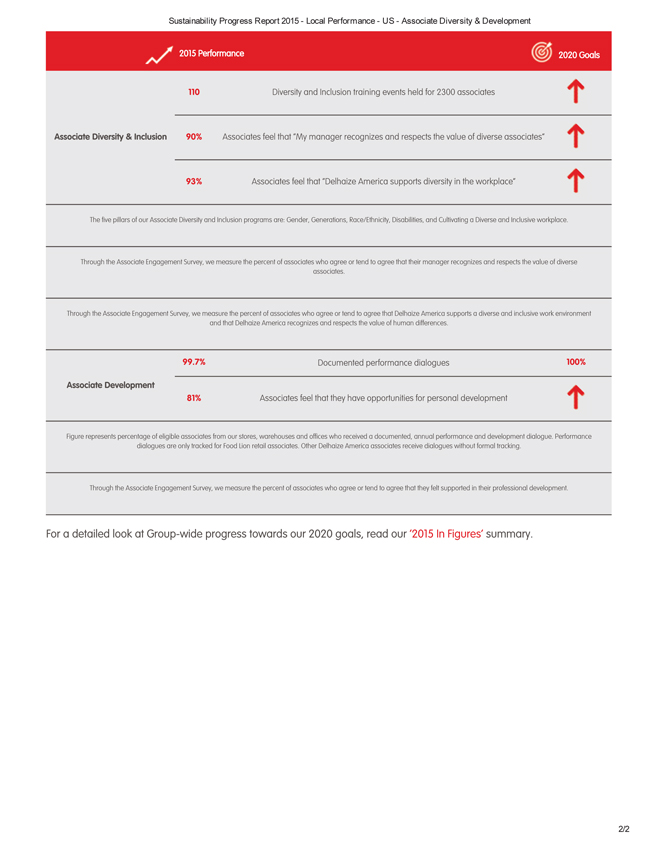
Sustainability Progress Report 2015 - Local Performance - US - Associate Diversity & Development
2015 Performance
2020 Goals
110
Diversity and Inclusion training events held for 2300 associates
Associate Diversity & Inclusion 90%
Associates feel that –My manager recognizes and respects the value of diverse associates–
93%
Associates feel that –Delhaize America supports diversity in the workplace–
The five pillars of our Associate Diversity and Inclusion programs are: Gender, Generations, Race/Ethnicity, Disabilities, and Cultivating a Diverse and Inclusive workplace.
Through the Associate Engagement Survey, we measure the percent of associates who agree or tend to agree that their manager recognizes and respects the value of diverse
associates.
Through the Associate Engagement Survey, we measure the percent of associates who agree or tend to agree that Delhaize America supports a diverse and inclusive work environment
and that Delhaize America recognizes and respects the value of human differences.
99.7%
Documented performance dialogues
100%
Associate Development
81%
Associates feel that they have opportunities for personal development
Figure represents percentage of eligible associates from our stores, warehouses and offices who received a documented, annual performance and development dialogue. Performance
dialogues are only tracked for Food Lion retail associates. Other Delhaize America associates receive dialogues without formal tracking.
Through the Associate Engagement Survey, we measure the percent of associates who agree or tend to agree that they felt supported in their professional development.
For a detailed look at Group-wide progress towards our 2020 goals, read our –2015 In Figures– summary.
2/2
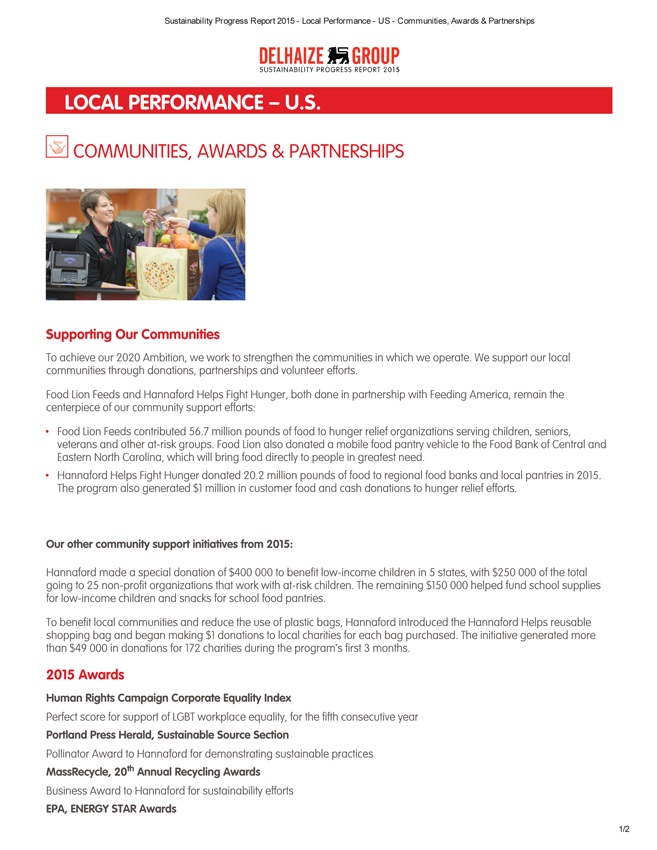
Sustainability Progress Report 2015 - Local Performance - US - Communities, Awards & Partnerships
LOCAL PERFORMANCE – U.S.
COMMUNITIES, AWARDS & PARTNERSHIPS
Supporting Our Communities
To achieve our 2020 Ambition, we work to strengthen the communities in which we operate. We support our local communities through donations, partnerships and volunteer efforts.
Food Lion Feeds and Hannaford Helps Fight Hunger, both done in partnership with Feeding America, remain the centerpiece of our community support efforts:
Food Lion Feeds contributed 56.7 million pounds of food to hunger relief organizations serving children, seniors, veterans and other at-risk groups. Food Lion also donated a mobile food pantry vehicle to the Food Bank of Central and Eastern North Carolina, which will bring food directly to people in greatest need.
Hannaford Helps Fight Hunger donated 20.2 million pounds of food to regional food banks and local pantries in 2015. The program also generated $1 million in customer food and cash donations to hunger relief efforts.
Our other community support initiatives from 2015:
Hannaford made a special donation of $400 000 to benefit low-income children in 5 states, with $250 000 of the total going to 25 non-profit organizations that work with at-risk children. The remaining $150 000 helped fund school supplies for low-income children and snacks for school food pantries.
To benefit local communities and reduce the use of plastic bags, Hannaford introduced the Hannaford Helps reusable shopping bag and began making $1 donations to local charities for each bag purchased. The initiative generated more than $49 000 in donations for 172 charities during the program’s first 3 months.
2015 Awards
Human Rights Campaign Corporate Equality Index
Perfect score for support of LGBT workplace equality, for the fifth consecutive year
Portland Press Herald, Sustainable Source Section
Pollinator Award to Hannaford for demonstrating sustainable practices
MassRecycle, 20 Annual Recycling Awards th
Business Award to Hannaford for sustainability efforts
EPA, ENERGY STAR Awards
1/2
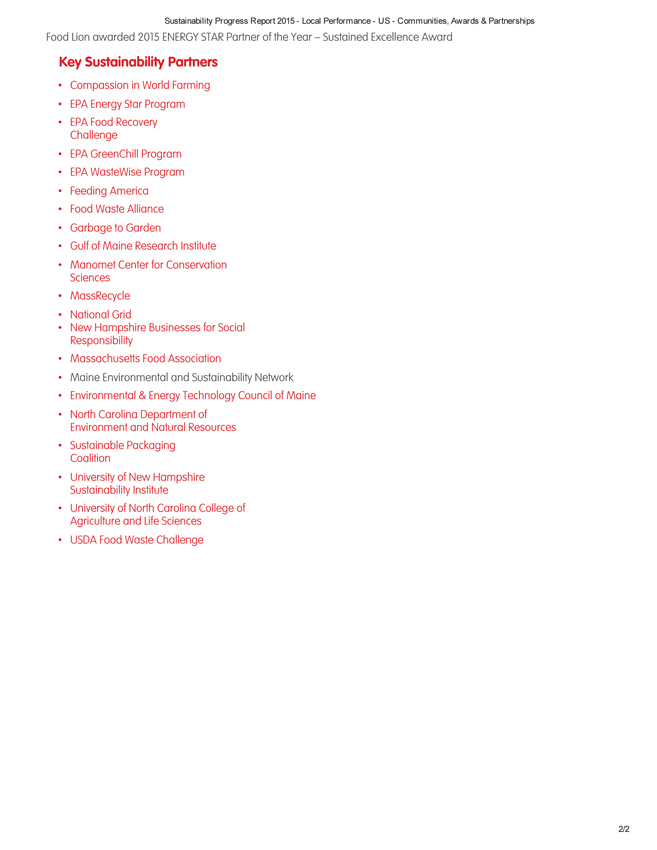
Sustainability Progress Report 2015 - Local Performance - US - Communities, Awards & Partnerships
Food Lion awarded 2015 ENERGY STAR Partner of the Year – Sustained Excellence Award
Key Sustainability Partners
Compassion in World Farming EPA Energy Star Program EPA Food Recovery Challenge EPA GreenChill Program EPA WasteWise Program Feeding America Food Waste Alliance Garbage to Garden Gulf of Maine Research Institute Manomet Center for Conservation Sciences MassRecycle National Grid New Hampshire Businesses for Social Responsibility Massachusetts Food Association Maine Environmental and Sustainability Network Environmental & Energy Technology Council of Maine North Carolina Department of Environment and Natural Resources Sustainable Packaging Coalition University of New Hampshire Sustainability Institute University of North Carolina College of Agriculture and Life Sciences USDA Food Waste Challenge
2/2
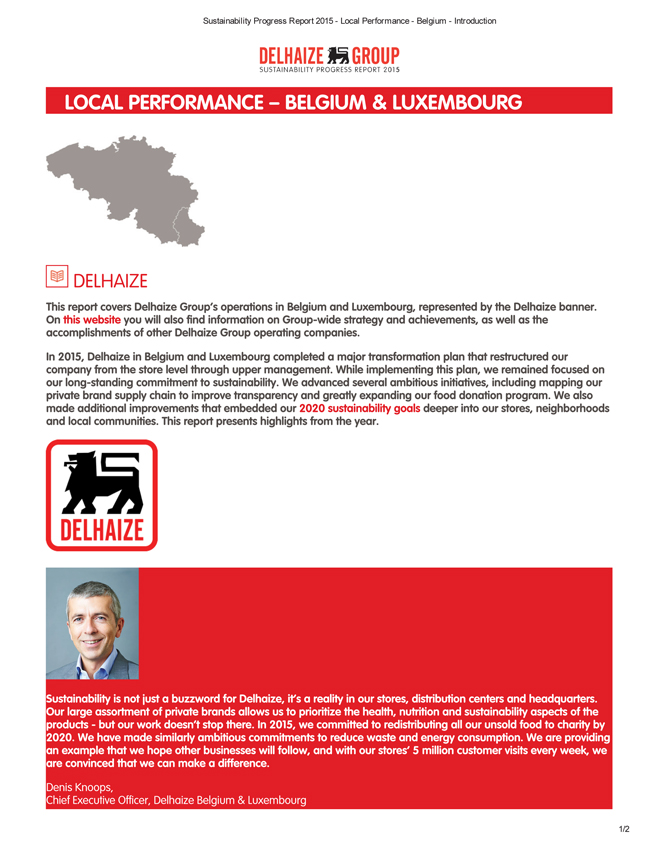
Sustainability Progress Report 2015 - Local Performance - Belgium - Introduction
LOCAL PERFORMANCE – BELGIUM & LUXEMBOURG
DELHAIZE
This report covers Delhaize Group’s operations in Belgium and Luxembourg, represented by the Delhaize banner. On this website you will also find information on Group-wide strategy and achievements, as well as the accomplishments of other Delhaize Group operating companies.
In 2015, Delhaize in Belgium and Luxembourg completed a major transformation plan that restructured our company from the store level through upper management. While implementing this plan, we remained focused on our long-standing commitment to sustainability. We advanced several ambitious initiatives, including mapping our private brand supply chain to improve transparency and greatly expanding our food donation program. We also made additional improvements that embedded our 2020 sustainability goals deeper into our stores, neighborhoods and local communities. This report presents highlights from the year.
Sustainability is not just a buzzword for Delhaize, it’s a reality in our stores, distribution centers and headquarters. Our large assortment of private brands allows us to prioritize the health, nutrition and sustainability aspects of the products—but our work doesn’t stop there. In 2015, we committed to redistributing all our unsold food to charity by 2020. We have made similarly ambitious commitments to reduce waste and energy consumption. We are providing an example that we hope other businesses will follow, and with our stores’ 5 million customer visits every week, we are convinced that we can make a difference.
Denis Knoops,
Chief Executive Officer, Delhaize Belgium & Luxembourg
1/2
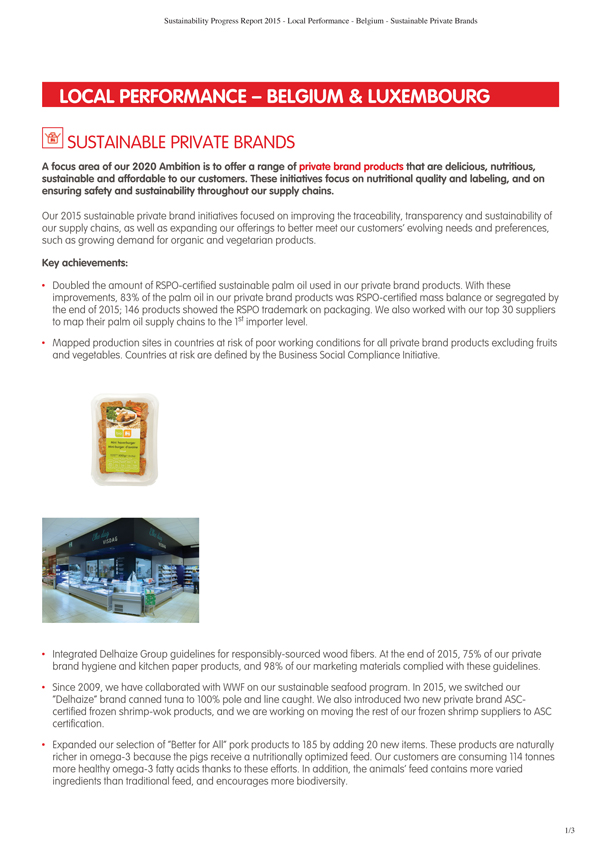
Sustainability Progress Report 2015—Local Performance—Belgium—Sustainable Private Brands
LOCAL PERFORMANCE – BELGIUM & LUXEMBOURG
SUSTAINABLE PRIVATE BRANDS
A focus area of our 2020 Ambition is to offer a range of private brand products that are delicious, nutritious, sustainable and affordable to our customers. These initiatives focus on nutritional quality and labeling, and on ensuring safety and sustainability throughout our supply chains.
Our 2015 sustainable private brand initiatives focused on improving the traceability, transparency and sustainability of our supply chains, as well as expanding our offerings to better meet our customers– evolving needs and preferences, such as growing demand for organic and vegetarian products.
Key achievements:
Doubled the amount of RSPO-certified sustainable palm oil used in our private brand products. With these improvements, 83% of the palm oil in our private brand products was RSPO-certified mass balance or segregated by the end of 2015; 146 products showed the RSPO trademark on packaging. We also worked with our top 30 suppliers to map their palm oil supply chains to the 1st importer level.
Mapped production sites in countries at risk of poor working conditions for all private brand products excluding fruits and vegetables. Countries at risk are defined by the Business Social Compliance Initiative.
Integrated Delhaize Group guidelines for responsibly-sourced wood fibers. At the end of 2015, 75% of our private brand hygiene and kitchen paper products, and 98% of our marketing materials complied with these guidelines. Since 2009, we have collaborated with WWF on our sustainable seafood program. In 2015, we switched our –Delhaize– brand canned tuna to 100% pole and line caught. We also introduced two new private brand ASC-certified frozen shrimp-wok products, and we are working on moving the rest of our frozen shrimp suppliers to ASC certification.
Expanded our selection of –Better for All– pork products to 185 by adding 20 new items. These products are naturally richer in omega-3 because the pigs receive a nutritionally optimized feed. Our customers are consuming 114 tonnes more healthy omega-3 fatty acids thanks to these efforts. In addition, the animals– feed contains more varied ingredients than traditional feed, and encourages more biodiversity.
1/3
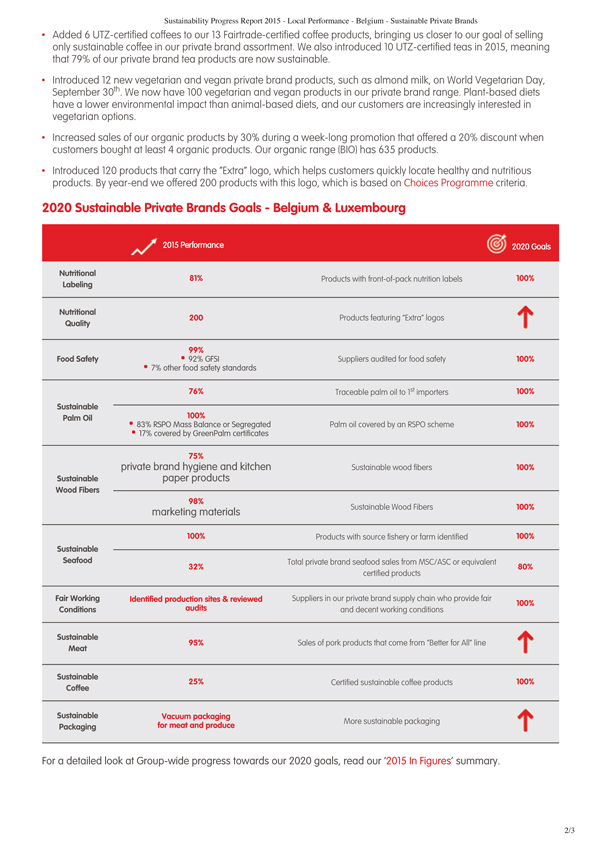
Sustainability Progress Report 2015—Local Performance—Belgium—Sustainable Private Brands
Added 6 UTZ-certified coffees to our 13 Fairtrade-certified coffee products, bringing us closer to our goal of selling only sustainable coffee in our private brand assortment. We also introduced 10 UTZ-certified teas in 2015, meaning that 79% of our private brand tea products are now sustainable.
Introduced 12 new vegetarian and vegan private brand products, such as almond milk, on World Vegetarian Day, September 30. We now have 100 vegetarian and vegan products in our private brand range. Plant-based diets th have a lower environmental impact than animal-based diets, and our customers are increasingly interested in vegetarian options.
Increased sales of our organic products by 30% during a week-long promotion that offered a 20% discount when customers bought at least 4 organic products. Our organic range (BIO) has 635 products.
Introduced 120 products that carry the –Extra– logo, which helps customers quickly locate healthy and nutritious products. By year-end we offered 200 products with this logo, which is based on Choices Programme criteria.
2020 Sustainable Private Brands Goals—Belgium & Luxembourg
2015 Performance
2020 Goals
Nutritional
81%
Products with front-of-pack nutrition labels
100%
Labeling
Nutritional
Quality
200
Products featuring –Extra– logos
99%
Food Safety
92% GFSI
Suppliers audited for food safety
100%
7% other food safety standards
76%
Traceable palm oil to 1st importers
100%
Sustainable
Palm Oil
100%
83% RSPO Mass Balance or Segregated
Palm oil covered by an RSPO scheme
100%
17% covered by GreenPalm certificates
75%
private brand hygiene and kitchen
Sustainable wood fibers
100%
Sustainable
paper products
Wood Fibers
98%
marketing materials
Sustainable Wood Fibers
100%
100%
Products with source fishery or farm identified
100%
Sustainable
Seafood
Total private brand seafood sales from MSC/ASC or equivalent
32%
80%
certified products
Fair Working
Identified production sites & reviewed
Suppliers in our private brand supply chain who provide fair
100%
Conditions
audits
and decent working conditions
Sustainable
Meat
95%
Sales of pork products that come from –Better for All– line
Sustainable
25%
Certified sustainable coffee products
100%
Coffee
Sustainable
Vacuum packaging
Packaging
for meat and produce
More sustainable packaging
For a detailed look at Group-wide progress towards our 2020 goals, read our –2015 In Figures– summary.
2/3
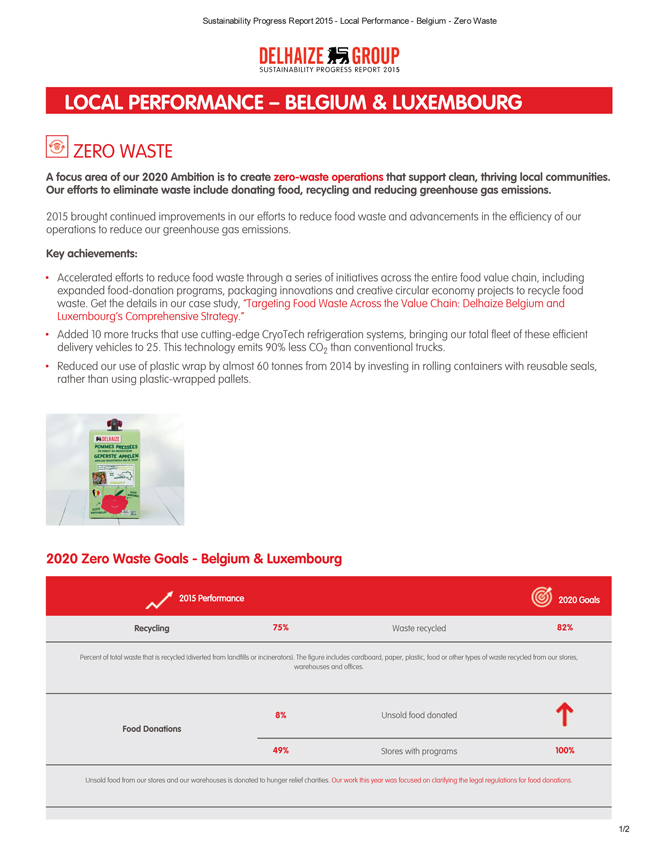
Sustainability Progress Report 2015 - Local Performance - Belgium - Zero Waste
LOCAL PERFORMANCE – BELGIUM & LUXEMBOURG
[Graphic Appears Here]
ZERO WASTE
A focus area of our 2020 Ambition is to create zero-waste operations that support clean, thriving local communities. Our efforts to eliminate waste include donating food, recycling and reducing greenhouse gas emissions.
2015 brought continued improvements in our efforts to reduce food waste and advancements in the efficiency of our operations to reduce our greenhouse gas emissions.
Key achievements:
Accelerated efforts to reduce food waste through a series of initiatives across the entire food value chain, including expanded food-donation programs, packaging innovations and creative circular economy projects to recycle food waste. Get the details in our case study, –Targeting Food Waste Across the Value Chain: Delhaize Belgium and Luxembourg’s Comprehensive Strategy.– Added 10 more trucks that use cutting-edge CryoTech refrigeration systems, bringing our total fleet of these efficient delivery vehicles to 25. This technology emits 90% less CO than conventional trucks. 2 Reduced our use of plastic wrap by almost 60 tonnes from 2014 by investing in rolling containers with reusable seals, rather than using plastic-wrapped pallets.
2020 Zero Waste Goals—Belgium
& Luxembourg
2015 Performance
2020 Goals
Recycling
75%
Waste recycled
82%
Percent of total waste that is recycled (diverted from landfills or incinerators). The figure includes cardboard, paper, plastic, food or other types of waste recycled from our stores, warehouses and offices.
8%
Unsold food donated
Food Donations
49%
Stores with programs
100%
Unsold food from our stores and our warehouses is donated to hunger relief charities. Our work this year was focused on clarifying the legal regulations for food donations.
1/2
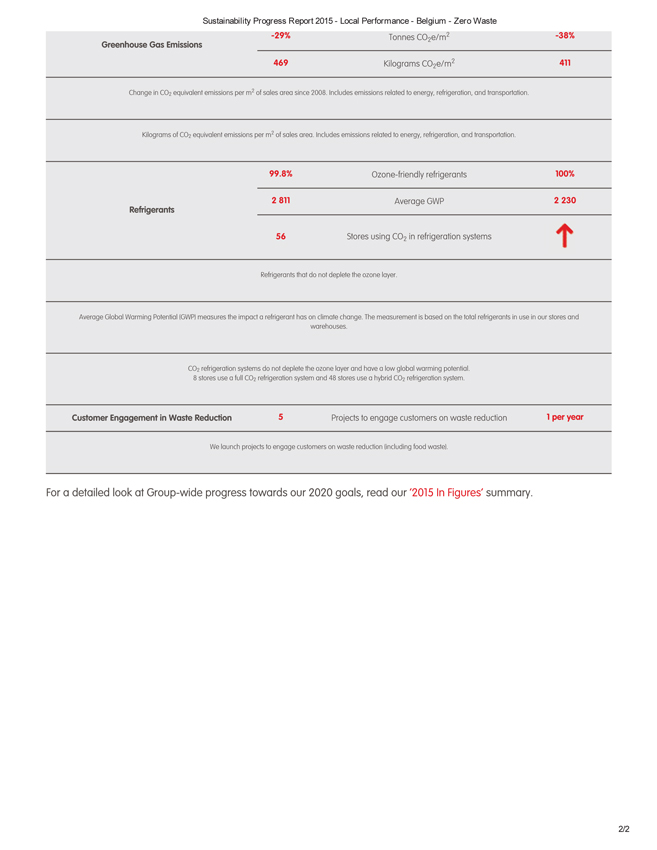
Sustainability Progress Report 2015 - Local Performance - Belgium - Zero Waste
Greenhouse Gas Emissions
-29%
Tonnes CO2 e/m2
-38%
469
Kilograms CO2 e/m2
411
Change in CO2 equivalent emissions per m2 of sales area since 2008. Includes emissions related to energy, refrigeration, and transportation.
Kilograms of CO2 equivalent emissions per m2 of sales area. Includes emissions related to energy, refrigeration, and transportation.
99.8%
Ozone-friendly refrigerants
100%
2 |
| 811 |
Average GWP
2 |
| 230 |
Refrigerants
56
Stores using CO2 in refrigeration systems
Refrigerants that do not deplete the ozone layer.
Average Global Warming Potential (GWP) measures the impact a refrigerant has on climate change. The measurement is based on the total refrigerants in use in our stores and warehouses.
CO2 refrigeration systems do not deplete the ozone layer and have a low global warming potential.
8 |
| stores use a full CO2 refrigeration system and 48 stores use a hybrid CO2 refrigeration system. |
Customer Engagement in Waste Reduction
5 |
|
Projects to engage customers on waste reduction
1 |
| per year |
We launch projects to engage customers on waste reduction (including food waste).
For a detailed look at Group-wide progress towards our 2020 goals, read our –2015 In Figures– summary.
2/2
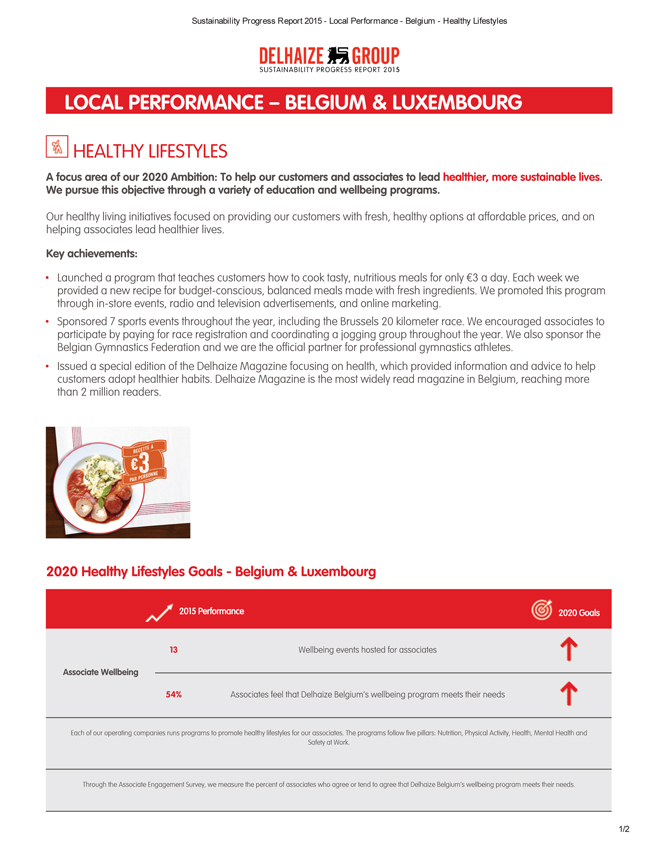
Sustainability Progress Report 2015 - Local Performance - Belgium - Healthy Lifestyles
LOCAL PERFORMANCE – BELGIUM & LUXEMBOURG
HEALTHY LIFESTYLES
A focus area of our 2020 Ambition: To help our customers and associates to lead healthier, more sustainable lives. We pursue this objective through a variety of education and wellbeing programs.
Our healthy living initiatives focused on providing our customers with fresh, healthy options at affordable prices, and on helping associates lead healthier lives.
Key achievements:
Launched a program that teaches customers how to cook tasty, nutritious meals for only €3 a day. Each week we provided a new recipe for budget-conscious, balanced meals made with fresh ingredients. We promoted this program through in-store events, radio and television advertisements, and online marketing.
Sponsored 7 sports events throughout the year, including the Brussels 20 kilometer race. We encouraged associates to participate by paying for race registration and coordinating a jogging group throughout the year. We also sponsor the Belgian Gymnastics Federation and we are the official partner for professional gymnastics athletes.
Issued a special edition of the Delhaize Magazine focusing on health, which provided information and advice to help customers adopt healthier habits. Delhaize Magazine is the most widely read magazine in Belgium, reaching more than 2 million readers.
2020 Healthy Lifestyles Goals—Belgium & Luxembourg
2015 Performance
2020 Goals
13
Wellbeing events hosted for associates
Associate Wellbeing
54%
Associates feel that Delhaize Belgium’s wellbeing program meets their needs
Each of our operating companies runs programs to promote healthy lifestyles for our associates. The programs follow five pillars: Nutrition, Physical Activity, Health, Mental Health and Safety at Work.
Through the Associate Engagement Survey, we measure the percent of associates who agree or tend to agree that Delhaize Belgium’s wellbeing program meets their needs.
1/2
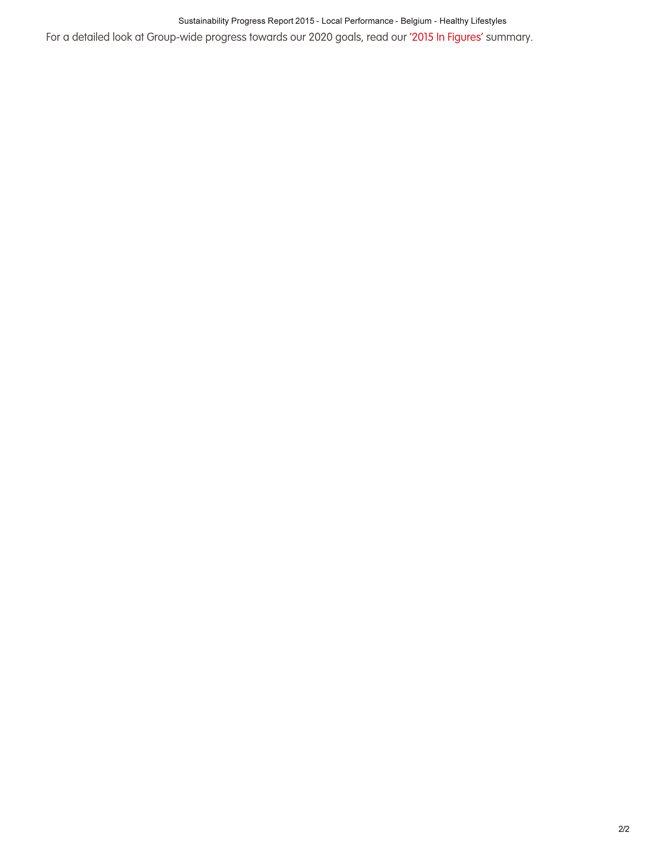
Sustainability Progress Report 2015 - Local Performance - Belgium - Healthy Lifestyles
For a detailed look at Group-wide progress towards our 2020 goals, read our –2015 In Figures– summary.
2/2
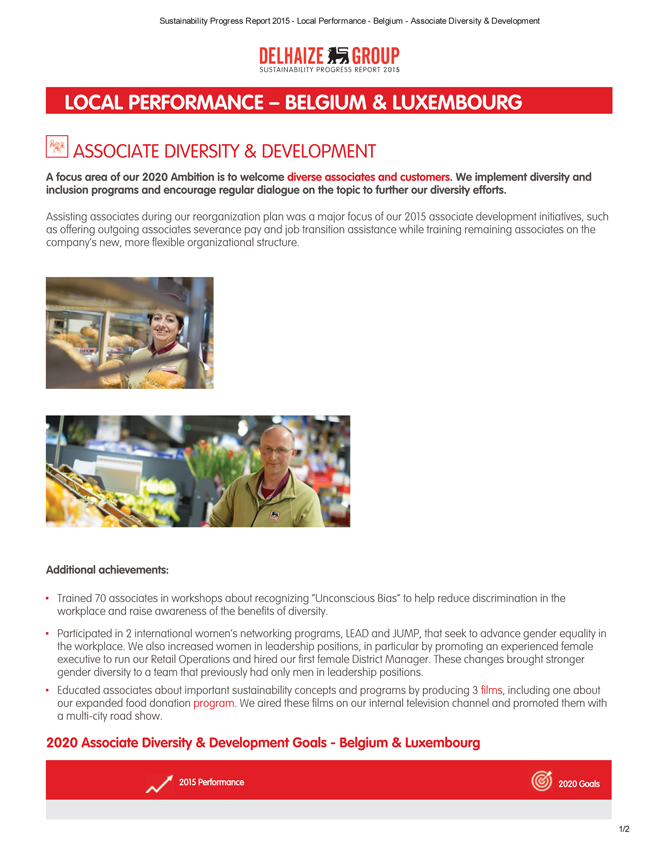
Sustainability Progress Report 2015 - Local Performance - Belgium - Associate Diversity & Development
LOCAL PERFORMANCE – BELGIUM & LUXEMBOURG
[Graphic Appears Here]
ASSOCIATE DIVERSITY & DEVELOPMENT
A focus area of our 2020 Ambition is to welcome diverse associates and customers. We implement diversity and inclusion programs and encourage regular dialogue on the topic to further our diversity efforts.
Assisting associates during our reorganization plan was a major focus of our 2015 associate development initiatives, such as offering outgoing associates severance pay and job transition assistance while training remaining associates on the company’s new, more flexible organizational structure.
Additional achievements:
Trained 70 associates in workshops about recognizing –Unconscious Bias– to help reduce discrimination in the workplace and raise awareness of the benefits of diversity.
Participated in 2 international women’s networking programs, LEAD and JUMP, that seek to advance gender equality in the workplace. We also increased women in leadership positions, in particular by promoting an experienced female executive to run our Retail Operations and hired our first female District Manager. These changes brought stronger gender diversity to a team that previously had only men in leadership positions.
Educated associates about important sustainability concepts and programs by producing 3 films, including one about our expanded food donation program. We aired these films on our internal television channel and promoted them with a multi-city road show.
2020 Associate Diversity & Development Goals—Belgium & Luxembourg
2015 Performance
2020 Goals
1/2
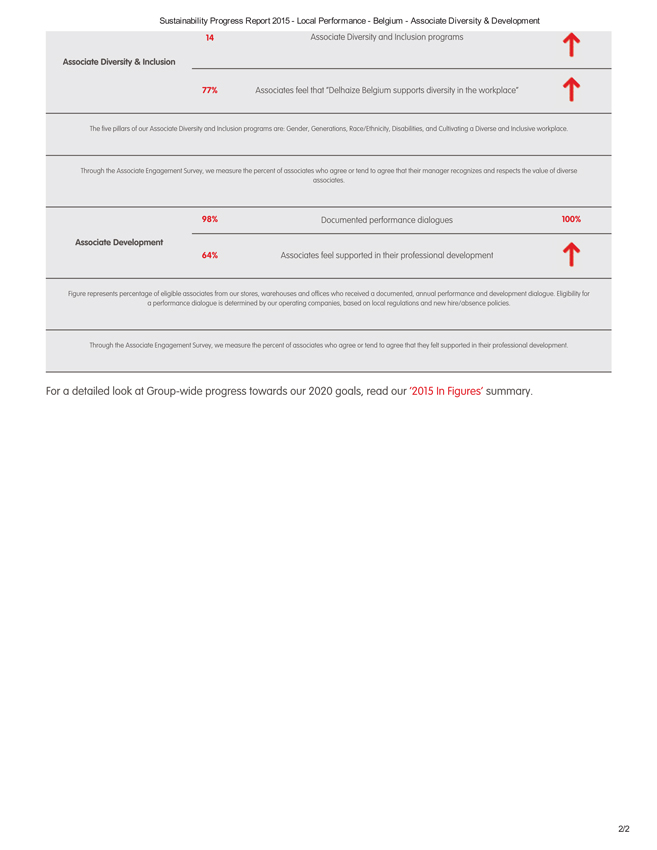
Sustainability Progress Report 2015 - Local Performance - Belgium - Associate Diversity & Development
14
Associate Diversity and Inclusion programs
Associate Diversity & Inclusion
77%
Associates feel that –Delhaize Belgium supports diversity in the workplace–
The five pillars of our Associate Diversity and Inclusion programs are: Gender, Generations, Race/Ethnicity, Disabilities, and Cultivating a Diverse and Inclusive workplace.
Through the Associate Engagement Survey, we measure the percent of associates who agree or tend to agree that their manager recognizes and respects the value of diverse
associates.
98%
Documented performance dialogues
100%
Associate Development
64%
Associates feel supported in their professional development
Figure represents percentage of eligible associates from our stores, warehouses and offices who received a documented, annual performance and development dialogue. Eligibility for
a performance dialogue is determined by our operating companies, based on local regulations and new hire/absence policies.
Through the Associate Engagement Survey, we measure the percent of associates who agree or tend to agree that they felt supported in their professional development.
For a detailed look at Group-wide progress towards our 2020 goals, read our –2015 In Figures– summary.
2/2
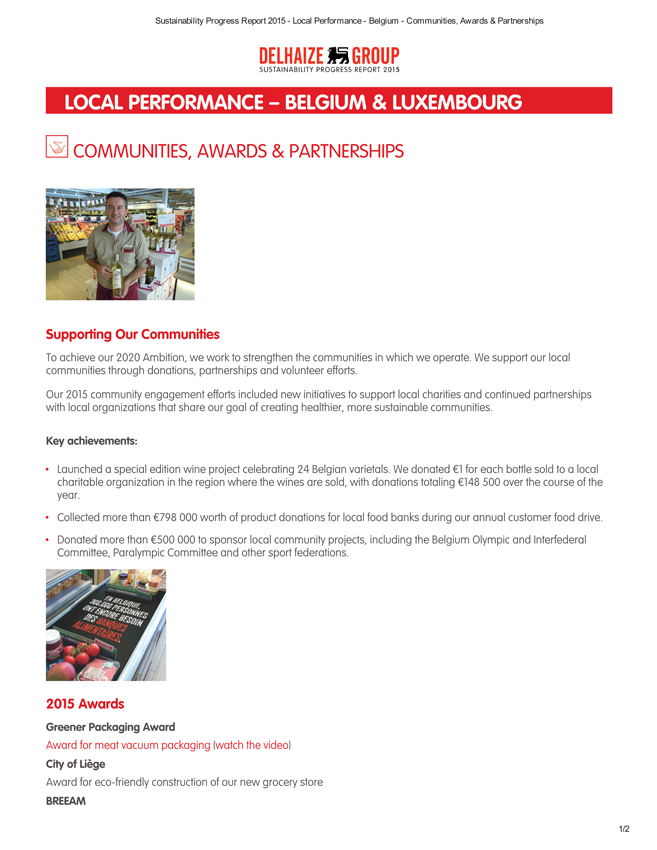
Sustainability Progress Report 2015 - Local Performance - Belgium - Communities, Awards & Partnerships
LOCAL PERFORMANCE – BELGIUM & LUXEMBOURG
COMMUNITIES, AWARDS & PARTNERSHIPS
Supporting Our Communities
To achieve our 2020 Ambition, we work to strengthen the communities in which we operate. We support our local communities through donations, partnerships and volunteer efforts.
Our 2015 community engagement efforts included new initiatives to support local charities and continued partnerships with local organizations that share our goal of creating healthier, more sustainable communities.
Key achievements:
Launched a special edition wine project celebrating 24 Belgian varietals. We donated €1 for each bottle sold to a local charitable organization in the region where the wines are sold, with donations totaling €148 500 over the course of the year.
Collected more than €798 000 worth of product donations for local food banks during our annual customer food drive. Donated more than €500 000 to sponsor local community projects, including the Belgium Olympic and Interfederal Committee, Paralympic Committee and other sport federations.
2015 Awards
Greener Packaging Award
Award for meat vacuum packaging (watch the video)
City of Liège
Award for eco-friendly construction of our new grocery store
BREEAM
1/2
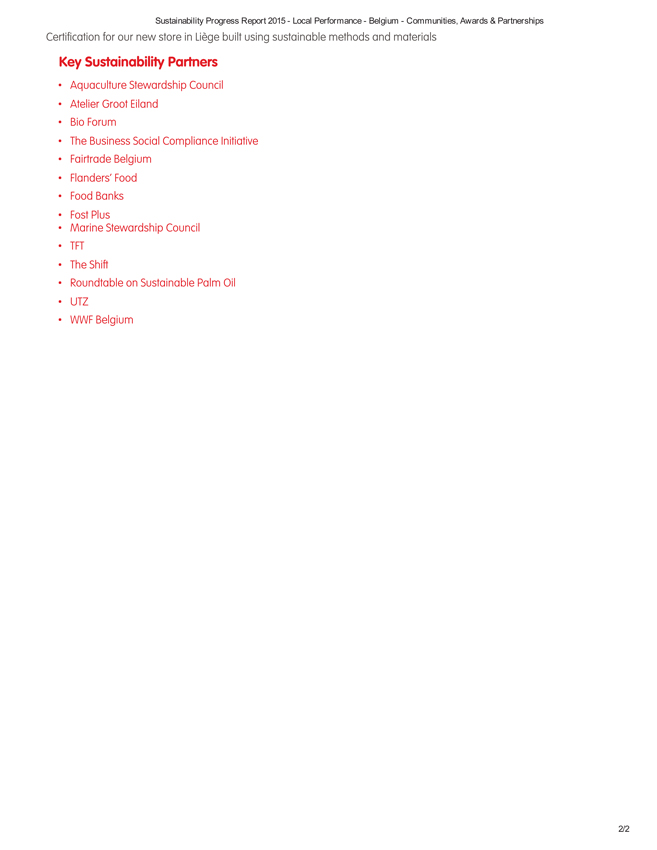
Sustainability Progress Report 2015 - Local Performance - Belgium - Communities, Awards & Partnerships
Certification for our new store in Liège built using sustainable methods and materials
Key Sustainability Partners
Aquaculture Stewardship Council
Atelier Groot Eiland
Bio Forum
The Business Social Compliance Initiative
Fairtrade Belgium
Flanders– Food
Food Banks
Fost Plus
Marine Stewardship Council
TFT
The Shift
Roundtable on Sustainable Palm Oil
UTZ
WWF Belgium
2/2
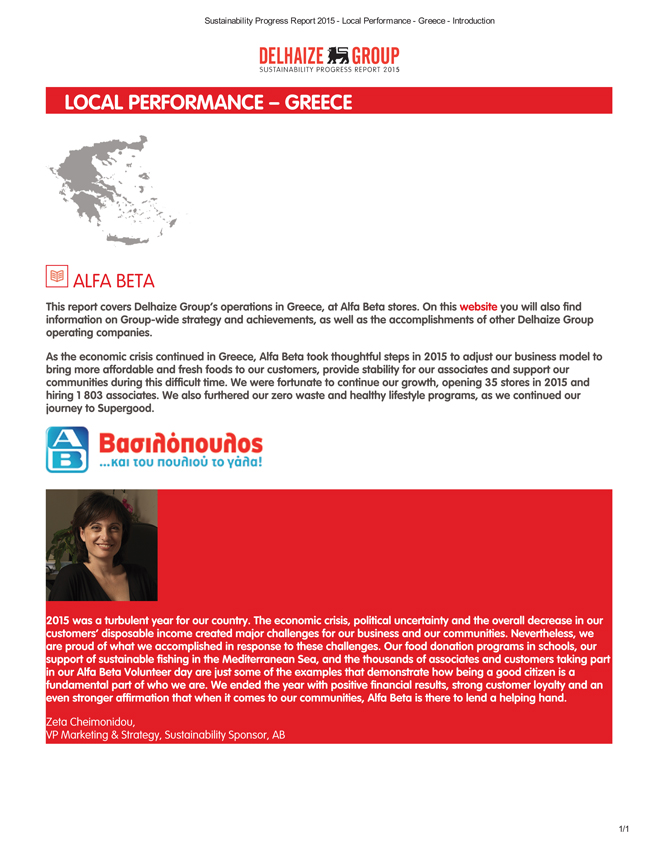
Sustainability Progress Report 2015 - Local Performance - Greece - Introduction
LOCAL PERFORMANCE – GREECE
ALFA BETA
This report covers Delhaize Group’s operations in Greece, at Alfa Beta stores. On this website you will also find information on Group-wide strategy and achievements, as well as the accomplishments of other Delhaize Group operating companies.
As the economic crisis continued in Greece, Alfa Beta took thoughtful steps in 2015 to adjust our business model to bring more affordable and fresh foods to our customers, provide stability for our associates and support our communities during this difficult time. We were fortunate to continue our growth, opening 35 stores in 2015 and hiring 1 803 associates. We also furthered our zero waste and healthy lifestyle programs, as we continued our journey to Supergood.
2015 was a turbulent year for our country. The economic crisis, political uncertainty and the overall decrease in our customers– disposable income created major challenges for our business and our communities. Nevertheless, we are proud of what we accomplished in response to these challenges. Our food donation programs in schools, our support of sustainable fishing in the Mediterranean Sea, and the thousands of associates and customers taking part in our Alfa Beta Volunteer day are just some of the examples that demonstrate how being a good citizen is a fundamental part of who we are. We ended the year with positive financial results, strong customer loyalty and an even stronger affirmation that when it comes to our communities, Alfa Beta is there to lend a helping hand.
Zeta Cheimonidou,
VP Marketing & Strategy, Sustainability Sponsor, AB
1/1
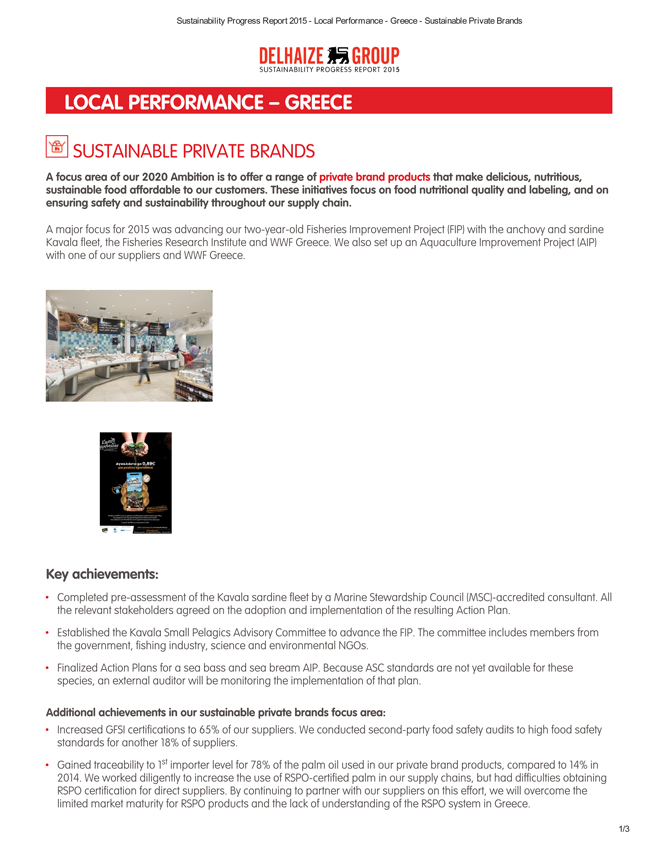
Sustainability Progress Report 2015 - Local Performance - Greece - Sustainable Private Brands
LOCAL PERFORMANCE – GREECE
[Graphic Appears Here]
SUSTAINABLE PRIVATE BRANDS
A focus area of our 2020 Ambition is to offer a range of private brand products that make delicious, nutritious, sustainable food affordable to our customers. These initiatives focus on food nutritional quality and labeling, and on ensuring safety and sustainability throughout our supply chain.
A major focus for 2015 was advancing our two-year-old Fisheries Improvement Project (FIP) with the anchovy and sardine Kavala fleet, the Fisheries Research Institute and WWF Greece. We also set up an Aquaculture Improvement Project (AIP) with one of our suppliers and WWF Greece.
Key achievements:
Completed pre-assessment of the Kavala sardine fleet by a Marine Stewardship Council (MSC)-accredited consultant. All the relevant stakeholders agreed on the adoption and implementation of the resulting Action Plan.
Established the Kavala Small Pelagics Advisory Committee to advance the FIP. The committee includes members from the government, fishing industry, science and environmental NGOs.
Finalized Action Plans for a sea bass and sea bream AIP. Because ASC standards are not yet available for these species, an external auditor will be monitoring the implementation of that plan.
Additional achievements in our sustainable private brands focus area:
Increased GFSI certifications to 65% of our suppliers. We conducted second-party food safety audits to high food safety standards for another 18% of suppliers.
Gained traceability to 1 importer level for 78% of the palm oil used in our private brand products, compared to 14% in st 2014. We worked diligently to increase the use of RSPO-certified palm in our supply chains, but had difficulties obtaining RSPO certification for direct suppliers. By continuing to partner with our suppliers on this effort, we will overcome the limited market maturity for RSPO products and the lack of understanding of the RSPO system in Greece.
1/3
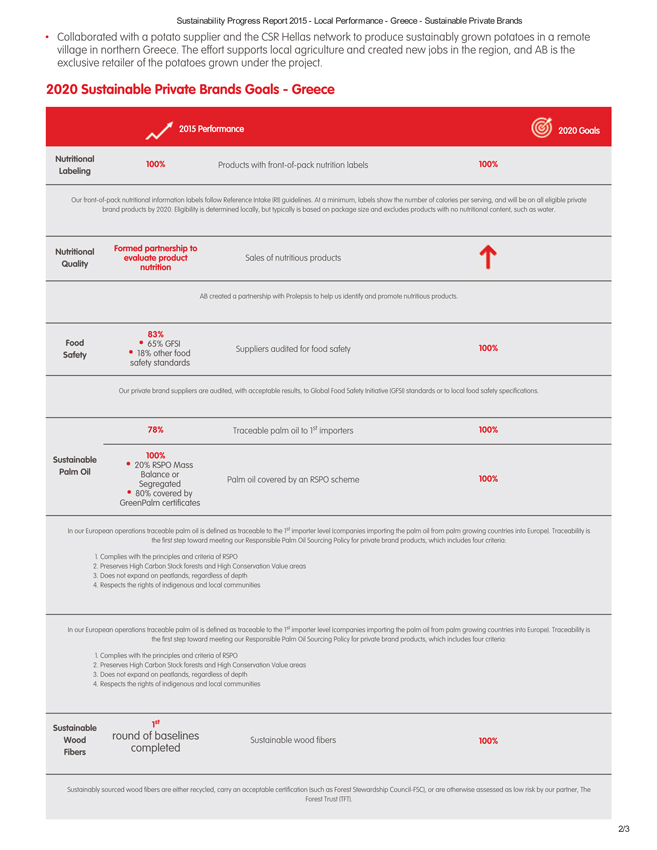
Sustainability Progress Report 2015 - Local Performance - Greece - Sustainable Private Brands
Collaborated with a potato supplier and the CSR Hellas network to produce sustainably grown potatoes in a remote village in northern Greece. The effort supports local agriculture and created new jobs in the region, and AB is the exclusive retailer of the potatoes grown under the project.
2020 Sustainable Private Brands Goals—Greece
2015 Performance
2020 Goals
Nutritional
100%
Products with front-of-pack nutrition labels
100%
Labeling
Our front-of-pack nutritional information labels follow Reference Intake (RI) guidelines. At a minimum, labels show the number of calories per serving, and will be on all eligible private brand products by 2020. Eligibility is determined locally, but typically is based on package size and excludes products with no nutritional content, such as water.
Nutritional
Formed partnership to
evaluate product
Sales of nutritious products
Quality
nutrition
AB created a partnership with Prolepsis to help us identify and promote nutritious products.
83%
Food
65% GFSI
Suppliers audited for food safety
100%
Safety
18% other food
safety standards
Our private brand suppliers are audited, with acceptable results, to Global Food Safety Initiative (GFSI) standards or to local food safety specifications.
78%
Traceable palm oil to 1st importers
100%
Sustainable
100%
20% RSPO Mass
Palm Oil
Balance or
Palm oil covered by an RSPO scheme
100%
Segregated
80% covered by
GreenPalm certificates
In our European operations traceable palm oil is defined as traceable to the 1 importer level (companies importing the palm oil from palm growing countries into Europe). Traceability is st the first step toward meeting our Responsible Palm Oil Sourcing Policy for private brand products, which includes four criteria:
Complies with the principles and criteria of RSPO
Preserves High Carbon Stock forests and High Conservation Value areas
Does not expand on peatlands, regardless of depth
Respects the rights of indigenous and local communities
In our European operations traceable palm oil is defined as traceable to the 1 importer level (companies importing the palm oil from palm growing countries into Europe). Traceability is st the first step toward meeting our Responsible Palm Oil Sourcing Policy for private brand products, which includes four criteria:
Complies with the principles and criteria of RSPO
Preserves High Carbon Stock forests and High Conservation Value areas
Does not expand on peatlands, regardless of depth
Respects the rights of indigenous and local communities
Sustainable
1st
Wood
round of baselines
Sustainable wood fibers
100%
Fibers
completed
Sustainably sourced wood fibers are either recycled, carry an acceptable certification (such as Forest Stewardship Council-FSC), or are otherwise assessed as low risk by our partner, The Forest Trust (TFT).
2/3
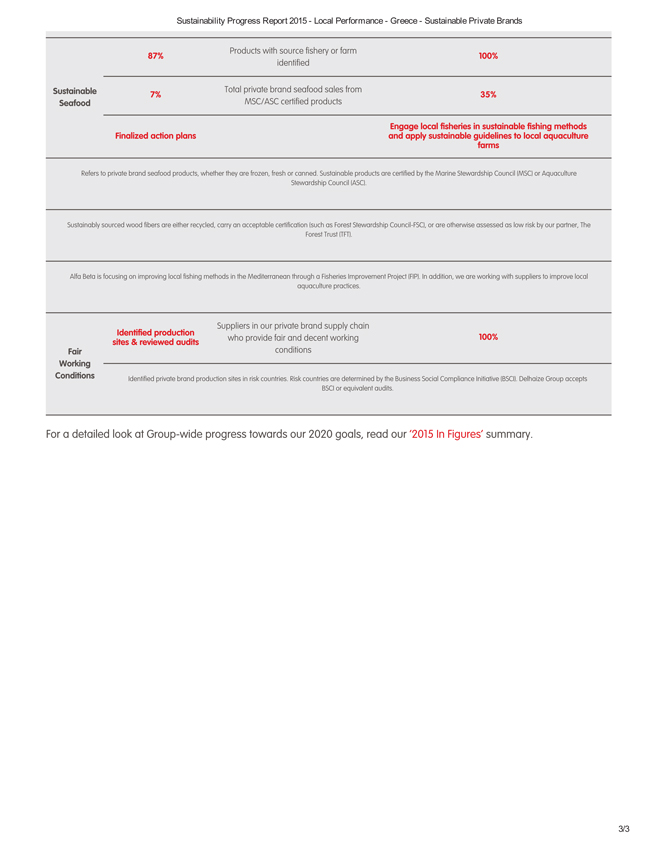
Sustainability Progress Report 2015 - Local Performance - Greece - Sustainable Private Brands
Products with source fishery or farm
87%
100%
identified
Sustainable
7%
Total private brand seafood sales from
35%
Seafood
MSC/ASC certified products
Engage local fisheries in sustainable fishing methods
Finalized action plans
and apply sustainable guidelines to local aquaculture
farms
Refers to private brand seafood products, whether they are frozen, fresh or canned. Sustainable products are certified by the Marine Stewardship Council (MSC) or Aquaculture
Stewardship Council (ASC).
Sustainably sourced wood fibers are either recycled, carry an acceptable certification (such as Forest Stewardship Council-FSC), or are otherwise assessed as low risk by our partner, The
Forest Trust (TFT).
Alfa Beta is focusing on improving local fishing methods in the Mediterranean through a Fisheries Improvement Project (FIP). In addition, we are working with suppliers to improve local
aquaculture practices.
Suppliers in our private brand supply chain
Identified production
who provide fair and decent working
100%
sites & reviewed audits
Fair
conditions
Working
Conditions
Identified private brand production sites in risk countries. Risk countries are determined by the Business Social Compliance Initiative (BSCI). Delhaize Group accepts
BSCI or equivalent audits.
For a detailed look at Group-wide progress towards our 2020 goals, read our –2015 In Figures– summary.
3/3
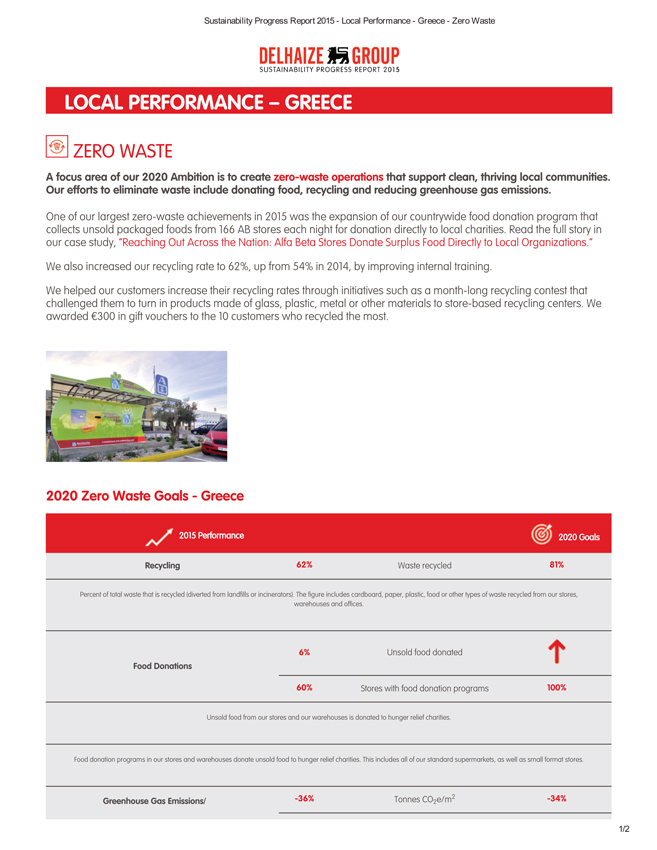
Sustainability Progress Report 2015 - Local Performance - Greece - Zero Waste
LOCAL PERFORMANCE – GREECE
ZERO WASTE
A focus area of our 2020 Ambition is to create zero-waste operations that support clean, thriving local communities. Our efforts to eliminate waste include donating food, recycling and reducing greenhouse gas emissions.
One of our largest zero-waste achievements in 2015 was the expansion of our countrywide food donation program that collects unsold packaged foods from 166 AB stores each night for donation directly to local charities. Read the full story in our case study, –Reaching Out Across the Nation: Alfa Beta Stores Donate Surplus Food Directly to Local Organizations.–
We also increased our recycling rate to 62%, up from 54% in 2014, by improving internal training.
We helped our customers increase their recycling rates through initiatives such as a month-long recycling contest that challenged them to turn in products made of glass, plastic, metal or other materials to store-based recycling centers. We awarded €300 in gift vouchers to the 10 customers who recycled the most.
2020 Zero Waste Goals—Greece
2015 Performance
2020 Goals
Recycling
62%
Waste recycled
81%
Percent of total waste that is recycled (diverted from landfills or incinerators). The figure includes cardboard, paper, plastic, food or other types of waste recycled from our stores,
warehouses and offices.
6%
Unsold food donated
Food Donations
60%
Stores with food donation programs
100%
Unsold food from our stores and our warehouses is donated to hunger relief charities.
Food donation programs in our stores and warehouses donate unsold food to hunger relief charities. This includes all of our standard supermarkets, as well as small format stores.
Greenhouse Gas Emissions/
-36%
Tonnes CO2 e/m2
-34%
1/2
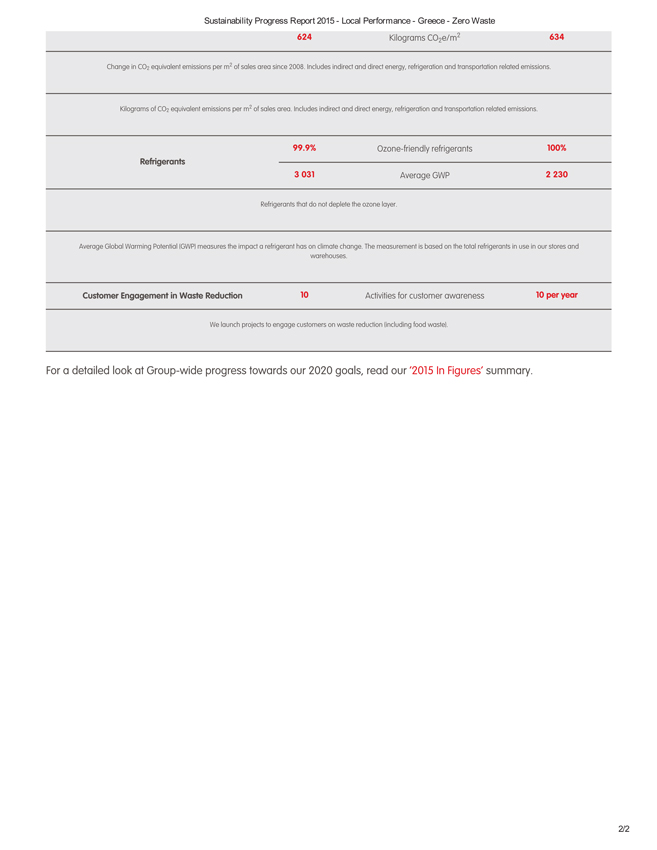
Sustainability Progress Report 2015 - Local Performance - Greece - Zero Waste
624 Kilograms COe/m2 634
2
Change in CO equivalent emissions per m of sales area since 2008. Includes indirect and direct energy, refrigeration and transportation related emissions. 2 2
Kilograms of CO equivalent emissions per m of sales area. Includes indirect and direct energy, refrigeration and transportation related emissions. 2 2
99.9%
Ozone-friendly refrigerants
100%
Refrigerants
3 031
Average GWP
2 230
Refrigerants that do not deplete the ozone layer.
Average Global Warming Potential (GWP) measures the impact a refrigerant has on climate change. The measurement is based on the total refrigerants in use in our stores and warehouses.
Customer Engagement in Waste Reduction 10 Activities for customer awareness 10 per year
We launch projects to engage customers on waste reduction (including food waste).
For a detailed look at Group-wide progress towards our 2020 goals, read our –2015 In Figures– summary.
2/2
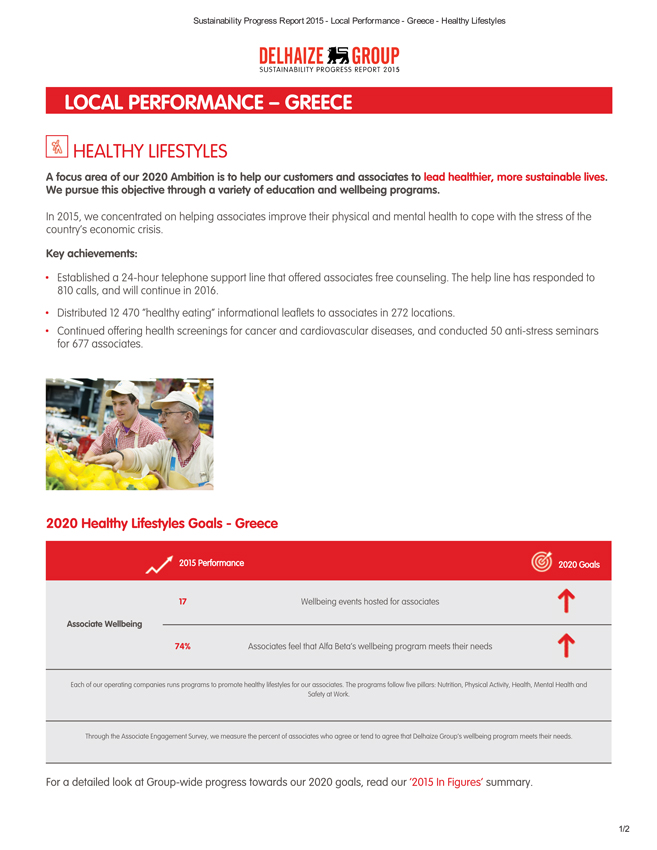
Sustainability Progress Report 2015 - Local Performance - Greece - Healthy Lifestyles
LOCAL PERFORMANCE – GREECE
HEALTHY LIFESTYLES
A focus area of our 2020 Ambition is to help our customers and associates to lead healthier, more sustainable lives. We pursue this objective through a variety of education and wellbeing programs.
In 2015, we concentrated on helping associates improve their physical and mental health to cope with the stress of the country’s economic crisis.
Key achievements:
Established a 24-hour telephone support line that offered associates free counseling. The help line has responded to 810 calls, and will continue in 2016.
Distributed 12 470 –healthy eating– informational leaflets to associates in 272 locations.
Continued offering health screenings for cancer and cardiovascular diseases, and conducted 50 anti-stress seminars for 677 associates.
2020 Healthy Lifestyles Goals—Greece
2015 Performance
2020 Goals
17
Wellbeing events hosted for associates
Associate Wellbeing
74%
Associates feel that Alfa Beta’s wellbeing program meets their needs
Each of our operating companies runs programs to promote healthy lifestyles for our associates. The programs follow five pillars: Nutrition, Physical Activity, Health, Mental Health and Safety at Work.
Through the Associate Engagement Survey, we measure the percent of associates who agree or tend to agree that Delhaize Group’s wellbeing program meets their needs.
For a detailed look at Group-wide progress towards our 2020 goals, read our –2015 In Figures– summary.
1/2
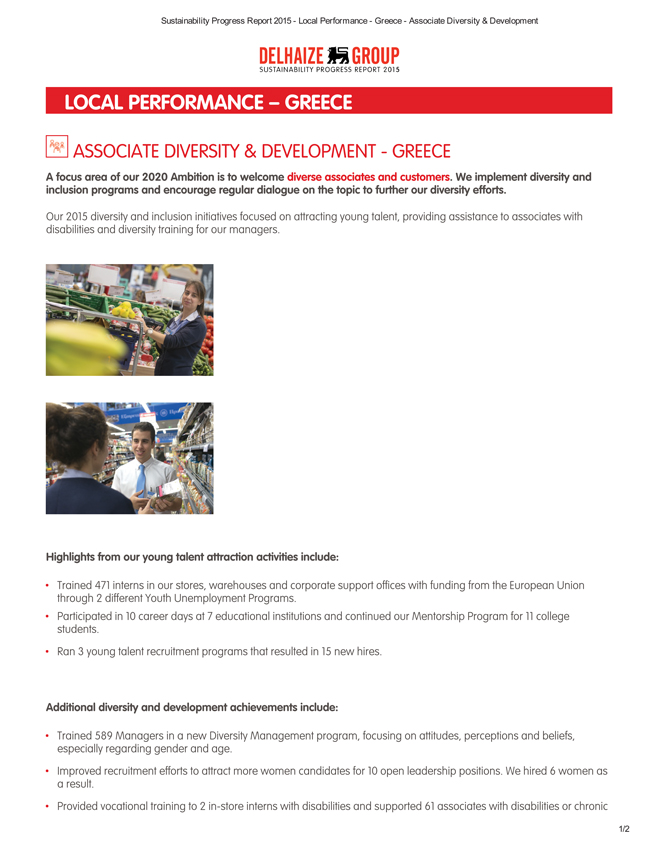
Sustainability Progress Report 2015 - Local Performance - Greece - Associate Diversity & Development
LOCAL PERFORMANCE – GREECE
ASSOCIATE DIVERSITY & DEVELOPMENT—GREECE
A focus area of our 2020 Ambition is to welcome diverse associates and customers. We implement diversity and inclusion programs and encourage regular dialogue on the topic to further our diversity efforts.
Our 2015 diversity and inclusion initiatives focused on attracting young talent, providing assistance to associates with disabilities and diversity training for our managers.
Highlights from our young talent attraction activities include:
Trained 471 interns in our stores, warehouses and corporate support offices with funding from the European Union through 2 different Youth Unemployment Programs.
Participated in 10 career days at 7 educational institutions and continued our Mentorship Program for 11 college students.
Ran 3 young talent recruitment programs that resulted in 15 new hires.
Additional diversity and development achievements include:
Trained 589 Managers in a new Diversity Management program, focusing on attitudes, perceptions and beliefs, especially regarding gender and age.
Improved recruitment efforts to attract more women candidates for 10 open leadership positions. We hired 6 women as a result.
Provided vocational training to 2 in-store interns with disabilities and supported 61 associates with disabilities or chronic
1/2
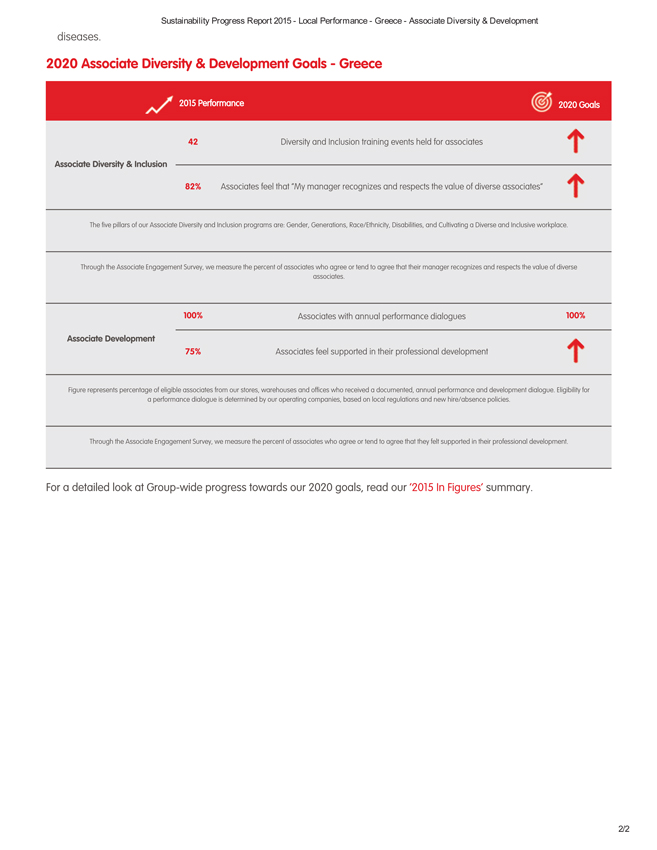
Sustainability Progress Report 2015 - Local Performance - Greece - Associate Diversity & Development
diseases.
2020 Associate Diversity & Development Goals—Greece
2015 Performance
2020 Goals
42
Diversity and Inclusion training events held for associates
Associate Diversity & Inclusion
82% Associates feel that –My manager recognizes and respects the value of diverse associates–
The five pillars of our Associate Diversity and Inclusion programs are: Gender, Generations, Race/Ethnicity, Disabilities, and Cultivating a Diverse and Inclusive workplace.
Through the Associate Engagement Survey, we measure the percent of associates who agree or tend to agree that their manager recognizes and respects the value of diverse
associates.
100%
Associates with annual performance dialogues
100%
Associate Development
75%
Associates feel supported in their professional development
Figure represents percentage of eligible associates from our stores, warehouses and offices who received a documented, annual performance and development dialogue. Eligibility for
a performance dialogue is determined by our operating companies, based on local regulations and new hire/absence policies.
Through the Associate Engagement Survey, we measure the percent of associates who agree or tend to agree that they felt supported in their professional development.
For a detailed look at Group-wide progress towards our 2020 goals, read our –2015 In Figures– summary.
2/2
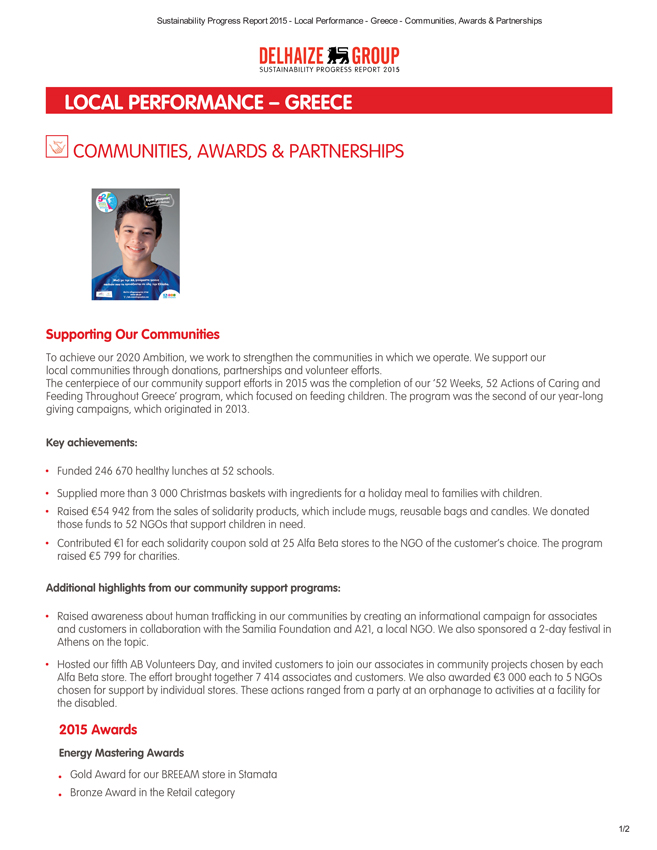
Sustainability Progress Report 2015 - Local Performance - Greece - Communities, Awards & Partnerships
LOCAL PERFORMANCE – GREECE
COMMUNITIES, AWARDS & PARTNERSHIPS
Supporting Our Communities
To achieve our 2020 Ambition, we work to strengthen the communities in which we operate. We support our local communities through donations, partnerships and volunteer efforts.
The centerpiece of our community support efforts in 2015 was the completion of our –52 Weeks, 52 Actions of Caring and Feeding Throughout Greece– program, which focused on feeding children. The program was the second of our year-long giving campaigns, which originated in 2013.
Key achievements:
Funded 246 670 healthy lunches at 52 schools.
Supplied more than 3 000 Christmas baskets with ingredients for a holiday meal to families with children. Raised €54 942 from the sales of solidarity products, which include mugs, reusable bags and candles. We donated those funds to 52 NGOs that support children in need.
Contributed €1 for each solidarity coupon sold at 25 Alfa Beta stores to the NGO of the customer’s choice. The program raised €5 799 for charities.
Additional highlights from our community support programs:
Raised awareness about human trafficking in our communities by creating an informational campaign for associates and customers in collaboration with the Samilia Foundation and A21, a local NGO. We also sponsored a 2-day festival in Athens on the topic.
Hosted our fifth AB Volunteers Day, and invited customers to join our associates in community projects chosen by each Alfa Beta store. The effort brought together 7 414 associates and customers. We also awarded €3 000 each to 5 NGOs chosen for support by individual stores. These actions ranged from a party at an orphanage to activities at a facility for the disabled.
2015 Awards
Energy Mastering Awards
Gold Award for our BREEAM store in Stamata
Bronze Award in the Retail category
1/2
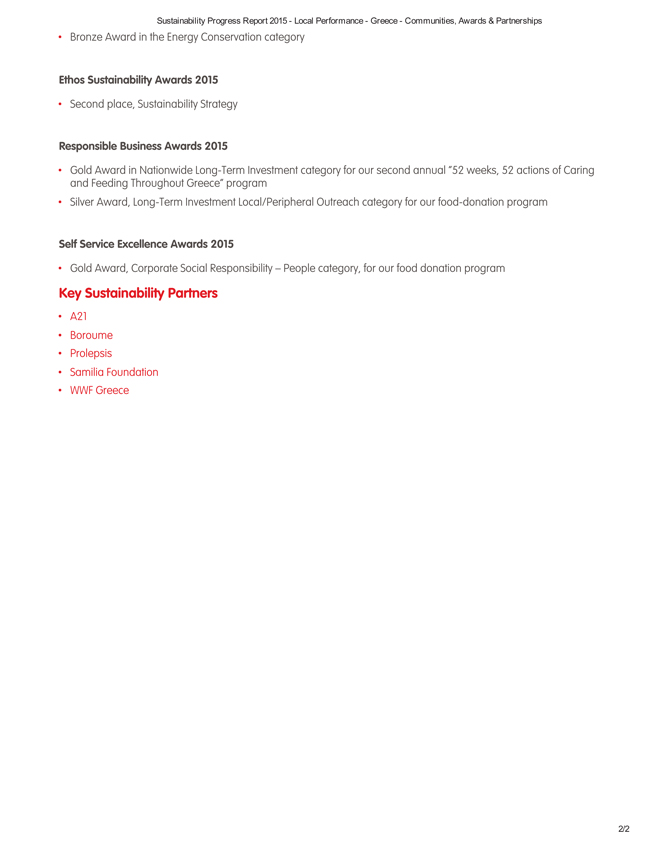
Sustainability Progress Report 2015 - Local Performance - Greece - Communities, Awards & Partnerships
Bronze Award in the Energy Conservation category
Ethos Sustainability Awards 2015
Second place, Sustainability Strategy
Responsible Business Awards 2015
Gold Award in Nationwide Long-Term Investment category for our second annual –52 weeks, 52 actions of Caring and Feeding Throughout Greece– program Silver Award, Long-Term Investment Local/Peripheral Outreach category for our food-donation program
Self Service Excellence Awards 2015
Gold Award, Corporate Social Responsibility – People category, for our food donation program
Key Sustainability Partners
A21
Boroume
Prolepsis
Samilia Foundation
WWF Greece
2/2
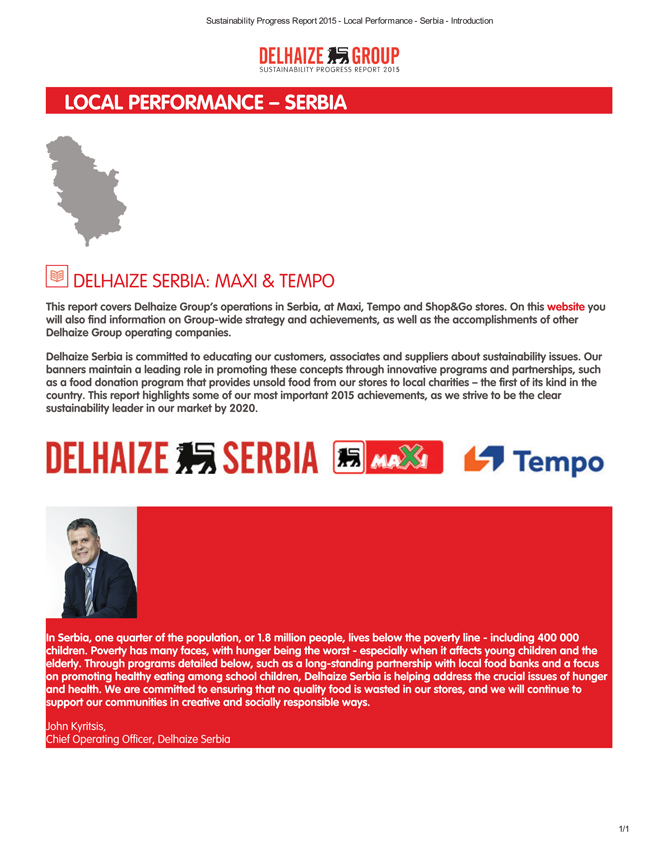
Sustainability Progress Report 2015 - Local Performance - Serbia - Introduction
LOCAL PERFORMANCE – SERBIA
DELHAIZE SERBIA: MAXI & TEMPO
This report covers Delhaize Group’s operations in Serbia, at Maxi, Tempo and Shop&Go stores. On this website you will also find information on Group-wide strategy and achievements, as well as the accomplishments of other Delhaize Group operating companies.
Delhaize Serbia is committed to educating our customers, associates and suppliers about sustainability issues. Our banners maintain a leading role in promoting these concepts through innovative programs and partnerships, such as a food donation program that provides unsold food from our stores to local charities – the first of its kind in the country. This report highlights some of our most important 2015 achievements, as we strive to be the clear sustainability leader in our market by 2020.
In Serbia, one quarter of the population, or 1.8 million people, lives below the poverty line—including 400 000 children. Poverty has many faces, with hunger being the worst—especially when it affects young children and the elderly. Through programs detailed below, such as a long-standing partnership with local food banks and a focus on promoting healthy eating among school children, Delhaize Serbia is helping address the crucial issues of hunger and health. We are committed to ensuring that no quality food is wasted in our stores, and we will continue to support our communities in creative and socially responsible ways.
John Kyritsis,
Chief Operating Officer, Delhaize Serbia
1/1
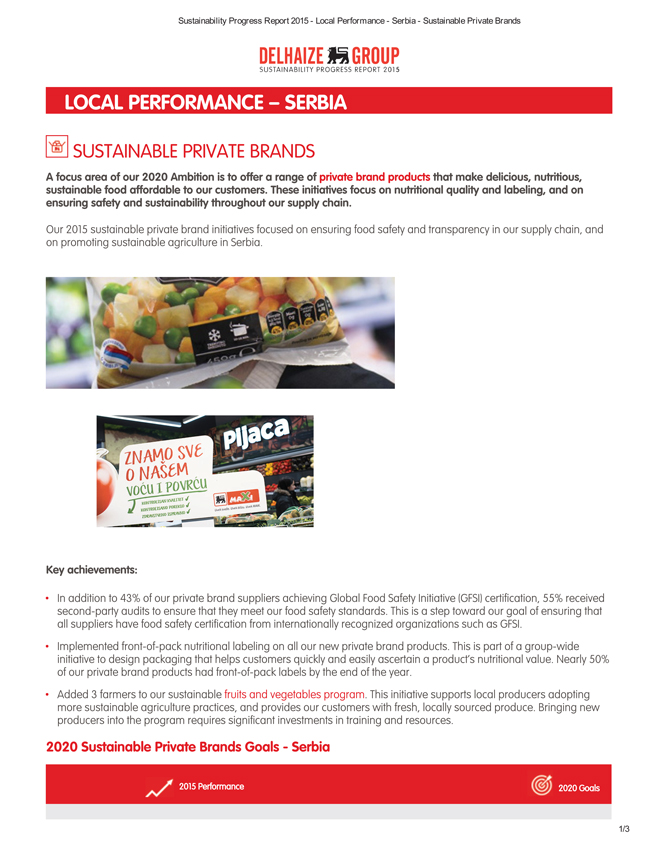
Sustainability Progress Report 2015 - Local Performance - Serbia - Sustainable Private Brands
LOCAL PERFORMANCE – SERBIA
SUSTAINABLE PRIVATE BRANDS
A focus area of our 2020 Ambition is to offer a range of private brand products that make delicious, nutritious, sustainable food affordable to our customers. These initiatives focus on nutritional quality and labeling, and on ensuring safety and sustainability throughout our supply chain.
Our 2015 sustainable private brand initiatives focused on ensuring food safety and transparency in our supply chain, and on promoting sustainable agriculture in Serbia.
Key achievements:
In addition to 43% of our private brand suppliers achieving Global Food Safety Initiative (GFSI) certification, 55% received second-party audits to ensure that they meet our food safety standards. This is a step toward our goal of ensuring that all suppliers have food safety certification from internationally recognized organizations such as GFSI.
Implemented front-of-pack nutritional labeling on all our new private brand products. This is part of a group-wide initiative to design packaging that helps customers quickly and easily ascertain a product’s nutritional value. Nearly 50% of our private brand products had front-of-pack labels by the end of the year.
Added 3 farmers to our sustainable fruits and vegetables program. This initiative supports local producers adopting more sustainable agriculture practices, and provides our customers with fresh, locally sourced produce. Bringing new producers into the program requires significant investments in training and resources.
2020 Sustainable Private Brands Goals—Serbia
2015 Performance
2020 Goals
1/3
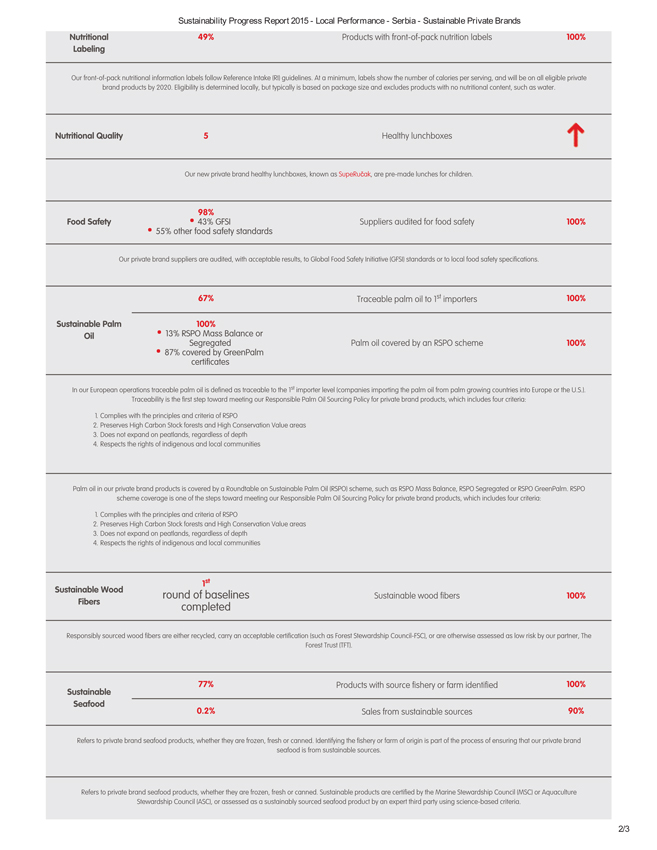
Sustainability Progress Report 2015 - Local Performance - Serbia - Sustainable Private Brands
Nutritional
49%
Products with front-of-pack nutrition labels
100%
Labeling
Our front-of-pack nutritional information labels follow Reference Intake (RI) guidelines. At a minimum, labels show the number of calories per serving, and will be on all eligible private brand products by 2020. Eligibility is determined locally, but typically is based on package size and excludes products with no nutritional content, such as water.
Nutritional Quality
5
Healthy lunchboxes
Our new private brand healthy lunchboxes, known as SupeRuèak
ak, are pre-made lunches for children.
98%
Food Safety
43% GFSI
Suppliers audited for food safety
100%
55% other food safety standards
Our private brand suppliers are audited, with acceptable results, to Global Food Safety Initiative (GFSI) standards or to local food safety specifications.
67%
Traceable palm oil to 1st importers
100%
Sustainable Palm
100%
Oil
13% RSPO Mass Balance or
Segregated
Palm oil covered by an RSPO scheme
100%
87% covered by GreenPalm
certificates
In our European operations traceable palm oil is defined as traceable to the 1 importer level (companies importing the palm oil from palm growing countries into Europe or the U.S.). st Traceability is the first step toward meeting our Responsible Palm Oil Sourcing Policy for private brand products, which includes four criteria:
Complies with the principles and criteria of RSPO
Preserves High Carbon Stock forests and High Conservation Value areas
Does not expand on peatlands, regardless of depth
Respects the rights of indigenous and local communities
Palm oil in our private brand products is covered by a Roundtable on Sustainable Palm Oil (RSPO) scheme, such as RSPO Mass Balance, RSPO Segregated or RSPO GreenPalm. RSPO scheme coverage is one of the steps toward meeting our Responsible Palm Oil Sourcing Policy for private brand products, which includes four criteria:
Complies with the principles and criteria of RSPO
Preserves High Carbon Stock forests and High Conservation Value areas
Does not expand on peatlands, regardless of depth
Respects the rights of indigenous and local communities
1st
Sustainable Wood
round of baselines
Sustainable wood fibers
100%
Fibers
completed
Responsibly sourced wood fibers are either recycled, carry an acceptable certification (such as Forest Stewardship Council-FSC), or are otherwise assessed as low risk by our partner, The Forest Trust (TFT).
77%
Products with source fishery or farm identified
100%
Sustainable
Seafood
0.2%
Sales from sustainable sources
90%
Refers to private brand seafood products, whether they are frozen, fresh or canned. Identifying the fishery or farm of origin is part of the process of ensuring that our private brand seafood is from sustainable sources.
Refers to private brand seafood products, whether they are frozen, fresh or canned. Sustainable products are certified by the Marine Stewardship Council (MSC) or Aquaculture Stewardship Council (ASC), or assessed as a sustainably sourced seafood product by an expert third party using science-based criteria.
2/3
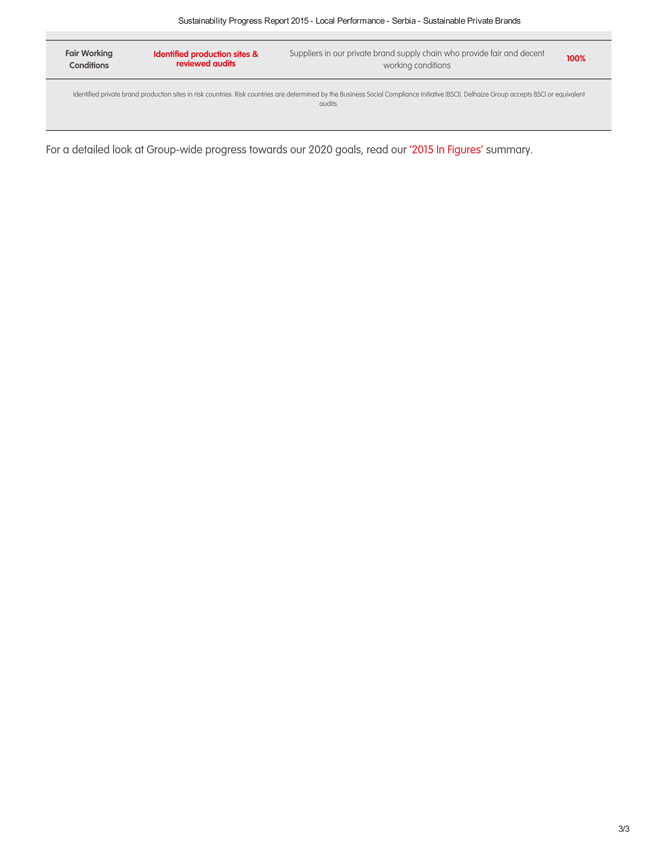
Sustainability Progress Report 2015 - Local Performance - Serbia - Sustainable Private Brands
Fair Working
Identified production sites &
Suppliers in our private brand supply chain who provide fair and decent
100%
Conditions
reviewed audits
working conditions
Identified private brand production sites in risk countries. Risk countries are determined by the Business Social Compliance Initiative (BSCI). Delhaize Group accepts BSCI or equivalent audits.
For a detailed look at Group-wide progress towards our 2020 goals, read our –2015 In Figures– summary.
3/3
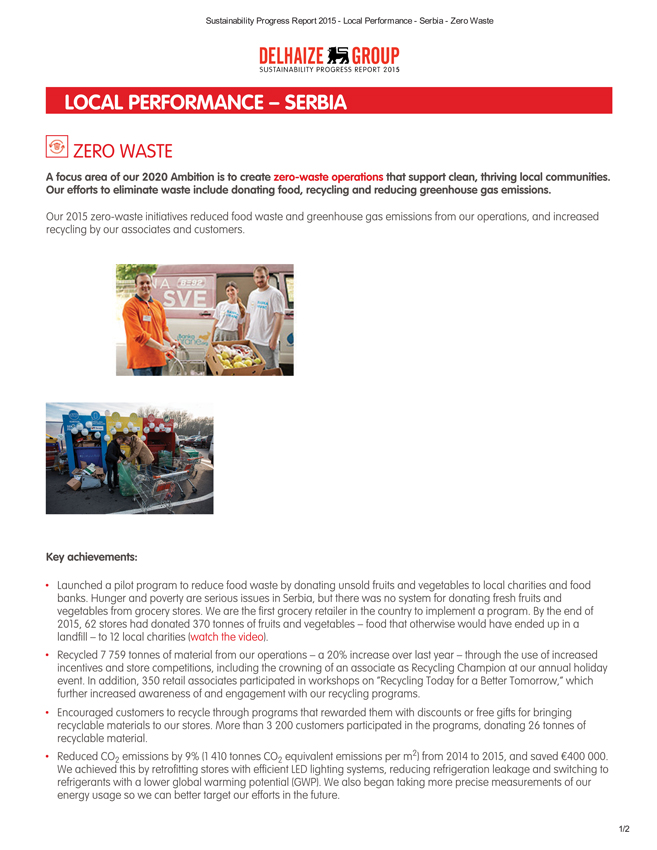
Sustainability Progress Report 2015 - Local Performance - Serbia - Zero Waste
LOCAL PERFORMANCE – SERBIA
ZERO WASTE
A focus area of our 2020 Ambition is to create zero-waste operations that support clean, thriving local communities. Our efforts to eliminate waste include donating food, recycling and reducing greenhouse gas emissions.
Our 2015 zero-waste initiatives reduced food waste and greenhouse gas emissions from our operations, and increased recycling by our associates and customers.
Key achievements:
Launched a pilot program to reduce food waste by donating unsold fruits and vegetables to local charities and food banks. Hunger and poverty are serious issues in Serbia, but there was no system for donating fresh fruits and vegetables from grocery stores. We are the first grocery retailer in the country to implement a program. By the end of 2015, 62 stores had donated 370 tonnes of fruits and vegetables – food that otherwise would have ended up in a landfill – to 12 local charities (watch the video).
Recycled 7 759 tonnes of material from our operations – a 20% increase over last year – through the use of increased incentives and store competitions, including the crowning of an associate as Recycling Champion at our annual holiday event. In addition, 350 retail associates participated in workshops on –Recycling Today for a Better Tomorrow,– which further increased awareness of and engagement with our recycling programs.
Encouraged customers to recycle through programs that rewarded them with discounts or free gifts for bringing recyclable materials to our stores. More than 3 200 customers participated in the programs, donating 26 tonnes of recyclable material.
Reduced CO emissions by 9% (1 410 tonnes CO equivalent emissions per m) from 2014 to 2015, and saved €400 000. 2 We achieved this by retrofitting stores with efficient LED lighting systems, reducing refrigeration leakage and switching to 2 2 refrigerants with a lower global warming potential (GWP). We also began taking more precise measurements of our energy usage so we can better target our efforts in the future.
1/2
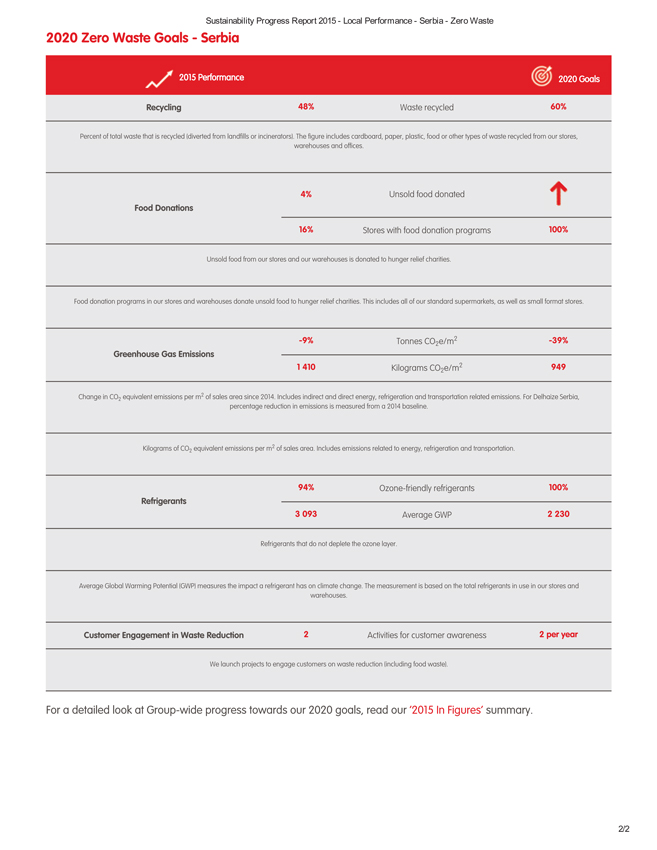
Sustainability Progress Report 2015 - Local Performance - Serbia - Zero Waste
2020 Zero Waste Goals—Serbia
2015 Performance
2020 Goals
Recycling
48%
Waste recycled
60%
Percent of total waste that is recycled (diverted from landfills or incinerators). The figure includes cardboard, paper, plastic, food or other types of waste recycled from our stores, warehouses and offices.
Food donation programs in our stores and warehouses donate unsold food to hunger relief charities. This includes all of our standard supermarkets, as well as small format stores.
-9%
Tonnes CO2 e/m2
-39%
Greenhouse Gas Emissions
1 410
Kilograms CO2 e/m2
949
Change in CO equivalent emissions per m of sales area since 2014. Includes indirect and direct energy, refrigeration and transportation related emissions. For Delhaize Serbia, 2 2 percentage reduction in emissions is measured from a 2014 baseline.
Kilograms of CO2 equivalent emissions per m2 of sales area. Includes emissions related to energy, refrigeration and transportation.
94%
Ozone-friendly refrigerants
100%
Refrigerants
3 093
Average GWP
2 230
Refrigerants that do not deplete the ozone layer.
Average Global Warming Potential (GWP) measures the impact a refrigerant has on climate change. The measurement is based on the total refrigerants in use in our stores and warehouses.
Customer Engagement in Waste Reduction 2 Activities for customer awareness 2 per year
We launch projects to engage customers on waste reduction (including food waste).
For a detailed look at Group-wide progress towards our 2020 goals, read our –2015 In Figures– summary.
2/2
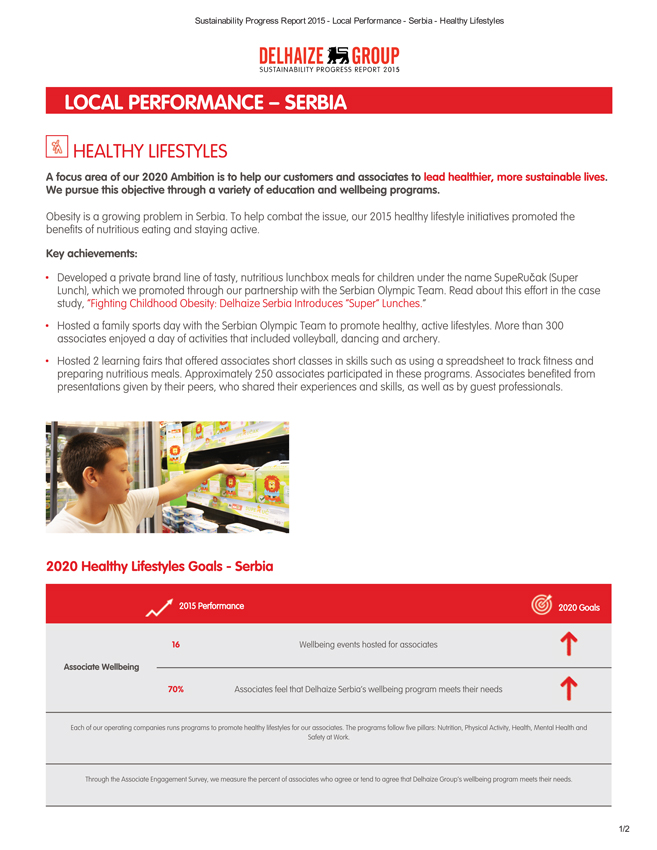
Sustainability Progress Report 2015 - Local Performance - Serbia - Healthy Lifestyles
LOCAL PERFORMANCE – SERBIA
HEALTHY LIFESTYLES
A focus area of our 2020 Ambition is to help our customers and associates to lead healthier, more sustainable lives. We pursue this objective through a variety of education and wellbeing programs.
Obesity is a growing problem in Serbia. To help combat the issue, our 2015 healthy lifestyle initiatives promoted the benefits of nutritious eating and staying active.
Key achievements:
Developed a private brand line of tasty, nutritious lunchbox meals for children under the name SupeRuèak
ak (Super Lunch), which we promoted through our partnership with the Serbian Olympic Team. Read about this effort in the case study, –Fighting Childhood Obesity: Delhaize Serbia Introduces ‘super– Lunches.– Hosted a family sports day with the Serbian Olympic Team to promote healthy, active lifestyles. More than 300 associates enjoyed a day of activities that included volleyball, dancing and archery.
Hosted 2 learning fairs that offered associates short classes in skills such as using a spreadsheet to track fitness and preparing nutritious meals. Approximately 250 associates participated in these programs. Associates benefited from presentations given by their peers, who shared their experiences and skills, as well as by guest professionals.
2020 Healthy Lifestyles Goals—Serbia
2015 Performance
2020 Goals
16
Wellbeing events hosted for associates
Associate Wellbeing
70%
Associates feel that Delhaize Serbia’s wellbeing program meets their needs
Each of our operating companies runs programs to promote healthy lifestyles for our associates. The programs follow five pillars: Nutrition, Physical Activity, Health, Mental Health and Safety at Work.
Through the Associate Engagement Survey, we measure the percent of associates who agree or tend to agree that Delhaize Group’s wellbeing program meets their needs.
1/2
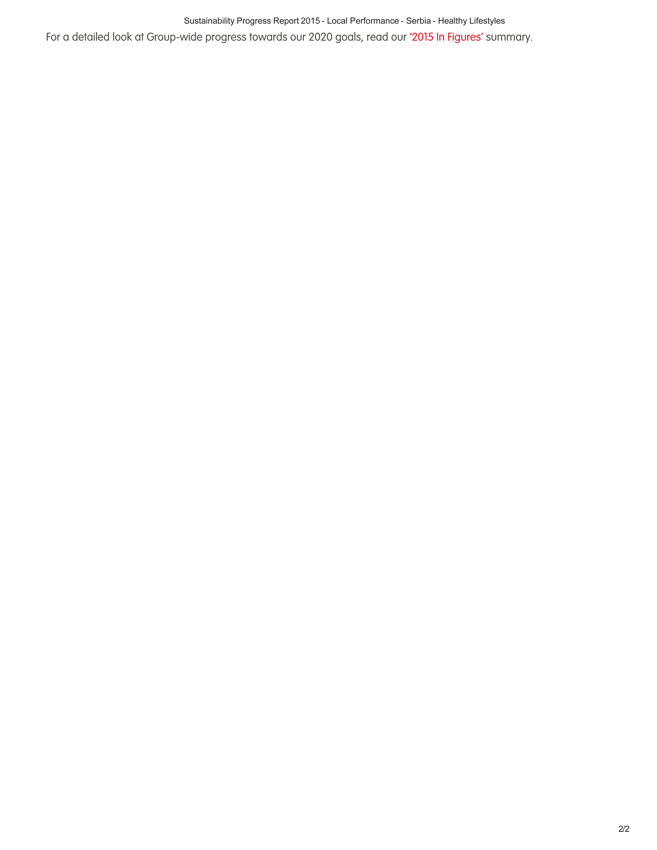
Sustainability Progress Report 2015 - Local Performance - Serbia - Healthy Lifestyles
For a detailed look at Group-wide progress towards our 2020 goals, read our –2015 In Figures– summary.
2/2
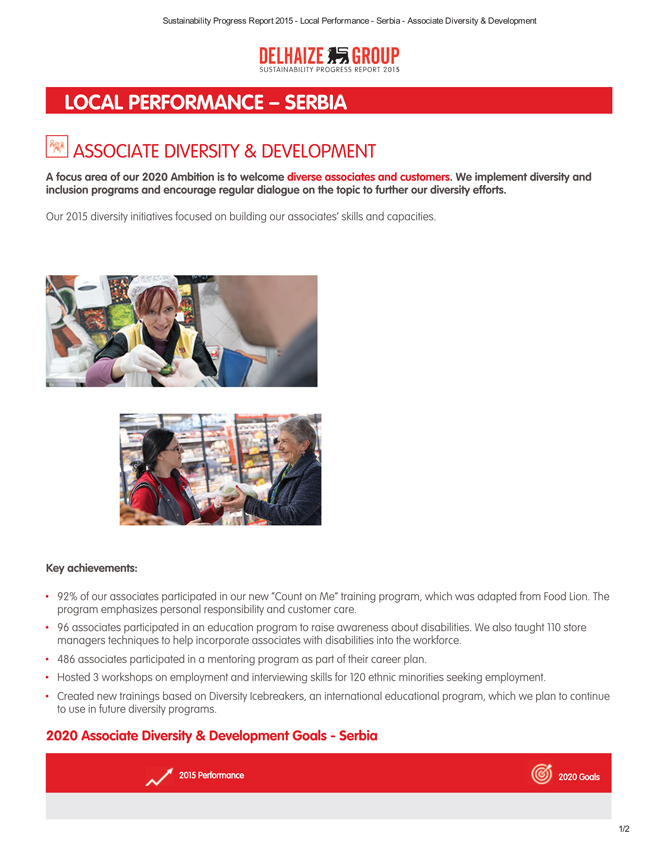
Sustainability Progress Report 2015 - Local Performance - Serbia - Associate Diversity & Development
LOCAL PERFORMANCE – SERBIA
ASSOCIATE DIVERSITY & DEVELOPMENT
A focus area of our 2020 Ambition is to welcome diverse associates and customers. We implement diversity and inclusion programs and encourage regular dialogue on the topic to further our diversity efforts.
Our 2015 diversity initiatives focused on building our associates– skills and capacities.
Key achievements:
92% of our associates participated in our new –Count on Me– training program, which was adapted from Food Lion. The program emphasizes personal responsibility and customer care.
96 associates participated in an education program to raise awareness about disabilities. We also taught 110 store managers techniques to help incorporate associates with disabilities into the workforce.
486 associates participated in a mentoring program as part of their career plan.
Hosted 3 workshops on employment and interviewing skills for 120 ethnic minorities seeking employment. Created new trainings based on Diversity Icebreakers, an international educational program, which we plan to continue to use in future diversity programs.
2020 Associate Diversity & Development Goals—Serbia
2015 Performance
2020 Goals
1/2
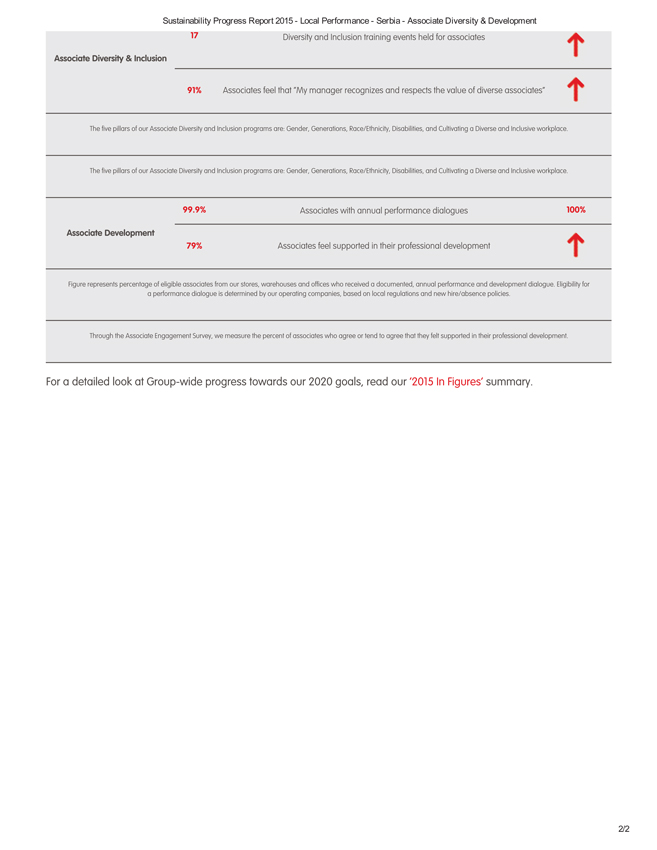
Sustainability Progress Report 2015 - Local Performance - Serbia - Associate Diversity & Development
17
Diversity and Inclusion training events held for associates
Associate Diversity & Inclusion
91%
Associates feel that –My manager recognizes and respects the value of diverse associates–
The five pillars of our Associate Diversity and Inclusion programs are: Gender, Generations, Race/Ethnicity, Disabilities, and Cultivating a Diverse and Inclusive workplace.
The five pillars of our Associate Diversity and Inclusion programs are: Gender, Generations, Race/Ethnicity, Disabilities, and Cultivating a Diverse and Inclusive workplace.
99.9%
Associates with annual performance dialogues
100%
Associate Development
79%
Associates feel supported in their professional development
Figure represents percentage of eligible associates from our stores, warehouses and offices who received a documented, annual performance and development dialogue. Eligibility for
a performance dialogue is determined by our operating companies, based on local regulations and new hire/absence policies.
Through the Associate Engagement Survey, we measure the percent of associates who agree or tend to agree that they felt supported in their professional development.
For a detailed look at Group-wide progress towards our 2020 goals, read our –2015 In Figures– summary.
2/2
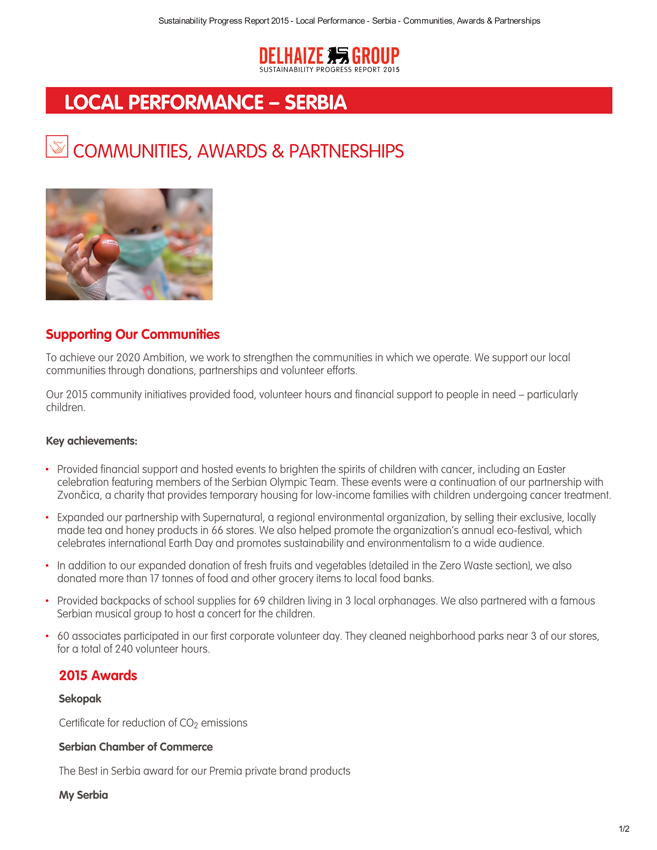
Sustainability Progress Report 2015 - Local Performance - Serbia - Communities, Awards & Partnerships
LOCAL PERFORMANCE – SERBIA
COMMUNITIES, AWARDS & PARTNERSHIPS
Supporting Our Communities
To achieve our 2020 Ambition, we work to strengthen the communities in which we operate. We support our local communities through donations, partnerships and volunteer efforts.
Our 2015 community initiatives provided food, volunteer hours and financial support to people in need – particularly children.
Key achievements:
Provided financial support and hosted events to brighten the spirits of children with cancer, including an Easter celebration featuring members of the Serbian Olympic Team. These events were a continuation of our partnership with Zvon
ica, a charity that provides temporary housing for low-income families with children undergoing cancer treatment. Expanded our partnership with Supernatural, a regional environmental organization, by selling their exclusive, locally made tea and honey products in 66 stores. We also helped promote the organization’s annual eco-festival, which celebrates international Earth Day and promotes sustainability and environmentalism to a wide audience.
In addition to our expanded donation of fresh fruits and vegetables (detailed in the Zero Waste section), we also donated more than 17 tonnes of food and other grocery items to local food banks.
Provided backpacks of school supplies for 69 children living in 3 local orphanages. We also partnered with a famous Serbian musical group to host a concert for the children.
60 associates participated in our first corporate volunteer day. They cleaned neighborhood parks near 3 of our stores, for a total of 240 volunteer hours.
2015 Awards
Sekopak
Certificate for reduction of CO emissions 2
Serbian Chamber of Commerce
The Best in Serbia award for our Premia private brand products
My Serbia
1/2
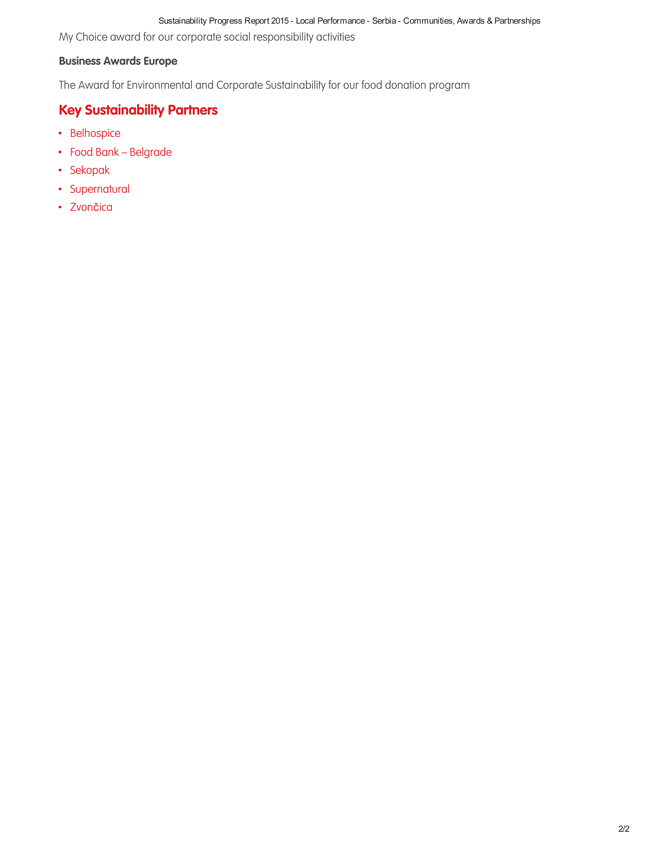
Sustainability Progress Report 2015 - Local Performance - Serbia - Communities, Awards & Partnerships
My Choice award for our corporate social responsibility activities
Business Awards Europe
The Award for Environmental and Corporate Sustainability for our food donation program
Key Sustainability Partners
Belhospice
Food Bank – Belgrade
Sekopak
Supernatural
Zvon
ica
2/2
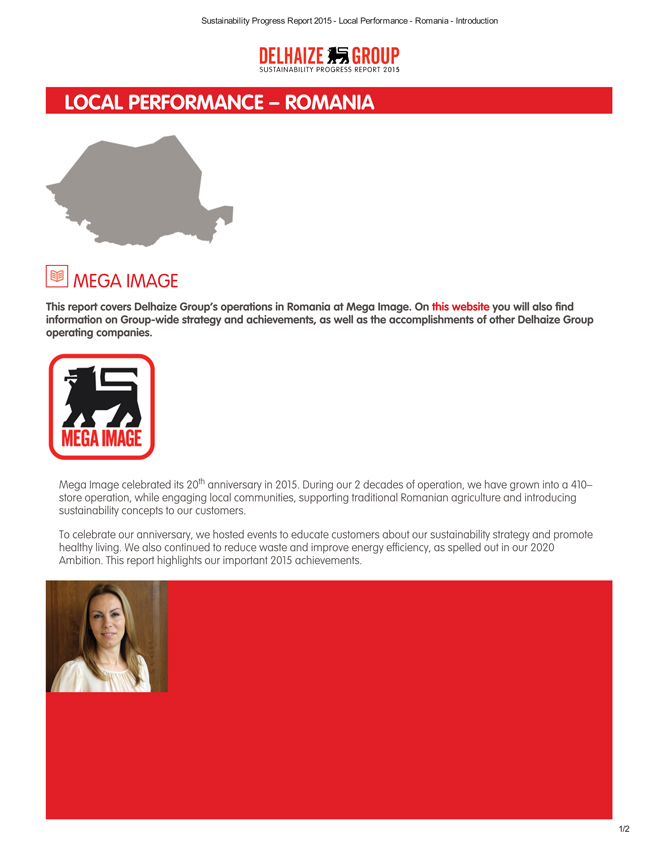
Sustainability Progress Report 2015 - Local Performance - Romania - Introduction
LOCAL PERFORMANCE – ROMANIA
MEGA IMAGE
This report covers Delhaize Group’s operations in Romania at Mega Image. On this website you will also find information on Group-wide strategy and achievements, as well as the accomplishments of other Delhaize Group operating companies.
Mega Image celebrated its 20 anniversary in 2015. During our 2 decades of operation, we have grown into a 410– th store operation, while engaging local communities, supporting traditional Romanian agriculture and introducing sustainability concepts to our customers.
To celebrate our anniversary, we hosted events to educate customers about our sustainability strategy and promote healthy living. We also continued to reduce waste and improve energy efficiency, as spelled out in our 2020 Ambition. This report highlights our important 2015 achievements.
1/2
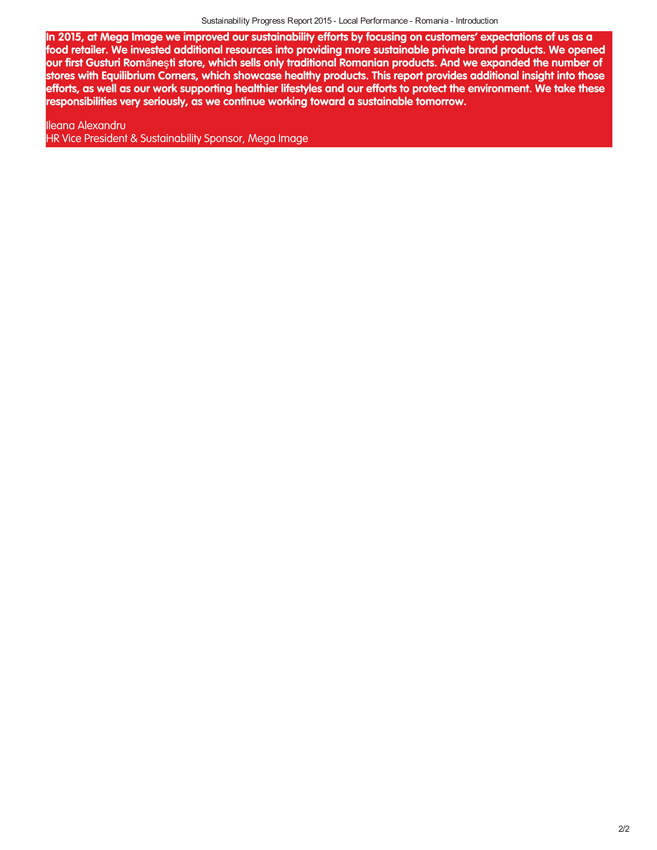
Sustainability Progress Report 2015 - Local Performance - Romania - Introduction
In 2015, at Mega Image we improved our sustainability efforts by focusing on customers– expectations of us as a food retailer. We invested additional resources into providing more sustainable private brand products. We opened our first Gusturi Româneşti store, which sells only traditional Romanian products. And we expanded the number of stores with Equilibrium Corners, which showcase healthy products. This report provides additional insight into those efforts, as well as our work supporting healthier lifestyles and our efforts to protect the environment. We take these responsibilities very seriously, as we continue working toward a sustainable tomorrow.
Ileana Alexandru
HR Vice President & Sustainability Sponsor, Mega Image
2/2
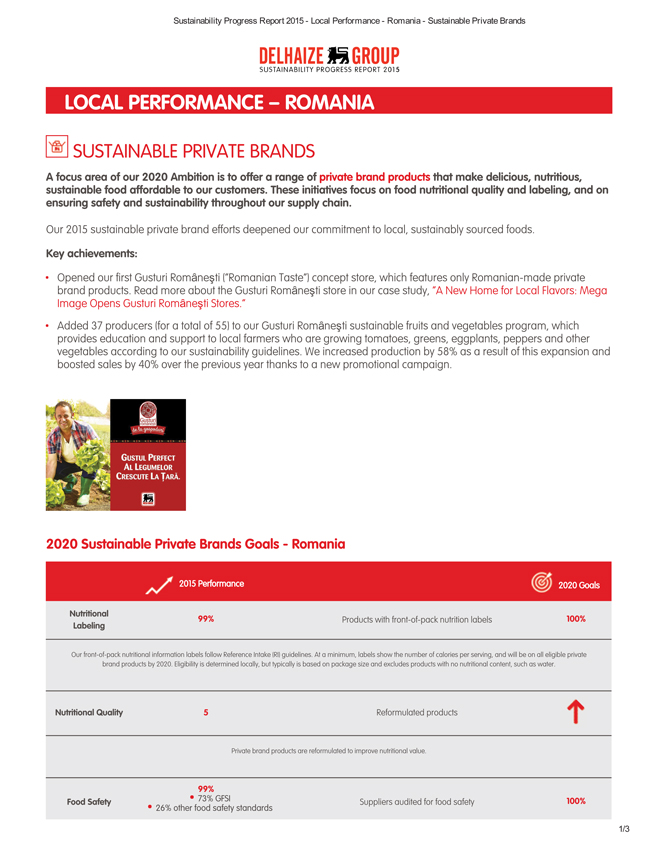
Sustainability Progress Report 2015 - Local Performance - Romania - Introduction
LOCAL PERFORMANCE – ROMANIA
SUSTAINABLE PRIVATE BRANDS
A focus area of our 2020 Ambition is to offer a range of private brand products that make delicious, nutritious, sustainable food affordable to our customers. These initiatives focus on food nutritional quality and labeling, and on ensuring safety and sustainability throughout our supply chain.
Our 2015 sustainable private brand efforts deepened our commitment to local, sustainably sourced foods.
Key achievements:
Opened our first Gusturi Româneşti (“Romanian Taste”) concept store, which features only Romanian-made private brand products. Read more about the Gusturi Româneşti store in our case study, –A New Home for Local Flavors: Mega Image Opens Gusturi Româneşti Stores.– Added 37 producers (for a total of 55) to our Gusturi
Româneşti sustainable fruits and vegetables program, which provides education and support to local farmers who are growing tomatoes, greens, eggplants, peppers and other vegetables according to our sustainability guidelines. We increased production by 58% as a result of this expansion and boosted sales by 40% over the previous year thanks to a new promotional campaign.
2020 Sustainable Private Brands Goals—Romania
2015 Performance
2020 Goals
Nutritional
99%
Products with front-of-pack nutrition labels
100%
Labeling
Our front-of-pack nutritional information labels follow Reference Intake (RI) guidelines. At a minimum, labels show the number of calories per serving, and will be on all eligible private
brand products by 2020. Eligibility is determined locally, but typically is based on package size and excludes products with no nutritional content, such as water.
Nutritional Quality
5
Reformulated products
Private brand products are reformulated to improve nutritional value.
1/3
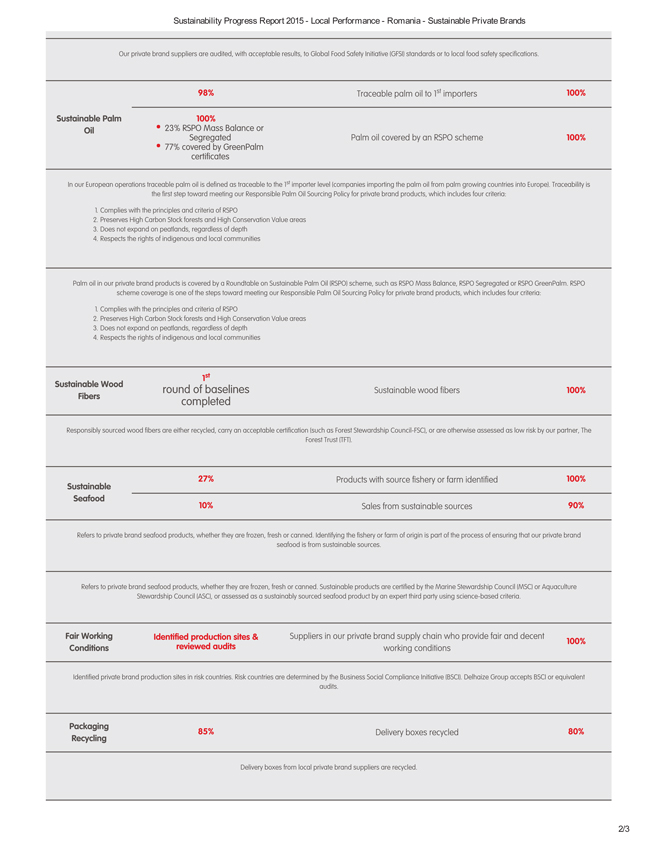
Sustainability Progress Report 2015 - Local Performance - Romania - Sustainable Private Brands
Our private brand suppliers are audited, with acceptable results, to Global Food Safety Initiative (GFSI) standards or to local food safety specifications.
98%
Traceable palm oil to 1st importers
100%
Sustainable Palm
100%
Oil
23% RSPO Mass Balance or
Segregated
Palm oil covered by an RSPO scheme
100%
77% covered by GreenPalm
certificates
In our European operations traceable palm oil is defined as traceable to the 1st importer level (companies importing the palm oil from palm growing countries into Europe). Traceability is the first step toward meeting our Responsible Palm Oil Sourcing Policy for private brand products, which includes four criteria:
Complies with the principles and criteria of RSPO
Preserves High Carbon Stock forests and High Conservation Value areas
Does not expand on peatlands, regardless of depth
Respects the rights of indigenous and local communities
Palm oil in our private brand products is covered by a Roundtable on Sustainable Palm Oil (RSPO) scheme, such as RSPO Mass Balance, RSPO Segregated or RSPO GreenPalm. RSPO scheme coverage is one of the steps toward meeting our Responsible Palm Oil Sourcing Policy for private brand products, which includes four criteria:
Complies with the principles and criteria of RSPO
Preserves High Carbon Stock forests and High Conservation Value areas
Does not expand on peatlands, regardless of depth
Respects the rights of indigenous and local communities
1st
Sustainable Wood
round of baselines
Sustainable wood fibers
100%
Fibers
completed
Responsibly sourced wood fibers are either recycled, carry an acceptable certification (such as Forest Stewardship Council-FSC), or are otherwise assessed as low risk by our partner, The Forest Trust (TFT).
27%
Products with source fishery or farm identified
100%
Sustainable
Seafood
10%
Sales from sustainable sources
90%
Refers to private brand seafood products, whether they are frozen, fresh or canned. Identifying the fishery or farm of origin is part of the process of ensuring that our private brand seafood is from sustainable sources.
Refers to private brand seafood products, whether they are frozen, fresh or canned. Sustainable products are certified by the Marine Stewardship Council (MSC) or Aquaculture Stewardship Council (ASC), or assessed as a sustainably sourced seafood product by an expert third party using science-based criteria.
Fair Working
Identified production sites &
Suppliers in our private brand supply chain who provide fair and decent
100%
Conditions
reviewed audits
working conditions
Identified private brand production sites in risk countries. Risk countries are determined by the Business Social Compliance Initiative (BSCI). Delhaize Group accepts BSCI or equivalent audits.
Packaging
85%
Delivery boxes recycled
80%
Recycling
Delivery boxes from local private brand suppliers are recycled.
2/3
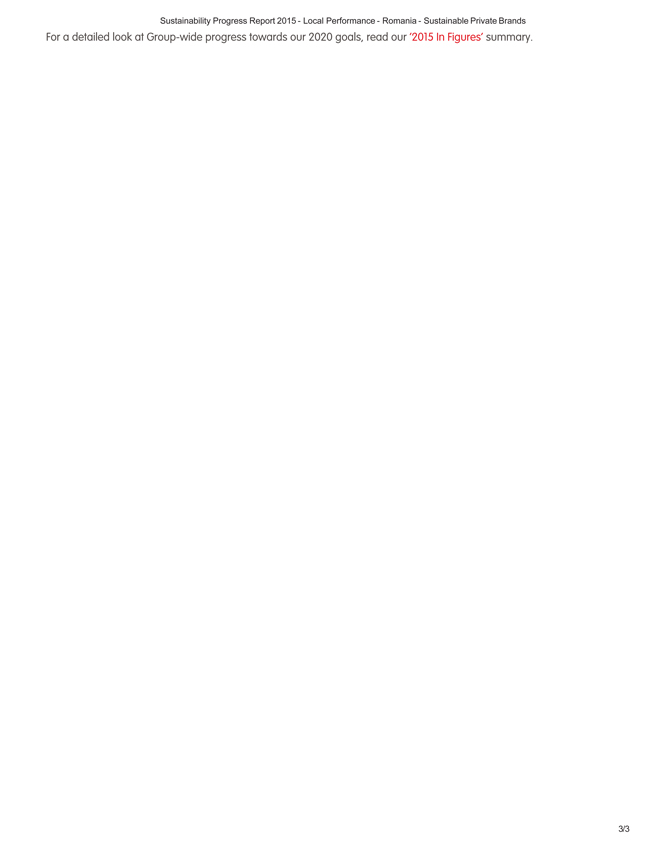
Sustainability Progress Report 2015 - Local Performance - Romania - Sustainable Private Brands
For a detailed look at Group-wide progress towards our 2020 goals, read our –2015 In Figures– summary.
3/3
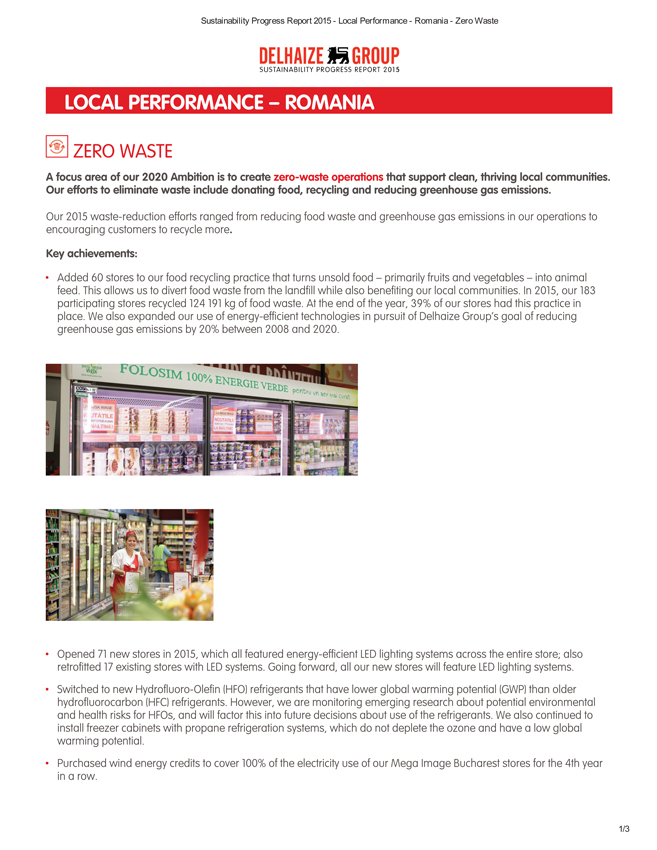
Sustainability Progress Report 2015 - Local Performance - Romania - Zero Waste
LOCAL PERFORMANCE – ROMANIA
ZERO WASTE
A focus area of our 2020 Ambition is to create zero-waste operations that support clean, thriving local communities. Our efforts to eliminate waste include donating food, recycling and reducing greenhouse gas emissions.
Our 2015 waste-reduction efforts ranged from reducing food waste and greenhouse gas emissions in our operations to encouraging customers to recycle more.
Key achievements:
Added 60 stores to our food recycling practice that turns unsold food – primarily fruits and vegetables – into animal feed. This allows us to divert food waste from the landfill while also benefiting our local communities. In 2015, our 183 participating stores recycled 124 191 kg of food waste. At the end of the year, 39% of our stores had this practice in place. We also expanded our use of energy-efficient technologies in pursuit of Delhaize Group’s goal of reducing greenhouse gas emissions by 20% between 2008 and 2020.
Opened 71 new stores in 2015, which all featured energy-efficient LED lighting systems across the entire store; also retrofitted 17 existing stores with LED systems. Going forward, all our new stores will feature LED lighting systems. Switched to new Hydrofluoro-Olefin (HFO) refrigerants that have lower global warming potential (GWP) than older hydrofluorocarbon (HFC) refrigerants. However, we are monitoring emerging research about potential environmental and health risks for HFOs, and will factor this into future decisions about use of the refrigerants. We also continued to install freezer cabinets with propane refrigeration systems, which do not deplete the ozone and have a low global warming potential.
Purchased wind energy credits to cover 100% of the electricity use of our Mega Image Bucharest stores for the 4th year in a row.
1/3
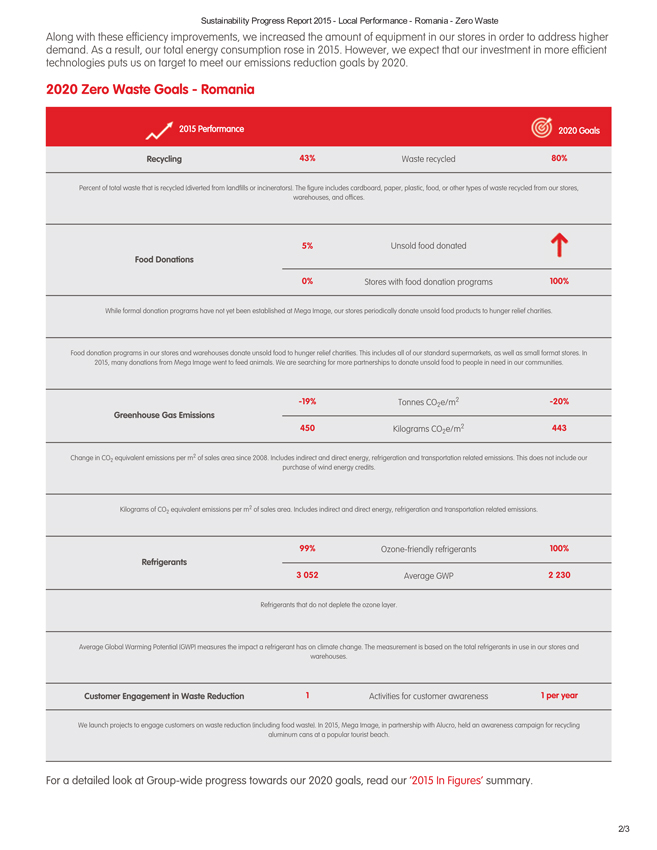
Sustainability Progress Report 2015 - Local Performance - Romania - Zero Waste
Along with these efficiency improvements, we increased the amount of equipment in our stores in order to address higher demand. As a result, our total energy consumption rose in 2015. However, we expect that our investment in more efficient technologies puts us on target to meet our emissions reduction goals by 2020.
2020 Zero Waste Goals—Romania
2015 Performance
2020 Goals
Recycling
43%
Waste recycled
80%
Percent of total waste that is recycled (diverted from landfills or incinerators). The figure includes cardboard, paper, plastic, food, or other types of waste recycled from our stores, warehouses, and offices.
5%
Unsold food donated
Food Donations
0%
Stores with food donation programs
100%
While formal donation programs have not yet been established at Mega Image, our stores periodically donate unsold food products to hunger relief charities.
Food donation programs in our stores and warehouses donate unsold food to hunger relief charities. This includes all of our standard supermarkets, as well as small format stores. In 2015, many donations from Mega Image went to feed animals. We are searching for more partnerships to donate unsold food to people in need in our communities.
-19%
Tonnes CO2 e/m2
-20%
Greenhouse Gas Emissions
450
Kilograms CO2 e/m2
443
Change in CO equivalent emissions per m of sales area since 2008. Includes indirect and direct energy, refrigeration and transportation related emissions. This does not include our 2 2 purchase of wind energy credits.
Kilograms of CO equivalent emissions per m of sales area. Includes indirect and direct energy, refrigeration and transportation related emissions. 2 2
99%
Ozone-friendly refrigerants
100%
Refrigerants
3 052
Average GWP
2 230
Refrigerants that do not deplete the ozone layer.
Average Global Warming Potential (GWP) measures the impact a refrigerant has on climate change. The measurement is based on the total refrigerants in use in our stores and warehouses.
Customer Engagement in Waste Reduction
1 Activities for customer awareness
1 per year
We launch projects to engage customers on waste reduction (including food waste). In 2015, Mega Image, in partnership with Alucro, held an awareness campaign for recycling aluminum cans at a popular tourist beach.
For a detailed look at Group-wide progress towards our 2020 goals, read our –2015 In Figures– summary.
2/3
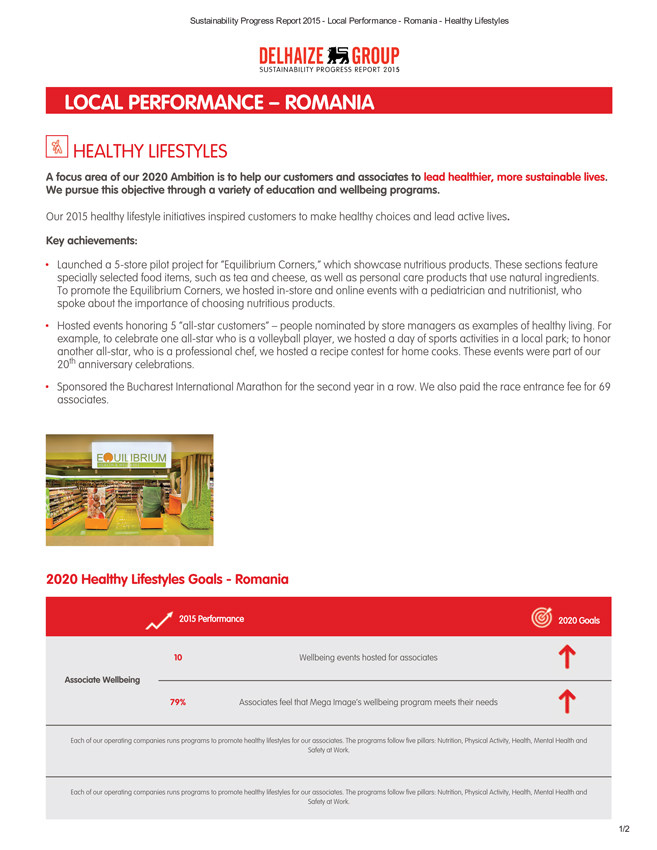
Sustainability Progress Report 2015 - Local Performance - Romania - Healthy Lifestyles
LOCAL PERFORMANCE – ROMANIA
HEALTHY LIFESTYLES
A focus area of our 2020 Ambition is to help our customers and associates to lead healthier, more sustainable lives. We pursue this objective through a variety of education and wellbeing programs.
Our 2015 healthy lifestyle initiatives inspired customers to make healthy choices and lead active lives.
Key achievements:
Launched a 5-store pilot project for –Equilibrium Corners,– which showcase nutritious products. These sections feature specially selected food items, such as tea and cheese, as well as personal care products that use natural ingredients. To promote the Equilibrium Corners, we hosted in-store and online events with a pediatrician and nutritionist, who spoke about the importance of choosing nutritious products.
Hosted events honoring 5 –all-star customers– – people nominated by store managers as examples of healthy living. For example, to celebrate one all-star who is a volleyball player, we hosted a day of sports activities in a local park; to honor another all-star, who is a professional chef, we hosted a recipe contest for home cooks. These events were part of our 20 anniversary celebrations. th Sponsored the Bucharest International Marathon for the second year in a row. We also paid the race entrance fee for 69 associates.
2020 Healthy Lifestyles Goals—Romania
2015 Performance
2020 Goals
10
Wellbeing events hosted for associates
Associate Wellbeing
79%
Associates feel that Mega Image’s wellbeing program meets their needs
Each of our operating companies runs programs to promote healthy lifestyles for our associates. The programs follow five pillars: Nutrition, Physical Activity, Health, Mental Health and Safety at Work.
Each of our operating companies runs programs to promote healthy lifestyles for our associates. The programs follow five pillars: Nutrition, Physical Activity, Health, Mental Health and Safety at Work.
1/2
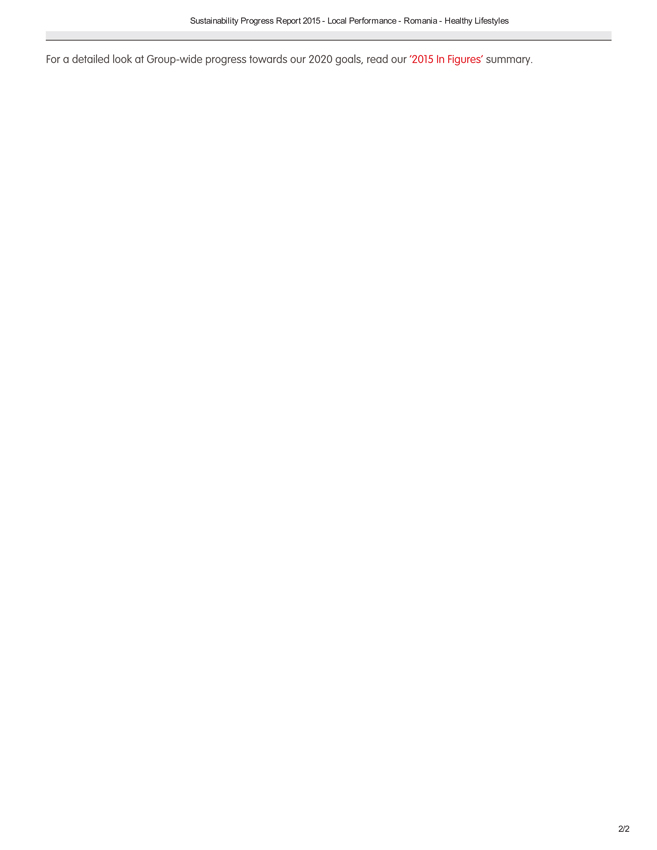
Sustainability Progress Report 2015 - Local Performance - Romania - Healthy Lifestyles
For a detailed look at Group-wide progress towards our 2020 goals, read our –2015 In Figures– summary.
2/2
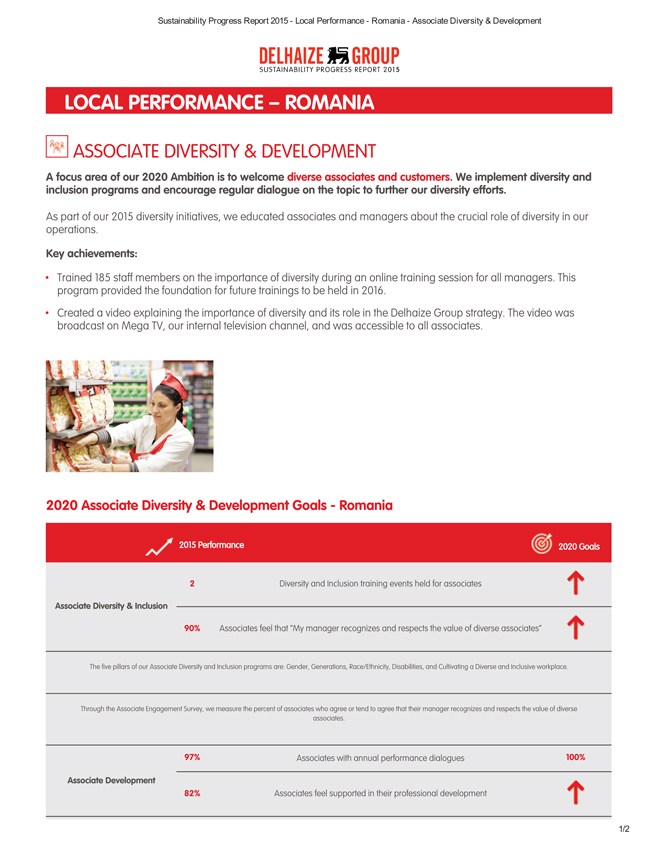
Sustainability Progress Report 2015 - Local Performance - Romania - Associate Diversity & Development
LOCAL PERFORMANCE – ROMANIA
ASSOCIATE DIVERSITY & DEVELOPMENT
A focus area of our 2020 Ambition is to welcome diverse associates and customers. We implement diversity and inclusion programs and encourage regular dialogue on the topic to further our diversity efforts.
As part of our 2015 diversity initiatives, we educated associates and managers about the crucial role of diversity in our operations.
Key achievements:
Trained 185 staff members on the importance of diversity during an online training session for all managers. This program provided the foundation for future trainings to be held in 2016.
Created a video explaining the importance of diversity and its role in the Delhaize Group strategy. The video was broadcast on Mega TV, our internal television channel, and was accessible to all associates.
2020 Associate Diversity & Development Goals—Romania
2015 Performance
2020 Goals
2
Diversity and Inclusion training events held for associates
Associate Diversity & Inclusion
90% Associates feel that –My manager recognizes and respects the value of diverse associates–
The five pillars of our Associate Diversity and Inclusion programs are: Gender, Generations, Race/Ethnicity, Disabilities, and Cultivating a Diverse and Inclusive workplace.
Through the Associate Engagement Survey, we measure the percent of associates who agree or tend to agree that their manager recognizes and respects the value of diverse
associates.
97%
Associates with annual performance dialogues
100%
Associate Development
82%
Associates feel supported in their professional development
1/2
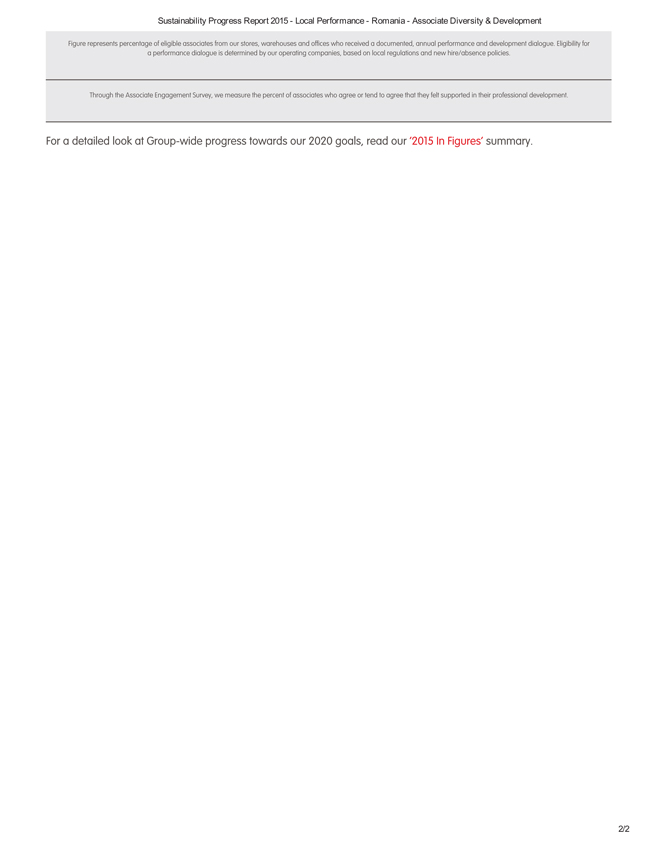
Sustainability Progress Report 2015 - Local Performance - Romania - Associate Diversity & Development
Figure represents percentage of eligible associates from our stores, warehouses and offices who received a documented, annual performance and development dialogue. Eligibility for a performance dialogue is determined by our operating companies, based on local regulations and new hire/absence policies.
Through the Associate Engagement Survey, we measure the percent of associates who agree or tend to agree that they felt supported in their professional development.
For a detailed look at Group-wide progress towards our 2020 goals, read our –2015 In Figures– summary.
2/2
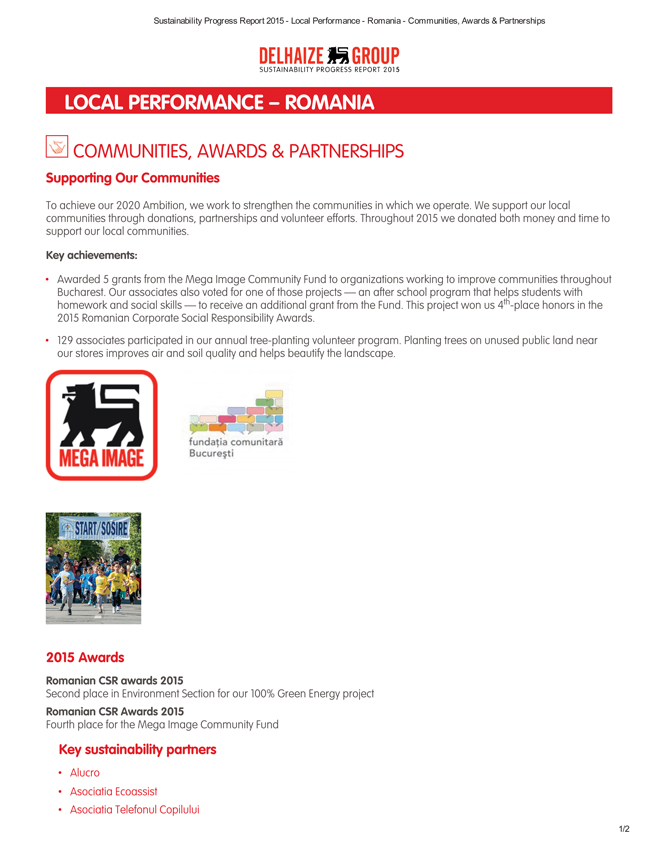
Sustainability Progress Report 2015 - Local Performance - Romania - Communities, Awards & Partnerships
LOCAL PERFORMANCE – ROMANIA
COMMUNITIES, AWARDS & PARTNERSHIPS
Supporting Our Communities
To achieve our 2020 Ambition, we work to strengthen the communities in which we operate. We support our local communities through donations, partnerships and volunteer efforts. Throughout 2015 we donated both money and time to support our local communities.
Key achievements:
Awarded 5 grants from the Mega Image Community Fund to organizations working to improve communities throughout Bucharest. Our associates also voted for one of those projects – an after school program that helps students with homework and social skills – to receive an additional grant from the Fund. This project won us 4-place honors in the th 2015 Romanian Corporate Social Responsibility Awards.
129 associates participated in our annual tree-planting volunteer program. Planting trees on unused public land near our stores improves air and soil quality and helps beautify the landscape.
2015 Awards
Romanian CSR awards 2015
Second place in Environment Section for our 100% Green Energy project
Romanian CSR Awards 2015
Fourth place for the Mega Image Community Fund
Key sustainability partners
Alucro Asociatia Ecoassist Asociatia Telefonul Copilului
1/2
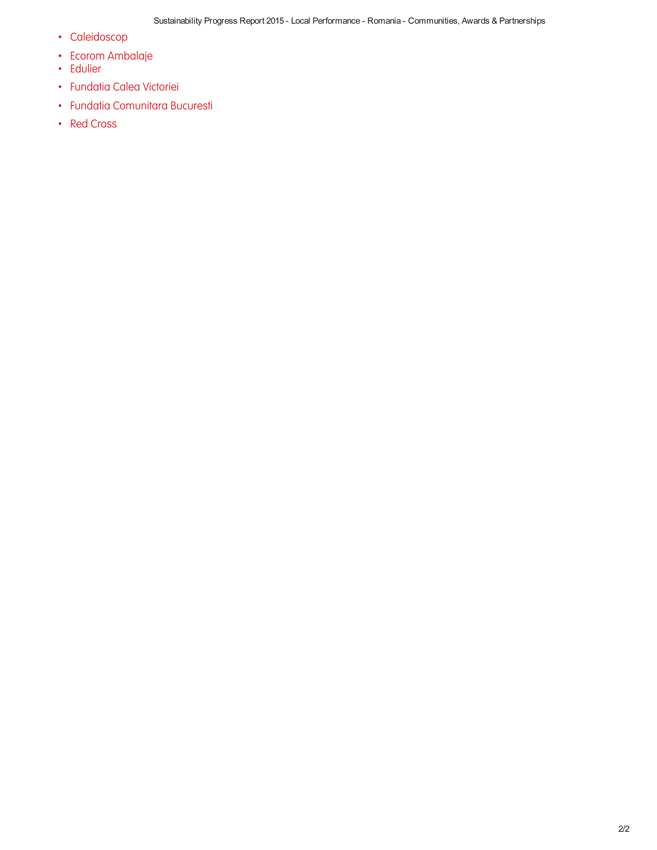
Sustainability Progress Report 2015 - Local Performance - Romania - Communities, Awards & Partnerships
Caleidoscop
Ecorom Ambalaje
Edulier
Fundatia Calea Victoriei
Fundatia Comunitara Bucuresti
Red Cross
2/2
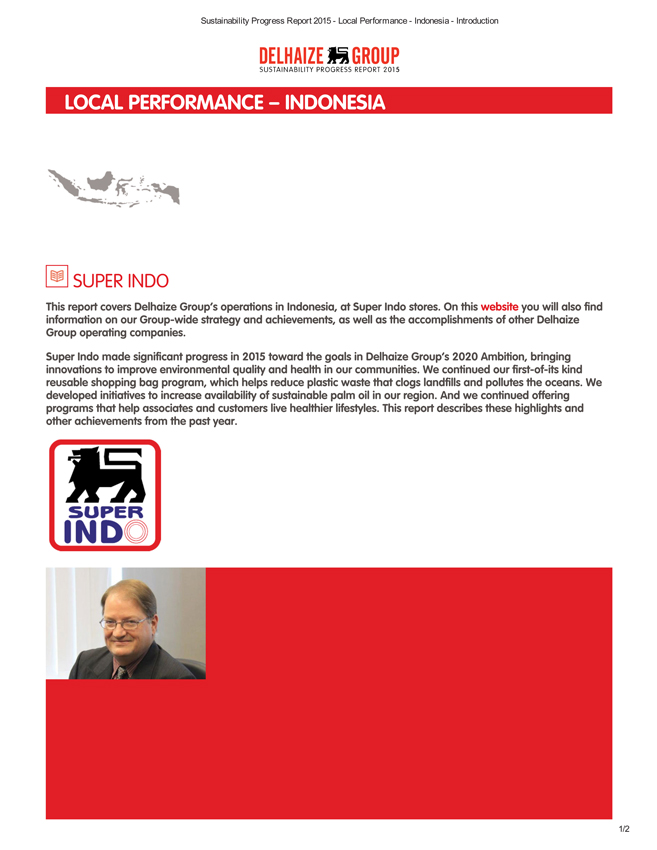
Sustainability Progress Report 2015 - Local Performance - Indonesia - Introduction
LOCAL PERFORMANCE – INDONESIA
SUPER INDO
This report covers Delhaize Group’s operations in Indonesia, at Super Indo stores. On this website you will also find information on our Group-wide strategy and achievements, as well as the accomplishments of other Delhaize Group operating companies.
Super Indo made significant progress in 2015 toward the goals in Delhaize Group’s 2020 Ambition, bringing innovations to improve environmental quality and health in our communities. We continued our first-of-its kind reusable shopping bag program, which helps reduce plastic waste that clogs landfills and pollutes the oceans. We developed initiatives to increase availability of sustainable palm oil in our region. And we continued offering programs that help associates and customers live healthier lifestyles. This report describes these highlights and other achievements from the past year.
1/2
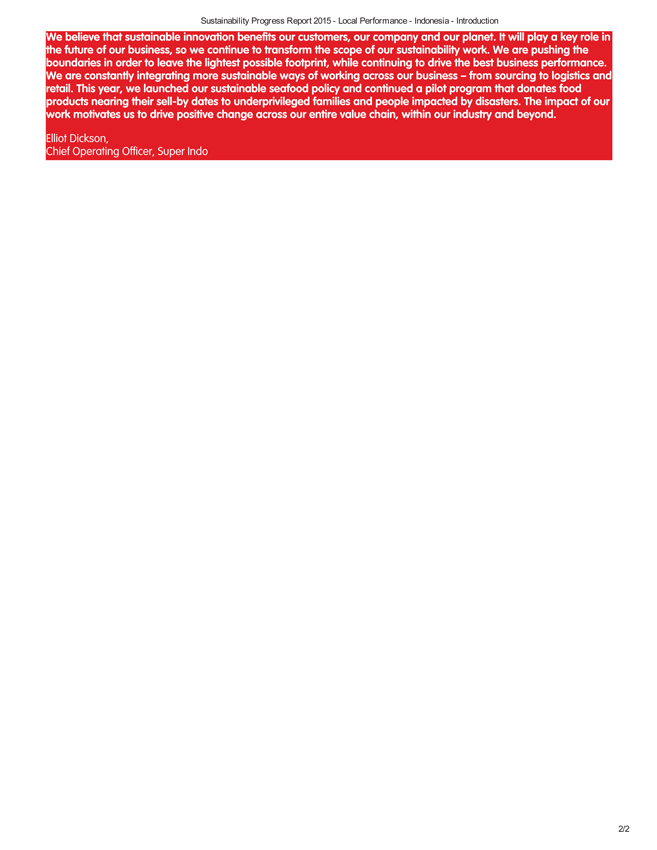
Sustainability Progress Report 2015 - Local Performance - Indonesia - Introduction
We believe that sustainable innovation benefits our customers, our company and our planet. It will play a key role in the future of our business, so we continue to transform the scope of our sustainability work. We are pushing the boundaries in order to leave the lightest possible footprint, while continuing to drive the best business performance. We are constantly integrating more sustainable ways of working across our business – from sourcing to logistics and retail. This year, we launched our sustainable seafood policy and continued a pilot program that donates food products nearing their sell-by dates to underprivileged families and people impacted by disasters. The impact of our work motivates us to drive positive change across our entire value chain, within our industry and beyond.
Elliot Dickson,
Chief Operating Officer, Super Indo
2/2
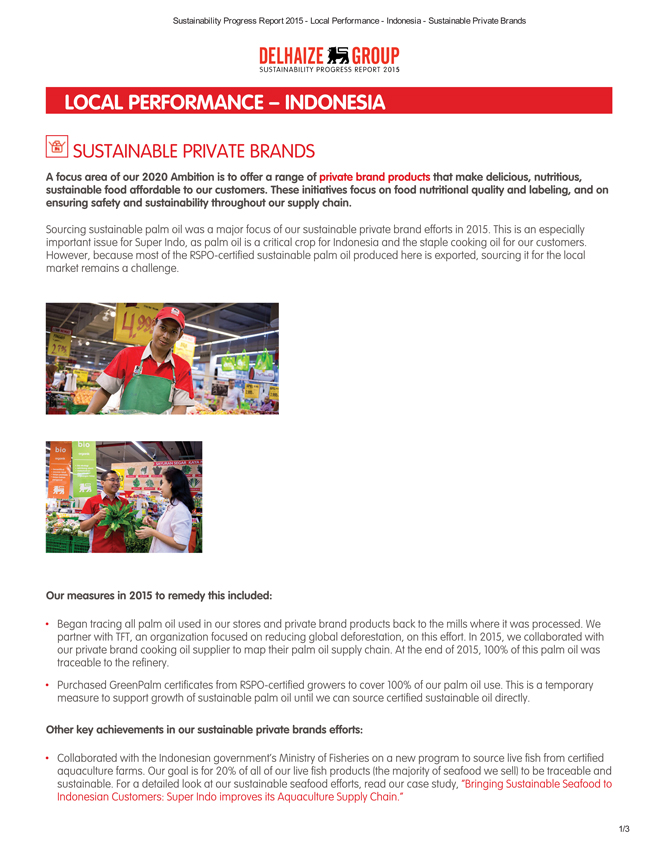
Sustainability Progress Report 2015 - Local Performance - Indonesia - Sustainable Private Brands
LOCAL PERFORMANCE – INDONESIA
SUSTAINABLE PRIVATE BRANDS
A focus area of our 2020 Ambition is to offer a range of private brand products that make delicious, nutritious, sustainable food affordable to our customers. These initiatives focus on food nutritional quality and labeling, and on ensuring safety and sustainability throughout our supply chain.
Sourcing sustainable palm oil was a major focus of our sustainable private brand efforts in 2015. This is an especially important issue for Super Indo, as palm oil is a critical crop for Indonesia and the staple cooking oil for our customers. However, because most of the RSPO-certified sustainable palm oil produced here is exported, sourcing it for the local market remains a challenge.
Our measures in 2015 to remedy this included:
Began tracing all palm oil used in our stores and private brand products back to the mills where it was processed. We partner with TFT, an organization focused on reducing global deforestation, on this effort. In 2015, we collaborated with our private brand cooking oil supplier to map their palm oil supply chain. At the end of 2015, 100% of this palm oil was traceable to the refinery.
Purchased GreenPalm certificates from RSPO-certified growers to cover 100% of our palm oil use. This is a temporary measure to support growth of sustainable palm oil until we can source certified sustainable oil directly.
Other key achievements in our sustainable private brands efforts:
Collaborated with the Indonesian government’s Ministry of Fisheries on a new program to source live fish from certified aquaculture farms. Our goal is for 20% of all of our live fish products (the majority of seafood we sell) to be traceable and sustainable. For a detailed look at our sustainable seafood efforts, read our case study, –Bringing Sustainable Seafood to Indonesian Customers: Super Indo improves its Aquaculture Supply Chain.–
1/3
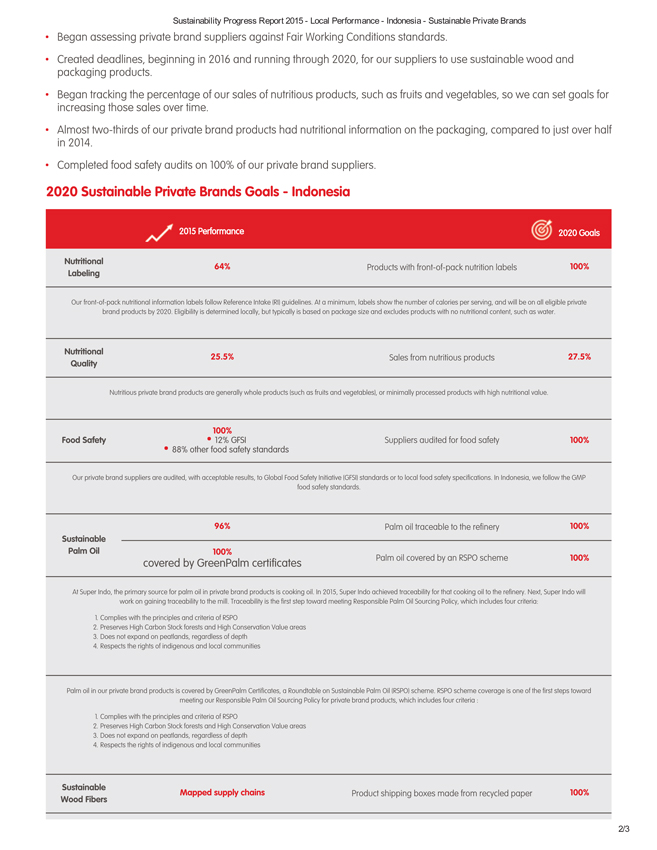
Sustainability Progress Report 2015 - Local Performance - Indonesia - Sustainable Private Brands
Began assessing private brand suppliers against Fair Working Conditions standards.
Created deadlines, beginning in 2016 and running through 2020, for our suppliers to use sustainable wood and packaging products.
Began tracking the percentage of our sales of nutritious products, such as fruits and vegetables, so we can set goals for increasing those sales over time.
Almost two-thirds of our private brand products had nutritional information on the packaging, compared to just over half in 2014.
Completed food safety audits on 100% of our private brand suppliers.
2020 Sustainable Private Brands Goals—Indonesia
2015 Performance
2020 Goals
Nutritional
64%
Products with front-of-pack nutrition labels
100%
Labeling
Our front-of-pack nutritional information labels follow Reference Intake (RI) guidelines. At a minimum, labels show the number of calories per serving, and will be on all eligible private brand products by 2020. Eligibility is determined locally, but typically is based on package size and excludes products with no nutritional content, such as water.
Nutritional
25.5%
Sales from nutritious products
27.5%
Quality
Nutritious private brand products are generally whole products (such as fruits and vegetables), or minimally processed products with high nutritional value.
100%
Food Safety
12% GFSI
Suppliers audited for food safety
100%
88% other food safety standards
Our private brand suppliers are audited, with acceptable results, to Global Food Safety Initiative (GFSI) standards or to local food safety specifications. In Indonesia, we follow the GMP food safety standards.
96%
Palm oil traceable to the refinery
100%
Sustainable
Palm Oil
100%
covered by GreenPalm certificates
Palm oil covered by an RSPO scheme
100%
At Super Indo, the primary source for palm oil in private brand products is cooking oil. In 2015, Super Indo achieved traceability for that cooking oil to the refinery. Next, Super Indo will work on gaining traceability to the mill. Traceability is the first step toward meeting Responsible Palm Oil Sourcing Policy, which includes four criteria:
Complies with the principles and criteria of RSPO
Preserves High Carbon Stock forests and High Conservation Value areas
Does not expand on peatlands, regardless of depth
Respects the rights of indigenous and local communities
Palm oil in our private brand products is covered by GreenPalm Certificates, a Roundtable on Sustainable Palm Oil (RSPO) scheme. RSPO scheme coverage is one of the first steps toward meeting our Responsible Palm Oil Sourcing Policy for private brand products, which includes four criteria :
Complies with the principles and criteria of RSPO
Preserves High Carbon Stock forests and High Conservation Value areas
Does not expand on peatlands, regardless of depth
Respects the rights of indigenous and local communities
Sustainable
Mapped supply chains
Product shipping boxes made from recycled paper
100%
Wood Fibers
2/3
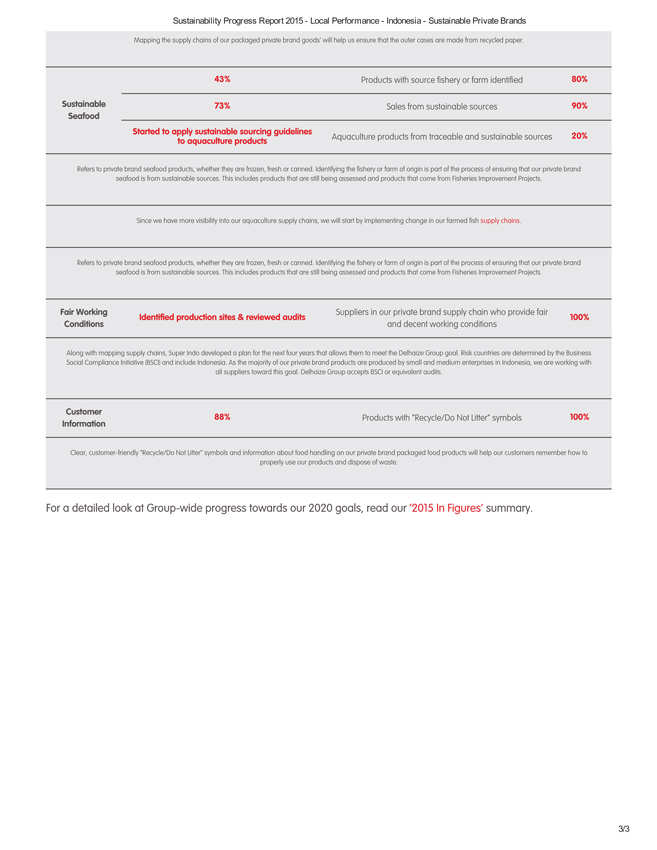
Sustainability Progress Report 2015 - Local Performance - Indonesia - Sustainable Private Brands
Mapping the supply chains of our packaged private brand goods– will help us ensure that the outer cases are made from recycled paper.
43%
Products with source fishery or farm identified
80%
Sustainable
73%
Sales from sustainable sources
90%
Seafood
Started to apply sustainable sourcing guidelines
Aquaculture products from traceable and sustainable sources
20%
to aquaculture products
Refers to private brand seafood products, whether they are frozen, fresh or canned. Identifying the fishery or farm of origin is part of the process of ensuring that our private brand seafood is from sustainable sources. This includes products that are still being assessed and products that come from Fisheries Improvement Projects.
Since we have more visibility into our aquaculture supply chains, we will start by implementing change in our farmed fish supply chains.
Refers to private brand seafood products, whether they are frozen, fresh or canned. Identifying the fishery or farm of origin is part of the process of ensuring that our private brand seafood is from sustainable sources. This includes products that are still being assessed and products that come from Fisheries Improvement Projects.
Fair Working
Suppliers in our private brand supply chain who provide fair
Identified production sites & reviewed audits
100%
Conditions
and decent working conditions
Along with mapping supply chains, Super Indo developed a plan for the next four years that allows them to meet the Delhaize Group goal. Risk countries are determined by the Business Social Compliance Initiative (BSCI) and include Indonesia. As the majority of our private brand products are produced by small and medium enterprises in Indonesia, we are working with all suppliers toward this goal. Delhaize Group accepts BSCI or equivalent audits.
Customer
88%
Products with –Recycle/Do Not Litter– symbols
100%
Information
Clear, customer-friendly –Recycle/Do Not Litter– symbols and information about food handling on our private brand packaged food products will help our customers remember how to properly use our products and dispose of waste.
For a detailed look at Group-wide progress towards our 2020 goals, read our –2015 In Figures– summary.
3/3
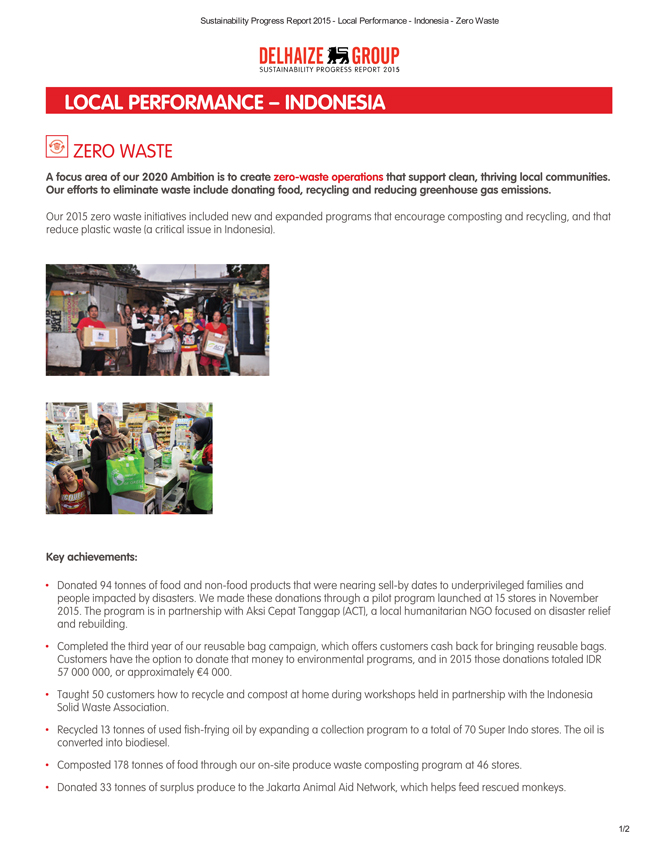
Sustainability Progress Report 2015 - Local Performance - Indonesia - Zero Waste
LOCAL PERFORMANCE – INDONESIA
ZERO WASTE
A focus area of our 2020 Ambition is to create zero-waste operations that support clean, thriving local communities. Our efforts to eliminate waste include donating food, recycling and reducing greenhouse gas emissions.
Our 2015 zero waste initiatives included new and expanded programs that encourage composting and recycling, and that reduce plastic waste (a critical issue in Indonesia).
Key achievements:
Donated 94 tonnes of food and non-food products that were nearing sell-by dates to underprivileged families and people impacted by disasters. We made these donations through a pilot program launched at 15 stores in November 2015. The program is in partnership with Aksi Cepat Tanggap (ACT), a local humanitarian NGO focused on disaster relief and rebuilding.
Completed the third year of our reusable bag campaign, which offers customers cash back for bringing reusable bags. Customers have the option to donate that money to environmental programs, and in 2015 those donations totaled IDR 57 000 000, or approximately €4 000.
Taught 50 customers how to recycle and compost at home during workshops held in partnership with the Indonesia Solid Waste Association.
Recycled 13 tonnes of used fish-frying oil by expanding a collection program to a total of 70 Super Indo stores. The oil is converted into biodiesel.
Composted 178 tonnes of food through our on-site produce waste composting program at 46 stores. Donated 33 tonnes of surplus produce to the Jakarta Animal Aid Network, which helps feed rescued monkeys.
1/2
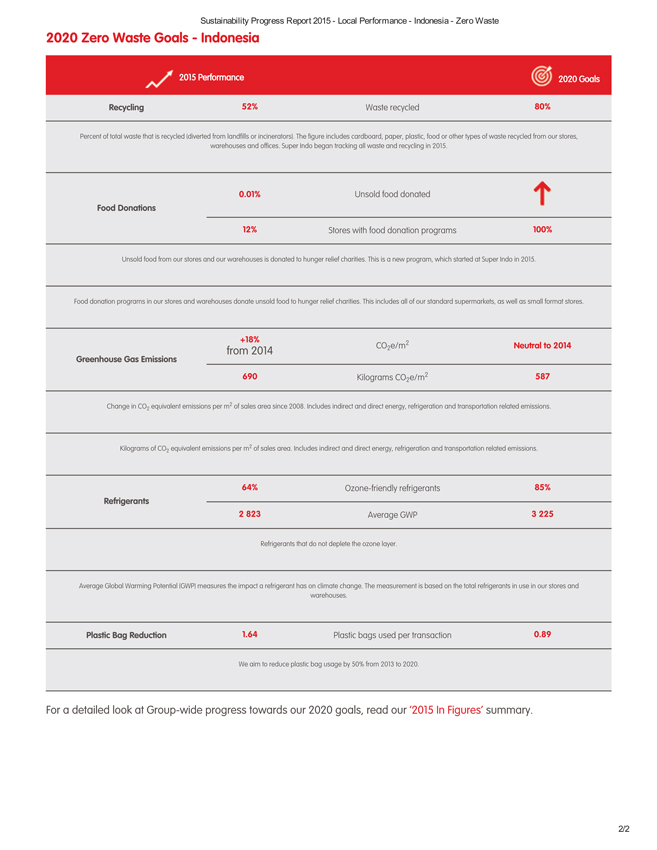
Sustainability Progress Report 2015 - Local Performance - Indonesia - Zero Waste
2020 Zero Waste Goals—Indonesia
2015 Performance
2020 Goals
Recycling
52%
Waste recycled
80%
Percent of total waste that is recycled (diverted from landfills or incinerators). The figure includes cardboard, paper, plastic, food or other types of waste recycled from our stores, warehouses and offices. Super Indo began tracking all waste and recycling in 2015.
0.01%
Unsold food donated
Food Donations
12%
Stores with food donation programs
100%
Unsold food from our stores and our warehouses is donated to hunger relief charities. This is a new program, which started at Super Indo in 2015.
Food donation programs in our stores and warehouses donate unsold food to hunger relief charities. This includes all of our standard supermarkets, as well as small format stores.
+18%
CO e/m2
Neutral to 2014
from 2014
2
Greenhouse Gas Emissions
690
Kilograms CO2 e/m2
587
Change in CO equivalent emissions per m of sales area since 2008. Includes indirect and direct energy, refrigeration and transportation related emissions. 2 2
Kilograms of CO equivalent emissions per m of sales area. Includes indirect and direct energy, refrigeration and transportation related emissions. 2 2
64%
Ozone-friendly refrigerants
85%
Refrigerants
2 823
Average GWP
3 225
Refrigerants that do not deplete the ozone layer.
Average Global Warming Potential (GWP) measures the impact a refrigerant has on climate change. The measurement is based on the total refrigerants in use in our stores and warehouses.
Plastic Bag Reduction
1.64
Plastic bags used per transaction
0.89
We aim to reduce plastic bag usage by 50% from 2013 to 2020.
For a detailed look at Group-wide progress towards our 2020 goals, read our –2015 In Figures– summary.
2/2
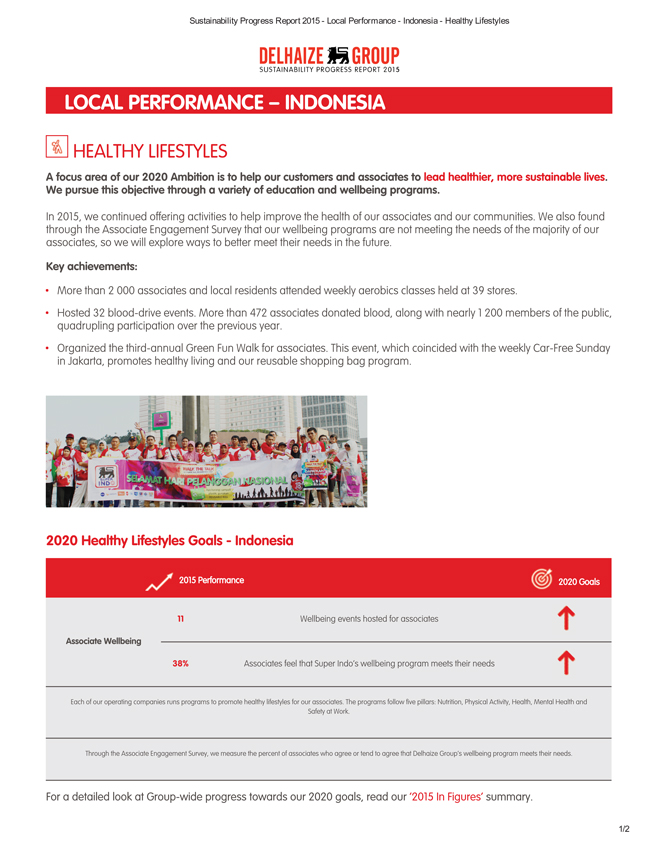
Sustainability Progress Report 2015 - Local Performance - Indonesia - Healthy Lifestyles
LOCAL PERFORMANCE – INDONESIA
HEALTHY LIFESTYLES
A focus area of our 2020 Ambition is to help our customers and associates to lead healthier, more sustainable lives. We pursue this objective through a variety of education and wellbeing programs.
In 2015, we continued offering activities to help improve the health of our associates and our communities. We also found through the Associate Engagement Survey that our wellbeing programs are not meeting the needs of the majority of our associates, so we will explore ways to better meet their needs in the future.
Key achievements:
More than 2 000 associates and local residents attended weekly aerobics classes held at 39 stores.
Hosted 32 blood-drive events. More than 472 associates donated blood, along with nearly 1 200 members of the public, quadrupling participation over the previous year.
Organized the third-annual Green Fun Walk for associates. This event, which coincided with the weekly Car-Free Sunday in Jakarta, promotes healthy living and our reusable shopping bag program.
2020 Healthy Lifestyles Goals—Indonesia
2015 Performance
2020 Goals
11
Wellbeing events hosted for associates
Associate Wellbeing
38%
Associates feel that Super Indo’s wellbeing program meets their needs
Each of our operating companies runs programs to promote healthy lifestyles for our associates. The programs follow five pillars: Nutrition, Physical Activity, Health, Mental Health and Safety at Work.
Through the Associate Engagement Survey, we measure the percent of associates who agree or tend to agree that Delhaize Group’s wellbeing program meets their needs.
For a detailed look at Group-wide progress towards our 2020 goals, read our –2015 In Figures– summary.
1/2
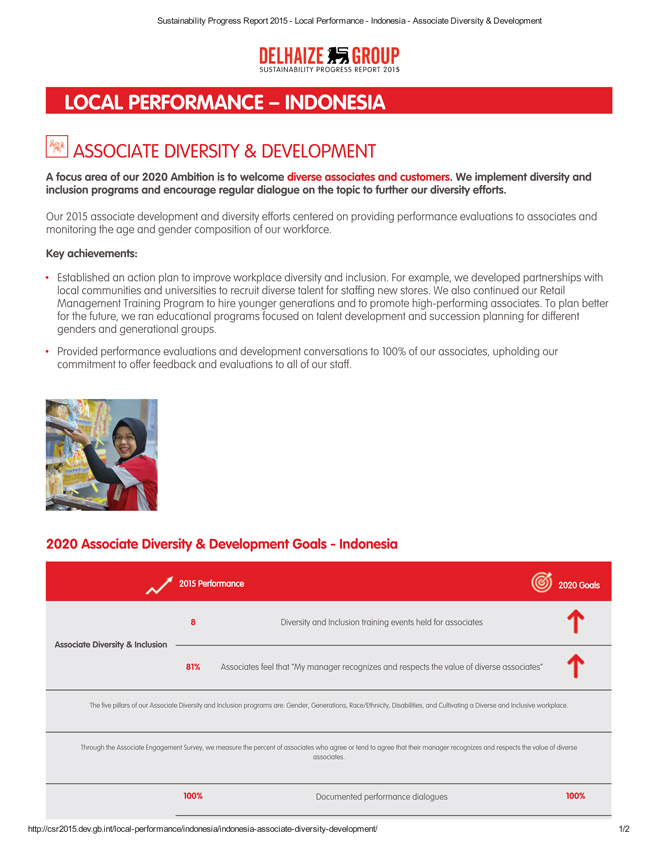
Sustainability Progress Report 2015 - Local Performance - Indonesia - Associate Diversity & Development
LOCAL PERFORMANCE – INDONESIA
ASSOCIATE DIVERSITY & DEVELOPMENT
A focus area of our 2020 Ambition is to welcome diverse associates and customers. We implement diversity and inclusion programs and encourage regular dialogue on the topic to further our diversity efforts.
Our 2015 associate development and diversity efforts centered on providing performance evaluations to associates and monitoring the age and gender composition of our workforce.
Key achievements:
Established an action plan to improve workplace diversity and inclusion. For example, we developed partnerships with local communities and universities to recruit diverse talent for staffing new stores. We also continued our Retail Management Training Program to hire younger generations and to promote high-performing associates. To plan better for the future, we ran educational programs focused on talent development and succession planning for different genders and generational groups.
Provided performance evaluations and development conversations to 100% of our associates, upholding our commitment to offer feedback and evaluations to all of our staff.
2020 Associate Diversity & Development Goals—Indonesia
2015 Performance
2020 Goals
8 |
|
Diversity and Inclusion training events held for associates
Associate Diversity & Inclusion
81% Associates feel that –My manager recognizes and respects the value of diverse associates–
The five pillars of our Associate Diversity and Inclusion programs are: Gender, Generations, Race/Ethnicity, Disabilities, and Cultivating a Diverse and Inclusive workplace.
Through the Associate Engagement Survey, we measure the percent of associates who agree or tend to agree that their manager recognizes and respects the value of diverse
associates.
100%
Documented performance dialogues
100%
http://csr2015.dev.gb.int/local-performance/indonesia/indonesia-associate-diversity-development/
1/2
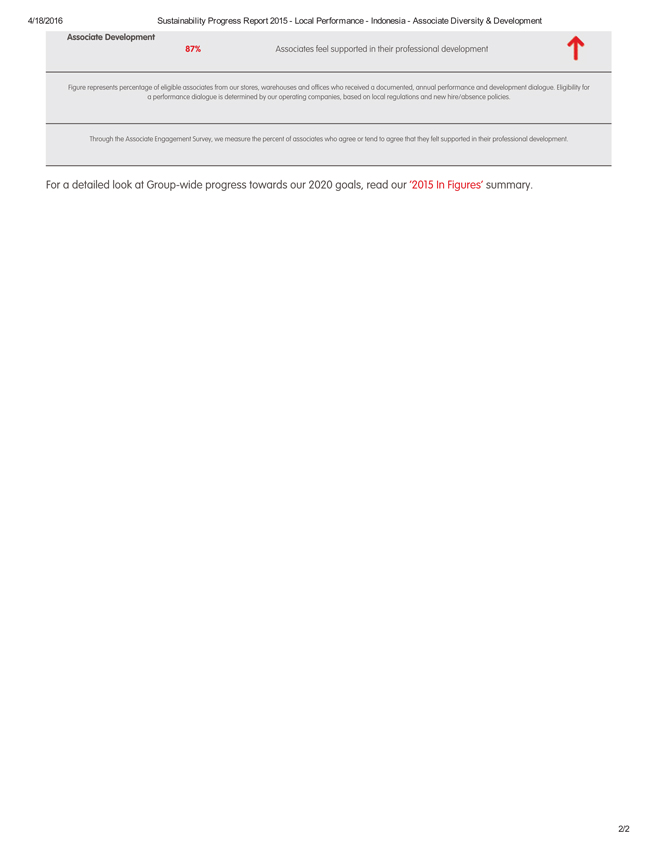
4/18/2016Sustainability Progress Report 2015 - Local Performance - Indonesia - Associate Diversity & Development
Associate Development
87% Associates feel supported in their professional development
[Graphic Appears Here]
Figure represents percentage of eligible associates from our stores, warehouses and offices who received a documented, annual performance and development dialogue. Eligibility for a performance dialogue is determined by our operating companies, based on local regulations and new hire/absence policies.
Through the Associate Engagement Survey, we measure the percent of associates who agree or tend to agree that they felt supported in their professional development.
For a detailed look at Group-wide progress towards our 2020 goals, read our –2015 In Figures– summary.
2/2
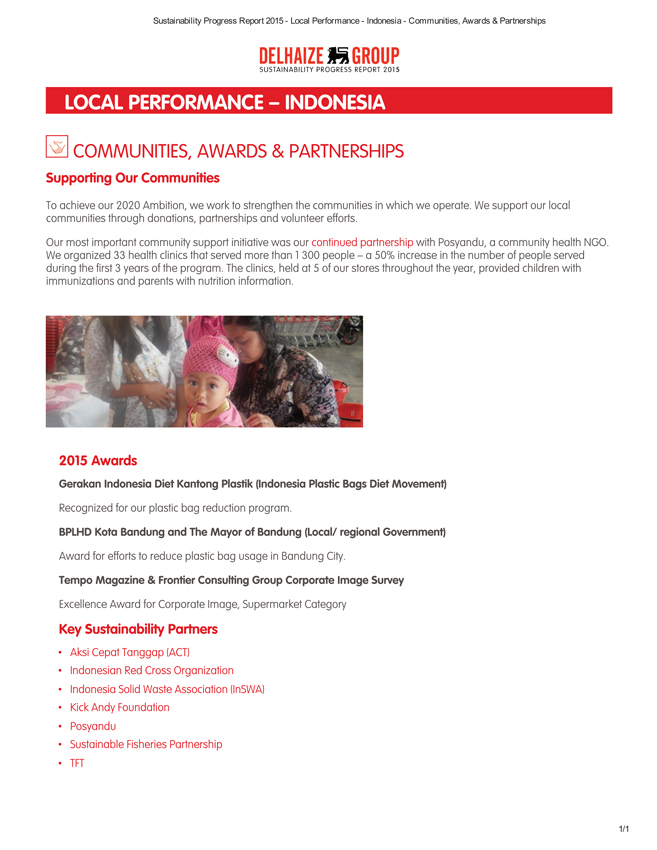
Sustainability Progress Report 2015 - Local Performance - Indonesia - Communities, Awards & Partnerships
LOCAL PERFORMANCE – INDONESIA
COMMUNITIES, AWARDS & PARTNERSHIPS
Supporting Our Communities
To achieve our 2020 Ambition, we work to strengthen the communities in which we operate. We support our local communities through donations, partnerships and volunteer efforts.
Our most important community support initiative was our continued partnership with Posyandu, a community health NGO. We organized 33 health clinics that served more than 1 300 people – a 50% increase in the number of people served during the first 3 years of the program. The clinics, held at 5 of our stores throughout the year, provided children with immunizations and parents with nutrition information.
2015 Awards
Gerakan Indonesia Diet Kantong Plastik (Indonesia Plastic Bags Diet Movement)
Recognized for our plastic bag reduction program.
BPLHD Kota Bandung and The Mayor of Bandung (Local/ regional Government)
Award for efforts to reduce plastic bag usage in Bandung City.
Tempo Magazine & Frontier Consulting Group Corporate Image Survey
Excellence Award for Corporate Image, Supermarket Category
Key Sustainability Partners
Aksi Cepat Tanggap (ACT)
Indonesian Red Cross Organization
Indonesia Solid Waste Association (InSWA)
Kick Andy Foundation
Posyandu
Sustainable Fisheries Partnership
TFT
1/1
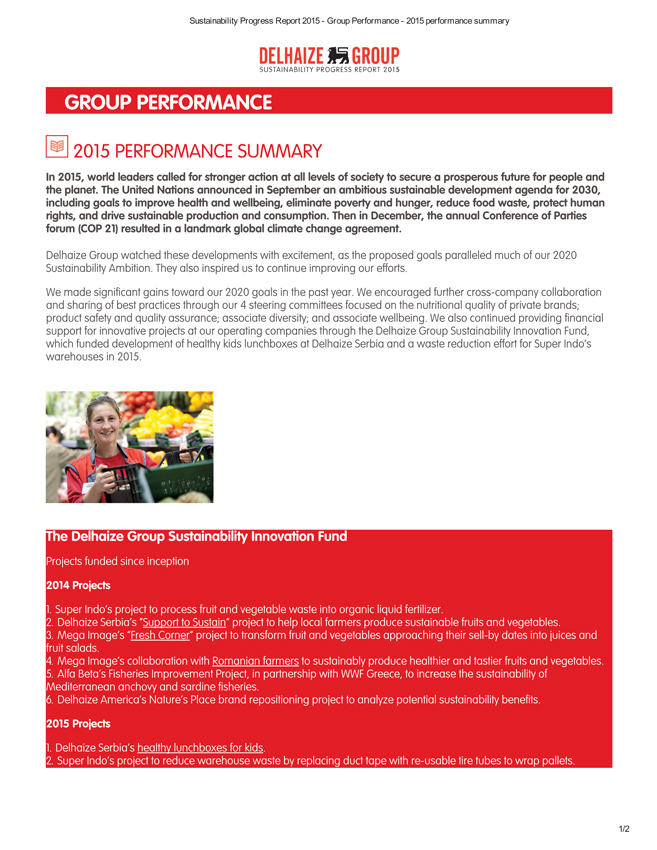
Sustainability Progress Report 2015 - Group Performance - 2015 performance summary
GROUP PERFORMANCE
2015 PERFORMANCE SUMMARY
In 2015, world leaders called for stronger action at all levels of society to secure a prosperous future for people and the planet. The United Nations announced in September an ambitious sustainable development agenda for 2030, including goals to improve health and wellbeing, eliminate poverty and hunger, reduce food waste, protect human rights, and drive sustainable production and consumption. Then in December, the annual Conference of Parties forum (COP 21) resulted in a landmark global climate change agreement.
Delhaize Group watched these developments with excitement, as the proposed goals paralleled much of our 2020 Sustainability Ambition. They also inspired us to continue improving our efforts.
We made significant gains toward our 2020 goals in the past year. We encouraged further cross-company collaboration and sharing of best practices through our 4 steering committees focused on the nutritional quality of private brands; product safety and quality assurance; associate diversity; and associate wellbeing. We also continued providing financial support for innovative projects at our operating companies through the Delhaize Group Sustainability Innovation Fund, which funded development of healthy kids lunchboxes at Delhaize Serbia and a waste reduction effort for Super Indo’s warehouses in 2015.
The Delhaize Group Sustainability Innovation Fund
Projects funded since inception
2014 Projects
Super Indo’s project to process fruit and vegetable waste into organic liquid fertilizer.
Delhaize Serbia’s ‘support to Sustain– project to help local farmers produce sustainable fruits and vegetables.
Mega Image’s –Fresh Corner– project to transform fruit and vegetables approaching their sell-by dates into juices and
fruit salads.
Mega Image’s collaboration with Romanian farmers to sustainably produce healthier and tastier fruits and vegetables.
Alfa Beta’s Fisheries Improvement Project, in partnership with WWF Greece, to increase the sustainability of
Mediterranean anchovy and sardine fisheries.
6.Delhaize America’s Nature’s Place brand repositioning project to analyze potential sustainability benefits.
2015 Projects
Delhaize Serbia’s healthy lunchboxes for kids.
Super Indo’s project to reduce warehouse waste by replacing duct tape with re-usable tire tubes to wrap pallets.
1/2
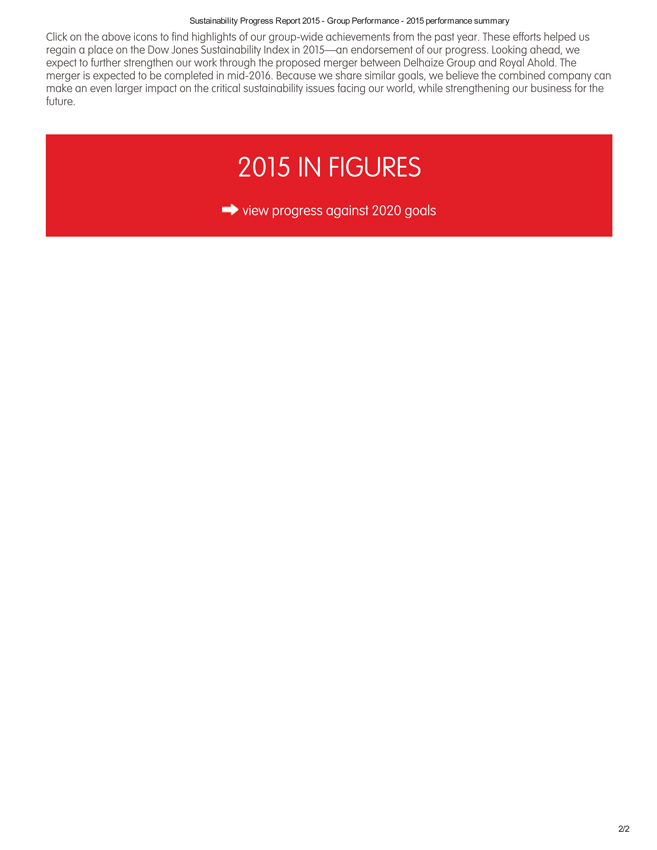
Sustainability Progress Report 2015 - Group Performance - 2015 performance summary
Click on the above icons to find highlights of our group-wide achievements from the past year. These efforts helped us regain a place on the Dow Jones Sustainability Index in 2015–an endorsement of our progress. Looking ahead, we expect to further strengthen our work through the proposed merger between Delhaize Group and Royal Ahold. The merger is expected to be completed in mid-2016. Because we share similar goals, we believe the combined company can make an even larger impact on the critical sustainability issues facing our world, while strengthening our business for the future.
2015 IN FIGURES
view progress against 2020 goals
2/2
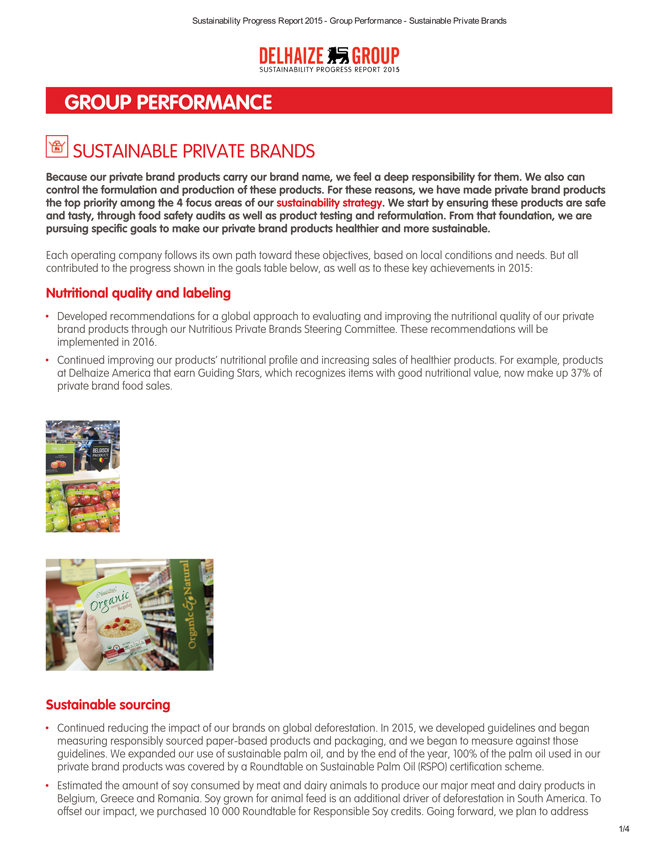
Sustainability Progress Report 2015 - Group Performance - Sustainable Private Brands
GROUP PERFORMANCE
SUSTAINABLE PRIVATE BRANDS
Because our private brand products carry our brand name, we feel a deep responsibility for them. We also can control the formulation and production of these products. For these reasons, we have made private brand products the top priority among the 4 focus areas of our sustainability strategy. We start by ensuring these products are safe and tasty, through food safety audits as well as product testing and reformulation. From that foundation, we are pursuing specific goals to make our private brand products healthier and more sustainable.
Each operating company follows its own path toward these objectives, based on local conditions and needs. But all contributed to the progress shown in the goals table below, as well as to these key achievements in 2015:
Nutritional quality and labeling
Developed recommendations for a global approach to evaluating and improving the nutritional quality of our private brand products through our Nutritious Private Brands Steering Committee. These recommendations will be implemented in 2016.
Continued improving our products– nutritional profile and increasing sales of healthier products. For example, products at Delhaize America that earn Guiding Stars, which recognizes items with good nutritional value, now make up 37% of private brand food sales.
Sustainable sourcing
Continued reducing the impact of our brands on global deforestation. In 2015, we developed guidelines and began measuring responsibly sourced paper-based products and packaging, and we began to measure against those guidelines. We expanded our use of sustainable palm oil, and by the end of the year, 100% of the palm oil used in our private brand products was covered by a Roundtable on Sustainable Palm Oil (RSPO) certification scheme. Estimated the amount of soy consumed by meat and dairy animals to produce our major meat and dairy products in Belgium, Greece and Romania. Soy grown for animal feed is an additional driver of deforestation in South America. To offset our impact, we purchased 10 000 Roundtable for Responsible Soy credits. Going forward, we plan to address
1/4

Progress Report 2015 - Group
-
Private Brands
issues regarding the accessibility of data, the accessibility of certified sustainable commodities in Greece, Serbia, Romania and Indonesia, and the complexity of our supply chains.
Expanded our sustainable seafood offerings so that sustainably sourced products from sustainable sources represented 87% of our private brand seafood sales by the end of 2015.
Fair working conditions
Reviewed protection of human rights in our operations and supply chains with our operating company Sustainability Sponsors. Led by an expert in human rights and social compliance, the group discussed current worldwide conditions and how we can best address human rights concerns.
Identified production sites for products coming from countries at greatest risk of poor working conditions, and increased our monitoring of third-party audits aimed at ensuring fair working conditions throughout our supply chain. We recognize that audits are only one tool to achieve this goal, so we also worked with our peers in the Consumer Goods Forum (CGF) to push for greater transparency and protections for workers across the globe.
2020 Sustainable Private Brands Goals
2015 Performance
2020 Goals
Nutritional Labeling
80%
Products with front-of-pack nutrition labels
100%
Our front-of-pack nutritional information labels follow Reference Intake (RI) or Facts Up Front guidelines. At a minimum, labels show the number of calories per serving, and will be on all
eligible private brand products by 2020. Eligibility is determined locally, but typically is based on package size and excludes products with no nutritional content, such as water. This
figure excludes Delhaize Belgium, as only products that were redesigned in the third and fourth quarters of 2015 were tracked.
Private brand food sales that earn at least 1 Guiding Star at Delhaize
Nutritional Quality
37%
45%
America
At Delhaize America, nutritious private brand products are defined as earning at least one Guiding Star. Guiding Stars is an objective food evaluation system that rates products based
on nutrient density (learn more at www.guidingstars.com).
98%
Food Safety
85% GFSI
Suppliers audited for food safety
100%
13% other food safety standards
Our private brand suppliers are audited, with acceptable results, to Global Food Safety Initiative (GFSI) standards or to local food safety specifications.
2/4
|
Sustainability Progress Report 2015 - Group Performance - Sustainable Private Brands
74%
Palm oil traceable to 1st importers
100%
96%
Palm oil traceable to the refinery at Super Indo
100%
Sustainable Palm
Oil
100%
39% RSPO Mass Balance or
Segregated
Palm oil covered by an RSPO scheme
100%
61% covered by GreenPalm
certificates
In our European and U.S. operations traceable palm oil is defined as traceable to the 1 importer level (the companies importing the palm oil from palm st growing countries into Europe or the U.S.). Traceability is the first step toward meeting our Responsible Palm Oil Sourcing Policy for private brand products, which includes four criteria:
Complies with the principles and criteria of RSPO
Preserves High Carbon Stock forests and High Conservation Value areas
Does not expand on peatlands, regardless of depth
Respects the rights of indigenous and local communities
At Super Indo, the primary private brand product containing palm oil is cooking oil. In 2015, Super Indo has achieved traceability for that cooking oil to the refinery. Next, Super Indo will work on gaining traceability to the mill. Traceability is the first step toward meeting our Responsible Palm Oil Sourcing Policy for private brand products, which includes four criteria:
Complies with the principles and criteria of RSPO
Preserves High Carbon Stock forests and High Conservation Value areas
Does not expand on peatlands, regardless of depth
Respects the rights of indigenous and local communities
Palm oil in our private brand products is covered by a Roundtable on Sustainable Palm Oil (RSPO) scheme, such as RSPO Mass Balance, RSPO Segregated or RSPO GreenPalm. RSPO scheme coverage is one of the steps toward meeting our Responsible Palm Oil Sourcing Policy, which includes four criteria:
Complies with the principles and criteria of RSPO
Preserves High Carbon Stock forests and High Conservation Value areas
Does not expand on peatlands, regardless of depth
Respects the rights of indigenous and local communities
1st
Sustainable Wood
round of baselines
Sustainable wood fibers
100%
Fibers
completed
Sustainable wood fibers are either recycled, carry an acceptable certification (such as Forest Stewardship Council-FSC), or are otherwise assessed as low risk by our partner, The Forest Trust (TFT). This goal applies to private brand products and packaging made from wood fibers, as well as products used in our operations.
3/4
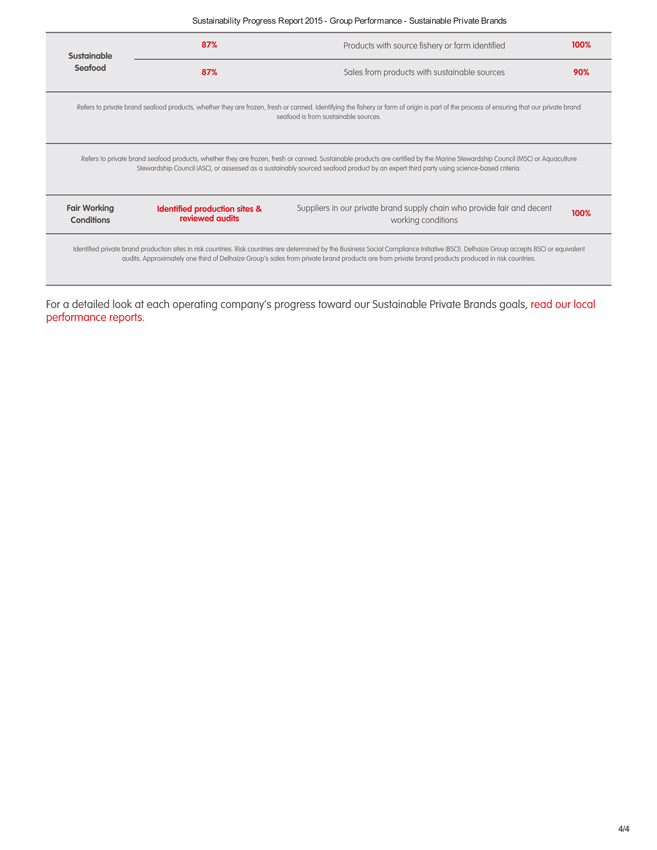
Sustainability Progress Report 2015 - Group Performance - Sustainable Private Brands
87%
Products with source fishery or farm identified
100%
Sustainable
Seafood
87%
Sales from products with sustainable sources
90%
Refers to private brand seafood products, whether they are frozen, fresh or canned. Identifying the fishery or farm of origin is part of the process of ensuring that our private brand seafood is from sustainable sources.
Refers to private brand seafood products, whether they are frozen, fresh or canned. Sustainable products are certified by the Marine Stewardship Council (MSC) or Aquaculture Stewardship Council (ASC), or assessed as a sustainably sourced seafood product by an expert third party using science-based criteria.
Fair Working
Identified production sites &
Suppliers in our private brand supply chain who provide fair and decent
100%
Conditions
reviewed audits
working conditions
Identified private brand production sites in risk countries. Risk countries are determined by the Business Social Compliance Initiative (BSCI). Delhaize Group accepts BSCI or equivalent audits. Approximately one third of Delhaize Group’s sales from private brand products are from private brand products produced in risk countries.
For a detailed look at each operating company’s progress toward our Sustainable Private Brands goals, read our local performance reports.
4/4
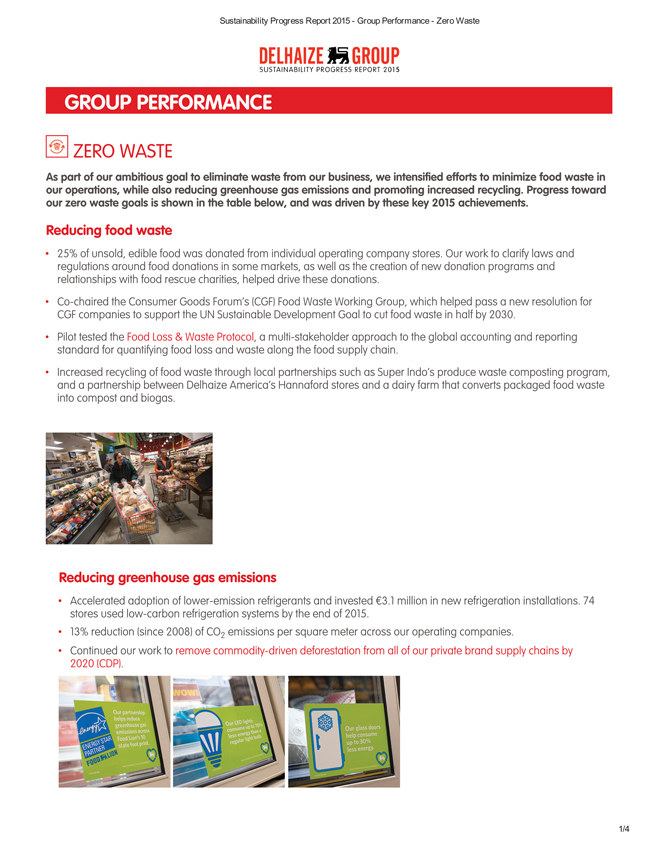
Sustainability Progress Report 2015 - Group Performance - Zero Waste
GROUP PERFORMANCE
ZERO WASTE
As part of our ambitious goal to eliminate waste from our business, we intensified efforts to minimize food waste in our operations, while also reducing greenhouse gas emissions and promoting increased recycling. Progress toward our zero waste goals is shown in the table below, and was driven by these key 2015 achievements.
Reducing food waste
25% of unsold, edible food was donated from individual operating company stores. Our work to clarify laws and regulations around food donations in some markets, as well as the creation of new donation programs and relationships with food rescue charities, helped drive these donations.
Co-chaired the Consumer Goods Forum’s (CGF) Food Waste Working Group, which helped pass a new resolution for CGF companies to support the UN Sustainable Development Goal to cut food waste in half by 2030.
Pilot tested the Food Loss & Waste Protocol, a multi-stakeholder approach to the global accounting and reporting standard for quantifying food loss and waste along the food supply chain.
Increased recycling of food waste through local partnerships such as Super Indo’s produce waste composting program, and a partnership between Delhaize America’s Hannaford stores and a dairy farm that converts packaged food waste into compost and biogas.
Reducing greenhouse gas emissions
Accelerated adoption of lower-emission refrigerants and invested €3.1 million in new refrigeration installations. 74 stores used low-carbon refrigeration systems by the end of 2015.
13% reduction (since 2008) of CO emissions per square meter across our operating companies. 2 Continued our work to remove commodity-driven deforestation from all of our private brand supply chains by 2020 (CDP).
1/4
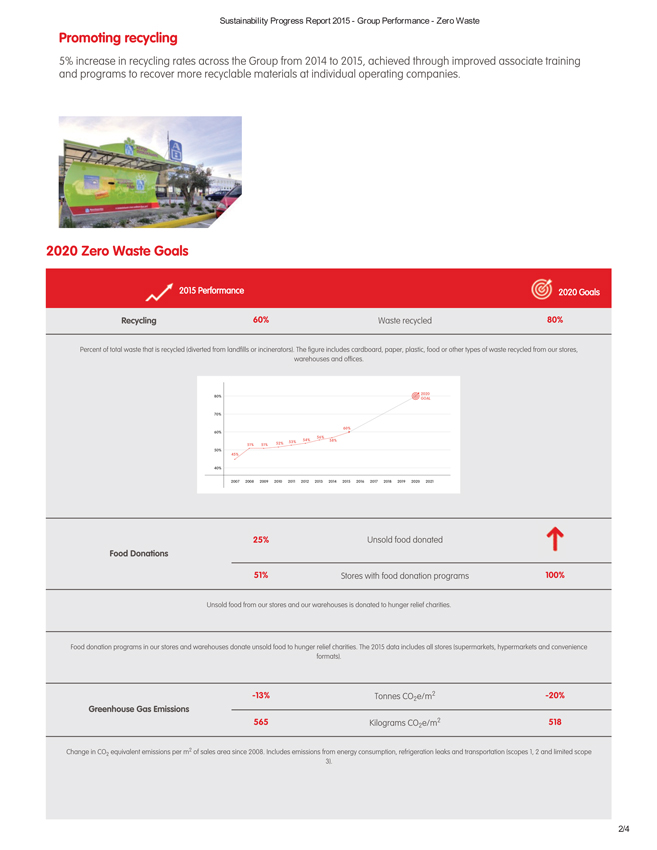
Sustainability Progress Report 2015 - Group Performance - Zero Waste
Promoting recycling
5% increase in recycling rates across the Group from 2014 to 2015, achieved through improved associate training and programs to recover more recyclable materials at individual operating companies.
2020 Zero Waste Goals
2015 Performance
2020 Goals
Recycling
60%
Waste recycled
80%
Percent of total waste that is recycled (diverted from landfills or incinerators). The figure includes cardboard, paper, plastic, food or other types of waste recycled from our stores,
warehouses and offices.
25%
Unsold food donated
Food Donations
51%
Stores with food donation programs
100%
Unsold food from our stores and our warehouses is donated to hunger relief charities.
Food donation programs in our stores and warehouses donate unsold food to hunger relief charities. The 2015 data includes all stores (supermarkets, hypermarkets and convenience
formats).
-13%
Tonnes CO2 e/m2
-20%
Greenhouse Gas Emissions
565
Kilograms CO2 e/m2
518
Change in CO equivalent emissions per m of sales area since 2008. Includes emissions from energy consumption, refrigeration leaks and transportation (scopes 1, 2 and limited scope 2 2 3).
2/4
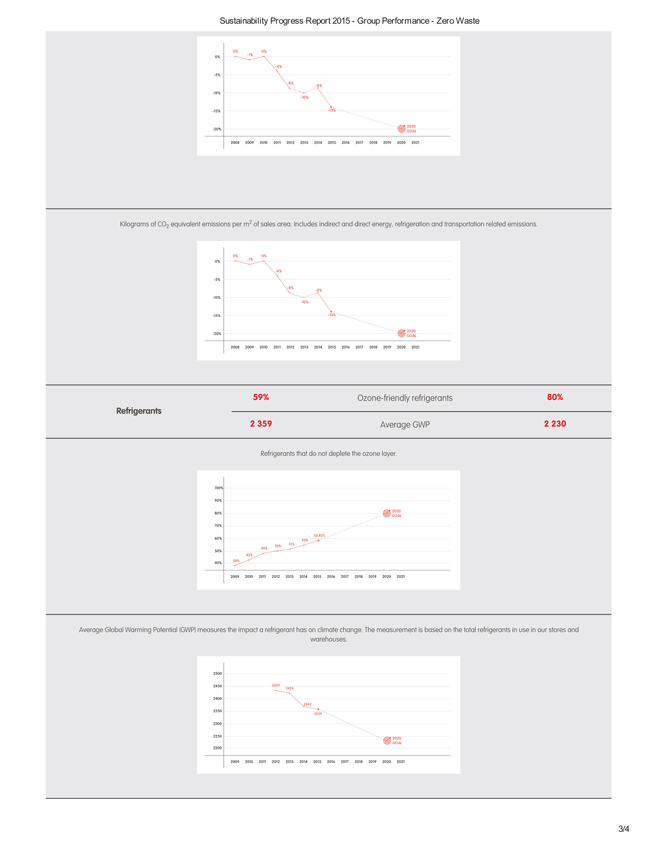
Sustainability Progress Report 2015 - Group Performance - Zero Waste
Kilograms of CO equivalent emissions per m of sales area. Includes indirect and direct energy, refrigeration and transportation related emissions. 2 2
59% Ozone-friendly refrigerants 80% Refrigerants 2 359 Average GWP 2 230
Refrigerants that do not deplete the ozone layer.
Average Global Warming Potential (GWP) measures the impact a refrigerant has on climate change. The measurement is based on the total refrigerants in use in our stores and warehouses.
3/4
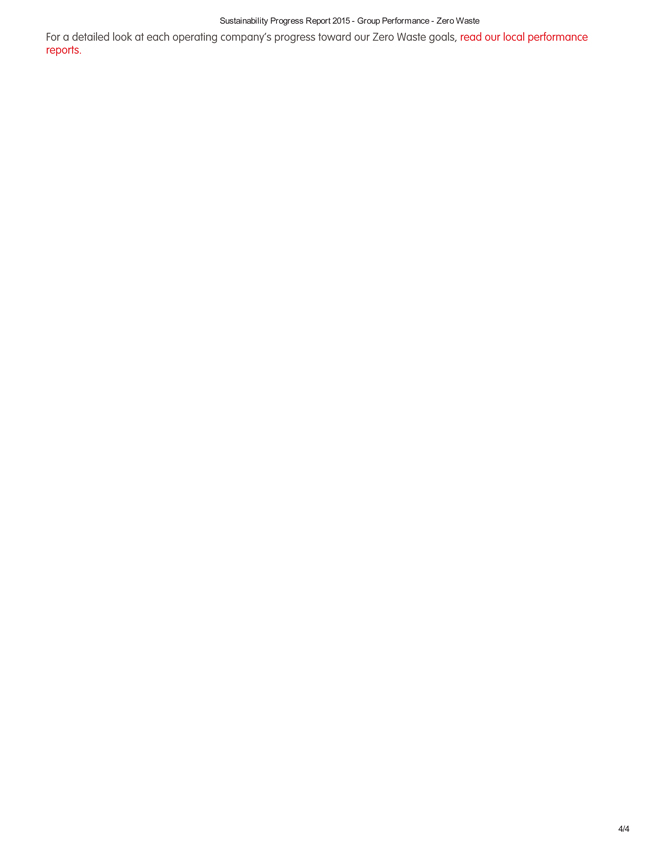
Sustainability Progress Report 2015 - Group Performance - Zero Waste
For a detailed look at each operating company’s progress toward our Zero Waste goals, read our local performance reports.
4/4
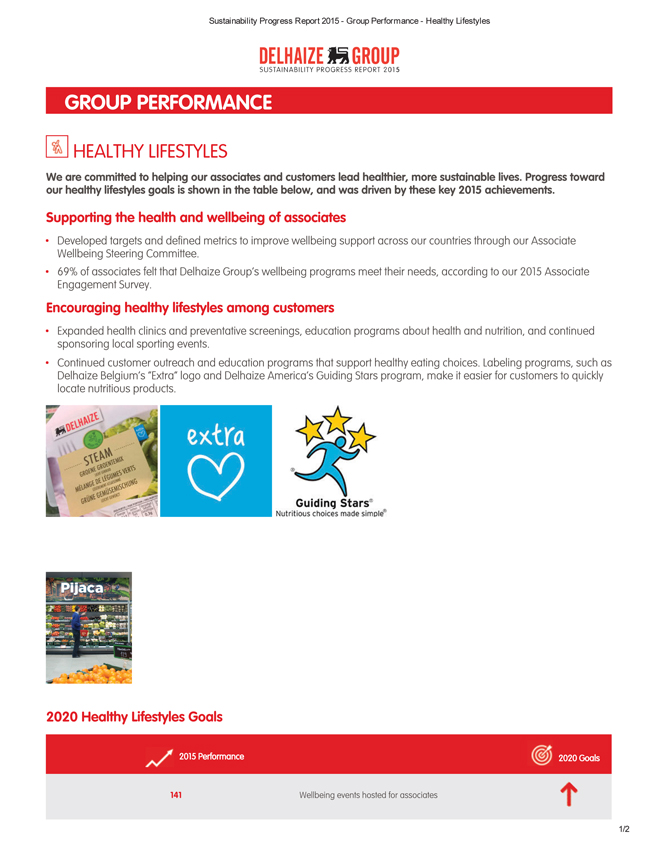
Sustainability Progress Report 2015 - Group Performance - Healthy Lifestyles
GROUP PERFORMANCE
HEALTHY LIFESTYLES
We are committed to helping our associates and customers lead healthier, more sustainable lives. Progress toward our healthy lifestyles goals is shown in the table below, and was driven by these key 2015 achievements.
Supporting the health and wellbeing of associates
Developed targets and defined metrics to improve wellbeing support across our countries through our Associate Wellbeing Steering Committee.
69% of associates felt that Delhaize Group’s wellbeing programs meet their needs, according to our 2015 Associate Engagement Survey.
Encouraging healthy lifestyles among customers
Expanded health clinics and preventative screenings, education programs about health and nutrition, and continued sponsoring local sporting events.
Continued customer outreach and education programs that support healthy eating choices. Labeling programs, such as Delhaize Belgium’s –Extra– logo and Delhaize America’s Guiding Stars program, make it easier for customers to quickly locate nutritious products.
2020 Healthy Lifestyles Goals
2015 Performance 2020 Goals
141 Wellbeing events hosted for associates
1/2
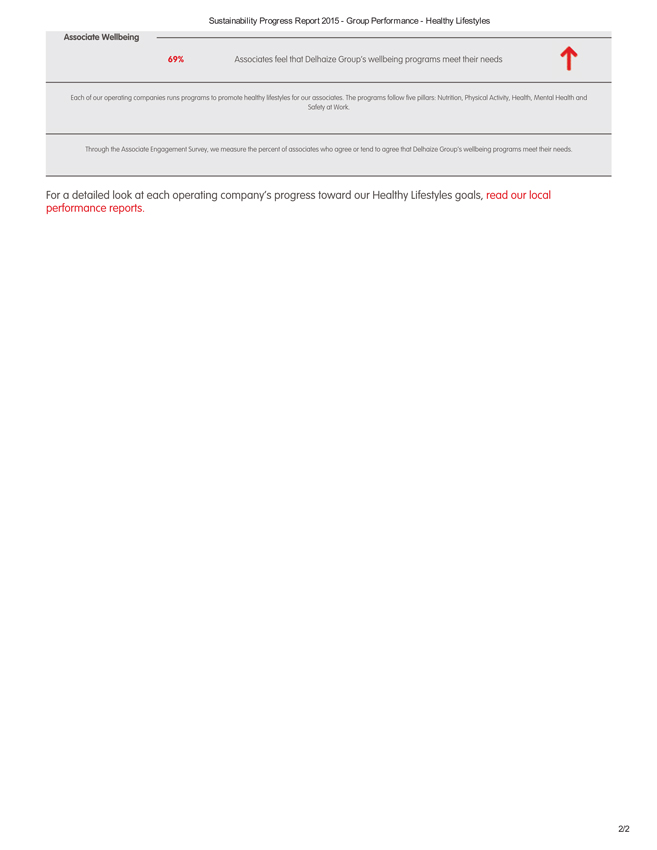
Sustainability Progress Report 2015 - Group Performance - Healthy Lifestyles
Associate Wellbeing
69% Associates feel that Delhaize Group’s wellbeing programs meet their needs
[Graphic Appears Here]
Each of our operating companies runs programs to promote healthy lifestyles for our associates. The programs follow five pillars: Nutrition, Physical Activity, Health, Mental Health and Safety at Work.
Through the Associate Engagement Survey, we measure the percent of associates who agree or tend to agree that Delhaize Group’s wellbeing programs meet their needs.
For a detailed look at each operating company’s progress toward our Healthy Lifestyles goals, read our local performance reports.
2/2
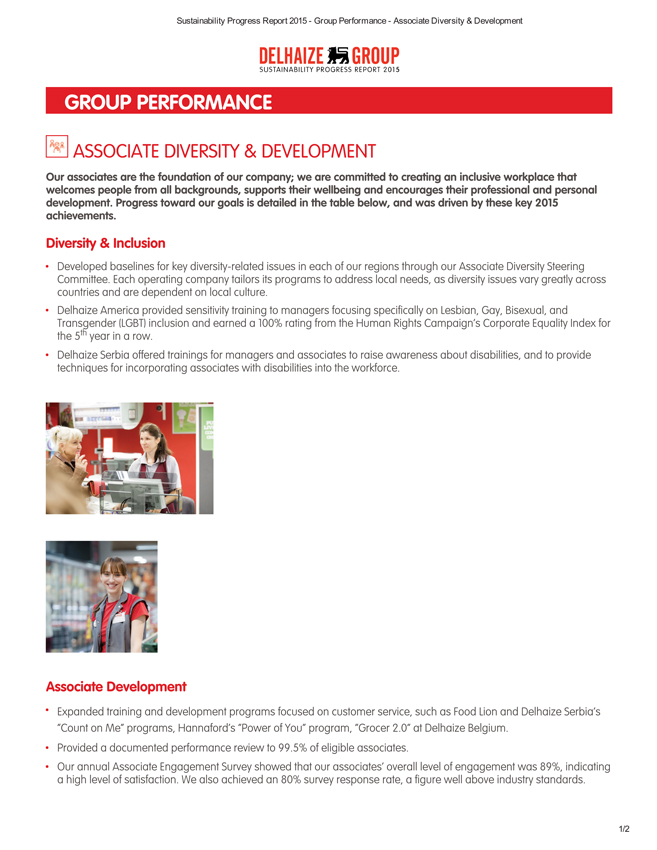
Sustainability Progress Report 2015 - Group Performance - Associate Diversity & Development
GROUP PERFORMANCE
ASSOCIATE DIVERSITY & DEVELOPMENT
Our associates are the foundation of our company; we are committed to creating an inclusive workplace that welcomes people from all backgrounds, supports their wellbeing and encourages their professional and personal development. Progress toward our goals is detailed in the table below, and was driven by these key 2015 achievements.
Diversity & Inclusion
Developed baselines for key diversity-related issues in each of our regions through our Associate Diversity Steering Committee. Each operating company tailors its programs to address local needs, as diversity issues vary greatly across countries and are dependent on local culture.
Delhaize America provided sensitivity training to managers focusing specifically on Lesbian, Gay, Bisexual, and Transgender (LGBT) inclusion and earned a 100% rating from the Human Rights Campaign’s Corporate Equality Index for the 5 year in a row. th Delhaize Serbia offered trainings for managers and associates to raise awareness about disabilities, and to provide techniques for incorporating associates with disabilities into the workforce.
Associate Development
Expanded training and development programs focused on customer service, such as Food Lion and Delhaize Serbia’s –Count on Me– programs, Hannaford’s –Power of You– program, –Grocer 2.0– at Delhaize Belgium.
Provided a documented performance review to 99.5% of eligible associates.
Our annual Associate Engagement Survey showed that our associates– overall level of engagement was 89%, indicating a high level of satisfaction. We also achieved an 80% survey response rate, a figure well above industry standards.
1/2
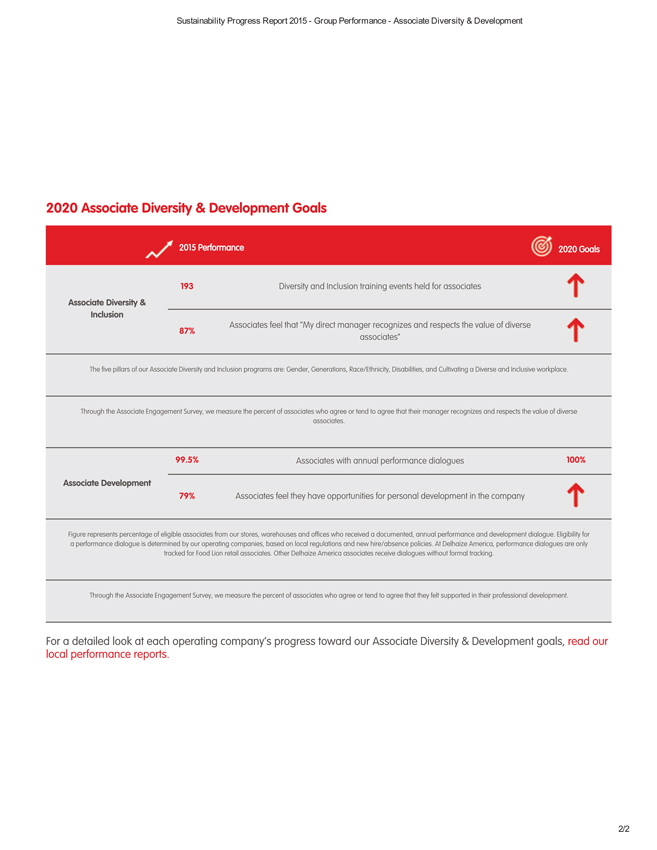
Sustainability Progress Report 2015 - Group Performance - Associate Diversity & Development
2020 Associate Diversity & Development Goals
2015 Performance
2020 Goals
193
Diversity and Inclusion training events held for associates
Associate Diversity &
Inclusion
87%
Associates feel that –My direct manager recognizes and respects the value of diverse
associates–
The five pillars of our Associate Diversity and Inclusion programs are: Gender, Generations, Race/Ethnicity, Disabilities, and Cultivating a Diverse and Inclusive workplace.
Through the Associate Engagement Survey, we measure the percent of associates who agree or tend to agree that their manager recognizes and respects the value of diverse
associates.
99.5%
Associates with annual performance dialogues
100%
Associate Development
79%
Associates feel they have opportunities for personal development in the company
Figure represents percentage of eligible associates from our stores, warehouses and offices who received a documented, annual performance and development dialogue. Eligibility for
a performance dialogue is determined by our operating companies, based on local regulations and new hire/absence policies. At Delhaize America, performance dialogues are only
tracked for Food Lion retail associates. Other Delhaize America associates receive dialogues without formal tracking.
Through the Associate Engagement Survey, we measure the percent of associates who agree or tend to agree that they felt supported in their professional development.
For a detailed look at each operating company’s progress toward our Associate Diversity & Development goals, read our local performance reports.
2/2
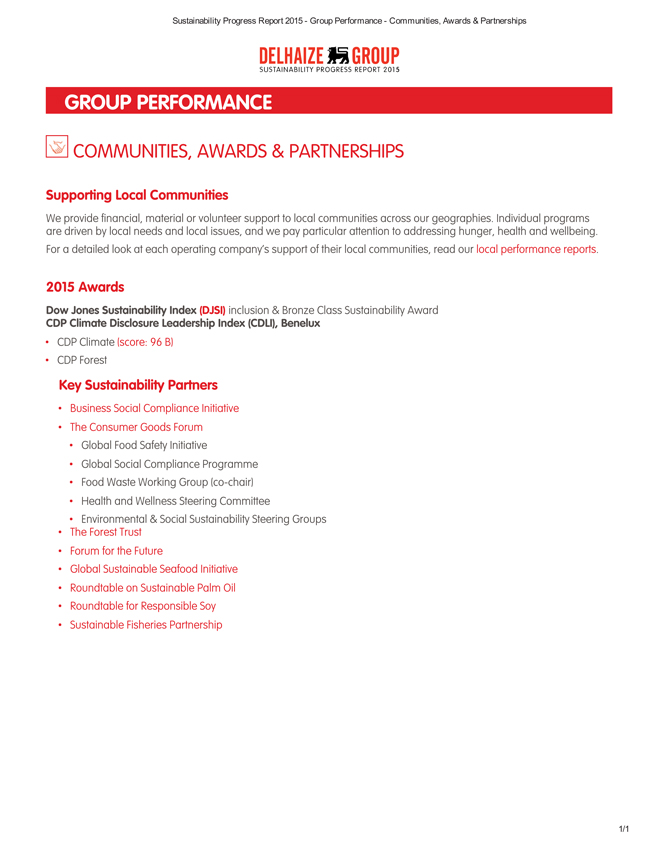
Sustainability Progress Report 2015 - Group Performance - Communities, Awards & Partnerships
GROUP PERFORMANCE
COMMUNITIES, AWARDS & PARTNERSHIPS
Supporting Local Communities
We provide financial, material or volunteer support to local communities across our geographies. Individual programs are driven by local needs and local issues, and we pay particular attention to addressing hunger, health and wellbeing. For a detailed look at each operating company’s support of their local communities, read our local performance reports.
2015 Awards
Dow Jones Sustainability Index (DJSI) inclusion & Bronze Class Sustainability Award
CDP Climate Disclosure Leadership Index (CDLI), Benelux
CDP Climate (score: 96 B) CDP Forest
Key Sustainability Partners
Business Social Compliance Initiative
The Consumer Goods Forum
Global Food Safety Initiative
Global Social Compliance Programme
Food Waste Working Group (co-chair)
Health and Wellness Steering Committee
Environmental & Social Sustainability Steering Groups
The Forest Trust
Forum for the Future
Global Sustainable Seafood Initiative
Roundtable on Sustainable Palm Oil
Roundtable for Responsible Soy
Sustainable Fisheries Partnership
1/1
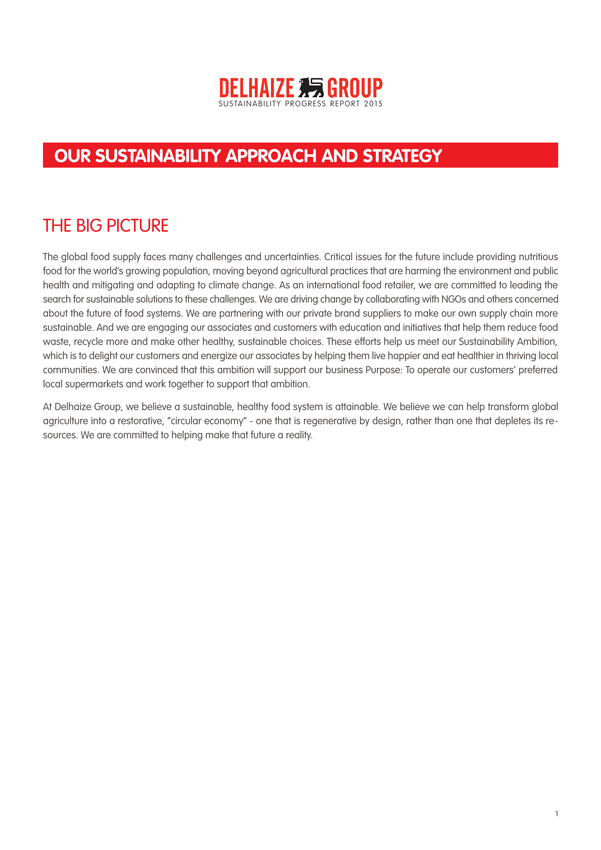
OUR SUSTAINABILITY APPROACH AND STRATEGY
THE BIG PICTURE
The global food supply faces many challenges and uncertainties. Critical issues for the future include providing nutritious food for the world’s growing population, moving beyond agricultural practices that are harming the environment and public health and mitigating and adapting to climate change. As an international food retailer, we are committed to leading the search for sustainable solutions to these challenges. We are driving change by collaborating with NGOs and others concerned about the future of food systems. We are partnering with our private brand suppliers to make our own supply chain more sustainable. And we are engaging our associates and customers with education and initiatives that help them reduce food waste, recycle more and make other healthy, sustainable choices. These efforts help us meet our Sustainability Ambition, which is to delight our customers and energize our associates by helping them live happier and eat healthier in thriving local communities. We are convinced that this ambition will support our business Purpose: To operate our customers– preferred local supermarkets and work together to support that ambition.
At Delhaize Group, we believe a sustainable, healthy food system is attainable. We believe we can help transform global agriculture into a restorative, –circular economy–—one that is regenerative by design, rather than one that depletes its resources. We are committed to helping make that future a reality.
1 |
|
SUSTAINABILITY PROGRESS REPORT 2015

OUR VALUE CHAIN
Our top priority for 2020 is to improve the sustainability and health of our private brand products at all points along our value chain. The circular shape of this diagram reflects our aim to create a more sustainable value chain with a lifecycle approach—one that builds into our products and packaging ways for them to be reused or recycled at their end of their life, rather than disposed of.
Raw Materials
Reuse & Recycling
Our Value Chain
Consumption
Retail
Raw Materials
Working with our private brand suppliers, we can influence agricultural practices at the beginning of our product value chain. Our 2020 goals related to fair working conditions and sustainable commodities (palm oil, wood fibers, and seafood) focus on improving resource efficiency and working conditions at the raw materials stage of our private brand value chain.
Processing & Packaging
We collaborate with our suppliers to improve the nutritional profile of our products and to support conservation of natural resources during their production. We also work with our suppliers to reduce product packaging and improve its reusability/recyclability.
Distribution & Transport
We work with our suppliers to increase the efficiency of the process that brings products to our warehouses and stores. We also manage the environmental impact and working conditions in our warehouses and trucking operations by focusing on fuel efficiency and health and safety programs.
Processing & Packaging
Distribution & Transport
Retail
Our ambition is to make it easy for our customers to make healthy and sustainable choices. To that end, we are improving access to information about our products– sustainability, nutrition and affordability by making it available to customers in multiple places–on packaging, on shelves, online and via QR codes, and through conversations with our in-store associates.
Consumption
We guide our customers toward more healthy and sustainable eating habits through product labeling, in-store and on-line communications, and classes that educate them about safe food handling, cooking healthy meals, appropriate portion sizes and ways to reduce food waste.
Reuse & Recycling
Our ambition is for our products and packaging to generate no waste. To achieve this we are working to make our packaging and non-food products reusable or recyclable. We also engage customers by including recycling information on packaging and providing opportunities for them to recycle materials in our stores.
2 |
|
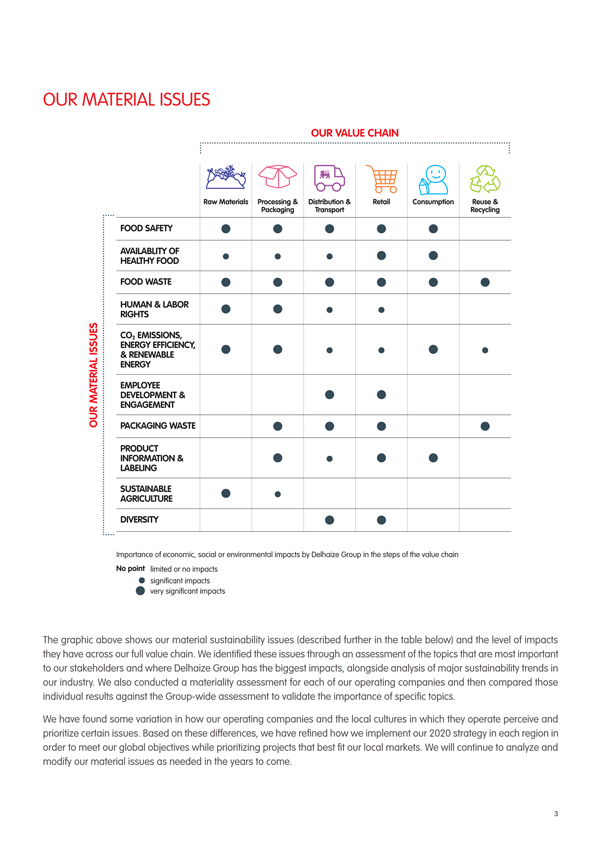
OUR MATERIAL ISSUES
OUR VALUE CHAIN
Raw Materials
Processing &
Distribution &
Retail
Consumption
Reuse &
Packaging
Transport
Recycling
FOOD SAFETY
AVAILABLITY OF HEALTHY FOOD
FOOD WASTE
HUMAN & LABOR RIGHTS
ISSUES
CO2 EMISSIONS, ENERGY EFFICIENCY, MATERIAL & RENEWABLE
ENERGY
EMPLOYEE DEVELOPMENT & OUR ENGAGEMENT
PACKAGING WASTE
PRODUCT INFORMATION & LABELING
SUSTAINABLE AGRICULTURE
DIVERSITY
Importance of economic, social or environmental impacts by Delhaize Group in the steps of the value chain
No point limited or no impacts significant impacts very significant impacts
The graphic above shows our material sustainability issues (described further in the table below) and the level of impacts they have across our full value chain. We identified these issues through an assessment of the topics that are most important to our stakeholders and where Delhaize Group has the biggest impacts, alongside analysis of major sustainability trends in our industry. We also conducted a materiality assessment for each of our operating companies and then compared those individual results against the Group-wide assessment to validate the importance of specific topics.
We have found some variation in how our operating companies and the local cultures in which they operate perceive and prioritize certain issues. Based on these differences, we have refined how we implement our 2020 strategy in each region in order to meet our global objectives while prioritizing projects that best fit our local markets. We will continue to analyze and modify our material issues as needed in the years to come.
3 |
|
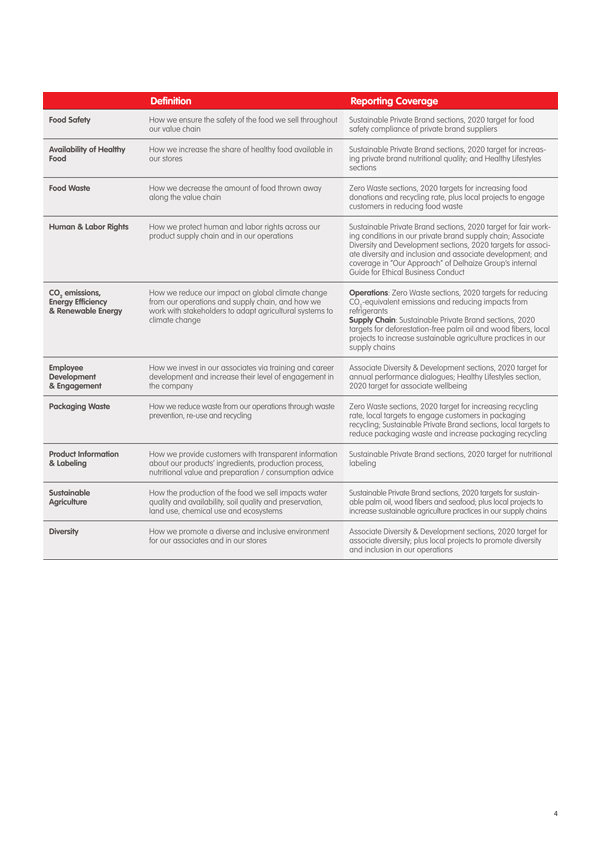
Definition
Reporting Coverage
Food Safety
How we ensure the safety of the food we sell throughout
Sustainable Private Brand sections, 2020 target for food
our value chain
safety compliance of private brand suppliers
Availability of Healthy
How we increase the share of healthy food available in
Sustainable Private Brand sections, 2020 target for increasing private brand nutritional quality; and Healthy Lifestyles
Food
our stores
sections
Food Waste
How we decrease the amount of food thrown away
Zero Waste sections, 2020 targets for increasing food
along the value chain
donations and recycling rate, plus local projects to engage
customers in reducing food waste
Human & Labor Rights
How we protect human and labor rights across our
Sustainable Private Brand sections, 2020 target for fair work-
product supply chain and in our operations
ing conditions in our private brand supply chain; Associate
Diversity and Development sections, 2020 targets for associate diversity and inclusion and associate development; and
coverage in –Our Approach– of Delhaize Group’s internal
Guide for Ethical Business Conduct
CO emissions,
How we reduce our impact on global climate change
Operations: Zero Waste sections, 2020 targets for reducing
2 |
|
Energy Efficiency
from our operations and supply chain, and how we
CO -equivalent emissions and reducing impacts from
2 |
|
& Renewable Energy
work with stakeholders to adapt agricultural systems to
refrigerants
climate change
Supply Chain: Sustainable Private Brand sections, 2020
targets for deforestation-free palm oil and wood fibers, local
projects to increase sustainable agriculture practices in our
supply chains
Employee
How we invest in our associates via training and career
Associate Diversity & Development sections, 2020 target for
Development
development and increase their level of engagement in
annual performance dialogues; Healthy Lifestyles section,
& Engagement
the company
2020 target for associate wellbeing
Packaging Waste
How we reduce waste from our operations through waste
Zero Waste sections, 2020 target for increasing recycling
prevention, re-use and recycling
rate, local targets to engage customers in packaging
recycling; Sustainable Private Brand sections, local targets to
reduce packaging waste and increase packaging recycling
Product Information
How we provide customers with transparent information
Sustainable Private Brand sections, 2020 target for nutritional
& Labeling
about our products– ingredients, production process,
labeling
nutritional value and preparation / consumption advice
Sustainable
How the production of the food we sell impacts water
Sustainable Private Brand sections, 2020 targets for sustain-
Agriculture
quality and availability, soil quality and preservation,
able palm oil, wood –bers and seafood; plus local projects to
land use, chemical use and ecosystems
increase sustainable agriculture practices in our supply chains
Diversity
How we promote a diverse and inclusive environment
Associate Diversity & Development sections, 2020 target for
for our associates and in our stores
associate diversity; plus local projects to promote diversity
and inclusion in our operations
4 |
|
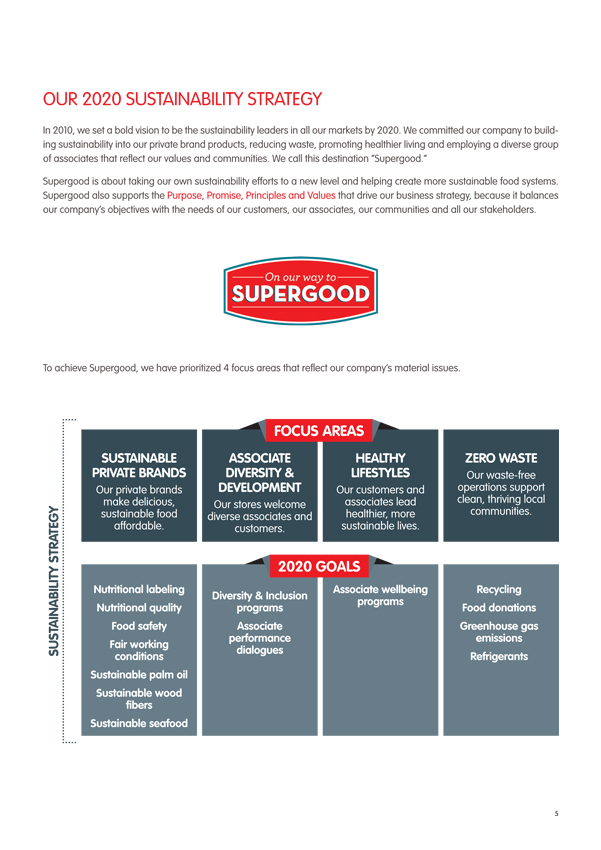
OUR 2020 SUSTAINABILITY STRATEGY
In 2010, we set a bold vision to be the sustainability leaders in all our markets by 2020. We committed our company to building sustainability into our private brand products, reducing waste, promoting healthier living and employing a diverse group of associates that reflect our values and communities. We call this destination ‘supergood.–
Supergood is about taking our own sustainability efforts to a new level and helping create more sustainable food systems. Supergood also supports the Purpose, Promise, Principles and Values that drive our business strategy, because it balances our company’s objectives with the needs of our customers, our associates, our communities and all our stakeholders.
To achieve Supergood, we have prioritized 4 focus areas that reflect our company’s material issues.
SUSTAINABLE
PRIVATE BRANDS
Our private brands
make delicious,
sustainable food
affordable.
Nutritional labeling
Nutritional quality
Food safety
SUSTAINABILITY STRATEGY Fair working
conditions
Sustainable palm oil
Sustainable wood
–bers
Sustainable seafood
FOCUS AREAS
ASSOCIATE
HEALTHY
ZERO WASTE
DIVERSITY &
LIFESTYLES
Our waste-free
DEVELOPMENT
Our customers and
operations support
Our stores welcome
associates lead
clean, thriving local
diverse associates and
healthier, more
communities.
customers.
sustainable lives.
2020 GOALS
Associate wellbeing
Recycling
Diversity & Inclusion
programs
programs
Food donations
Associate
Greenhouse gas
performance
emissions
dialogues
Refrigerants
5
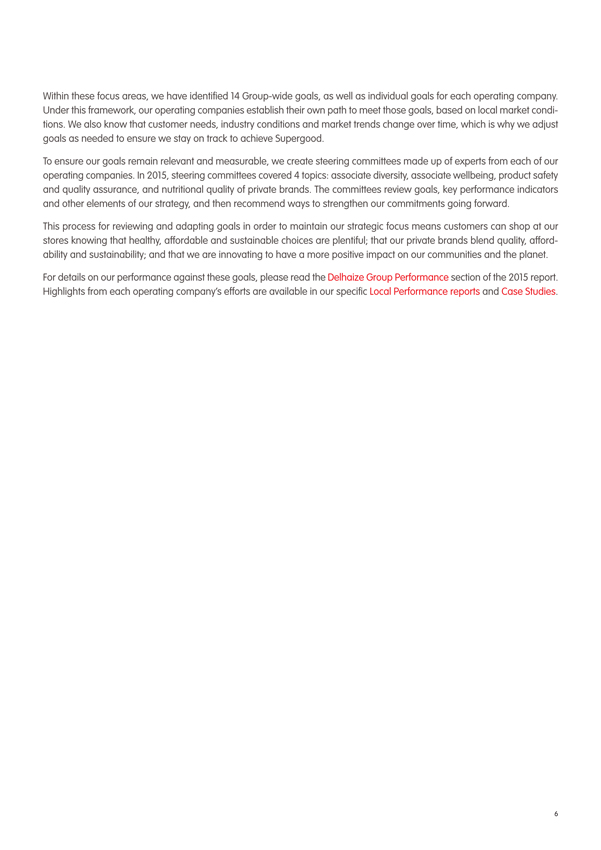
Within these focus areas, we have identified 14 Group-wide goals, as well as individual goals for each operating company. Under this framework, our operating companies establish their own path to meet those goals, based on local market conditions. We also know that customer needs, industry conditions and market trends change over time, which is why we adjust goals as needed to ensure we stay on track to achieve Supergood.
To ensure our goals remain relevant and measurable, we create steering committees made up of experts from each of our operating companies. In 2015, steering committees covered 4 topics: associate diversity, associate wellbeing, product safety and quality assurance, and nutritional quality of private brands. The committees review goals, key performance indicators and other elements of our strategy, and then recommend ways to strengthen our commitments going forward.
This process for reviewing and adapting goals in order to maintain our strategic focus means customers can shop at our stores knowing that healthy, affordable and sustainable choices are plentiful; that our private brands blend quality, affordability and sustainability; and that we are innovating to have a more positive impact on our communities and the planet.
For details on our performance against these goals, please read the Delhaize Group Performance section of the 2015 report. Highlights from each operating company’s efforts are available in our specific Local Performance reports and Case Studies.
6
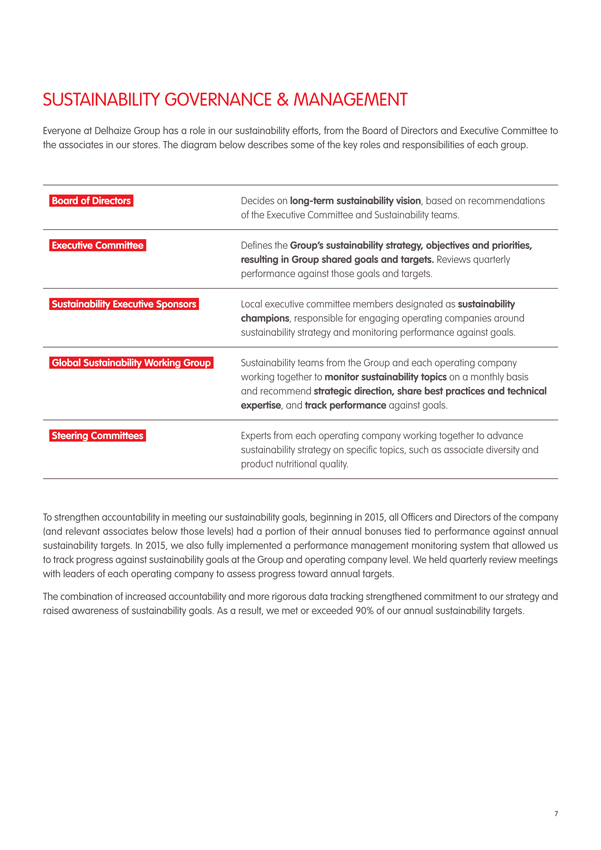
SUSTAINABILITY GOVERNANCE & MANAGEMENT
Everyone at Delhaize Group has a role in our sustainability efforts, from the Board of Directors and Executive Committee to the associates in our stores. The diagram below describes some of the key roles and responsibilities of each group.
Board of Directors
Decides on long-term sustainability vision, based on recommendations
of the Executive Committee and Sustainability teams.
Executive Committee
Defines the Group’s sustainability strategy, objectives and priorities,
resulting in Group shared goals and targets. Reviews quarterly
performance against those goals and targets.
Sustainability Executive Sponsors
Local executive committee members designated as sustainability
champions, responsible for engaging operating companies around
sustainability strategy and monitoring performance against goals.
Global Sustainability Working Group
Sustainability teams from the Group and each operating company
working together to monitor sustainability topics on a monthly basis
and recommend strategic direction, share best practices and technical
expertise, and track performance against goals.
Steering Committees
Experts from each operating company working together to advance
sustainability strategy on specific topics, such as associate diversity and
product nutritional quality.
To strengthen accountability in meeting our sustainability goals, beginning in 2015, all Officers and Directors of the company (and relevant associates below those levels) had a portion of their annual bonuses tied to performance against annual sustainability targets. In 2015, we also fully implemented a performance management monitoring system that allowed us to track progress against sustainability goals at the Group and operating company level. We held quarterly review meetings with leaders of each operating company to assess progress toward annual targets.
The combination of increased accountability and more rigorous data tracking strengthened commitment to our strategy and raised awareness of sustainability goals. As a result, we met or exceeded 90% of our annual sustainability targets.
7
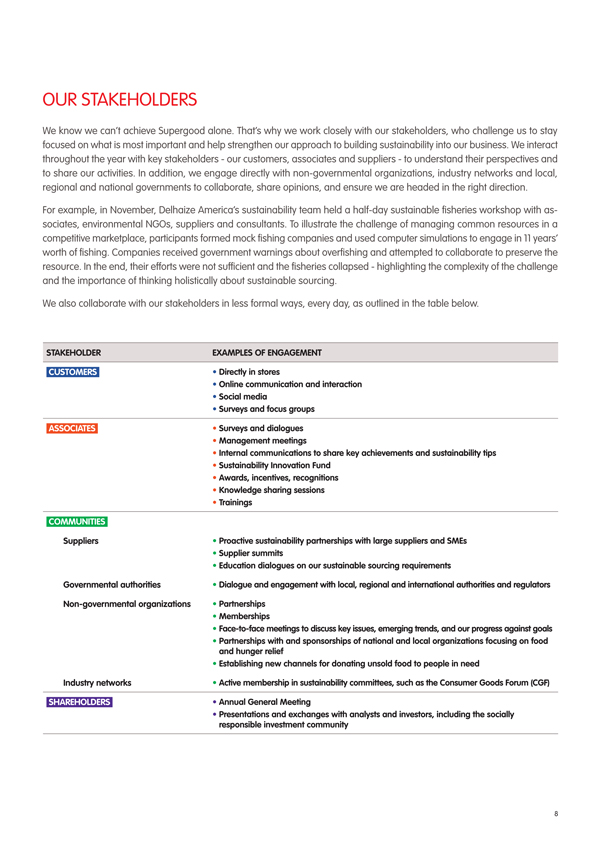
OUR STAKEHOLDERS
We know we can’t achieve Supergood alone. That’s why we work closely with our stakeholders, who challenge us to stay focused on what is most important and help strengthen our approach to building sustainability into our business. We interact throughout the year with key stakeholders - our customers, associates and suppliers - to understand their perspectives and to share our activities. In addition, we engage directly with non-governmental organizations, industry networks and local, regional and national governments to collaborate, share opinions, and ensure we are headed in the right direction.
For example, in November, Delhaize America’s sustainability team held a half-day sustainable fisheries workshop with associates, environmental NGOs, suppliers and consultants. To illustrate the challenge of managing common resources in a competitive marketplace, participants formed mock fishing companies and used computer simulations to engage in 11 years– worth of fishing. Companies received government warnings about overfishing and attempted to collaborate to preserve the resource. In the end, their efforts were not sufficient and the fisheries collapsed - highlighting the complexity of the challenge and the importance of thinking holistically about sustainable sourcing.
We also collaborate with our stakeholders in less formal ways, every day, as outlined in the table below.
STAKEHOLDER
EXAMPLES OF ENGAGEMENT
CUSTOMERS
Directly in stores
Online communication and interaction
Social media
Surveys and focus groups
ASSOCIATES
Surveys and dialogues
Management meetings
Internal communications to share key achievements and sustainability tips
Sustainability Innovation Fund
Awards, incentives, recognitions
Knowledge sharing sessions
Trainings
COMMUNITIES
Suppliers
Proactive sustainability partnerships with large suppliers and SMEs
Supplier summits
Education dialogues on our sustainable sourcing requirements
Governmental authorities
Dialogue and engagement with local, regional and international authorities and regulators
Non governmental organizations
Partnerships
Memberships
Face-to-face meetings to discuss key issues, emerging trends, and our progress against goals
Partnerships with and sponsorships of national and local organizations focusing on food
and hunger relief
Establishing new channels for donating unsold food to people in need
Industry networks
Active membership in sustainability committees, such as the Consumer Goods Forum (CGF)
SHAREHOLDERS
Annual General Meeting
Presentations and exchanges with analysts and investors, including the socially
responsible investment community
8
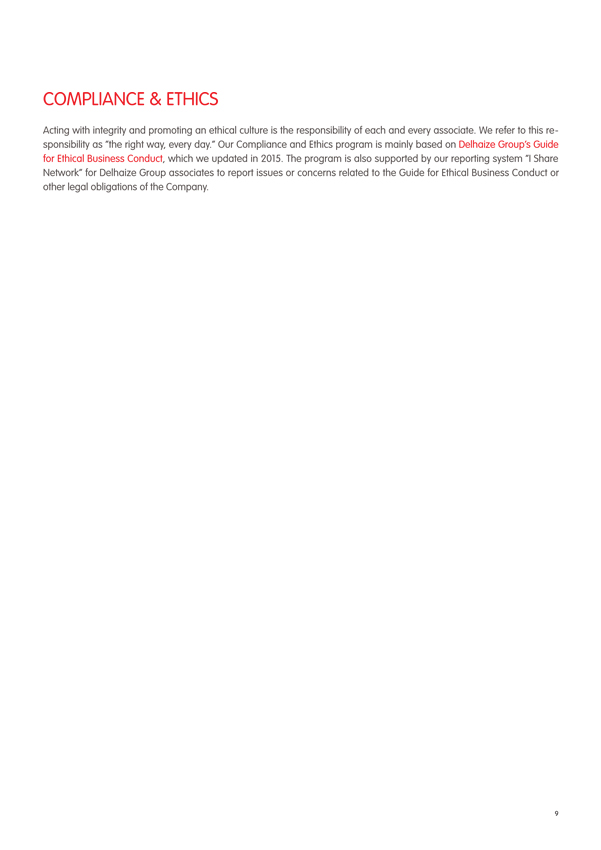
COMPLIANCE & ETHICS
Acting with integrity and promoting an ethical culture is the responsibility of each and every associate. We refer to this responsibility as “the right way, every day.” Our Compliance and Ethics program is mainly based on Delhaize Group’s Guide for Ethical Business Conduct, which we updated in 2015. The program is also supported by our reporting system “I Share Network” for Delhaize Group associates to report issues or concerns related to the Guide for Ethical Business Conduct or other legal obligations of the Company.
9
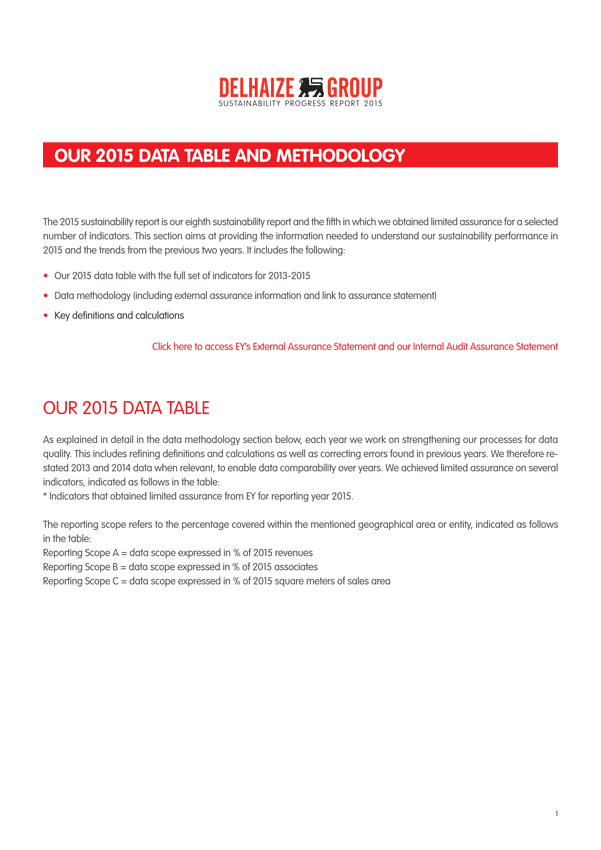
[Graphic Appears Here]
[Graphic Appears Here]
SUSTAINABILITY PROGRESS REPORT 2015
OUR 2015 DATA TABLE AND METHODOLOGY
The 2015 sustainability report is our eighth sustainability report and the fifth in which we obtained limited assurance for a selected number of indicators. This section aims at providing the information needed to understand our sustainability performance in 2015 and the trends from the previous two years. It includes the following:
Our 2015 data table with the full set of indicators for 2013-2015
Data methodology (including external assurance information and link to assurance statement)
Key definitions and calculations
Click here to access EY’s External Assurance Statement and our Internal Audit Assurance Statement
OUR 2015 DATA TABLE
As explained in detail in the data methodology section below, each year we work on strengthening our processes for data quality. This includes refining definitions and calculations as well as correcting errors found in previous years. We therefore restated 2013 and 2014 data when relevant, to enable data comparability over years. We achieved limited assurance on several indicators, indicated as follows in the table: * Indicators that obtained limited assurance from EY for reporting year 2015.
The reporting scope refers to the percentage covered within the mentioned geographical area or entity, indicated as follows in the table: Reporting Scope A = data scope expressed in % of 2015 revenues Reporting Scope B = data scope expressed in % of 2015 associates Reporting Scope C = data scope expressed in % of 2015 square meters of sales area
1
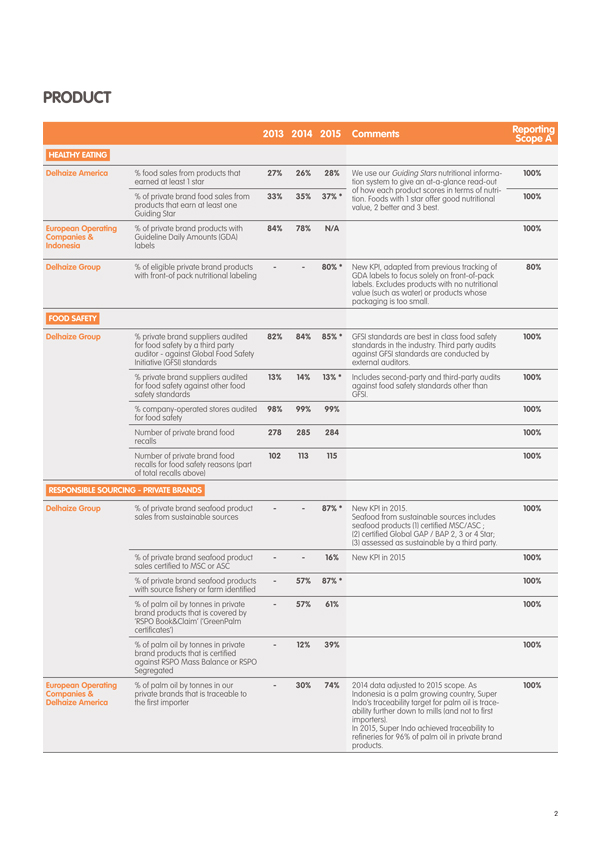
PRODUCT
2013 2014 2015 Comments Reporting
Scope A
HEALTHY EATING
Delhaize America % food sales from products that 27% 26% 28% We use our Guiding Stars nutritional informa- 100%
earned at least 1 star tion system to give an at-a-glance read-out
of how each product scores in terms of nutri-
% of private brand food sales from 33% 35% 37% * tion. Foods with 1 star offer good nutritional 100%
products that earn at least one value, 2 better and 3 best.
Guiding Star
European Operating % of private brand products with 84% 78% N/A 100%
Companies & Guideline Daily Amounts (GDA)
Indonesia labels
Delhaize Group % of eligible private brand products —— 80% * New KPI, adapted from previous tracking of 80%
with front-of pack nutritional labeling GDA labels to focus solely on front-of-pack
labels. Excludes products with no nutritional
value (such as water) or products whose
packaging is too small.
FOOD SAFETY
Delhaize Group % private brand suppliers audited 82% 84% 85% * GFSI standards are best in class food safety 100%
for food safety by a third party standards in the industry. Third party audits
auditor—against Global Food Safety against GFSI standards are conducted by
Initiative (GFSI) standards external auditors.
% private brand suppliers audited 13% 14% 13% * Includes second-party and third-party audits 100%
for food safety against other food against food safety standards other than
safety standards GFSI.
% company-operated stores audited 98% 99% 99% 100%
for food safety
Number of private brand food 278 285 284 100%
recalls
Number of private brand food 102 113 115 100%
recalls for food safety reasons (part
of total recalls above)
RESPONSIBLE SOURCING—PRIVATE BRANDS
Delhaize Group % of private brand seafood product —— 87% * New KPI in 2015. 100%
sales from sustainable sources Seafood from sustainable sources includes
seafood products (1) certified MSC/ASC ;
(2) certified Global GAP / BAP 2, 3 or 4 Star;
(3) assessed as sustainable by a third party.
% of private brand seafood product —— 16% New KPI in 2015 100%
sales certified to MSC or ASC
% of private brand seafood products — 57% 87% * 100%
with source ‘shery or farm identi–ed
% of palm oil by tonnes in private — 57% 61% 100%
brand products that is covered by
–RSPO Book&Claim– (–GreenPalm
certificates–)
% of palm oil by tonnes in private — 12% 39% 100%
brand products that is certified
against RSPO Mass Balance or RSPO
Segregated
European Operating % of palm oil by tonnes in our — 30% 74% 2014 data adjusted to 2015 scope. As 100%
Companies & private brands that is traceable to Indonesia is a palm growing country, Super
Delhaize America the –rst importer Indo’s traceability target for palm oil is trace-
ability further down to mills (and not to first
importers).
In 2015, Super Indo achieved traceability to
refineries for 96% of palm oil in private brand
products.
2
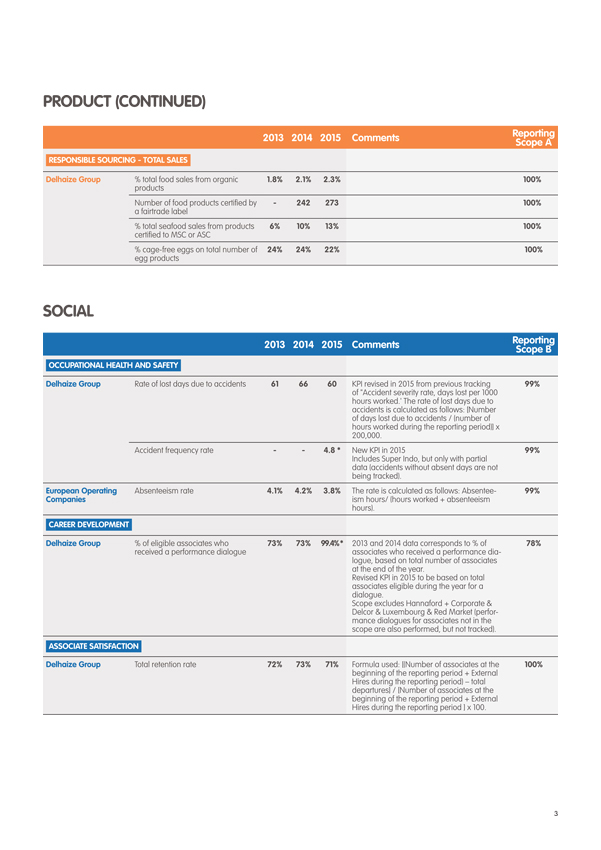
PRODUCT (CONTINUED)
2013 2014 2015 Comments Reporting
Scope A
RESPONSIBLE SOURCING—TOTAL SALES
Delhaize Group % total food sales from organic 1.8% 2.1% 2.3% 100%
products
Number of food products certified by — 242 273 100%
a fair trade label
% total seafood sales from products 6% 10% 13% 100%
certified to MSC or ASC
% cage-free eggs on total number of 24% 24% 22% 100%
egg products
SOCIAL
2013 2014 2015 Comments Reporting
Scope B
OCCUPATIONAL HEALTH AND SAFETY
Delhaize Group Rate of lost days due to accidents 61 66 60 KPI revised in 2015 from previous tracking 99%
of “Accident severity rate, days lost per 1000
hours worked.’ The rate of lost days due to
accidents is calculated as follows: [Number
of days lost due to accidents / (number of
hours worked during the reporting period)] x
200,000.
Accident frequency rate —— 4.8 * New KPI in 2015 99%
Includes Super Indo, but only with partial
data (accidents without absent days are not
being tracked).
European Operating Absenteeism rate 4.1% 4.2% 3.8% The rate is calculated as follows: Absentee- 99%
Companies ism hours/ (hours worked + absenteeism
hours).
CAREER DEVELOPMENT
Delhaize Group % of eligible associates who 73% 73% 99.4% * 2013 and 2014 data corresponds to % of 78%
received a performance dialogue associates who received a performance dia-
logue, based on total number of associates
at the end of the year.
Revised KPI in 2015 to be based on total
associates eligible during the year for a
dialogue.
Scope excludes Hannaford + Corporate &
Delcor & Luxembourg & Red Market (perfor-
mance dialogues for associates not in the
scope are also performed, but not tracked).
ASSOCIATE SATISFACTION
Delhaize Group Total retention rate 72% 73% 71% Formula used: [(Number of associates at the 100%
beginning of the reporting period + External
Hires during the reporting period) – total
departures] / [Number of associates at the
beginning of the reporting period + External
Hires during the reporting period ] x 100.
3
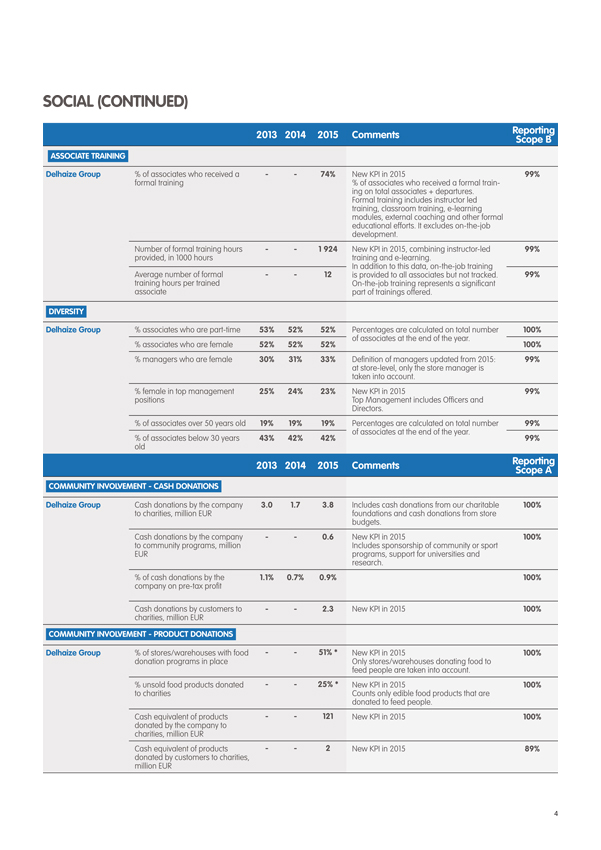
SOCIAL (CONTINUED)
2013 2014 2015 Comments Reporting
Scope B
ASSOCIATE TRAINING
Delhaize Group % of associates who received a —— 74% New KPI in 2015 99%
formal training % of associates who received a formal train-
ing on total associates + departures.
Formal training includes instructor led
training, classroom training, e-learning
modules, external coaching and other formal
educational efforts. It excludes on-the-job
development.
Number of formal training hours —— 1 924 New KPI in 2015, combining instructor-led 99%
provided, in 1000 hours training and e-learning.
In addition to this data, on-the-job training
Average number of formal —— 12 is provided to all associates but not tracked. 99%
training hours per trained On-the-job training represents a significant
associate part of trainings offered.
DIVERSITY
Delhaize Group % associates who are part-time 53% 52% 52% Percentages are calculated on total number 100%
of associates at the end of the year.
% associates who are female 52% 52% 52% 100%
% managers who are female 30% 31% 33% Definition of managers updated from 2015: 99%
at store-level, only the store manager is
taken into account.
% female in top management 25% 24% 23% New KPI in 2015 99%
positions Top Management includes Officers and
Directors.
% of associates over 50 years old 19% 19% 19% Percentages are calculated on total number 99%
of associates at the end of the year.
% of associates below 30 years 43% 42% 42% 99%
old
2013 2014 2015 Comments Reporting
Scope A
COMMUNITY INVOLVEMENT—CASH DONATIONS
Delhaize Group Cash donations by the company 3.0 1.7 3.8 Includes cash donations from our charitable 100%
to charities, million EUR foundations and cash donations from store
budgets.
Cash donations by the company —— 0.6 New KPI in 2015 100%
to community programs, million Includes sponsorship of community or sport
EUR programs, support for universities and
research.
% of cash donations by the 1.1% 0.7% 0.9% 100%
company on pre-tax profit
Cash donations by customers to —— 2.3 New KPI in 2015 100%
charities, million EUR
COMMUNITY INVOLVEMENT—PRODUCT DONATIONS
Delhaize Group % of stores/warehouses with food —— 51% * New KPI in 2015 100%
donation programs in place Only stores/warehouses donating food to
feed people are taken into account.
% unsold food products donated —— 25% * New KPI in 2015 100%
to charities Counts only edible food products that are
donated to feed people.
Cash equivalent of products —— 121 New KPI in 2015 100%
donated by the company to
charities, million EUR
Cash equivalent of products —— 2 New KPI in 2015 89%
donated by customers to charities,
million EUR
4 |
|
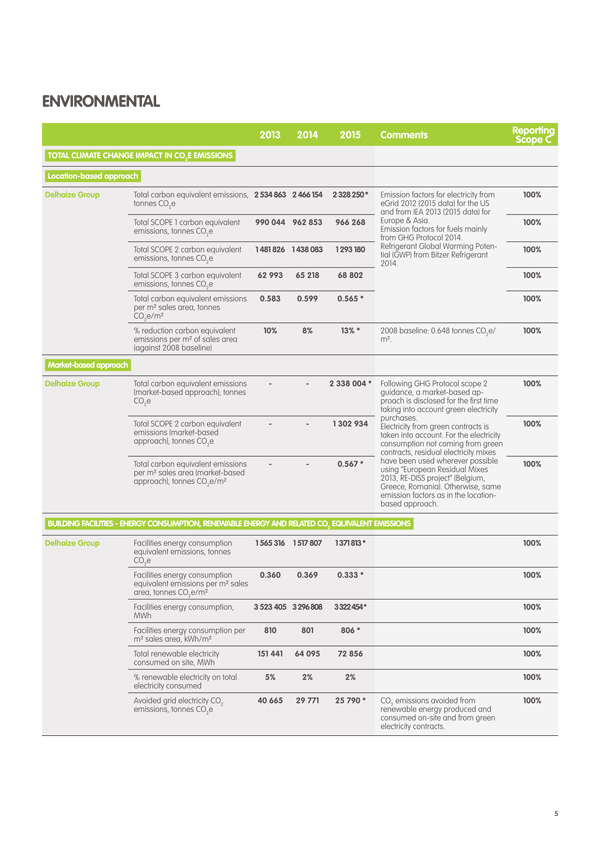
ENVIRONMENTAL
2013 2014 2015 Comments Reporting
Scope C
TOTAL CLIMATE CHANGE IMPACT IN CO E EMISSIONS
2
Location-based approach
Delhaize Group Total carbon equivalent emissions, 2 534 863 2 466 154 2 328 250 * Emission factors for electricity from 100%
tonnes CO e eGrid 2012 (2015 data) for the US
2
and from IEA 2013 (2015 data) for
Total SCOPE 1 carbon equivalent 990 044 962 853 966 268 Europe & Asia. 100%
emissions, tonnes CO e Emission factors for fuels mainly
2 from GHG Protocol 2014.
Total SCOPE 2 carbon equivalent 1 481 826 1 438 083 1 293 180 Refrigerant Global Warming Poten- 100%
emissions, tonnes CO e tial (GWP) from Bitzer Refrigerant
2 2014.
Total SCOPE 3 carbon equivalent 62 993 65 218 68 802 100%
emissions, tonnes CO e
2
Total carbon equivalent emissions 0.583 0.599 0.565 * 100%
per m² sales area, tonnes
CO2 e/m²
% reduction carbon equivalent 10% 8% 13% * 2008 baseline: 0.648 tonnes CO e/ 100%
2
emissions per m² of sales area m².
(against 2008 baseline)
Market-based approach
Delhaize Group Total carbon equivalent emissions —— 2 338 004 * Following GHG Protocol scope 2 100%
(market-based approach), tonnes guidance, a market-based ap-
CO e proach is disclosed for the first time
2
taking into account green electricity
purchases.
Total SCOPE 2 carbon equivalent —— 1 302 934 Electricity from green contracts is 100%
emissions (market-based taken into account. For the electricity
approach), tonnes CO2 e consumption not coming from green
contracts, residual electricity mixes
Total carbon equivalent emissions —— 0.567 * have been used wherever possible 100%
per m² sales area (market-based using –European Residual Mixes
approach), tonnes CO e/m² 2013, RE-DISS project– (Belgium,
2 Greece, Romania). Otherwise, same
emission factors as in the location-
based approach.
BUILDING FACILITIES—ENERGY CONSUMPTION, RENEWABLE ENERGY AND RELATED CO EQUIVALENT EMISSIONS
2
Delhaize Group Facilities energy consumption 1 565 316 1 517 807 1 371 813 * 100%
equivalent emissions, tonnes
CO2 e
Facilities energy consumption 0.360 0.369 0.333 * 100%
equivalent emissions per m² sales
area, tonnes CO e/m²
2
Facilities energy consumption, 3 523 405 3 296 808 3 322 454 * 100%
MWh
Facilities energy consumption per 810 801 806 * 100%
m² sales area, kWh/m²
Total renewable electricity 151 441 64 095 72 856 100%
consumed on site, MWh
% renewable electricity on total 5% 2% 2% 100%
electricity consumed
Avoided grid electricity CO 40 665 29 771 25 790 * CO emissions avoided from 100%
2 2
emissions, tonnes CO e renewable energy produced and
2
consumed on-site and from green
electricity contracts.
5
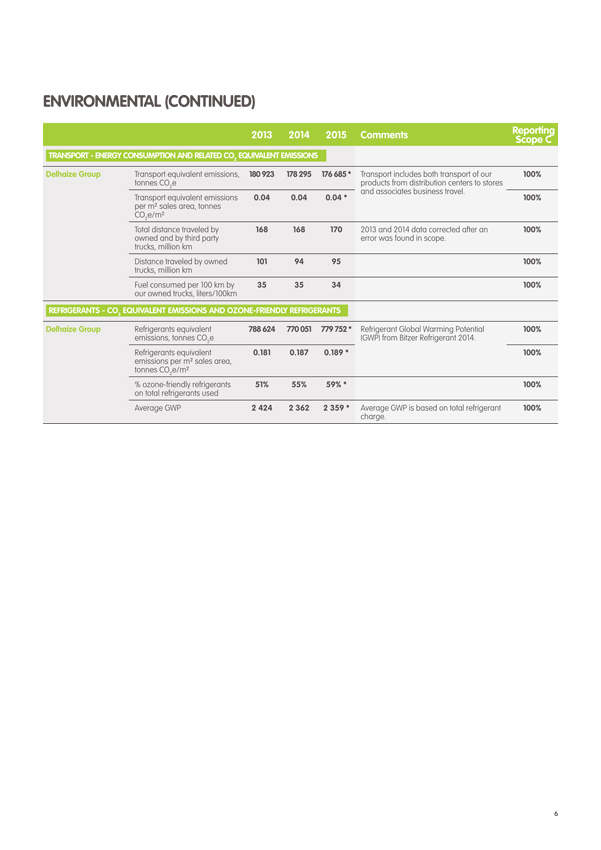
ENVIRONMENTAL (CONTINUED)
2013 2014 2015 Comments Reporting
Scope C
TRANSPORT—ENERGY CONSUMPTION AND RELATED CO EQUIVALENT EMISSIONS
2
Delhaize Group Transport equivalent emissions, 180 923 178 295 176 685 * Transport includes both transport of our 100%
tonnes CO e products from distribution centers to stores
2
and associates business travel.
Transport equivalent emissions 0.04 0.04 0.04 * 100%
per m² sales area, tonnes
CO2 e/m²
Total distance traveled by 168 168 170 2013 and 2014 data corrected after an 100%
owned and by third party error was found in scope.
trucks, million km
Distance traveled by owned 101 94 95 100%
trucks, million km
Fuel consumed per 100 km by 35 35 34 100%
our owned trucks, liters/100km
REFRIGERANTS—CO EQUIVALENT EMISSIONS AND OZONE-FRIENDLY REFRIGERANTS
2
Delhaize Group Refrigerants equivalent 788 624 770 051 779 752 * Refrigerant Global Warming Potential 100%
emissions, tonnes CO e (GWP) from Bitzer Refrigerant 2014.
2
Refrigerants equivalent 0.181 0.187 0.189 * 100%
emissions per m² sales area,
tonnes CO e/m²
2
% ozone-friendly refrigerants 51% 55% 59% * 100%
on total refrigerants used
Average GWP 2 424 2 362 2 359 * Average GWP is based on total refrigerant 100%
charge.
6
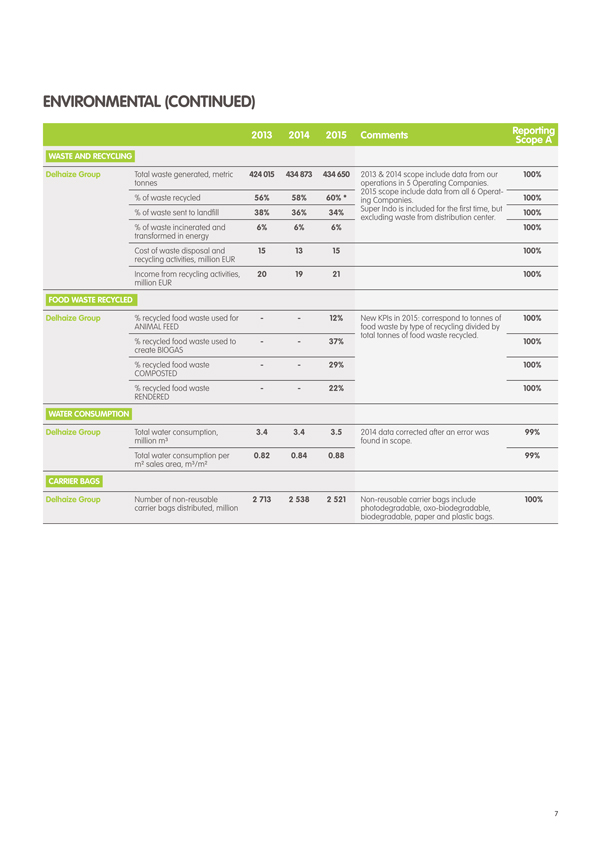
ENVIRONMENTAL (CONTINUED)
2013 2014 2015 Comments Reporting
Scope A
WASTE AND RECYCLING
Delhaize Group Total waste generated, metric 424 015 434 873 434 650 2013 & 2014 scope include data from our 100%
tonnes operations in 5 Operating Companies.
2015 scope include data from all 6 Operat-
% of waste recycled 56% 58% 60% * ing Companies. 100%
Super Indo is included for the first time, but
% of waste sent to landfill 38% 36% 34% 100%
excluding waste from distribution center.
% of waste incinerated and 6% 6% 6% 100%
transformed in energy
Cost of waste disposal and 15 13 15 100%
recycling activities, million EUR
Income from recycling activities, 20 19 21 100%
million EUR
FOOD WASTE RECYCLED
Delhaize Group % recycled food waste used for —— 12% New KPIs in 2015: correspond to tonnes of 100%
ANIMAL FEED food waste by type of recycling divided by
total tonnes of food waste recycled.
% recycled food waste used to —— 37% 100%
create BIOGAS
% recycled food waste —— 29% 100%
COMPOSTED
% recycled food waste —— 22% 100%
RENDERED
WATER CONSUMPTION
Delhaize Group Total water consumption, 3.4 3.4 3.5 2014 data corrected after an error was 99%
million m³ found in scope.
Total water consumption per 0.82 0.84 0.88 99%
m² sales area, m³/m²
CARRIER BAGS
Delhaize Group Number of non-reusable 2 713 2 538 2 521 Non-reusable carrier bags include 100%
carrier bags distributed, million photodegradable, oxo-biodegradable,
biodegradable, paper and plastic bags.
7
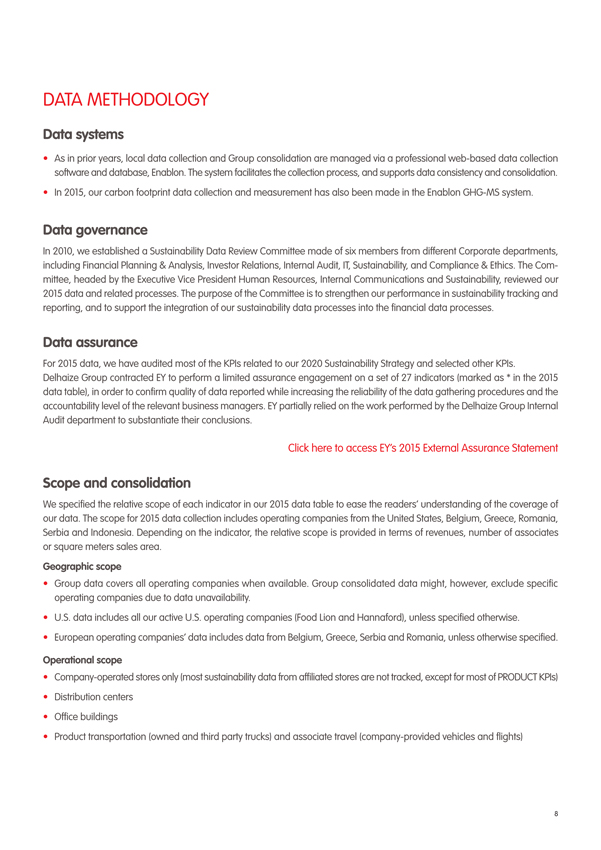
DATA METHODOLOGY
Data systems
As in prior years, local data collection and Group consolidation are managed via a professional web-based data collection software and database, Enablon. The system facilitates the collection process, and supports data consistency and consolidation.
In 2015, our carbon footprint data collection and measurement has also been made in the Enablon GHG-MS system.
Data governance
In 2010, we established a Sustainability Data Review Committee made of six members from different Corporate departments, including Financial Planning & Analysis, Investor Relations, Internal Audit, IT, Sustainability, and Compliance & Ethics. The Committee, headed by the Executive Vice President Human Resources, Internal Communications and Sustainability, reviewed our 2015 data and related processes. The purpose of the Committee is to strengthen our performance in sustainability tracking and reporting, and to support the integration of our sustainability data processes into the financial data processes.
Data assurance
For 2015 data, we have audited most of the KPIs related to our 2020 Sustainability Strategy and selected other KPIs.
Delhaize Group contracted EY to perform a limited assurance engagement on a set of 27 indicators (marked as * in the 2015 data table), in order to confirm quality of data reported while increasing the reliability of the data gathering procedures and the accountability level of the relevant business managers. EY partially relied on the work performed by the Delhaize Group Internal Audit department to substantiate their conclusions.
Click here to access EY’s 2015 External Assurance Statement
Scope and consolidation
We specified the relative scope of each indicator in our 2015 data table to ease the readers– understanding of the coverage of our data. The scope for 2015 data collection includes operating companies from the United States, Belgium, Greece, Romania, Serbia and Indonesia. Depending on the indicator, the relative scope is provided in terms of revenues, number of associates or square meters sales area.
Geographic scope
Group data covers all operating companies when available. Group consolidated data might, however, exclude specific operating companies due to data unavailability.
U.S. data includes all our active U.S. operating companies (Food Lion and Hannaford), unless specified otherwise.
European operating companies– data includes data from Belgium, Greece, Serbia and Romania, unless otherwise specified.
Operational scope
Company-operated stores only (most sustainability data from affiliated stores are not tracked, except for most of PRODUCT KPIs)
Distribution centers
Office buildings
Product transportation (owned and third party trucks) and associate travel (company-provided vehicles and flights)
8
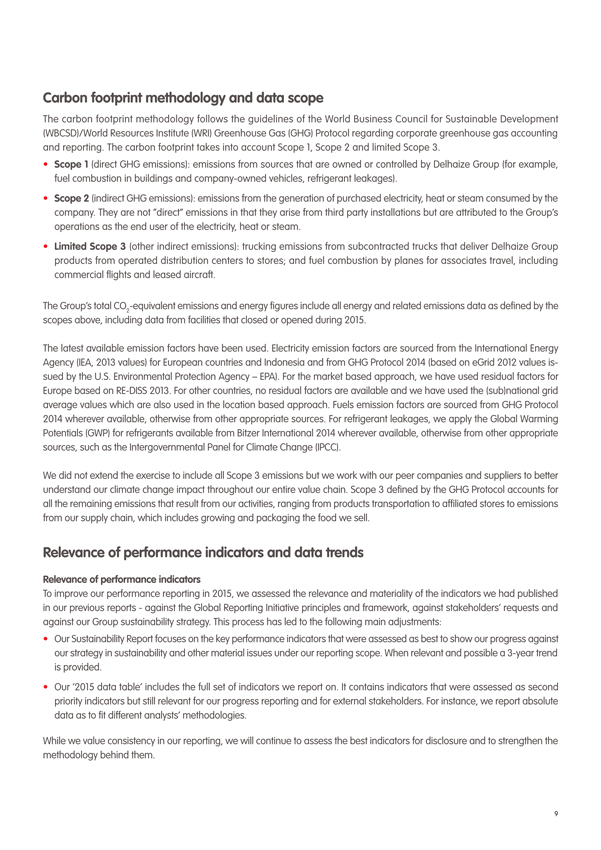
Carbon footprint methodology and data scope
The carbon footprint methodology follows the guidelines of the World Business Council for Sustainable Development (WBCSD)/World Resources Institute (WRI) Greenhouse Gas (GHG) Protocol regarding corporate greenhouse gas accounting and reporting. The carbon footprint takes into account Scope 1, Scope 2 and limited Scope 3.
Scope 1 (direct GHG emissions): emissions from sources that are owned or controlled by Delhaize Group (for example, fuel combustion in buildings and company-owned vehicles, refrigerant leakages).
Scope 2 (indirect GHG emissions): emissions from the generation of purchased electricity, heat or steam consumed by the company. They are not –direct– emissions in that they arise from third party installations but are attributed to the Group’s operations as the end user of the electricity, heat or steam.
Limited Scope 3 (other indirect emissions): trucking emissions from subcontracted trucks that deliver Delhaize Group products from operated distribution centers to stores; and fuel combustion by planes for associates travel, including commercial flights and leased aircraft.
The Group’s total CO2-equivalent emissions and energy figures include all energy and related emissions data as defined by the scopes above, including data from facilities that closed or opened during 2015.
The latest available emission factors have been used. Electricity emission factors are sourced from the International Energy Agency (IEA, 2013 values) for European countries and Indonesia and from GHG Protocol 2014 (based on eGrid 2012 values issued by the U.S. Environmental Protection Agency – EPA). For the market based approach, we have used residual factors for Europe based on RE-DISS 2013. For other countries, no residual factors are available and we have used the (sub)national grid average values which are also used in the location based approach. Fuels emission factors are sourced from GHG Protocol 2014 wherever available, otherwise from other appropriate sources. For refrigerant leakages, we apply the Global Warming Potentials (GWP) for refrigerants available from Bitzer International 2014 wherever available, otherwise from other appropriate sources, such as the Intergovernmental Panel for Climate Change (IPCC).
We did not extend the exercise to include all Scope 3 emissions but we work with our peer companies and suppliers to better understand our climate change impact throughout our entire value chain. Scope 3 defined by the GHG Protocol accounts for all the remaining emissions that result from our activities, ranging from products transportation to affiliated stores to emissions from our supply chain, which includes growing and packaging the food we sell.
Relevance of performance indicators and data trends
Relevance of performance indicators
To improve our performance reporting in 2015, we assessed the relevance and materiality of the indicators we had published in our previous reports—against the Global Reporting Initiative principles and framework, against stakeholders– requests and against our Group sustainability strategy. This process has led to the following main adjustments:
Our Sustainability Report focuses on the key performance indicators that were assessed as best to show our progress against our strategy in sustainability and other material issues under our reporting scope. When relevant and possible a 3-year trend is provided.
Our –2015 data table– includes the full set of indicators we report on. It contains indicators that were assessed as second priority indicators but still relevant for our progress reporting and for external stakeholders. For instance, we report absolute data as to fit different analysts’ methodologies.
While we value consistency in our reporting, we will continue to assess the best indicators for disclosure and to strengthen the methodology behind them.
9
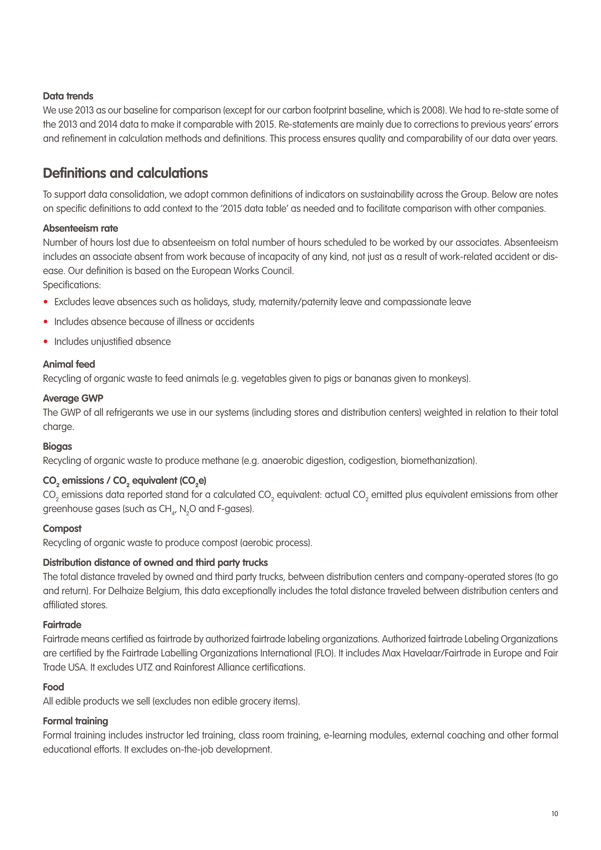
Data trends
We use 2013 as our baseline for comparison (except for our carbon footprint baseline, which is 2008). We had to re-state some of the 2013 and 2014 data to make it comparable with 2015. Re-statements are mainly due to corrections to previous years– errors and refinement in calculation methods and definitions. This process ensures quality and comparability of our data over years.
Definitions and calculations
To support data consolidation, we adopt common definitions of indicators on sustainability across the Group. Below are notes on specific definitions to add context to the –2015 data table– as needed and to facilitate comparison with other companies.
Absenteeism rate
Number of hours lost due to absenteeism on total number of hours scheduled to be worked by our associates. Absenteeism includes an associate absent from work because of incapacity of any kind, not just as a result of work-related accident or disease. Our definition is based on the European Works Council.
Specifications:
Excludes leave absences such as holidays, study, maternity/paternity leave and compassionate leave
Includes absence because of illness or accidents
Includes unjustified absence
Animal feed
Recycling of organic waste to feed animals (e.g. vegetables given to pigs or bananas given to monkeys).
Average GWP
The GWP of all refrigerants we use in our systems (including stores and distribution centers) weighted in relation to their total charge.
Biogas
Recycling of organic waste to produce methane (e.g. anaerobic digestion, codigestion, biomethanization).
CO emissions / CO equivalent (CO e)
2 2 2
CO emissions data reported stand for a calculated CO equivalent: actual CO emitted plus equivalent emissions from other
2 2 2
greenhouse gases (such as CH , N O and F-gases).
4 2
Compost
Recycling of organic waste to produce compost (aerobic process).
Distribution distance of owned and third party trucks
The total distance traveled by owned and third party trucks, between distribution centers and company-operated stores (to go and return). For Delhaize Belgium, this data exceptionally includes the total distance traveled between distribution centers and affiliated stores.
Fairtrade
Fairtrade means certified as fairtrade by authorized fairtrade labeling organizations. Authorized fairtrade Labeling Organizations are certified by the Fairtrade Labelling Organizations International (FLO). It includes Max Havelaar/Fairtrade in Europe and Fair Trade USA. It excludes UTZ and Rainforest Alliance certifications.
Food
All edible products we sell (excludes non edible grocery items).
Formal training
Formal training includes instructor led training, class room training, e-learning modules, external coaching and other formal educational efforts. It excludes on-the-job development.
10
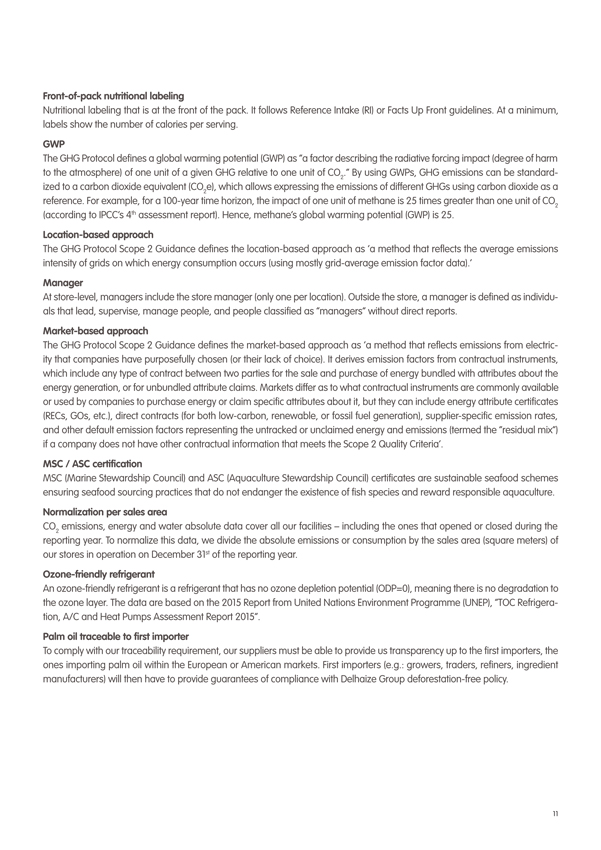
Front-of-pack nutritional labeling
Nutritional labeling that is at the front of the pack. It follows Reference Intake (RI) or Facts Up Front guidelines. At a minimum, labels show the number of calories per serving.
GWP
The GHG Protocol defines a global warming potential (GWP) as –a factor describing the radiative forcing impact (degree of harm to the atmosphere) of one unit of a given GHG relative to one unit of CO2.– By using GWPs, GHG emissions can be standardized to a carbon dioxide equivalent (CO2e), which allows expressing the emissions of different GHGs using carbon dioxide as a reference. For example, for a 100-year time horizon, the impact of one unit of methane is 25 times greater than one unit of CO2 (according to IPCC’s 4th assessment report). Hence, methane’s global warming potential (GWP) is 25.
Location-based approach
The GHG Protocol Scope 2 Guidance defines the location-based approach as –a method that reflects the average emissions intensity of grids on which energy consumption occurs (using mostly grid-average emission factor data).–
Manager
At store-level, managers include the store manager (only one per location). Outside the store, a manager is defined as individuals that lead, supervise, manage people, and people classified as –managers– without direct reports.
Market-based approach
The GHG Protocol Scope 2 Guidance defines the market-based approach as –a method that reflects emissions from electricity that companies have purposefully chosen (or their lack of choice). It derives emission factors from contractual instruments, which include any type of contract between two parties for the sale and purchase of energy bundled with attributes about the energy generation, or for unbundled attribute claims. Markets differ as to what contractual instruments are commonly available or used by companies to purchase energy or claim specific attributes about it, but they can include energy attribute certificates (RECs, GOs, etc.), direct contracts (for both low-carbon, renewable, or fossil fuel generation), supplier-specific emission rates, and other default emission factors representing the untracked or unclaimed energy and emissions (termed the –residual mix–) if a company does not have other contractual information that meets the Scope 2 Quality Criteria’.
MSC / ASC certification
MSC (Marine Stewardship Council) and ASC (Aquaculture Stewardship Council) certificates are sustainable seafood schemes ensuring seafood sourcing practices that do not endanger the existence of fish species and reward responsible aquaculture.
Normalization per sales area
CO2 emissions, energy and water absolute data cover all our facilities – including the ones that opened or closed during the reporting year. To normalize this data, we divide the absolute emissions or consumption by the sales area (square meters) of our stores in operation on December 31st of the reporting year.
Ozone-friendly refrigerant
An ozone-friendly refrigerant is a refrigerant that has no ozone depletion potential (ODP=0), meaning there is no degradation to the ozone layer. The data are based on the 2015 Report from United Nations Environment Programme (UNEP), –TOC Refrigeration, A/C and Heat Pumps Assessment Report 2015–.
Palm oil traceable to first importer
To comply with our traceability requirement, our suppliers must be able to provide us transparency up to the first importers, the ones importing palm oil within the European or American markets. First importers (e.g.: growers, traders, refiners, ingredient manufacturers) will then have to provide guarantees of compliance with Delhaize Group deforestation-free policy.
11
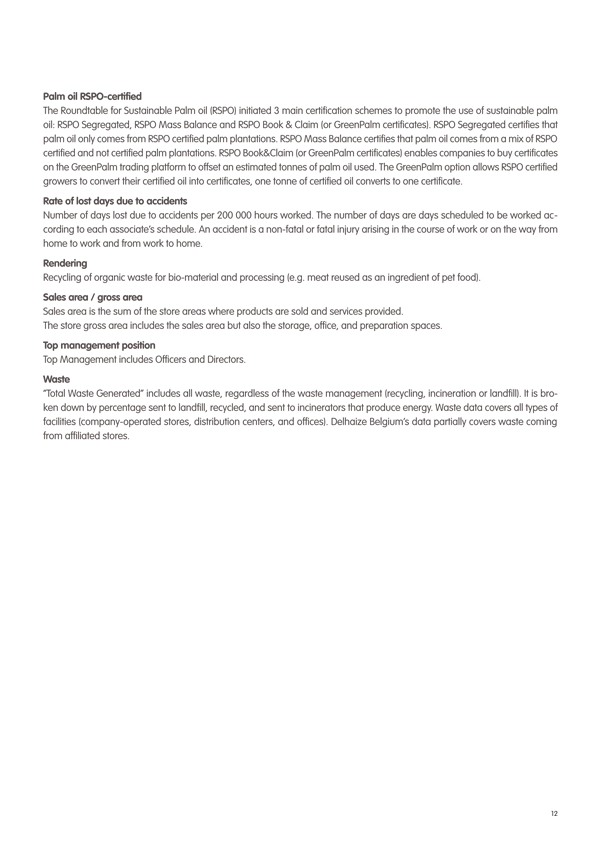
Palm oil RSPO-certified
The Roundtable for Sustainable Palm oil (RSPO) initiated 3 main certification schemes to promote the use of sustainable palm oil: RSPO Segregated, RSPO Mass Balance and RSPO Book & Claim (or GreenPalm certificates). RSPO Segregated certifies that palm oil only comes from RSPO certified palm plantations. RSPO Mass Balance certifies that palm oil comes from a mix of RSPO certified and not certified palm plantations. RSPO Book&Claim (or GreenPalm certificates) enables companies to buy certificates on the GreenPalm trading platform to offset an estimated tonnes of palm oil used. The GreenPalm option allows RSPO certified growers to convert their certified oil into certificates, one tonne of certified oil converts to one certificate.
Rate of lost days due to accidents
Number of days lost due to accidents per 200 000 hours worked. The number of days are days scheduled to be worked according to each associate’s schedule. An accident is a non-fatal or fatal injury arising in the course of work or on the way from home to work and from work to home.
Rendering
Recycling of organic waste for bio-material and processing (e.g. meat reused as an ingredient of pet food).
Sales area / gross area
Sales area is the sum of the store areas where products are sold and services provided.
The store gross area includes the sales area but also the storage, office, and preparation spaces.
Top management position
Top Management includes Officers and Directors.
Waste
–Total Waste Generated– includes all waste, regardless of the waste management (recycling, incineration or landfill). It is broken down by percentage sent to landfill, recycled, and sent to incinerators that produce energy. Waste data covers all types of facilities (company-operated stores, distribution centers, and offices). Delhaize Belgium’s data partially covers waste coming from affiliated stores.
12
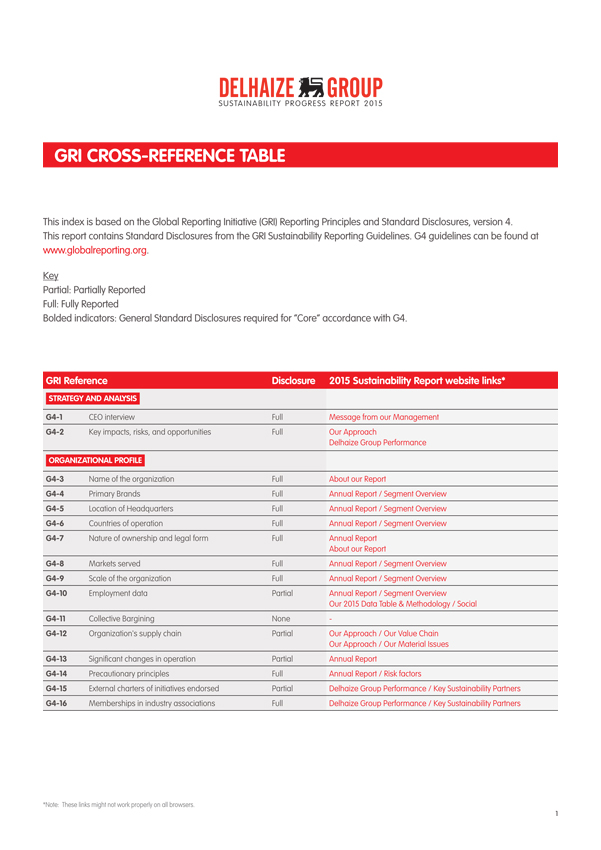
SUSTAINABILITY PROGRESS REPORT 2015
GRI CROSS-REFERENCE TABLE
This index is based on the Global Reporting Initiative (GRI) Reporting Principles and Standard Disclosures, version 4. This report contains Standard Disclosures from the GRI Sustainability Reporting Guidelines. G4 guidelines can be found at www.globalreporting.org.
Key
Partial: Partially Reported Full: Fully Reported
Bolded indicators: General Standard Disclosures required for –Core– accordance with G4.
GRI Reference Disclosure 2015 Sustainability Report website links*
STRATEGY AND ANALYSIS
G4-1 CEO interview Full Message from our Management
G4-2 Key impacts, risks, and opportunities Full Our Approach
Delhaize Group Performance
ORGANIZATIONAL PROFILE
G4-3 Name of the organization Full About our Report
G4-4 Primary Brands Full Annual Report / Segment Overview
G4-5 Location of Headquarters Full Annual Report / Segment Overview
G4-6 Countries of operation Full Annual Report / Segment Overview
G4-7 Nature of ownership and legal form Full Annual Report
About our Report
G4-8 Markets served Full Annual Report / Segment Overview
G4-9 Scale of the organization Full Annual Report / Segment Overview
G4-10 Employment data Partial Annual Report / Segment Overview
Our 2015 Data Table & Methodology / Social
G4-11 Collective Bargining None -
G4-12 Organization’s supply chain Partial Our Approach / Our Value Chain
Our Approach / Our Material Issues
G4-13 Signi–cant changes in operation Partial Annual Report
G4-14 Precautionary principles Full Annual Report / Risk factors
G4-15 External charters of initiatives endorsed Partial Delhaize Group Performance / Key Sustainability Partners
G4-16 Memberships in industry associations Full Delhaize Group Performance / Key Sustainability Partners
*Note: These links might not work properly on all browsers.
1 |
|
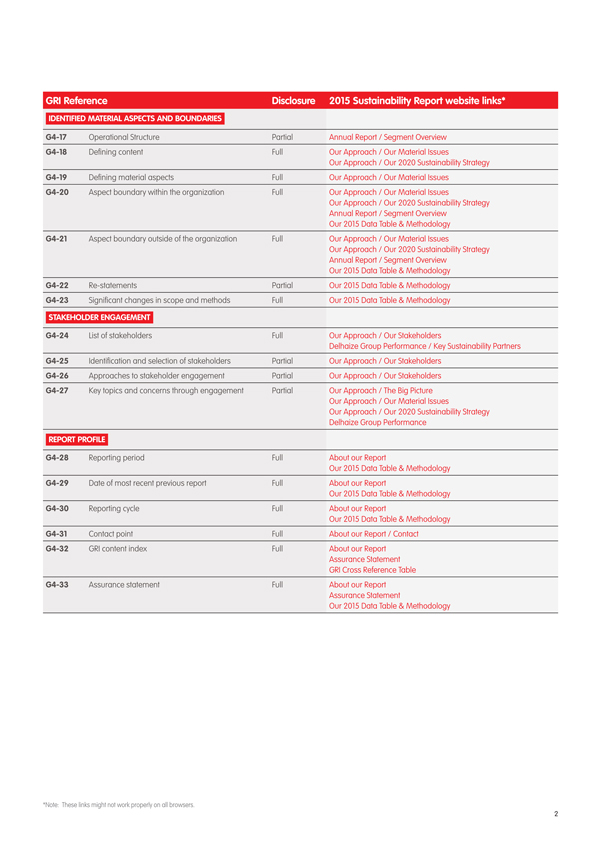
GRI Reference Disclosure 2015 Sustainability Report website links*
IDENTIFIED MATERIAL ASPECTS AND BOUNDARIES
G4-17 Operational Structure Partial Annual Report / Segment Overview
G4-18 De–ning content Full Our Approach / Our Material Issues
Our Approach / Our 2020 Sustainability Strategy
G4-19 De–ning material aspects Full Our Approach / Our Material Issues
G4-20 Aspect boundary within the organization Full Our Approach / Our Material Issues
Our Approach / Our 2020 Sustainability Strategy
Annual Report / Segment Overview
Our 2015 Data Table & Methodology
G4-21 Aspect boundary outside of the organization Full Our Approach / Our Material Issues
Our Approach / Our 2020 Sustainability Strategy
Annual Report / Segment Overview
Our 2015 Data Table & Methodology
G4-22 Re-statements Partial Our 2015 Data Table & Methodology
G4-23 Signi–cant changes in scope and methods Full Our 2015 Data Table & Methodology
STAKEHOLDER ENGAGEMENT
G4-24 List of stakeholders Full Our Approach / Our Stakeholders
Delhaize Group Performance / Key Sustainability Partners
G4-25 Identi–cation and selection of stakeholders Partial Our Approach / Our Stakeholders
G4-26 Approaches to stakeholder engagement Partial Our Approach / Our Stakeholders
G4-27 Key topics and concerns through engagement Partial Our Approach / The Big Picture
Our Approach / Our Material Issues
Our Approach / Our 2020 Sustainability Strategy
Delhaize Group Performance
REPORT PROFILE
G4-28 Reporting period Full About our Report
Our 2015 Data Table & Methodology
G4-29 Date of most recent previous report Full About our Report
Our 2015 Data Table & Methodology
G4-30 Reporting cycle Full About our Report
Our 2015 Data Table & Methodology
G4-31 Contact point Full About our Report / Contact
G4-32 GRI content index Full About our Report
Assurance Statement
GRI Cross Reference Table
G4-33 Assurance statement Full About our Report
Assurance Statement
Our 2015 Data Table & Methodology
*Note: These links might not work properly on all browsers.
2 |
|
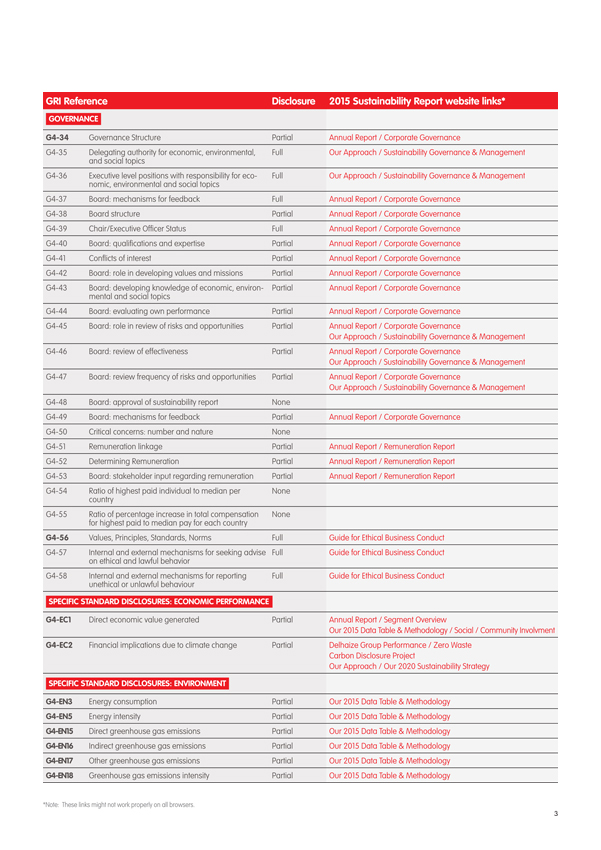
GRI Reference Disclosure 2015 Sustainability Report website links*
GOVERNANCE
G4-34 Governance Structure Partial Annual Report / Corporate Governance
G4-35 Delegating authority for economic, environmental, Full Our Approach / Sustainability Governance & Management
and social topics
G4-36 Executive level positions with responsibility for eco- Full Our Approach / Sustainability Governance & Management
nomic, environmental and social topics
G4-37 Board: mechanisms for feedback Full Annual Report / Corporate Governance
G4-38 Board structure Partial Annual Report / Corporate Governance
G4-39 Chair/Executive Of–cer Status Full Annual Report / Corporate Governance
G4-40 Board: quali–cations and expertise Partial Annual Report / Corporate Governance
G4-41 Con–icts of interest Partial Annual Report / Corporate Governance
G4-42 Board: role in developing values and missions Partial Annual Report / Corporate Governance
G4-43 Board: developing knowledge of economic, environ- Partial Annual Report / Corporate Governance
mental and social topics
G4-44 Board: evaluating own performance Partial Annual Report / Corporate Governance
G4-45 Board: role in review of risks and opportunities Partial Annual Report / Corporate Governance
Our Approach / Sustainability Governance & Management
G4-46 Board: review of effectiveness Partial Annual Report / Corporate Governance
Our Approach / Sustainability Governance & Management
G4-47 Board: review frequency of risks and opportunities Partial Annual Report / Corporate Governance
Our Approach / Sustainability Governance & Management
G4-48 Board: approval of sustainability report None
G4-49 Board: mechanisms for feedback Partial Annual Report / Corporate Governance
G4-50 Critical concerns: number and nature None
G4-51 Remuneration linkage Partial Annual Report / Remuneration Report
G4-52 Determining Remuneration Partial Annual Report / Remuneration Report
G4-53 Board: stakeholder input regarding remuneration Partial Annual Report / Remuneration Report
G4-54 Ratio of highest paid individual to median per None
country
G4-55 Ratio of percentage increase in total compensation None
for highest paid to median pay for each country
G4-56 Values, Principles, Standards, Norms Full Guide for Ethical Business Conduct
G4-57 Internal and external mechanisms for seeking advise Full Guide for Ethical Business Conduct
on ethical and lawful behavior
G4-58 Internal and external mechanisms for reporting Full Guide for Ethical Business Conduct
unethical or unlawful behaviour
SPECIFIC STANDARD DISCLOSURES: ECONOMIC PERFORMANCE
G4-EC1 Direct economic value generated Partial Annual Report / Segment Overview
Our 2015 Data Table & Methodology / Social / Community Involvment
G4-EC2 Financial implications due to climate change Partial Delhaize Group Performance / Zero Waste
Carbon Disclosure Project
Our Approach / Our 2020 Sustainability Strategy
SPECIFIC STANDARD DISCLOSURES: ENVIRONMENT
G4-EN3 Energy consumption Partial Our 2015 Data Table & Methodology
G4-EN5 Energy intensity Partial Our 2015 Data Table & Methodology
G4-EN15 Direct greenhouse gas emissions Partial Our 2015 Data Table & Methodology
G4-EN16 Indirect greenhouse gas emissions Partial Our 2015 Data Table & Methodology
G4-EN17 Other greenhouse gas emissions Partial Our 2015 Data Table & Methodology
G4-EN18 Greenhouse gas emissions intensity Partial Our 2015 Data Table & Methodology
*Note: These links might not work properly on all browsers.
3 |
|
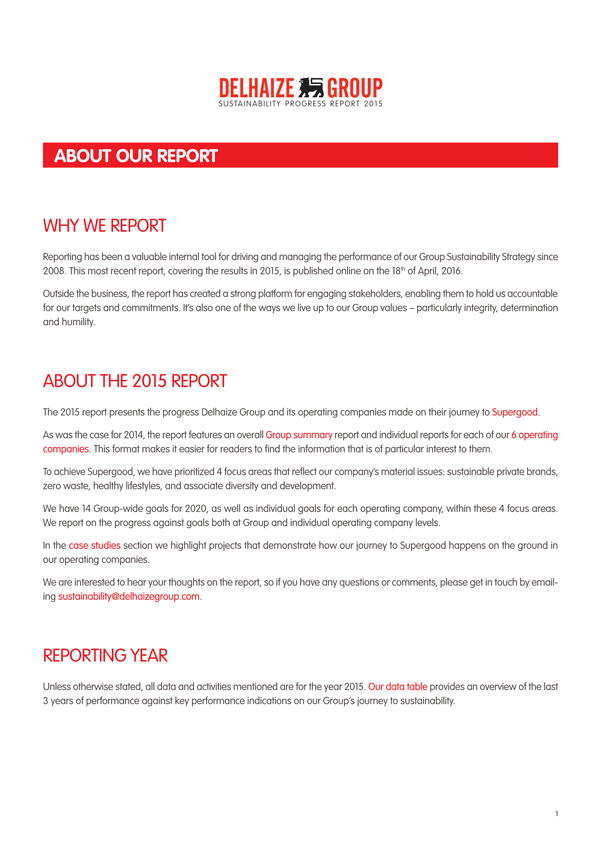
SUSTAINABILITY PROGRESS REPORT 2015
ABOUT OUR REPORT
WHY WE REPORT
Reporting has been a valuable internal tool for driving and managing the performance of our Group Sustainability Strategy since 2008. This most recent report, covering the results in 2015, is published online on the 18th of April, 2016.
Outside the business, the report has created a strong platform for engaging stakeholders, enabling them to hold us accountable for our targets and commitments. It’s also one of the ways we live up to our Group values – particularly integrity, determination and humility.
ABOUT THE 2015 REPORT
The 2015 report presents the progress Delhaize Group and its operating companies made on their journey to Supergood.
As was the case for 2014, the report features an overall Group summary report and individual reports for each of our 6 operating companies. This format makes it easier for readers to –nd the information that is of particular interest to them.
To achieve Supergood, we have prioritized 4 focus areas that re–ect our company’s material issues: sustainable private brands, zero waste, healthy lifestyles, and associate diversity and development.
We have 14 Group-wide goals for 2020, as well as individual goals for each operating company, within these 4 focus areas. We report on the progress against goals both at Group and individual operating company levels.
In the case studies section we highlight projects that demonstrate how our journey to Supergood happens on the ground in our operating companies.
We are interested to hear your thoughts on the report, so if you have any questions or comments, please get in touch by email-ing sustainability@delhaizegroup.com.
REPORTING YEAR
Unless otherwise stated, all data and activities mentioned are for the year 2015. Our data table provides an overview of the last 3 years of performance against key performance indications on our Group’s journey to sustainability.
1 |
|
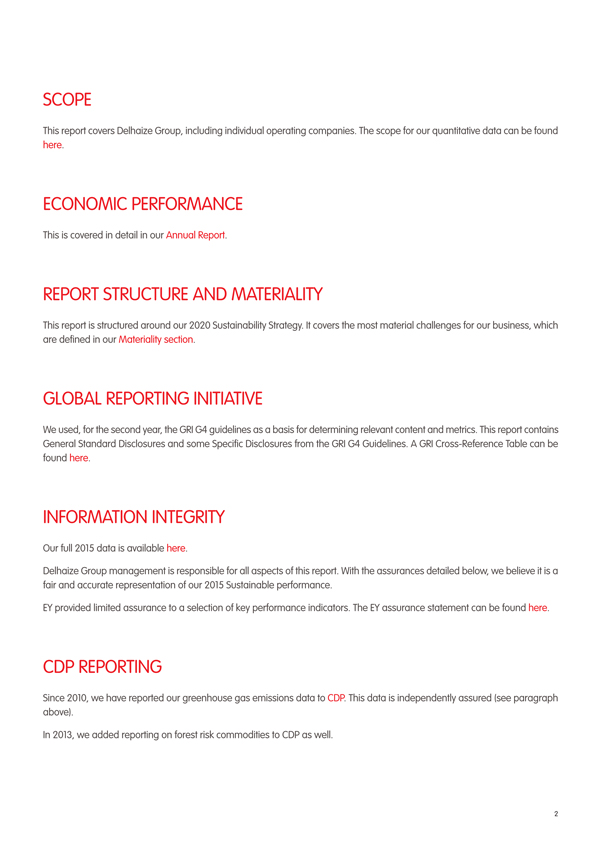
SCOPE
This report covers Delhaize Group, including individual operating companies. The scope for our quantitative data can be found here.
ECONOMIC PERFORMANCE
This is covered in detail in our Annual Report.
REPORT STRUCTURE AND MATERIALITY
This report is structured around our 2020 Sustainability Strategy. It covers the most material challenges for our business, which are defined in our Materiality section.
GLOBAL REPORTING INITIATIVE
We used, for the second year, the GRI G4 guidelines as a basis for determining relevant content and metrics. This report contains General Standard Disclosures and some Specific Disclosures from the GRI G4 Guidelines. A GRI Cross-Reference Table can be found here.
INFORMATION INTEGRITY
Our full 2015 data is available here.
Delhaize Group management is responsible for all aspects of this report. With the assurances detailed below, we believe it is a fair and accurate representation of our 2015 Sustainable performance.
EY provided limited assurance to a selection of key performance indicators. The EY assurance statement can be found here.
CDP REPORTING
Since 2010, we have reported our greenhouse gas emissions data to CDP. This data is independently assured (see paragraph above).
In 2013, we added reporting on forest risk commodities to CDP as well.
2 |
|
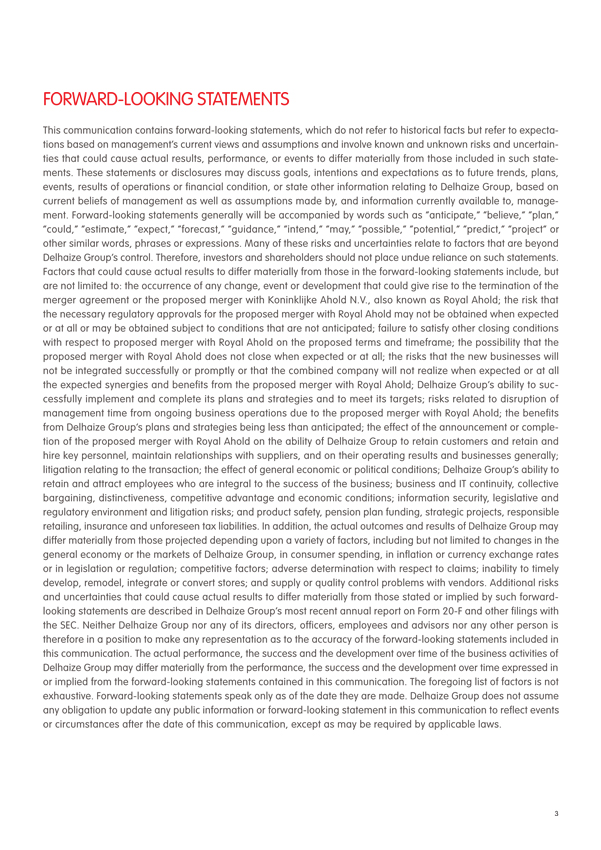
FORWARD-LOOKING STATEMENTS
This communication contains forward-looking statements, which do not refer to historical facts but refer to expectations based on management’s current views and assumptions and involve known and unknown risks and uncertainties that could cause actual results, performance, or events to differ materially from those included in such statements. These statements or disclosures may discuss goals, intentions and expectations as to future trends, plans, events, results of operations or financial condition, or state other information relating to Delhaize Group, based on current beliefs of management as well as assumptions made by, and information currently available to, management. Forward-looking statements generally will be accompanied by words such as “anticipate,” “believe,” “plan,” “could,” “estimate,” “expect,” “forecast,” “guidance,” “intend,” “may,” “possible,” “potential,” “predict,” “project” or other similar words, phrases or expressions. Many of these risks and uncertainties relate to factors that are beyond Delhaize Group’s control. Therefore, investors and shareholders should not place undue reliance on such statements. Factors that could cause actual results to differ materially from those in the forward-looking statements include, but are not limited to: the occurrence of any change, event or development that could give rise to the termination of the merger agreement or the proposed merger with Koninklijke Ahold N.V., also known as Royal Ahold; the risk that the necessary regulatory approvals for the proposed merger with Royal Ahold may not be obtained when expected or at all or may be obtained subject to conditions that are not anticipated; failure to satisfy other closing conditions with respect to proposed merger with Royal Ahold on the proposed terms and timeframe; the possibility that the proposed merger with Royal Ahold does not close when expected or at all; the risks that the new businesses will not be integrated successfully or promptly or that the combined company will not realize when expected or at all the expected synergies and benefits from the proposed merger with Royal Ahold; Delhaize Group’s ability to successfully implement and complete its plans and strategies and to meet its targets; risks related to disruption of management time from ongoing business operations due to the proposed merger with Royal Ahold; the benefits from Delhaize Group’s plans and strategies being less than anticipated; the effect of the announcement or completion of the proposed merger with Royal Ahold on the ability of Delhaize Group to retain customers and retain and hire key personnel, maintain relationships with suppliers, and on their operating results and businesses generally; litigation relating to the transaction; the effect of general economic or political conditions; Delhaize Group’s ability to retain and attract employees who are integral to the success of the business; business and IT continuity, collective bargaining, distinctiveness, competitive advantage and economic conditions; information security, legislative and regulatory environment and litigation risks; and product safety, pension plan funding, strategic projects, responsible retailing, insurance and unforeseen tax liabilities. In addition, the actual outcomes and results of Delhaize Group may differ materially from those projected depending upon a variety of factors, including but not limited to changes in the general economy or the markets of Delhaize Group, in consumer spending, in inflation or currency exchange rates or in legislation or regulation; competitive factors; adverse determination with respect to claims; inability to timely develop, remodel, integrate or convert stores; and supply or quality control problems with vendors. Additional risks and uncertainties that could cause actual results to differ materially from those stated or implied by such forward-looking statements are described in Delhaize Group’s most recent annual report on Form 20-F and other filings with the SEC. Neither Delhaize Group nor any of its directors, officers, employees and advisors nor any other person is therefore in a position to make any representation as to the accuracy of the forward-looking statements included in this communication. The actual performance, the success and the development over time of the business activities of Delhaize Group may differ materially from the performance, the success and the development over time expressed in or implied from the forward-looking statements contained in this communication. The foregoing list of factors is not exhaustive. Forward-looking statements speak only as of the date they are made. Delhaize Group does not assume any obligation to update any public information or forward-looking statement in this communication to reflect events or circumstances after the date of this communication, except as may be required by applicable laws.
3 |
|
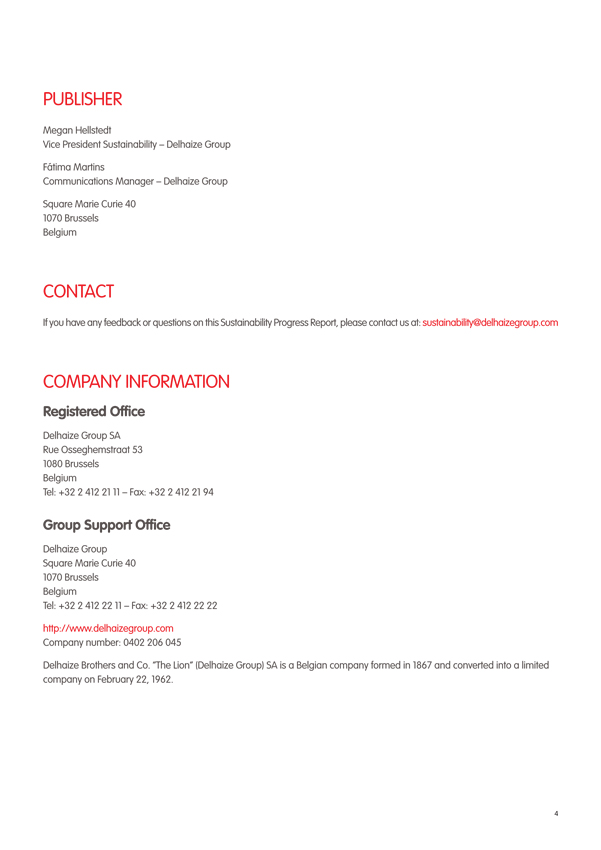
PUBLISHER
Megan Hellstedt
Vice President Sustainability – Delhaize Group
Fátima Martins
Communications Manager – Delhaize Group
Square Marie Curie 40
1070 Brussels
Belgium
CONTACT
If you have any feedback or questions on this Sustainability Progress Report, please contact us at: sustainability@delhaizegroup.com
COMPANY INFORMATION
Registered Of–ce
Delhaize Group SA
Rue Osseghemstraat 53
1080 Brussels
Belgium
Tel: +32 2 412 21 11 – Fax: +32 2 412 21 94
Group Support Of–ce
Delhaize Group
Square Marie Curie 40
1070 Brussels
Belgium
Tel: +32 2 412 22 11 – Fax: +32 2 412 22 22
http://www.delhaizegroup.com
Company number: 0402 206 045
Delhaize Brothers and Co. –The Lion– (Delhaize Group) SA is a Belgian company formed in 1867 and converted into a limited company on February 22, 1962.
4 |
|
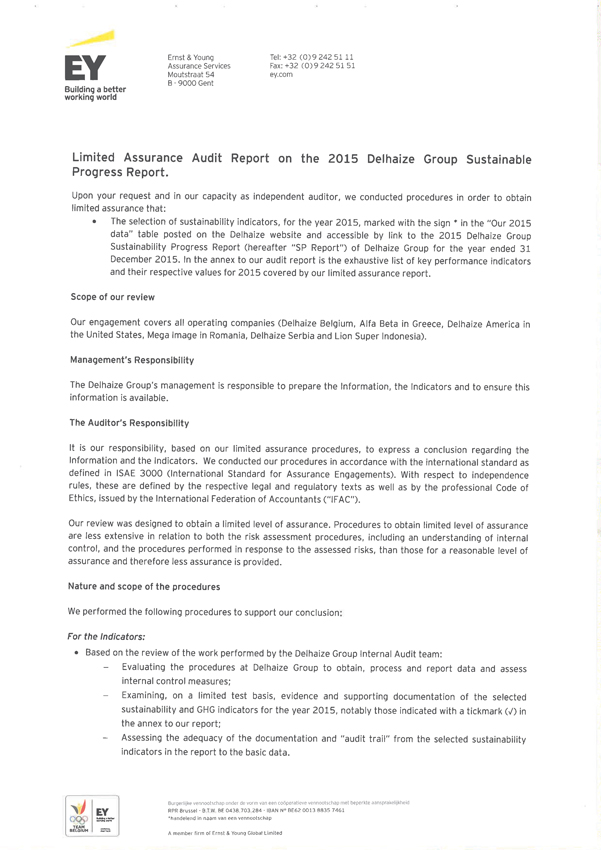
Burgerlijke vennootschap onder de vorm van een cooperatieve vennoolschap met beperkte aansprakelijkheid
RPR Brussel - B TW BE 0438 703 284 - IBAN N° BE62 0013 8835 7461
‘handelend in naam van een vennootschap
A member firm of Ernst & Young Global Limited
EY
Building a better working world
Ernst & Young Tel:+32 (0)9 242 51 11
Assurance Services Fax: +32 (0)9 242 51 51
Moutstraat 54 ey.com
B - 9000 Gent
Limited Assurance Audit Report on the 2015 Delhaize Group Sustainable Progress Report.
Upon your request and in our capacity as independent auditor, we conducted procedures in order to obtain limited assurance that:
• The selection of sustainability indicators, for the year 2015, marked with the sign * in the “Our 2015 data” table posted on the Delhaize website and accessible by link to the 2015 Delhaize Group Sustainability Progress Report (hereafter “SP Report”) of Delhaize Group for the year ended 31 December 2015. In the annex to our audit report is the exhaustive list of key performance indicators and their respective values for 2015 covered by our limited assurance report.
Scope of our review
Our engagement covers all operating companies (Delhaize Belgium, Alfa Beta in Greece, Delhaize America in the United States, Mega Image in Romania, Delhaize Serbia and Lion Super Indonesia).
Management’s Responsibility
The Delhaize Group’s management is responsible to prepare the Information, the Indicators and to ensure this information is available.
The Auditor’s Responsibility
It is our responsibility, based on our limited assurance procedures, to express a conclusion regarding the Information and the Indicators. We conducted our procedures in accordance with the international standard as defined in ISAE 3000 (International Standard for Assurance Engagements). With respect to independence rules, these are defined by the respective legal and regulatory texts as well as by the professional Code of Ethics, issued by the International Federation of Accountants (“IFAC”).
Our review was designed to obtain a limited level of assurance. Procedures to obtain limited level of assurance are less extensive in relation to both the risk assessment procedures, including an understanding of internal control, and the procedures performed in response to the assessed risks, than those for a reasonable level of assurance and therefore less assurance is provided.
Nature and scope of the procedures
We performed the following procedures to support our conclusion:
For the Indicators:
• Based on the review of the work performed by the Delhaize Group Internal Audit team:
Evaluating the procedures at Delhaize Group to obtain, process and report data and assess internal control measures;
Examining, on a limited test basis, evidence and supporting documentation of the selected sustainability and GHG indicators for the year 2015, notably those indicated with a tickmark () in the annex to our report;
Assessing the adequacy of the documentation and “audit trail” from the selected sustainability indicators in the report to the basic data.
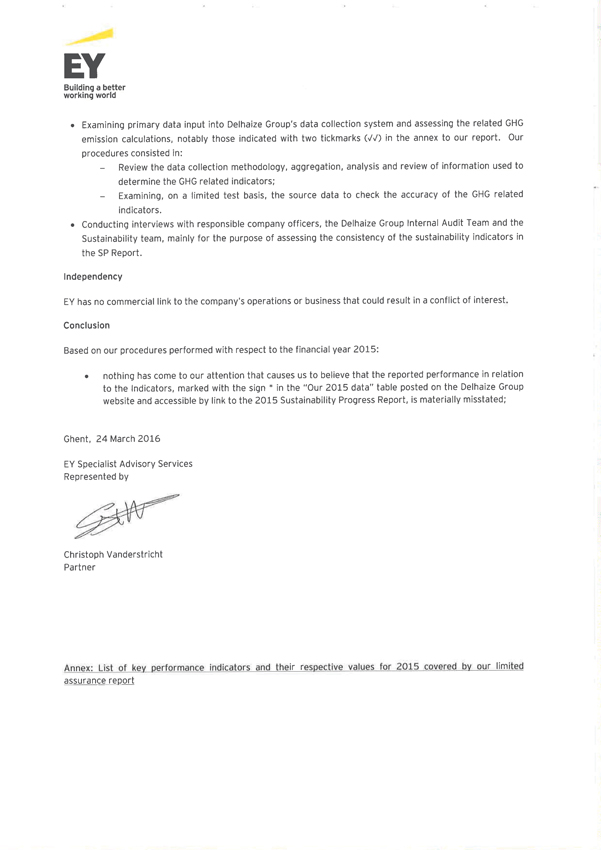
EY
Building a better working world
Examining primary data input into Delhaize Group’s data collection system and assessing the related GHG emission calculations, notably those indicated with two tickmarks () in the annex to our report. Our
procedures consisted in:
Review the data collection methodology, aggregation, analysis and review of information used to determine the GHG related indicators;
Examining, on a limited test basis, the source data to check the accuracy of the GHG related indicators.
• Conducting interviews with responsible company officers, the Delhaize Group Internal Audit Team and the Sustainability team, mainly for the purpose of assessing the consistency of the sustainability indicators in the SP Report.
Independency
EY has no commercial link to the company’s operations or business that could result in a conflict of interest. Conclusion
Based on our procedures performed with respect to the financial year 2015:
• nothing has come to our attention that causes us to believe that the reported performance in relation to the Indicators, marked with the sign * in the “Our 2015 data” table posted on the Delhaize Group website and accessible by link to the 2015 Sustainability Progress Report, is materially misstated;
Ghent, 24 March 2016
EY Specialist Advisory Services Represented by Christoph Vanderstricht Partner
Annex: List of key performance indicators and their respective values for 2015 covered by our limited assurance report
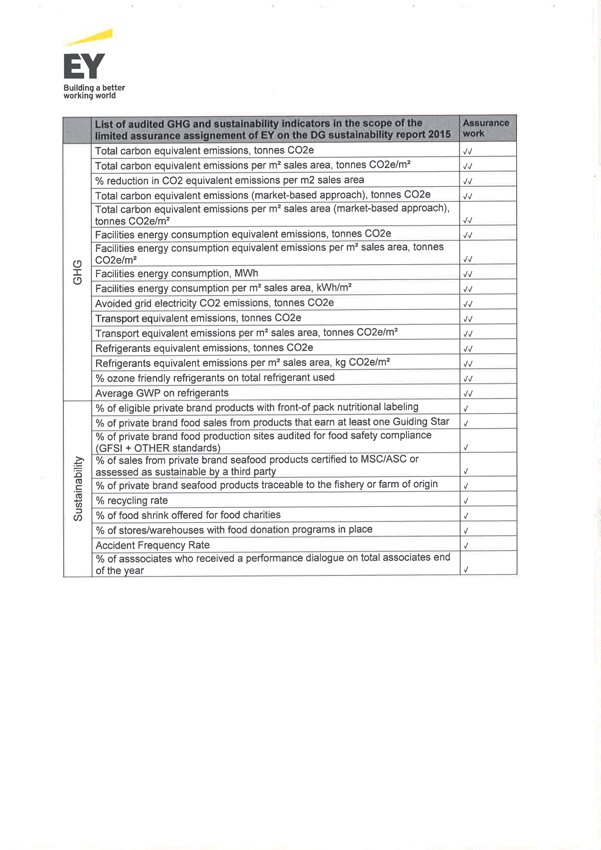
EY
Building a better working world
List of audited GHG and sustainability indicators in the scope of the limited assurance assignement of EY on the DG sustainability report 2015 Assurance
work
GHG Total carbon equivalent emissions, tonnes C02e v/v/
Total carbon equivalent emissions per m2 sales area, tonnes C02e/m2 yy
% reduction in C02 equivalent emissions per m2 sales area yy
Total carbon equivalent emissions (market-based approach), tonnes C02e yy
Total carbon equivalent emissions per m2 sales area (market-based approach), tonnes C02e/m2 yy
Facilities energy consumption equivalent emissions, tonnes C02e yy
Facilities energy consumption equivalent emissions per m2 sales area, tonnes C02e/m2 yy
Facilities energy consumption, MWh yy
Facilities energy consumption per m2 sales area, kWh/m2 yy
Avoided grid electricity C02 emissions, tonnes C02e yy
Transport equivalent emissions, tonnes C02e yy
Transport equivalent emissions per m2 sales area, tonnes C02e/m2 yy
Refrigerants equivalent emissions, tonnes C02e yy
Refrigerants equivalent emissions per m2 sales area, kg C02e/m2 yy
% ozone friendly refrigerants on total refrigerant used yy
Average GWP on refrigerants yy
Sustainability % of eligible private brand products with front-of pack nutritional labeling y
% of private brand food sales from products that earn at least one Guiding Star y
% of private brand food production sites audited for food safety compliance (GFSI + OTHER standards) y
% of sales from private brand seafood products certified to MSC/ASC or assessed as sustainable bv a third party y
% of private brand seafood products traceable to the fishery or farm of origin y
% recycling rate y
% of food shrink offered for food charities y
% of stores/warehouses with food donation programs in place y
Accident Frequency Rate y
% of asssociates who received a performance dialogue on total associates end of the year y
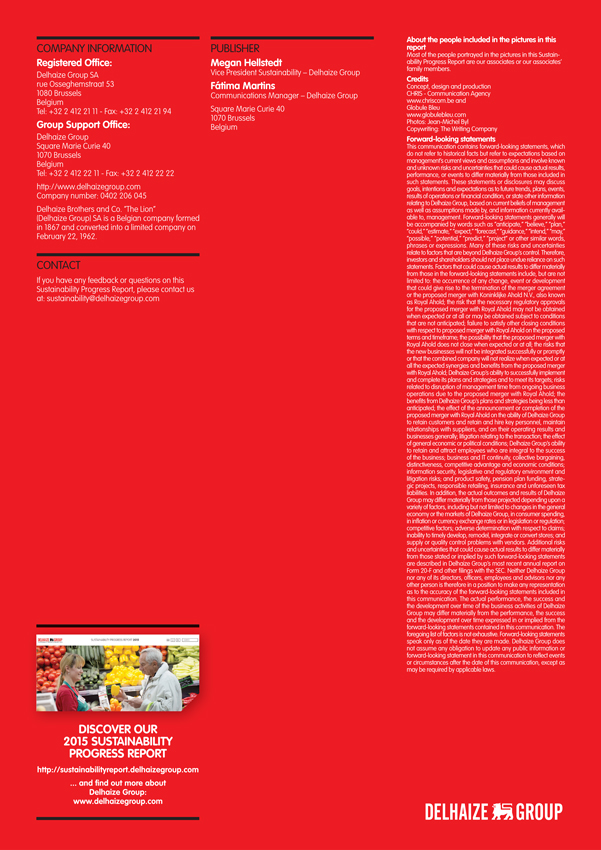
COMPANY INFORMATION
Registered Office:
Delhaize Group SA rue Osseghemstraat 53 1080 Brussels Belgium
Tel: +32 2 412 21 11—Fax: +32 2 412 21 94
Group Support Of–ce:
Delhaize Group Square Marie Curie 40 1070 Brussels Belgium
Tel: +32 2 412 22 11—Fax: +32 2 412 22 22 http://www.delhaizegroup.com Company number: 0402 206 045 Delhaize Brothers and Co. –The Lion– (Delhaize Group) SA is a Belgian company formed in 1867 and converted into a limited company on February 22, 1962.
CONTACT
If you have any feedback or questions on this Sustainability Progress Report, please contact us at: sustainability@delhaizegroup.com
DISCOVER OUR 2015 SUSTAINABILITY PROGRESS REPORT
http://sustainabilityreport.delhaizegroup.com
. and –nd out more about Delhaize Group: www.delhaizegroup.com
PUBLISHER
Megan Hellstedt
Vice President Sustainability – Delhaize Group
Fátima Martins
Communications Manager – Delhaize Group Square Marie Curie 40 1070 Brussels Belgium
About the people included in the pictures in this report
Most of the people portrayed in the pictures in this Sustainability Progress Report are our associates or our associates– family members.
Credits
Concept, design and production CHRIS—Communication Agency www.chriscom.be and Globule Bleu www.globulebleu.com Photos: Jean-Michel Byl Copywriting: The Writing Company
Forward-looking statements
About report the people included in the pictures in this
Most of the people portrayed in the pictures in this Sustainability Progress Report are our associates or our associates’ family members.
Credits
Concept, design and production CHRIS—Communication Agency www.chriscom.be and Globule Bleu www.globulebleu.com Photos: Jean-Michel Byl Copywriting: The Writing Company
Forward-looking statements
This communication contains forward-looking statements, which do not refer to historical facts but refer to expectations based on management’s current views and assumptions and involve known and unknown risks and uncertainties that could cause actual results, performance, or events to differ materially from those included in such statements. These statements or disclosures may discuss goals, intentions and expectations as to future trends, plans, events, results of operations or financial condition, or state other information relating to Delhaize Group, based on current beliefs of management as well as assumptions made by, and information currently available to, management. Forward-looking statements generally will be accompanied by words such as “anticipate,” “believe,” “plan,” “could,” “estimate,” “expect,” “forecast,” “guidance,” “intend,” “may,” “possible,” “potential,” “predict,” “project” or other similar words, phrases or expressions. Many of these risks and uncertainties relate to factors that are beyond Delhaize Group’s control. Therefore, investors and shareholders should not place undue reliance on such statements. Factors that could cause actual results to differ materially from those in the forward-looking statements include, but are not limited to: the occurrence of any change, event or development that could give rise to the termination of the merger agreement or the proposed merger with Koninklijke Ahold N.V., also known as Royal Ahold; the risk that the necessary regulatory approvals for the proposed merger with Royal Ahold may not be obtained when expected or at all or may be obtained subject to conditions that are not anticipated; failure to satisfy other closing conditions with respect to proposed merger with Royal Ahold on the proposed terms and timeframe; the possibility that the proposed merger with Royal Ahold does not close when expected or at all; the risks that the new businesses will not be integrated successfully or promptly or that the combined company will not realize when expected or at all the expected synergies and benefits from the proposed merger with Royal Ahold; Delhaize Group’s ability to successfully implement and complete its plans and strategies and to meet its targets; risks related to disruption of management time from ongoing business operations due to the proposed merger with Royal Ahold; the benefits from Delhaize Group’s plans and strategies being less than anticipated; the effect of the announcement or completion of the proposed merger with Royal Ahold on the ability of Delhaize Group to retain customers and retain and hire key personnel, maintain relationships with suppliers, and on their operating results and businesses generally; litigation relating to the transaction; the effect of general economic or political conditions; Delhaize Group’s ability to retain and attract employees who are integral to the success of the business; business and IT continuity, collective bargaining, distinctiveness, competitive advantage and economic conditions; information security, legislative and regulatory environment and litigation risks; and product safety, pension plan funding, strategic projects, responsible retailing, insurance and unforeseen tax liabilities. In addition, the actual outcomes and results of Delhaize Group may differ materially from those projected depending upon a variety of factors, including but not limited to changes in the general economy or the markets of Delhaize Group, in consumer spending, in inflation or currency exchange rates or in legislation or regulation; competitive factors; adverse determination with respect to claims; inability to timely develop, remodel, integrate or convert stores; and supply or quality control problems with vendors. Additional risks and uncertainties that could cause actual results to differ materially from those stated or implied by such forward-looking statements are described in Delhaize Group’s most recent annual report on Form 20-F and other filings with the SEC. Neither Delhaize Group nor any of its directors, officers, employees and advisors nor any other person is therefore in a position to make any representation as to the accuracy of the forward-looking statements included in this communication. The actual performance, the success and the development over time of the business activities of Delhaize Group may differ materially from the performance, the success and the development over time expressed in or implied from the forward-looking statements contained in this communication. The foregoing list of factors is not exhaustive. Forward-looking statements speak only as of the date they are made. Delhaize Group does not assume any obligation to update any public information or forward-looking statement in this communication to reflect events or circumstances after the date of this communication, except as may be required by applicable laws.
